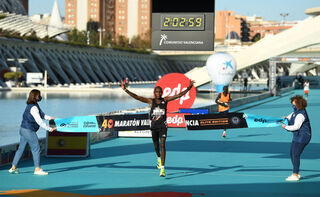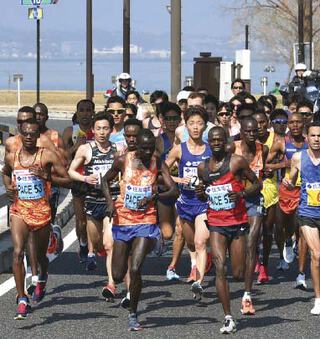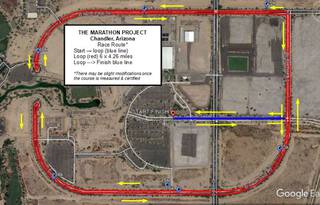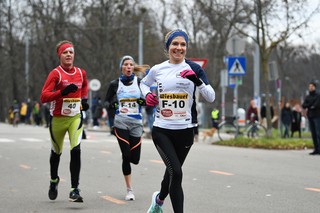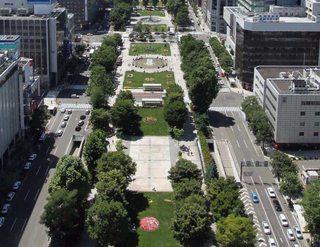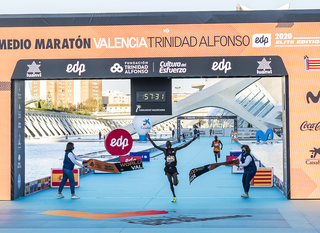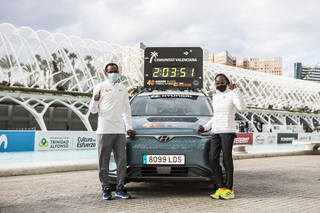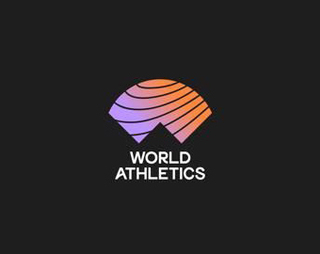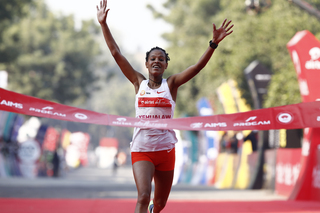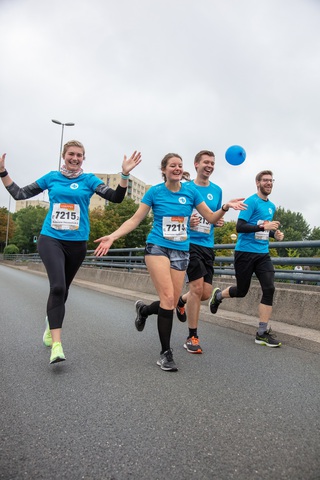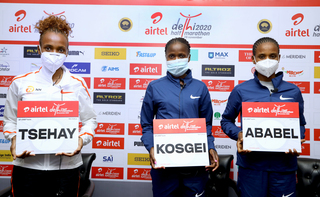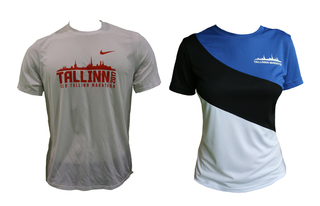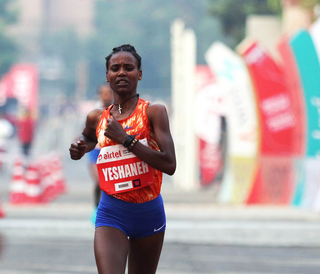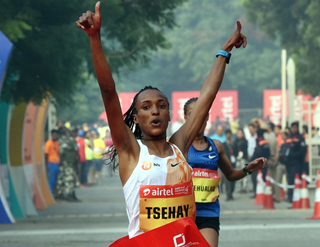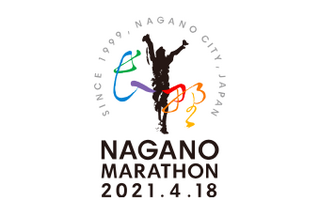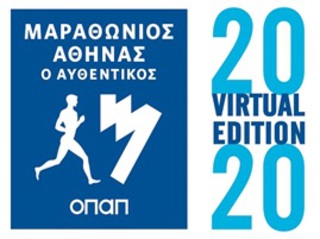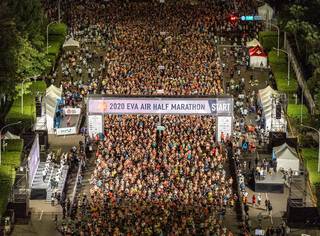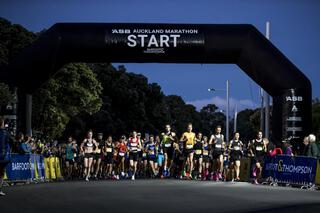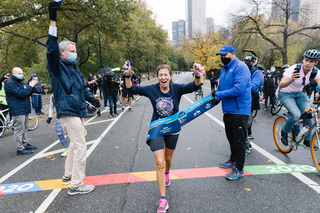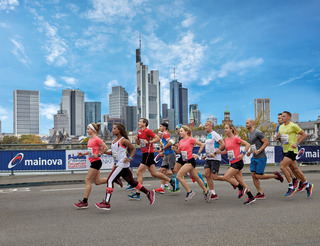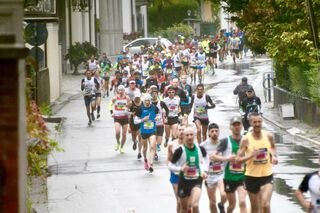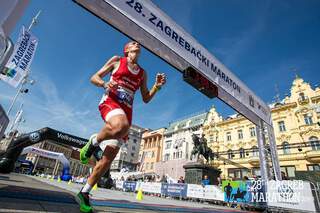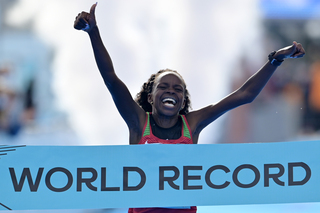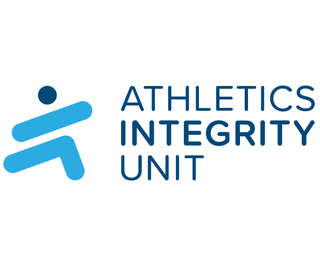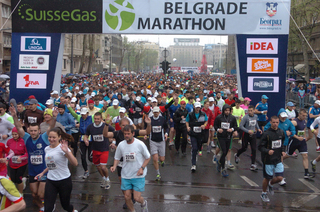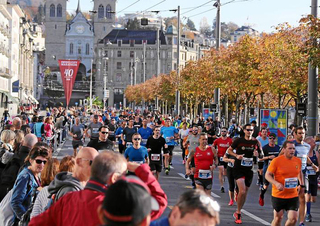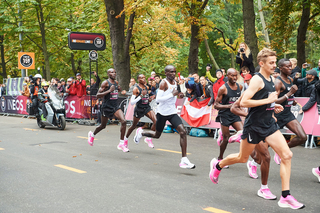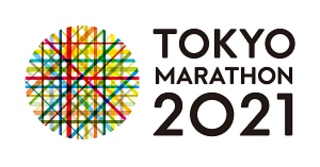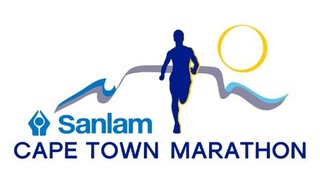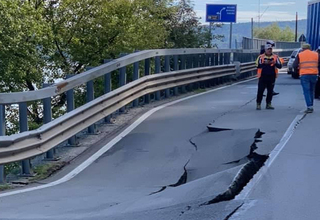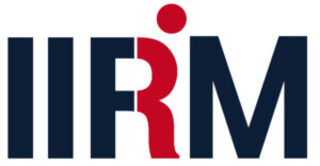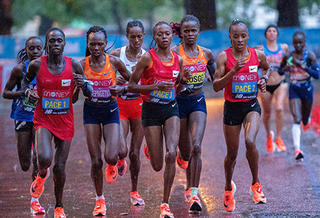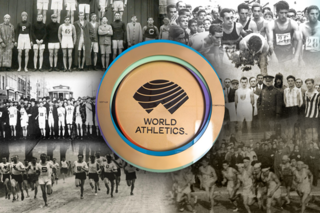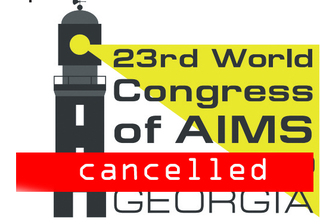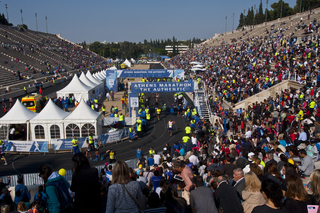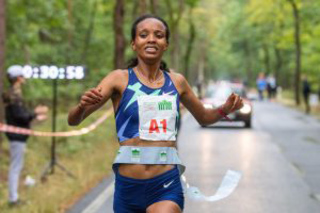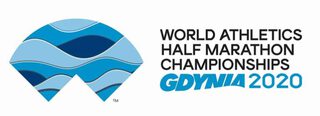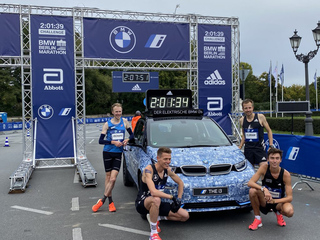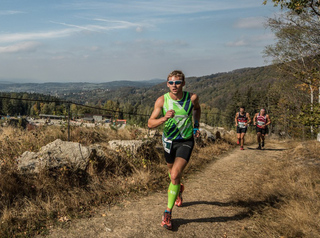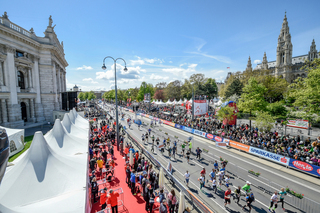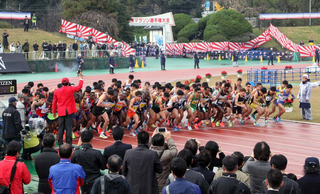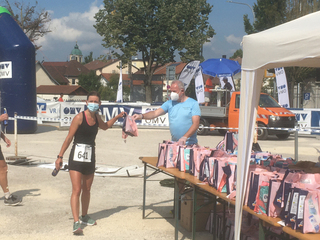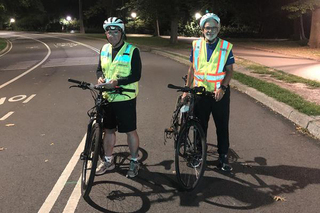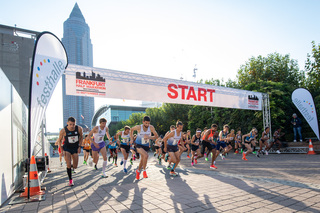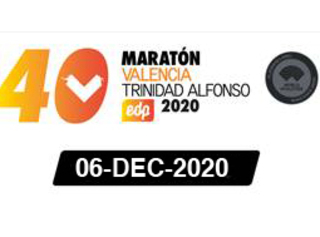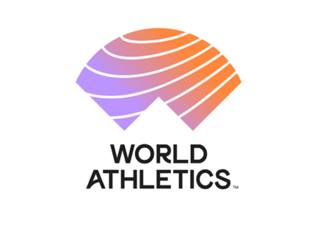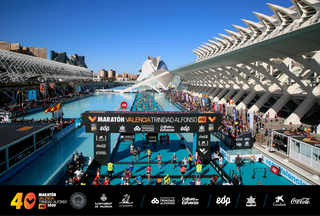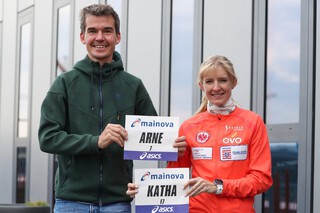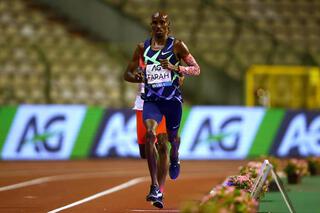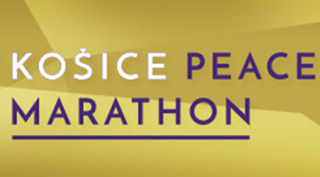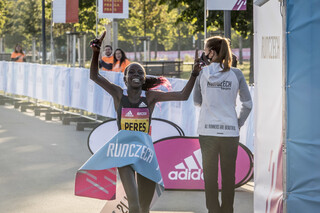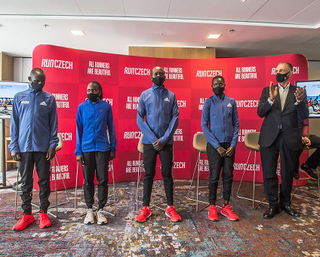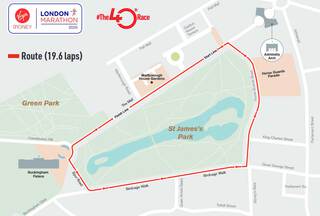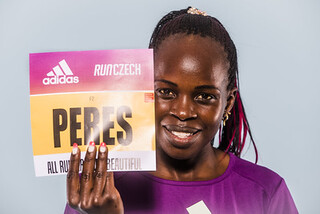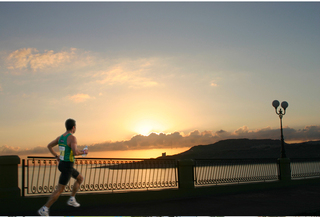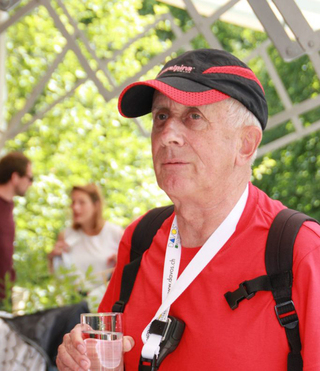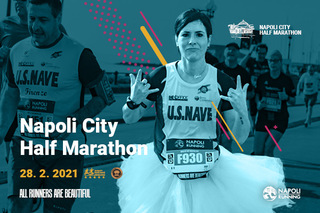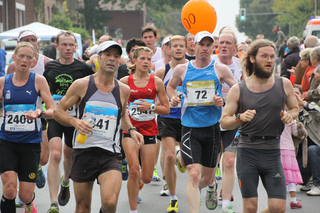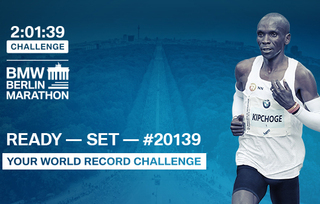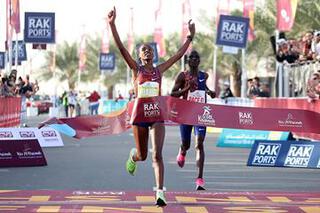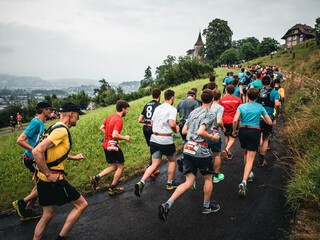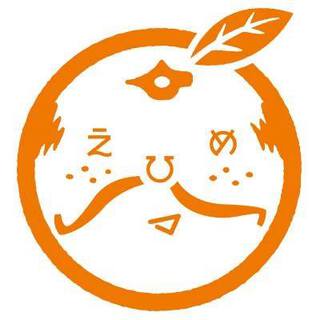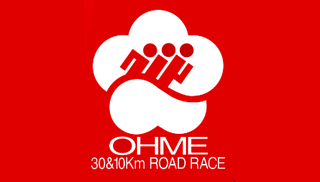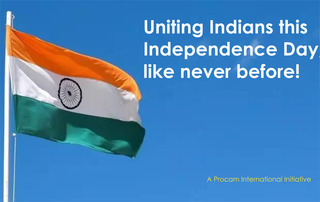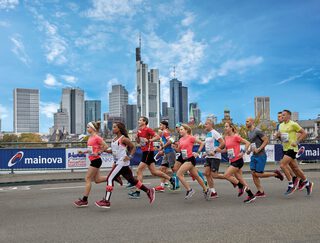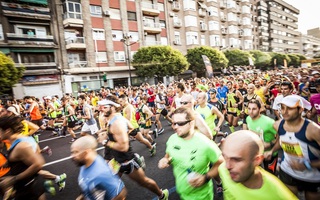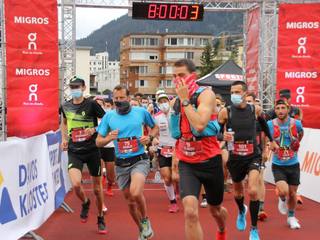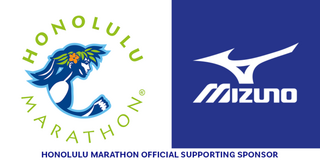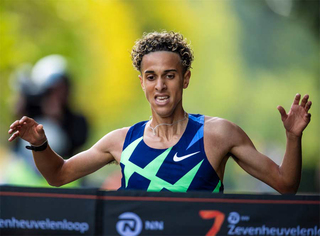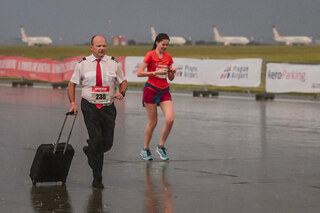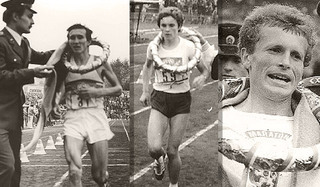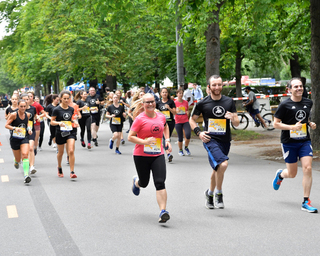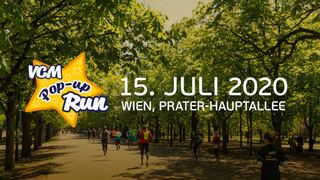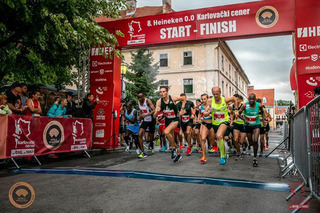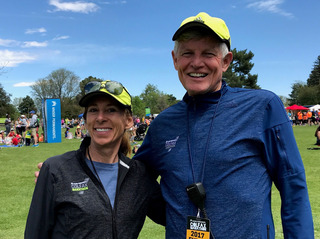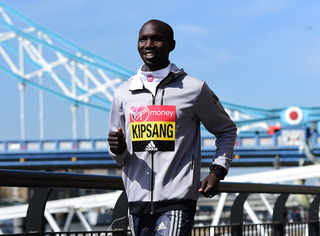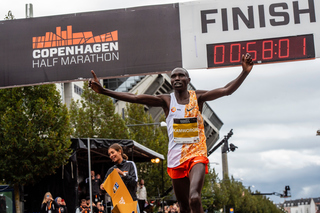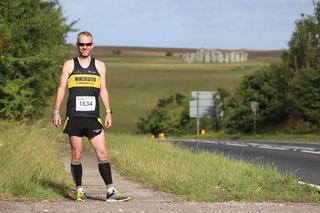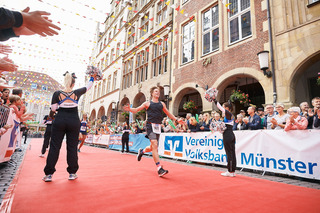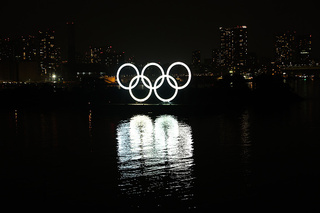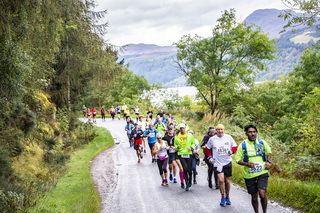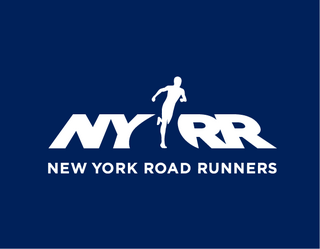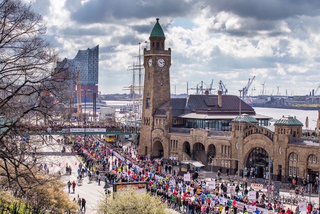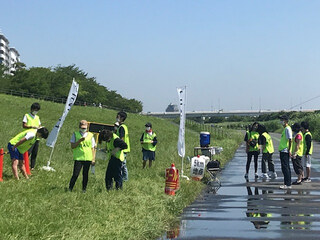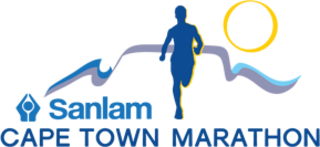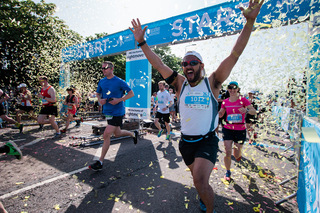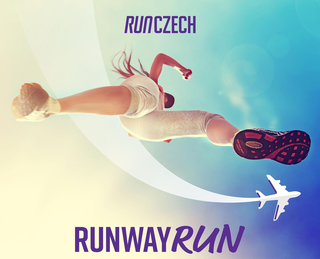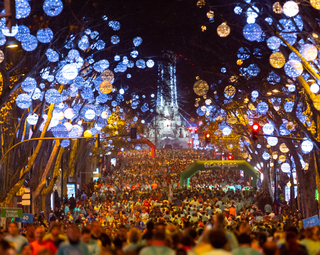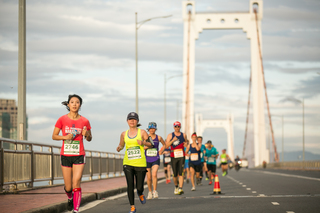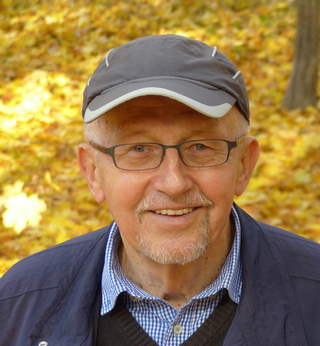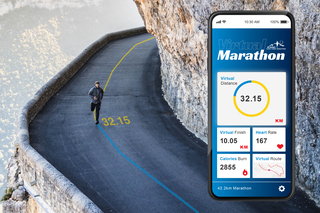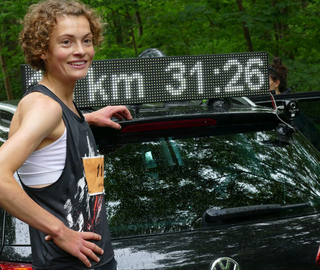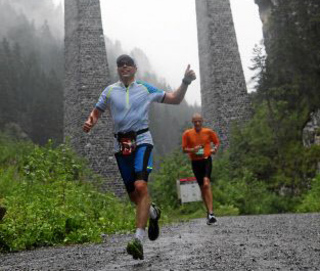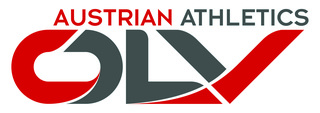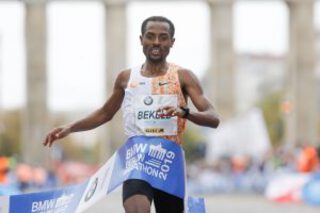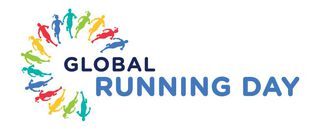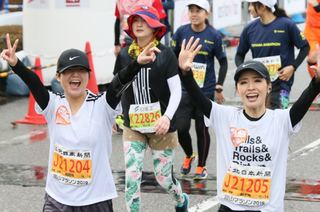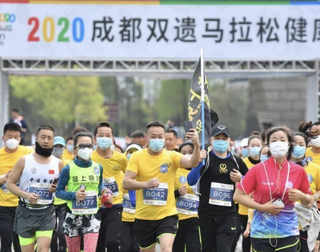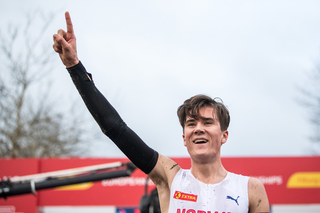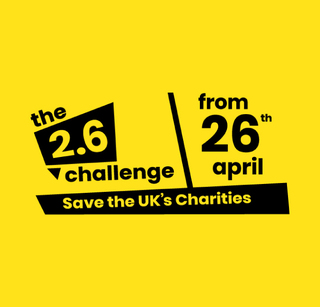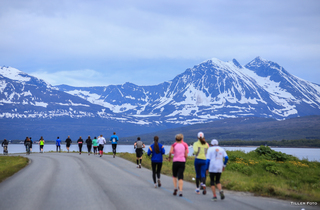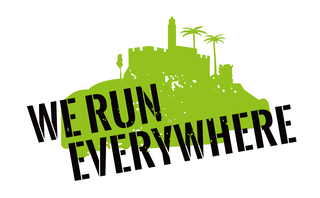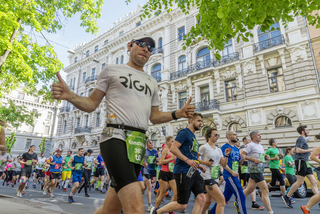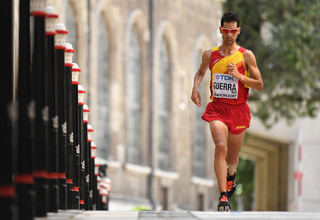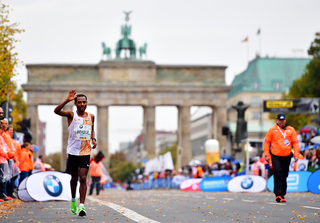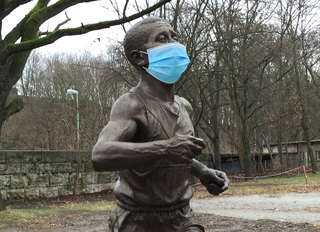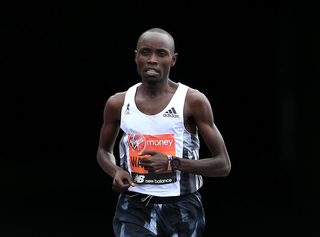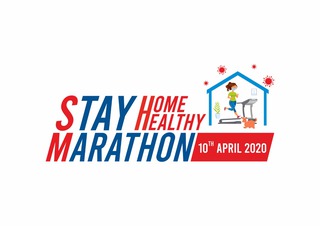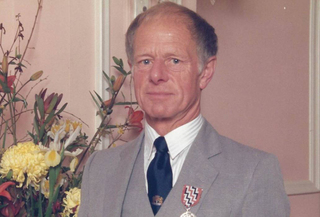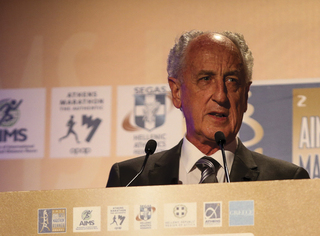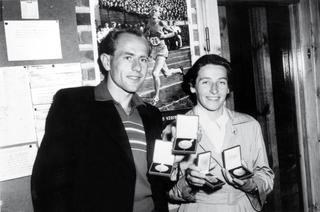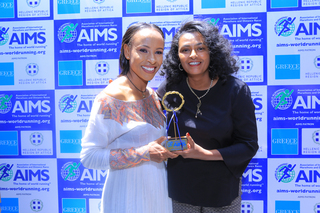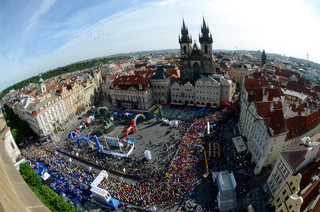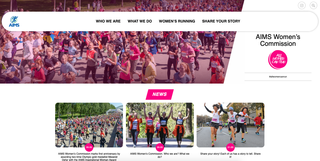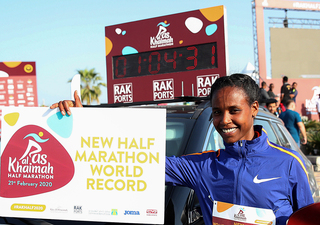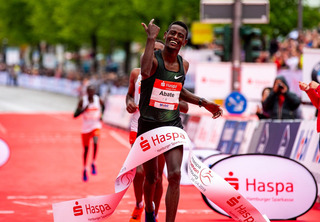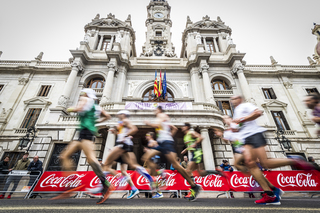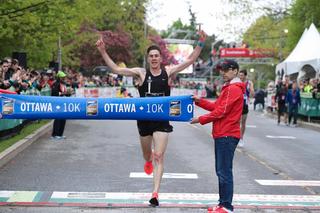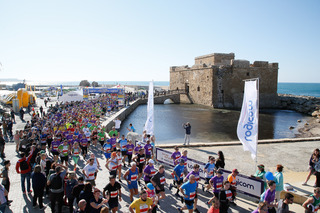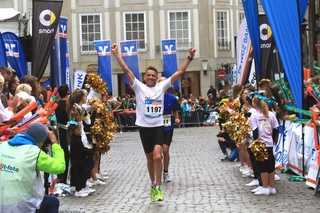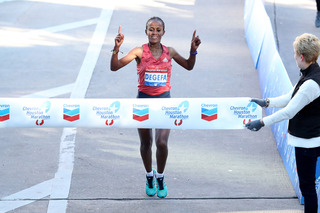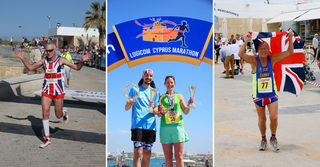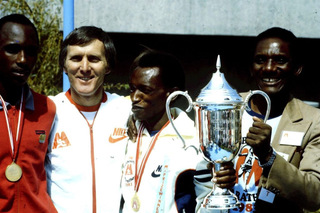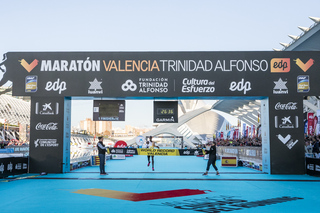 To read the latest & past editions click here
To read the latest & past editions click here
Running news
The year of running quickly
Review of 2020
As the curtain fell on 2020 – a year most would wish to forget as quickly as possible – elite distance runners took their final bow in the Arizona desert on 20 December.
A few dozen men and women set off on a 6-lap course and 2 hours 10 minutes later seven of the men had finished. The leading woman, Sarah Hall, came in a few seconds more than 10 minutes later. Some foreign runners were in the field but this was primarily a US domestic event and the results listed an impressive set of personal-best performances. With modest prize money on offer, and Olympic trials already having put a seal on the team to run in Tokyo, this was as much as anything an example of runners feeling the need to run for their own sakes, and taking advantage of one of the scarce opportunities offered to them in 2020.
For the first nine weeks of 2020 it was business as usual for elite and mass runners alike. Then races began getting cancelled and the sport went into hibernation. Training was possible – but training without any target in sight – unless you count the ‘virtual’ races which were the best substitution on offer for real competition. It was only in September that some ‘socially distanced’ races were put on with much reduced fields. The logical solution for any organisers with big enough budgets was to shrink the field to a few dozen of the best and mount a TV spectacle as runners went for the records. So from October onwards a handful of high profile races boosted the 2020 rankings with quality times that went deep into the field: In Valencia on 6 December 30 men broke 2:10 in the marathon.
See the ranking lists for 2020 here
Race news Taipei Marathon
Taipei runs full mass-participation event
9,000 run marathon, 19,000 half
Benefitting from the Taiwanese government’s early steps to get control of the COVID-19 situation and its population’s responsibility in sticking to the protocols, the Taipei Marathon achieved what no other large-scale race could: a full-sized mass-participation field with 9000 marathoners and 19,000 half-marathoners, and an international elite field, all within the 2020 calendar year.
Not a reduced field, not a micro race, but a big city marathon the way we used to know them.
International athletes had to undergo a two-week quarantine in their hotel rooms, which organizers had fitted out with treadmills, but while most of them including Japan’s Hiroko Baino reported negative effects from the treadmill running on their performances there was still a new men’s course record of 2:09:18 from Paul Lonyangata (Kenya) and a near-miss from women’s winner Askale Merachi (Ethiopia) at 2:28:31.
Fresh from breaking the 10000m national record two weeks ago local runner Chun-Yu Tsao also took two minutes off her own national record to finish 4th in 2:32:41. Baino struggled with leg pain mid-race and finished 6th in 2:45:53.
Behind them were tens of thousands of amateur runners doing what the rest of the world can only dream of doing – six, nine, twelve months down the road.
Result
marathon
Men
| 1 | Paul Kipchumba | LONYANGATA | KEN | 2:09:18 |
| 2 | Elisha Kipchirchir | ROTICH | KEN | 2:13:07 |
| 3 | Tiidrek | NURME | EST | 2:16:11 |
| 4 | Bilal | MARHOUM | MAR | 2:16:22 |
| 5 | Oleksandr | SITKOVSKYI | UKR | 2:20:40 |
Women
| 1 | Askale Merachi | WEGI | ETH | 2:28:31 |
| 2 | Alemtsehay Asefa | KASEGN | ETH | 2:32:00 |
| 3 | Zinash Mekonen | LEMA | KEN | 2:32:24 |
| 4 | Chun-Yu | TSAO | TPE | 2:32:41 |
| 5 | Gladys Lucy Tejeda | PUCUHUARANGA | PER | 2:37:23 |
Race news
2021 Lake Biwa Mainichi Marathon will be last
Oldest Japanese marathon comes to an end
The Lake Biwa Mainichi Marathon will be discontinued after next year’s 76th edition on 28 February 2021.
One of Japan’s three major men’s marathons, Lake Biwa’s position on the calendar as the last chance to qualify for Olympic and World Championships teams meant it has had a long history of being the place where Japan’s best marathoners earned to right to compete against the best in the world. But in recent years Lake Biwa has come under increasing pressure from the rise of the Tokyo Marathon where national records and other fast times have been run almost every year. Lake Biwa’s relevance and value began to be called into question. The Osaka Marathon is likely to replace Lake Biwa as a national team selection race in the future.
Founded in 1946 Lake Biwa is the oldest existing marathon in Japan. Along with the Fukuoka International Marathon and the Tokyo Marathon it is counted as one of Japan’s three top men’s marathons. But now its long, colourful history will come to an end next year when Olympic marathon trials winner Shogo Nakamura and others stand on its starting line one final time.
Starting and finishing on the track at Ojiyama Field, Lake Biwa has long been the final selection race for Olympic and World Championships teams. At both the 2012 London Olympics and 2016 Rio de Janeiro Olympics two of the three men’s team members earned their places at Lake Biwa. At both the 1964 and 1968 Olympics all three members were chosen there. Its position on the calendar relative to Fukuoka and Tokyo meant the battles were always furious, and those who emerged victorious went on to take on the world.
There’s no question that Lake Biwa has been the site of countless classic races and a vital part of Japan’s marathon tradition, but in recent years its relevance has faded. One of the major factors in this was the Tokyo Marathon’s change to a faster course in 2017. In 2018 Yuta Shitara broke the Japanese national record in Tokyo, and two years later Suguru Osako followed Shitara’s lead and did the same. With that record of success Tokyo has become the first choice for Japanese men targeting fast times.
The outcome of that change for Lake Biwa, an elite-only marathon, was that the athletes who could have provided the fireworks started staying away. With the Tokyo Marathon having moved to Lake Biwa’s traditional date the first Sunday in March two years ago, Lake Biwa’s shift a week later meant it was now the same day as the Nagoya Women’s Marathon, putting it even further into the shadows. The race’s viability, financial and otherwise, came into question.
According to those involved, the Osaka Marathon is the most likely candidate to replace Lake Biwa as a national team selection event. With 35,000 people running on a downtown urban course it is the second-largest marathon in Japan after Tokyo. With that kind of modern prestige to it, Osaka is highly likely to pick up the selection race label.
Modernity has a way of burying history. The MGC Race, a one-shot selection race for the Tokyo Olympics, was a major success. Those in power are leaning toward using the same kind of single trials race for the 2024 Paris Olympics. With the coronavirus crisis an ongoing issue, this is a period of transition. The Japanese marathon world isn’t immune to those transitional forces, and we can only hope that its reorganisation and reformation produce even more exciting races.
Translator’s note: Lake Biwa was Japan’s first World Athletics gold label race. For high-level amateur men its sub-2:30 qualifying time was a major goal and mark of prestige. Fukuoka and Tokyo both have faster elite field qualifying times, but both have secondary marks that make it possible for slower people to run. Lake Biwa was sub-2:30, do or die.
Its position after ekiden season made it one of the leading options for marathoners shooting for national teams. A change to the Osaka Marathon, a month before the New Year Ekiden, will amplify the same problems faced by the Fukuoka International Marathon, which has looked at moving post-New Year Ekiden, and push more people to run Tokyo.
Running news
Marathon project in Arizona
55 to run under strict conditions
In January 2006 Haile Gebrselassie set a world record in the half marathon of 58:55 just a short distance from the Brooks Running’s ‘Marathon Project 2020’ race to be held on 20 December in Chandler, Arizona.
Gebrselassie enjoyed very favourable conditions from which runners on Sunday will be likely to benefit in the same way. The course is absolutely level, a 7km lap (for the marathon run six times), with an out-back for start and finish. Temperatures are projected at 10°C, the desert air is completely dry and there is almost no wind: near-ideal conditions.
The top names are Amanuel Mesel (ERI, pb of 2:08:17 in 2013, 2:11:04 in Houston 2020) and Sarah Hall (USA, pb 2:22:01 from October 2020). Many among the field competed in the US Olympic Trials in Atlanta in February 2020. Among the 55-strong men’s field 15 have pbs under 2:12 and there are seven women (among the 49 entered) who have run inside 2:30. Although the US Olympic team has already been confirmed there are also many guest runners from other countries (13 men from seven countries, 12 women from eight countries) hoping to beat the Olympic standard.
Because the corona pandemic is rampant in the USA strict hygiene regulations will be enforced and spectators not allowed. The run will be broadcast online by the association via USATF.TV.
Running news
Successful national marathon championship in Austria
Elite runners achieve personal best times in Vienna
The Austrian National Marathon Championship held on 13 December on Vienna’s Prater Hauptallee was a small pre-Christmas miracle.
It was held under extraordinary circumstances – emotionally, athletically and organisationally. Allowed to take place as an elite event, a strict prevention concept was enforced in accordance with the Austrian Covid-19 protective measures regulation. The event was organised in cooperation between the Vienna City Marathon (VCM) and the Austrian Athletics Association (ÖLV) for 100 competitors. Spectators were not allowed. No public announcements have been made.
Temperatures of 3°C, cloudy skies and very little wind offered very good running conditions for the time of year. The course, of six 7km laps, was on the Prater Hauptallee, Austria’s centre of running, a location of world renown since Eliud Kipchoge ran 42195m in 1:59:40.2 at the INEOS 1:59 Challenge in October 2019.
Eva Wutti provided the sporting highlight. Her finishing time of 2:30:43 equalled Andrea Mayr’s Austrian record from 2009 to the second.
Argentina’s Daiana Ocampo kept pace with Wutti and went to front when Wutti had a difficult period after 34km, but later faded to finish two minutes in arrears – but still in a personal best time.
In the men’s race Dutchman Bjorn Koreman took advantage of the very good conditions to crack the Olympic standard and set a personal best of 2:11:07. Germany’s Johannes Motschmann ran his debut marathon in second, recording 2:14:38.
Race news Gifu Half Marathon
Gifu Seiryu Half to go ahead
Race capped at 7,000 runners
After Japanese races due to be held in Spring have consistently been cancelled or postponed the Gifu Seiryu Half Marathon, has bucked the trend.
After consultation with all parties involved the organising committee of the 10th anniversary Gifu Seiryu Half Marathon, scheduled for 25 April, will go ahead while taking appropriate precautions against the spread of the COVID-19 coronavirus.
As one of the measures to allow the race to be safely staged, the field size on race day will be cut to 70% of its usual level, 7,000 runners, to reduce crowd density on the course. The remaining 30%, 3,000 runners, will be given entry to an online half marathon to allow them to participate ‘virtually’. Priority will be given to people who were entered in the cancelled 2020 edition. The 3km race will be cancelled in order to further reduce numbers, and all entrants in that division will have their entry fees refunded. The organising committee thanked all runners for their understanding.
Running news
Shoes impact on Japanese high school performances
Times getting faster
The Japanese distance world keeps getting faster and faster. High school athletes are no exception.
This season 22 boys have broken 14 minutes for 5000m, not including foreign student athletes. This is almost double the previous record for a single season, 12 in 2010. In the last few years the number of boys running under 14 minutes has held steady: 10 in 2015, 10 in 2016 and 11 in 2019.
Kosuke Ishida topped last year’s list for 5000m at 13:51.91 but in July this year broke the16-year-old high school national record of 13:39.87 with a time of 13:36.89. He improved to 13:34.74 in September. Behind him, they kept coming. Even 1st and 2nd years were breaking into 13-minute territory.
One of the reasons is of course the shoes. As with seniors, high school runners used thick platform shoes and high-speed spikes in 2020. It also seems likely that the sharp drop in the number of races this season due to the coronavirus crisis will have reduced strain from racing, increased the freshness in runners’ legs and fired up the desire to race once they did get the chance to line up in a race.
Running news
Olympic Marathon test event
Details to be announced by end of 2020
Organisers of next summer’s Tokyo Olympic Games are planning to stage a half marathon test race in Sapporo on 5 May as a dry run for the operation of the Olympic women’s and men’s marathons.
Organisers are considering whether the event will be open to international entrants or mass-participation runners and expect to announce a final plan for the event before the end of the year.
The Olympic marathon course starts at Sapporo’s Ohori Park and covers an approximately 20km loop before two more laps of the 10km northern half of the longer loop. The first lap is approximately a half marathon in distance (including the start section).
News from World Athletics
World Athletics amends rule on use of ‘prototype’ shoes
Approved list to be published
On 4 December World Athletics amended their earlier ruling on wearing development (‘prototype’) shoes in international competitions (and competitions sanctioned by Member Federations where World Athletics rules are applied) prior to their availability to other athletes.
Disallowed from 30 April 2020 such shoes can now, with immediate effect, be used upon approval of the shoe specifications by World Athletics. These shoes will have to meet the same technical specifications as all other approved shoes.
The statement on World Athletics’ website reads:
“The amendment will not apply to the World Athletics Series or the Olympic Games. The development shoes can only be worn for a 12-month ‘development’ period.
“A list of approved development shoes will be posted on the World Athletics website stating the date from which the development shoe can be worn and the expiry date for approval. To date there is a list of 200 (spikes and non-spikes) approved shoes listed and published on the World Athletics website.
“This new proposal will be complemented by an athletic shoe availability scheme for shoes which is being developed by a Working Group on Athletic Shoes with representatives from shoe manufacturers and the World Federation of the Sporting Goods Industry (WFSGI).”
World Athletics CEO Jon Ridgeon said: “The use of competition to complete the final testing of development shoes by manufacturers has always been an important part of the shoe development process. This year has been a difficult one for both shoe manufacturers and athletes with significant disruption to manufacturing and reduced access to competitions for athletes around the world.
“With shoe manufacturers agreeing to our new process of submitting specifications and shoes, if required, for approval ahead of being worn in competition, we are confident that this amendment will not impact the integrity of competition.”
Race news Fukuoka International Marathon
Yoshida crosses finish line in 2:07:05
Second-fastest time ever by a Japanese man at Fukuoka
Bedan Karoki led out the pace at 2:58/km for those chasing the national record. There was a second-group paced at 3:00/km for everyone else in the field of about 100.
Ten men went with the A-group in the early going, eight Japanese plus the debuting Cyrus Kingori and Mongolian natiojnal record-holder Ser-Od Bat-Ochir. Prominent in that group were Yoshida, now 23, and the favourite, last year’s winner Taku Fujimoto (Toyota). Fujimoto said pre-race that he was going for 2:04:50, but while his training partner Karoki never got the pace that hot it was still steadily on track for 2:05 all the way until he stepped aside at 30km.
Along the way people fell off one by one. With 10 km to go it was just Yoshida and Fujimoto, and as Yoshida applied pressure Fujimoto fell away. Yoshida looked strong the whole way but his pace slowed to just over 2:06 pace at 35km and just under 2:07 at 40km.
He needed a big finish to stay under 2:07 but although he picked it up it was less than he needed. Yoshida crossed the finish line in 2:07:05 – the second-fastest time ever by a Japanese man at Fukuoka and ninth-best Japanese time ever. His victory made it the first time Japanese men have won Fukuoka three years in a row since 1989. In his post-race interview he was as calm, mature and professional as he had been in the race, assessing his performance matter-of-factly and looking like someone with a bright road ahead of him.
Only one other runner who went with Yoshida in the A-group made it into the top ten, with the large B-group working together to stay on 2:06/2:07 pace even after the pacing stopped at 30km. Naoya Sakuda was the first to break away as he surged to run down A-group straggler Yoshiki Takenouchi, Olympic team alternate Shohei Otsuka who had fallen early in the race and bled from his left knee, and Kenyan Michael Githae were next, with Sakuda’s JR teammates Natsuki Terada and Paul Kuira pulling away from the remnants.
As they all bore down on the fading Fujimoto they overtook each other and switched order with the tides of the marathon’s final 5km, but it was Otsuka who ultimately proved the strongest, closing to within 33 seconds of Yoshida for a 2:07:38 PB in his first time going sub-2:10 and with a bloody leg to show for it. As the alternate for the Olympic team, he now has a faster PB than the top two at the Trials. Only NR holder Suguru Osako (Nike) remains faster at 2:05:29. If any of the top three don’t make it to the main event, if there is one, today Otsuka proved that he’s their equal and that the team’s level won’t suffer if he has to take over someone’s spot.
The race showed the beneficial effect of pacing in the marathon, but there’s equally a lesson on the role of ambition, fearlessness and confidence. As in the record-breaking National Track and Field Championships a day earlier, the current generation of Japanese athletes showed they have enough of all three to go around.
Result
marathon
Men
| 1 | Yuya | YOSHIDA | JPN | 2:07:05 |
| 2 | Shohei | OTSUKA | JPN | 2:07:38 |
| 3 | Natsuki | TERADA | JPN | 2:08:03 |
| 4 | Michael | GITHAE | KEN | 2:08:17 |
| 5 | Naoya | SAKUDA | JPN | 2:08:21 |
Race news Valencia Trinidad Alfonso Marathon
Kandie sets new world record in half marathon
57:32 in Valencia – three others also beat previous record
Kibiwott Kandie smashed the world record (subject to ratification) in the half marathon on 6 December, clocking 57:32 at the Valencia Half Marathon.
The 24-year-old Kenyan, who finished second at the World Half Marathon Championships in Gdynia, Poland, in October, knocked 29 seconds from the previous record of 58:01 set by Geoffrey Kamworor in 2019.
The world record was the target from the outset with the leaders covering the opening 5km in 13:37 and 10km in 27:25. Kandie, who was running his fourth half marathon of the year, began to push the pace in the 14th kilometre, bringing the leaders through 15km in 41:10, with fellow Kenyan Rhonex Kipruto and Jacob Kiplimo of Uganda, the reigning world champion over the distance, on his shoulder. Over the next 5km Kandie and Kiplimo took turns with the lead until the final kilometre when Kandie made his decisive move.
Besides Kandie three more men beat the previous world record: Jacob Kiplimo (57:37), Rhonex Kipruto (57:49) and Alexander Mutiso (57:59).
In the women’s race, the winner was the Ethiopian Genzebe Dibaba with a time of 1:05:18, followed by Sheila Chepkirui with 1:05:39 and then the 2019 winner Senbere Teferi with 1:05:51.
Among the Spaniards, the debutant Carlos Mayo achieved the second best time in history in the half-marathon with a time of 1:00:06, lowering the time achieved by Juan Antonio ‘Chiki’ Pérez (1:01:30) last year in the Valencia Half-Marathon. In the women’s category, the first Spanish national was also the debutant José Pérez, from CA Serrano, who was the first to cross the finish line in 1:12:57.
In the marathon, Evans Chebet (KEN) broke the Valencia course record with 2:03:00, making Valencia the third fastest marathon in the world (behind Berlin and London).
Three more men ran under the previous record of the event which was last set at 2:03:51, and in doing so completed a spectacular podium. Lauwrence Cherono (2:03:04) was second, Birhanu Legese (2:03:16) third and Amos Kipruto (2:03:30). In addition, there were 30 athletes who ran under 2:10:00.
In the women’s category, Peres Jepchirchir also broke the course record with her 2:17:16; Ayad Lamdassem broke the Spanish record with 2:06:35. 61 runners achieved the Olympic qualifying times.
The women’s podium was completed by Joyceline Jepkosgei (2:18:40) and Helalia Johannes (2:19:59).
Result
Half marathon
Men
| 1 | Kibiwott | KANDIE | KEN | 57:32 |
| 2 | Jacob | KIPLIMO | UGA | 57:37 |
| 3 | Rhonex | KIPRUTO | KEN | 57:49 |
| 4 | Alexander | MUTISO | KEN | 57:59 |
Women
| 1 | Genzebe | DIBABA | ETH | 1:05:18 |
marathon
Men
| 1 | Evans | CHEBET | KEN | 2:03:00 |
| 2 | Lawrence | CHEROONO | KEN | 2:03:04 |
| 3 | Birhanu | LEGESE | ETH | 2:03:16 |
| 4 | Amos | KIPRUTO | KEN | 2:03:30 |
| 5 | Reuben | KERIO | KEN | 2:04:12 |
Women
| 1 | Peres | JEPCHIRCHIR | KEN | 2:17:16 |
| 2 | Joyciline | JEPKOSGEI | KEN | 2:18:40 |
| 3 | Helaria | JOHANNES | NAM | 2:19:52 |
| 4 | Zeineba | YIMER | ETH | 2:19:54 |
| 5 | Degitu | AZIMERAW | ETH | 2:19:56 |
Race news Valencia Trinidad Alfonso Marathon
International elite bet on making history in Valencia
Birhanu Legese says his goal is to break the current world marathon record – Jepchirchir “very motivated”
On Sunday, 6 December, the Marathon and and Half Marathon Valencia Trinidad Alfonso EDP Elite Edition will experience what will be the great race of 2020, but also an event that may go down in history thanks to the impressive starting list they will have, which includes the man with the third best marathon record in the history of the marathon, Birhanu Legese, or the current world record for the half-marathon in women-only races, Peres Jepchipchir.
In fact, it has been the athletes themselves who have said that they are capable of breaking the world record in both the men’s and women’s marathons. “I think it is possible to run below the world record, I will try on Sunday,” said Birhanu Legese (2:02:48) at a press conference. “I am well prepared and the circuit is good for running fast.”
In the same line, Peres Jepchirchir (2:23:50) explained that she is “in good condition to run below my personal best. I know that the team is very good, but the preparation has been very good, I am very motivated and I have run two half-marathons with good marks and that has motivated me to go for more,” she said.
In this sense, Paco Borao, director of the race, was more cautious and said that in half marathons they look for “the greatest records, those of the world”, but he recognised that in marathons “it is very complicated because they are very fast, but the objectives are the race records and why not a world record. Here in Valencia we are always prepared to break records,” he said.
In the Half Marathon Valencia Elite Edition, one of the athletes who could do this is Rhonex Kipruto, debutant in this distance but world recordman of 10K with 26:24, he said that his goal is “to run and win”. “I know Valencia very well, I know well that records are broken and my preparation has been good, so I hope that his debut is also good,” he said. Also, Senbere Teferi (1h05:32) said that she was strong and that she saw herself capable of lowering the Ethiopian record that she holds.
In his speech, Paco Borao thanked all the public administrations, CSD, Ministry of Sports and Foreign Affairs, Embassies and consular corps, as well as the Spanish Federation and World Athletics who “have helped us so, so much to bring people, especially through these difficult times and also knowing they have had a lot of work these last months.” He continued: “The race is, from a health point of view, completely safe. The athletes have passed two PCR, they sleep alone, they eat in the room… We comply 100% with the health regulations and we want to show this to everyone.”
Marc Roig, coach of the international elite of this race, said: “I would like to highlight the difficulties that the selection of the elite athletes has had this year. As there were no competitions, all the athletes in the world wanted to be in Valencia, they wanted it before, because Valencia is the city of running, but it has been painful to have to say no for reasons of capacity, but those who are here are the best in the world.”
“There are notable absences, such as Geoffrey Kamworor, who was coming but had an accident that has made it impossible for him to be here despite having done everything possible to recover, and Letesenbet Gidey, the current 5000m record holder, who cannot be here due to the very complicated situation they are experiencing in their region of Ethiopia with a war that has not allowed him to leave.”
Roig ended with a request to everyone: “I want you to believe with me that on Sunday we are not only going to see one of the best races of the year, but also one of the best in history.”
Running news
Olympians “will have to wear masks”
Plans assume vaccination not yet in effect by summer
Tokyo 2020 has revealed that athletes participating in the Olympic Games next summer will be asked to sign contracts promising, among other things, to wear masks when not training or competing and avoid physical contact and talking loudly.
Covid-negative test results would have to be shown on arrival by athletes and visiting spectators alike. The number of overseas spectators allowed is to be decided in spring according to infection rates then prevailing.
At a time when a covid vaccine has already started being distributed the Tokyo 2020 spokesperson, Toshiro Muto, said “We are working under the assumption that the vaccine is not available”.
Race news Fukuoka International Marathon
Hattori drops out of Fukuoka Marathon
2018 winner was favourite
Three days before race day favourite Yuma Hattori has withdrawn from the Fukuoka International Marathon on 6 December due to pain in his right calf.
Hattori won Fukuoka in 2018 and in September last year finished 2nd at Japan’s MGC Race Olympic marathon trials to secure his place on the Olympic team. In Fukuoka this time he had planned to target the Japanese national record of 2:05:29.
Through Fukuoka organisers Hattori released the following statement: “I have been forced to withdraw from the Fukuoka International Marathon. To the race organisers, the media, and to the fans who had been looking forward to cheering me on in the race, I apologise from the heart. This setback has made me realise the difficulty of just making it to the start line of a marathon in peak condition. I believe this experience will help me grow further and succeed in my future goals. One of those will be to return to the Fukuoka International Marathon as a more mature athlete.”
News from World Athletics
Progress on Russian Federation reinstatement
Independent experts appointed to work with RusAF
The chair of the Russian Taskforce, Rune Andersen, reports that a foundation had been laid in recent months for the new RusAF leadership, which was elected on 30 November, to put an appropriate plan in place by the deadline of 1 March 2021.
“Well-qualified international experts have been appointed who will work on the ground with RusAF in Russia, helping it to draw up a detailed strategic and operational plan with clear objectives and timelines,” Andersen said.
“A new framework agreement… commits RusAF to continuing to pay the costs incurred by World Athletics in the process. International experts have already begun working with the senior RusAF management team, and have reported that that team has been very responsive and constructive in its approach.”
The two independent experts appointed by World Athletics to work with RusAF are Margarita Pakhnotskaya, the former deputy Director-General of the Russian Anti-Doping Agency RUSADA, and Vladas Stankevicius, a Russian-speaking change management professional, lawyer and ethics and compliance expert. Former World Anti-Doping Agency international expert Peter Nicholson will support the other two experts remotely.
Andersen confirmed that he had an “open and constructive” first discussion with the new RusAF President Piotr Ivanov and requested that Ivanov work closely with the international experts to move the plan forward.
World Athletics’ Council approved revised terms of reference for the Taskforce to reflect these recent developments.
RusAF must meet the deadline of 1 March 2021 and continue to pay the costs associated with the reinstatement process or the Council decision from July this year – to propose that Congress expels RusAF from membership of World Athletics – will come into effect.
The Council will consider whether to allow Russian athletes to compete again as Authorised Neutral Athletes in international competitions (including allowing up to 10 ANAs to participate in World Athletics Series events and the Tokyo Olympic Games) at its next meeting in March 2021, or earlier if the Taskforce so recommends, based on the progress made by RusAF to that date.
Race news Fukuoka International Marathon
Around 100 to run in Fukuoka
Elite race goes ahead with Hattori hoping for Japanese record
The 74th edition of the Fukuoka International Marathon will be held in the southern Japanese port city on Sunday 6 December with a largely Japanese elite.
In contrast to almost all other marathons in summer, autumn and winter 2020, the traditional event will take place with appropriate hygiene requirements. The “Fukuoka International” has been a purely elite run since its foundation.
For the upcoming edition the qualifying time has been increased to 2:25. The current list of starters includes around 100 athletes who will all start at 12.10 local time on the track of the Heiwadai Stadium. The parallel start of a second group in Ohori Park will not take place this year. Only athletes who are on the island have been allowed to run due to the quarantining requirements. Some “foreign” top runners resident in Japan, such as the 2:05 hour runner Bedan Karoki (KEN), will set the pace (but note that Karoki is also on the start list for the Valencia Marathon to be held on the same day).
The runner with the fastest current time was Ryu Takaku (JPN), who finished 8th in the Toyko Marathon at the beginning of March – shortly before the shutdown – in 2:06:45. He has withdrawn in the last few days due to an injury.
The 2018 winner in Fukuoka Yuma Hattori (2:07:27) should be the race favourite. He has announced that if the conditions are good he will attack the national record of 2:05:29. Taku Fujimoto (JPN) ran his PB of 2:07:57 at the 2018 Chicago Marathon and last year he crossed the finish in second place in Fukuoka (2:09:36) – but due to irregularities in the biological passport of El Mahjoub Dazza (MAR) he was promoted to become the winner.
Of the registered participants 24 have best times of under 2:11 hours and 34 under 2:13.
Date changes Great Ethiopian Run 10km
Race date for Great Ethiopian Run 10km (ETH) changed
Great Ethiopian Run 10km date change
The Great Ethiopian Run 10km (ETH) will take place on Sun 10 January 2021, not Fri 1 January 2021 as previously published.
Race news Vedanta Delhi Half Marathon
Yehualaw runs second fastest women’s half marathon ever in Delhi
15 seconds short of world record
Ethiopia’s Yalemzerf Yehualaw produced a stunning run to clock the second fastest women’s time ever over the distance when she crossed the line in the Indian capital in 1:04:46.
The 21-year old, who had to settle for third at the World Athletics Half Marathon Championships last month when she slipped around 80m from the finish, bounced back to take the $27,000 first prize and an additional $10,000 as an event record bonus.
In the men’s race, the event record – with the course having been changed significantly from previous years – also fell when Amdework Walelegn outsprinted his Ethiopian compatriot and two-time defending champion Andamlak Belihu to win in 58:53, the latter coming home in 58:54 and just missing out on an unprecedented third title.
A blistering pace was set from the gun in the women’s race by the Kenyan male pacemaker Alex Kibarus and several of the elite field were quickly dropped. Six women – three Kenyans: Irene Cheptai, 2019 world marathon champion Ruth Chepngetich and marathon world record holder Brigid Kosgei; and three Ethiopians: two-time defending champion and event record holder Tsehay Gemechu, world record holder Ababel Yeshaneh and Yalemzerf Yehualaw – followed Kibarus through 5km in 15:27.
World marathon record holder and recent London Marathon winner Kosgei was forced to drop out midway through the eighth kilometre, holding her leg as she limped to the side of the road. A kilometre later, Gemechu also started to suffer and lost contact with the leaders although she hung on to eventually finish fifth. Chepngetich, Cheptai, Yehualaw and Yeshaneh went through 10km together in 30:49 as a thrilling race started to take shape. Cheptai was the next to fall away, becoming detached in the 12th kilometre with the remaining trio going through 15km in 46:15.
With just 3km to go, and within the space of a few hundred metres, first Chepngetich and then Yeshaneh found themselves unable to stay with the pace. However, Yehualaw continued to follow Kibarus, and once he dropped out with two kilometres to go it was just a question of how much she would take off Gemechu’s 2019 course record of 1:06:00. In the end she improved the mark by more than a minute, with a strong run over the final quarter of the race. Yehualaw won in 1:04:46 but Chepngetich also ran the race of her life to finish in a personal best of 1:05:06 and move up to equal-sixth on the world all-time list.
“My training since the world championships told me that maybe I could break the course record as I ran 65:19 there,” said Yehualaw, “but this was more than I expected. I hoped for a win here after just losing by a second a year ago. My plan was to push hard with 2km to go. It was also very nice weather,” she added, with early morning temperatures in Delhi around 12–14 degrees Celsius.
In the men’s race three pacemakers took the field through 3km in 8:22 and 5km in 13:57 – well under 59-minute pace – with Belihu always to the fore. The main pacemaker, Uganda’s Abel Sikowo, continued to forge ahead and passed 8km 22:17 and then 10km in 27:50, with eight men still directly in the wake of Sikowo who was doing an admirable job in keeping the tempo high. Just after 12km Sikowo dropped out and Belihu, along with Kenya’s Leonard Barsoton, dictated pace at the front for the next 2km although, as he was later to admit, this might have cost the defending champion dearly in the later stages of the race. Eight men passed 15km together in 42:00. By 18km the leading group had slimmed just slightly to six: the Ethiopian quartet of Belihu, Walelegn, 2017 and 2019 world 5000m champion Muktar Edris who was making his competitive debut over the distance, Tesfahun Akalnew, Barsoton and Uganda’s Stephen Kissa.
Akalnew started to falter shortly afterwards and with 2km to go Edris and Barsoton also started to drop off the back of the group. Belihu, Walelegn and Kissa passed 20km in 55:59 and just a hundred metres later Walelegn threw down the gauntlet. However, Kissa was still full of running and darted between the two Ethiopians with 500m to go. He held the lead for the next 300m before Walelegn found another gear and passed the Ugandan as he sprinted for the line.
Walelegn finished in 58:53, the third fastest time of the year and an event record by 13 seconds as well as a personal best by 15 seconds. Belihu was just one second in arrears and Kissa two seconds further back, both men also setting personal bests. “I had a few bad patches but in the final kilometre I felt strong. I was second in Delhi in 2018 and this is a much faster course with fewer sharp turns,” commented Walelegn, reflecting on the new circuit which incorporated two 6km laps. “I have to be happy as I ran a personal best." said Belihu. “After the pacemaker dropped out I pushed the pace but I think that might have left me with less energy when we sprinted in the last kilometre.” Belihu just fell short in his bid to be the first three-time winner in Delhi. In fourth place Edris ran 59:04, the second fastest debut over the distance ever, while Avinash Sable smashed the Indian record by more than three minutes when he ran 1:00:30 in tenth place.
Running news
US Senate votes to pass Rodchenkov law
Wada concern over overlapping jurisdiction
BBC News reports that the Rodchenkov Anti-Doping Act, is set to be signed into law. It will allow US officials to prosecute anyone involved in doping at international sporting events.
Head of the US Anti-Doping Agency (Usada) Travis Tygart said it was “monumental” in the “fight for clean sport” but the World Anti-Doping Agency (Wada) has concerns that will lead to “overlapping laws in different jurisdictions that will compromise having a single set of anti-doping rules for all sports and all anti-doping organisations under the Wada code.”
The Act targets coaches, agents, managers and officials rather than athletes, who are already covered by Wada sanctions, and allows the US to seek prosecution for doping conspirators at competitions involving American athletes, sponsors or broadcasters. Penalties include fines of up to USD 1m (GBP 756,000) or prison sentences of up to 10 years. Wada president Witold Banka questioned why the law excludes US professional and college athletes, when they were included in the original draft.
[Original story at: www.bbc.com/sport/54973241]
Date changes
Race date for IDBI Federal Life Insurance Kolkata Marathon (IND) changed
IDBI Federal Life Insurance Kolkata Marathon date change
The IDBI Federal Life Insurance Kolkata Marathon (IND) will take place on Sun 7 March 2021, not Sun 7 February 2021 as previously published.
Race news Volksbank-Münster-Marathon
Münster has a Plan B for 2021
Registration for relay marathon opens on 10 December
This year everything was different – the coronavirus has changed the world of marathon running too. The Volksbank-Münster-Marathon had to be cancelled, for the first time ever after 18 successful years. Like many other race organisations, the Münster Marathon non-profit association is faced with heavy losses.
During the period when no races could take place, however, the organising team has not been idle. On the planned marathon date a slimmed-down alternative event was organised, where runners could run – just for fun – alone or in small groups. At the same time the first plans were put in place for the next edition of the “MüMa” on 12 September 2021.
The organisation team also co-operated with the organisers of the Cologne Marathon in the umbrella group German Road Races, in which Michael Brinkmann is a committee member, to develop a hygiene concept for mass running events in Germany and to agree it with the German Athletics Association. This concept has also been shown to the state authorities in Nordrhein-Westfalen, so that it also gets political support. In addition to the general preparations for next year’s race, the organising team is also developing a “Plan B” for an coronavirus-restricted event, so that the 19th Münster Marathon can go ahead as scheduled on 12 September.
Registration has been open for the Volksbank-Münster-Marathon for some time, and the registration will start at 1pm on 10 December for the Fiducia & GAD Relay Marathon. The chairman of Fiducia & GAD, Martin Beyer, said: “The Volksbank-Münster-Marathon is not one of the oldest, but it is one of the biggest and most popular marathon events in Germany. For many years the Fiducia & GAD Relay Marathon has been an integral part. It goes without saying that we will continue our engagement – for our connection to Münster and, together with the Volksbank Münsterland Nord to do something for the people of the region. Although the race was cancelled this year due to the coronavirus, many relay teams have kept their registered places for next year. We are delighted by that and hope that the event can take place as normal.”
The organising team has already found a new slogan for 2021: “Volksbank-Münster-Marathon: Deine Best(e) Zeit” (Your Best Time).
Race news Vedanta Delhi Half Marathon
“Course records could fall” at the Airtel Delhi Half Marathon
Defending champions Belihu and Gemechu confident
The topic of discussion at the traditional pre-race press conference for the Airtel Delhi Half Marathon on Thursday was whether the course records could be broken at this year’s World Athletics Gold Label Road Race on Sunday (29). The response was resoundingly positive from everyone.
“I have been training very well, and I was disappointed with my fifth place at the World Half Marathon Championships in Poland last month, so I am in shape and very motivated to run well here,” commented the two-time men’s defending champion Andamlak Belihu, from Ethiopia.
“Last year, I was just four seconds outside the course record (59:06 set by Ethiopia’s Guye Adola in 2014) and I think I can find the difference.”
On Sunday, Belihu will be bidding for an unprecedented third successive title in the Indian capital but the course he will cover is radically different to the one he won on in 2018 and 2019.
To comply with prevailing health-related related measures, the runners will cover around 4.5 kilometres, starting at the Jawaharlal Nehru Stadium, and then embark on two loops of approximately six kilometres, before returning to the finish outside the stadium by the same route.
“However, with smoother corners, less undulations and with the elite runners not having to contend with mass-race participants, I believe this is a faster course than previous years,” said race director Hugh Jones.
Belihu’s compatriot Tsehay Gemechu, who revised the women’s course record when winning in both 2018 and 2019 – it currently stands at 66:00 – concurred with the comments about course records being in danger.
“I am in shape to go even faster than last year,” said Gemechu. However, the defending champion will face an even stronger set of rivals on Sunday than the two outstanding fields she defeated in the past two years.
On the start line will be Gemechu’s fellow Ethiopian and world half marathon record holder Ababel Yeshaneh.
“I am coming here looking to show what I can do after finishing fifth at the World Half. I fell there (about three kilometres from the finish) and was very frustrated, finishing in tears, because I know I was in shape to win but you just have to pick yourself up and carry on. I have brought the shape I had in Poland to Delhi,” said Yeshaneh.
This year’s Airtel Delhi Half Marathon can boast of not one but two world record holders in the women’s race. Kenya’s Brigid Kosgei stunned the world when she broke the long-standing women’s world marathon record by more than a minute at 2019 Chicago Marathon, clocking 2:14:04, with Yeshaneh a distant second on that occasion although she still ran a superb personal best of 2:20:51.
However, at the Ras Al Khaimah Half Marathon in February this year Yeshaneh prevailed in a world record 64:31 with Kosgei second in 64:49. More recently, Kosgei won the London Marathon on 4 October in 2:18:58. “After London, I took 10 days off, but I have since had six weeks very good preparation for this race. I have a good record in half marathons, but I am not going to make predictions about this race as it is a very tough field. Some of the ladies may be better prepared as they competed at the World Half Marathon Championships last month,” commented Kosgei.
Date changes 2026 Phoenix Energy Belfast City Marathon
Belfast switches Marathon event to September
Deep RiverRock Belfast City Marathon date change
The Deep RiverRock Belfast City Marathon (GBR) will take place on Sun 19 September 2021, not Sun 2 May 2021 as previously published.
A half marathon event will be held on the original 2 May date. According to the organisers this arrangement is for one year only.
Running news Fukuoka International Marathon
Covid conditions give locals a chance at Fukuoka
Student’s Lake Biwa time qualifies him for elite field
Local runner Chuo Iwasa (23), until this year a student, is looking for a big improvement in his personal best at the Fukuoka Marathon on 6 December.
In the Lake Biwa Mainichi Marathon back in March he ran a respectable 2:19:51. “Fukuoka is an elite race,” he said. “To be honest I didn’t think I had a chance.” But in a field of 94 limited by coronavirus conditions to only Japanese residents his Lake Biwa time earned him bib number 83 and he hopes to break 2:15. “Fast times will come later,” he said. “Before anything else I just want to enjoy this one.”
Still in his first year of full-time work, it’s a challenge for him to balance his job and training but: “I’ve been able to still train six days a week. I want to show younger athletes that you can still have a career in athletics even if you’re in the workplace.”
Race news Swedbank Tallinn Marathon, Relay Marathon, Half, 10K & 5K
Tallinn launches Black Friday merch sale
Up to 70% discount
The Tallinn Marathon is offering a flash sale of running t-shirts in its online store.
Some shirts cost as little as EUR 5.
The offer is valid from 23–27 November 2020.
The order will be posted on the working day following the order. Shipping costs will be added to the order.
The shop is at iseteenindus.jooks.ee/en/e-shop
Race news Vedanta Delhi Half Marathon
Kosgei and Yeshaneh will run in Delhi
World record holders added to field for Airtel Delhi Half Marathon
World record holders Brigid Kosgei and Ababel Yeshaneh have been added to an already outstanding women’s field for the Airtel Delhi Half Marathon on 29 November, making this race without doubt the strongest women’s field in the history of the event.
At the Chicago Marathon in October 2019, Kenya’s Kosgei stunned the world when she broke the long-standing women’s world marathon record by more than a minute, clocking 2:14:04. Yeshaneh was a distant second on that occasion but nevertheless still ran a superb personal best of 2:20:51.
However, the tables were turned at the Ras Al Khaimah Half Marathon in February this year when a head-to-head contest in the final stages of the race saw Ethiopia’s Yeshaneh prevail in a world record 64:31 with Kosgei second in 64:49.
In their most recent outings last month, the 26-year-old Kosgei won the rescheduled London Marathon in 2:18:58 while the 29-year-old Yeshaneh had to contend with misfortune and fell at the World Athletics Half Marathon Championships in Poland, with just over three kilometres remaining, which took her out of medal contention although she recovered quickly to finish fifth.
The women’s race also includes Ethiopia’s women’s course record holder Tsehay Gemechu – who will both be bidding for an unprecedented third consecutive victory – Yalemzerf Yehualaw and Netsanet Gudeta.
The in-form Yehualaw finished second in the ADHM 2019 and third at the 2020 World Athletics Half Marathon Championships last month while Gudeta was the 2018 world half marathon champion.
Race news Wizz Air Sofia Marathon
Sofia Marathon winners suspended
Accused of doping contraventions
The website of Radio Bulgaria reports that both male and female winners of the Sofia Marathon have been suspended by the Athletics Integrity Unit for doping contraventions.
Viktoria Khapilina (UKR) and Youssef Sbaai (MAR) both set new course records of 2:27:57 and 2:13:03 respectively in the race held on 11 October.
Their suspensions are subject to confirmation by World Athletics.
Result
marathon
Men
| 1 | Youssef | SBAAI | MAR | 2:13:03 |
| 2 | Radouan | NOUINI | MAR | 2:13:03 |
| 3 | Mohamed | ALI | NED | 2:16:21 |
| 4 | Duncan | KOECH | KEN | 2:17:09 |
| 5 | Uladzislau | PRAMAU | BLR | 2:17:49 |
Women
| 1 | Viktoriya | KHAPILINA | UKR | 2:27:57 |
| 2 | Naom | JEBET | KEN | 2:28:41 |
| 3 | Cynthia | KOSGEI | KEN | 2:32:10 |
| 4 | Haruka | YAMAGUCHI | JPN | 2:32:49 |
| 5 | Marta | AKENO | KEN | 2:33:25 |
Running news
Semenya to appeal to ECHR
Action against WA ruling on testosterone levels
The BBC reports that Caster Semenya, twice Olympic Champion at 800m, will appeal against World Athletics’ rule restricting testosterone levels in female runners to the European Court of Human Rights after having had appeals to the Court of Arbitration for Sport and Switzerland’s Federal Supreme Court turned down.
Full story at: www.bbc.co.uk/sport/athletics/54973244
Date changes
Race date for Sea of Galilee Tiberias Marathon (ISR) changed
Sea of Galilee Tiberias Marathon date change
The Sea of Galilee Tiberias Marathon (ISR) will take place on Fri 10 December 2021, not Fri 1 January 2021 as previously published.
Running news
Partnership to help charities through pandemic
“Get Britain Running” founded to improve health, raise awareness and support charities
Five of the UK’s leading mass running event organisers have created Get Britain Running, a partnership to facilitate collaboration and innovation and to support the wider mass participation industry through the COVID-19 pandemic and beyond.
During the first national lockdown physical activity levels across England plummeted, with 30% of adults being ‘inactive’ between March and May and almost 12 million doing almost no exercise. Being overweight and unfit increases the risk of catching COVID-19 and increases the risk of serious complications, hospitalisation and death.
The campaign encourages the government and local authorities to put the promotion of exercise at the forefront of the recovery plan from COVID-19, and to review restrictions on races in line with consistent evidence of the low risk of transmission of COVID-19 at outdoor participatory sporting events.
In the meantime a series of officially-licensed virtual events from Get Britain Running’s event organisers will enable people from all walks of life to improve their exercise habits by working towards a goal and earning rewards and medals. Runners will be able to share their progress and find training tips on Get Britain Running’s online community platform.
Participatory sporting events have been among the most significantly impacted industries as a result of the COVID-19 pandemic. Running is the most popular sport in the UK, enjoyed by 7.5 million adults each week. Running is also the most accessible of participation sports, requiring minimal equipment or infrastructure. It was one of only two sports to see a significant increase in participation during the first national lockdown, whilst restrictions on gyms, leisure centres and team sports caused general physical activity levels to drop throughout England.
Get Britain Running aims to research, document and circulate supporting evidence and guidelines for enabling COVID-19-compliant participatory sporting events. Current guidelines need to be amended in line with consistent evidence of the low risk of transmission of COVID-19 at such events and expanded to ensure events of all sizes are covered. This would empower race organisers to provide participants with safe and secure environments with minimal impact on the race day experience. The partnership will also raise wider awareness of the challenges faced by the industry, lobbying for action and financial support from the sport’s governing bodies and the government.
Many of the UK’s charities rely on mass participation events for a significant percentage of their funding. With supporters unable to take part in events revenues have been slashed in 2020. Get Britain Running aims to provide support through virtual events to give charity supporters an avenue to continue their fundraising in the temporary absence of physical events.
See: #GetBritainRunning on social media.
The Get Britain Running partnership comprises the event management companies Frontrunner (Wales), Running High Events (*Bath Half Marathon), ReesLeisure (Southampton Marathon), Milton Keynes Marathon and RunFest (London).
Date changes
Race date for Bagan Temple Marathon (MYA) changed
Bagan Temple Marathon date change
The Bagan Temple Marathon (MYA) will take place on Sat 27 November 2021, not Sun 21 November 2021 as previously published.
Running news
Foreign spectators “may be allowed to Tokyo 2020”
News site quotes Mutō press conference
Inside the Games reports on plans to allow foreign spectators to come to the postponed 2020 Olympic Games to be held in Tokyo from 23 July – 8 August 2021.
Emphasis is to be placed on screening for Covid-19 before arrival. Japan’s current 14-day quarantining requirement may be waived for visitors “if they meet certain conditions”.
www.insidethegames.biz/articles/1100676/muto-tokyo-2020-foreign-fans-allowed
Running news
MPW conference will focus on safety of mass events
Conference for race organisers to go online
Mass Participation World holds its annual Conference on 10 & 11 December as an online event.
Registration will open next Wednesday 18 November.
Among subjects discussed will be recent research from Japan showing results from Covid-safe events with a total of over half a million participants and finding only one recorded post-event case of Covid-19.
MPW is working on an initiative to aggregate as many such studies and individual event information across the globe and all verticals to hopefully provide data for organisers to share with authorities which may help gain permissions for more events to take place.
If you have staged an event in the past six months and would like to contribute please email chris@massparticipationworld.com with the subject “Event Research”. Findings will be presented at the MPW Annual Conference.
Lives remembered
Ferruccio Stroppiana dies at 89
Mondo co-founder
Ferruccio Stroppiana, co-founder of Mondo, died on 10 November at his home near Alba, Italy, at the age of 89.
Together with his brother Elio, Stroppiana co-founded Mondo, turning an artisanal toy and ball workshop founded by their father, Edmondo, into a global leader in the manufacture and installation of athletics surfaces. The journey that began in 1948 eventually grew into Mondo, a World Athletics Official Supplier, which employs more than 800 people in its three divisions and nine production facilities around the world.
Stroppiana remained involved in the company’s day-to-day operations well into his eighties as Chairman of Mondofin, the parent company that manages the Mondo Group which is comprised of 23 subsidiaries.
A statement issued by family read: “Despite our immense grief, he left us with a profound sense of peace and love, aware of having lived life to the fullest and of having been able to transform it into a wonderful dream. He was a unique, pure and generous man, a true teacher of life. His values and his thoughts will always be with us.”
Gianfranco Garau, the Mayor of Grinzane Cavour, near Alba, told the newspaper Corriere Della Sera that Stroppiana “was a charismatic leader capable of involving everyone equally, from the young worker to the manager. We remember him not only for the growth of his company, but above all for the affection and availability he has always shown towards our Municipality.”
Stroppiana is survived by his wife Loredana, their children Stefania, Marco and Edoardo and several grandchildren. His brother Elio passed away in January 2019.
Race news Osaka Women’s Marathon
Strict conditions for Osaka Women’s Marathon
Qualifying standard tightened – Spectators asked to stay at home
The organisers of the Osaka International Women’s Marathon have announced that the race’s 40th anniversary running will take place on 31 January 2021.
Along with strict anti-coronavirus health check requirements for all participants, the field size will be limited by tightening Osaka’s usual sub-3:10 qualifying standard to sub-2:50. Fans, supporters and locals will also be asked to watch the race on TV instead of turning out to cheer along the course.
A spokesperson for the organising committee commented, “We expect the sub-2:50 qualifying time to reduce the field size from about 500 to around 100. We had originally planned to have more runners for the race, but we hope that people can understand the necessity of these restrictions. We hope that the race will show greater than ever unity in women’s marathoning and its willingness to take on the challenges leading to the Olympics.”
The domestic invited elite athlete field is scheduled to be announced in late December. The race will begin at 12:10 on 31 January 2021 starting and finishing at Osaka’s Yanmar Stadium Nagai. The half marathon usually staged alongside the marathon has been cancelled for 2021.
Date changes Jungfrau-Marathon
Race date for Jungfrau-Marathon (SUI) changed
Jungfrau-Marathon date change
The Jungfrau-Marathon (SUI) will take place on Fri 10 September 2021, not Sat 11 September 2021 as previously published.
Race news Vedanta Delhi Half Marathon
Belihu and Gemechu to defend titles in Delhi elite-only race
Men’s course record holder Adola also returns to Airtel Delhi Half Marathon
Ethiopian pair Andamlak Belihu and Tsehay Gemechu are to return to the Airtel Delhi Half Marathon to defend the titles they won in 2018 and 2019.
The Ethiopian pair will both be aiming for an unprecedented third successive victory in the Indian capital.
“I have been training well in Addis Ababa for the last couple of months and I am very thankful to have the opportunity to race in Delhi, a city I always enjoy returning to and racing in,” commented Belihu, who will turn 22 just over a week before race day.
The 16th edition of the famous Indian race – a World Athletics Gold Label Road Race and one of the world’s leading half marathons – will take place on Sunday 29 November 2020.
The ADHM 2020 men’s field includes Ethiopia’s Muktar Edris – the 2017 and 2019 World Athletics Championships 5000m gold medallist will be making his half marathon debut – and Bahrain’s Asian half marathon record holder Abraham Cheroben.
Belihu’s compatriot Guye Adola still holds the ADHM course record with 59:06 that the latter clocked in 2014, but Belihu has gone very close in the last two years with 59:18 and a personal best 59:10 in 2018 and 2019 respectively.
Last year, Tsehay Gemechu improved her own women’s course record from 2018 by no less 50 seconds when she ran a stunning personal best of 66:00. Ideally, Gemechu would like to go even faster this year but, like so many runners around the world, her training and racing this year have been hugely impacted by the COVID-19 pandemic.
“COVID-19 is a disaster which has affected everyone’s life all over the globe and, definitely, it has affected my training, not least in the early stages of the pandemic when we were all fearful of infection. Later, my coach and I decided to take care of ourselves, taking into account all the advice from the World Health Organisation, and I started my own individual training programme with my main goal of coming back to Delhi, although since September I have had some races on the track,” reflected Gemechu, who will turn 22 in December.
The women’s race also includes Ethiopia’s Yalemzerf Yehualaw and Netsanet Gudeta.
The in-form Yehualaw finished second in the ADHM 2019 and third at the 2020 World Athletics Half Marathon Championships last month while Gudeta was the 2018 world half marathon champion.
The ADHM 2020 will be unlike any previous edition with an estimated 60 elite international and Indian runners in action on the Delhi roads, with the traditional start and finish still in the Jawaharlal Nehru Stadium. The event will follow the highest level of safety and hygiene standards with bio-secure zones to ensure a COVID-19 free race.
Non-elite runners of all abilities will have the chance to participate virtually from any location, running at any time between 25-29 November via the ADHM App.
Running news
Only one case of COVID transmission in 787 Japanese races
Races with total of 570,000 runners surveyed
On 9 November JAAF published the results of research into 787 races and track meets held nationwide held from 1 July, when competitions resumed following months of cancelations and postponements in the early days of the coronavirus crisis, through to 4 October.
The report documented only one case of someone who was involved in one of the races contracting COVID-19 in the two weeks following the event they attended.
The study surveyed 53 organisations including the JAAF and corporate and collegiate league governing bodies. As of 6 November, 47 of the groups had returned responses. A total of 571,401 athletes and 98,035 officials and staff took part in the 787 races covered by the survey. 529 of those events were held without spectators, and JAAF guidelines specify safety measures such as simplified opening ceremonies and race staff wearing masks and goggles when assisting struggling athletes.
Lives remembered
Roger Gynn
Pioneering marathon statistician
The great marathon statistician Roger Gynn died in his sleep on 8 November after a long illness.
He has left a massive legacy. His Marathon Rankings first appeared in 1969 and from then on he became a major figure in the global documenting of the event. The Historic Marathon Ranking from 1906–2017 on the ARRS website was initially based on his remarkable archives. (https://arrs.run/YR_Mara.htm).
In 2020 he was asked to undertake an analysis of marathon performances from 1920–1945 – an era he loved – for the iconic American athletics magazine Track and Field News. He became revitalised and excited by the project, always thorough, seeking to nail down every detail. That he had such drive, at 85 when he was unwell, spoke to his great commitment and enthusiasm.
In distance running, particularly the Marathon, Roger was a giant among statisticians. He was asked to write the Guinness Book of the Marathon. Much of the work for the two landmark publications, The Marathon Footrace and The Olympic Marathon (which he co-authored with David Martin) was done by him; he had a broad and deep knowledge of the world of sport.
A truly remarkable man, and a great enthusiast.
Race news İstanbul Marathon
Kipyokei and Sang triumph in Istanbul
Field limited to 4000 with start bursts of four runners
Diana Chemtai Kipyokei and fellow Kenyan Bernard Sang won the women’s and men’s titles at the Istanbul Marathon on 8 November in 2:22:06 and 2:11:49 respectively.
The organisers had taken anti-covid precautions to ensure runners’ safety. The start and finish area was moved to a huge open space to ensure safe distancing between runners before and after the race. The mass field, limited to 4000, was separated from the elite race with groups of four runners starting every five seconds.
The course, changed for the start and finish to both be on the European side, involved a double crossing of the Bosphorus Bridge. This resulted in many athletes, Kipyokei and Sang included, running faster in the second half than the first, in which they had to ascend to the level of the Bridge.
Four women reached halfway in 1:11:42 but soon after Kipyokei only had Hiwot Gebrekidan alongside her. They continued together for another 17km after which Kipyokei went ahead to win by a margin of more than two minutes and beat her personal best by a single second in what was the second-fastest time ever run in Istanbul.
The men’s race was headed by a pack of nine through halfway in 1:07:15 and runners dropped off the pace one by one until only three remained. Sang, who had won the Izmir Marathon just five weeks ago, kicked ahead to win in a personal best of 2:11:49 ahead of Felix Kimutai and Hailu Zewde.
Result
marathon
Men
| 1 | Bernard | SANG | KEN | 2:11:49 |
| 2 | Felix | KIMUTAI | KEN | 2:12:00 |
| 3 | Hailu | ZEWDE | ETH | 2:12:23 |
| 4 | Tsegaye | GETACHEW | ETH | 2:13:54 |
| 5 | Cosmas | BIRECH | KEN | 2:14:18 |
Women
| 1 | Diana Chemtai | KIPYOKEI | KEN | 2:22:06 |
| 2 | Hiwot | GEBREKIDAN | ETH | 2:24:30 |
| 3 | Tigist | MEMUYE | ETH | 2:37:52 |
| 4 | Ftaw | ZERAY | ETH | 2:39:18 |
| 5 | Yeshi Kalayu | CHEKOLE | ETH | 2:40:26 |
Race news Nagano Marathon
Nagano plans to run event on scheduled date in April
Limited to 8000 participants, no foreign runners
The 23rd Nagano Marathon will go ahead as scheduled on 18 April 2021, employing trial coronavirus countermeasures, writes the Nagano Marathon Organizing Committee.
To comply with government directives on crowd density the field will be limited to 8000 participants. First-come first-served priority will be given to runners who entered the cancelled 22nd edition of the race. All entrants are asked to monitor their health closely and to stay home if they feel unwell in the time leading up to the race. This event cannot be held without the help and cooperation of every participant in the field in making sure it goes off smoothly. Thank you for your understanding.
We are sorry to inform you that the Nagano Marathon Organizing Committee will not accept foreign entries for the 23rd Nagano Marathon, considering that the future for the relaxation of immigration restrictions is uncertain due to COVID-19. We sincerely apologize to those who were looking forward to the race. Priority entry for foreign runners entered in the 22nd Nagano Marathon’s priority will be carried forward to the 24th Nagano Marathon.
Race news
Athens introduces virtual race medal
Special striking for virtual event
In 2019 the Hellenic Athletics Federation introduced a new medal series for the Athens Marathon The Authentic with the first medal of the series, dedicated to the history and evolution of the Marathon movement.
That first medal was signed by Alekos Fasianos, the world famous Greek artist who depicted the Battle of Marathon (490 BC) on the back side of the medal. One of the eight letters of the word “MARATHON” is highlighted on the medal each year, so that the entire word is formed by the end of this series.
The medal of the 2020 Athens Marathon was to have been dedicated to the “Imerodromos”, the soldier that carried the message of victory from the battlefield to Athens, and it would have been the offering of another world-renowned Greek artist, Kostas Varotsos.
Due to the covid-19 pandemic the 2020 Athens Marathon has been replaced by a virtual event being held from 8–22 November.
Those participating in the 2020 Virtual Athens Marathon will receive a different medal exclusively produced for this virtual event, so that the second medal of the historical medal series will be received by participants in the 2021 event.
Race news EVA Air Marathon
EVA Air Half plans for full marathon in 2021
Success of half marathon events leads to expansion
The 2020 EVA Air Half Marathon on October 25 attracted 20,000 runners registered for three categories, the half marathon (21.0975 km), 10 km and 3 km races. The number of participants was especially significant in the face of COVID-19 border restrictions.
The event gave runners the opportunity to enjoy some of Taipei’s most scenic cityscapes on a route winding from Ketagalan Boulevard to Dajia Riverside Park beside the Keelung River. In compliance with CECC (Central Epidemic Command Center) guidelines, organizers required all participants to get temperature checks before they entered the venue and wear masks except when they were running.
As an appreciation to all runners for their participation, EVA hosted a lucky draw for the event with economy class tickets for 10 of its international flights and 20 UNI Air domestic trips. Other sponsors also prepared exclusive gifts for the participants.
EVA is upgrading the event to a full marathon in 2021 after hosting three consecutive years of successful half marathons. The airline is making every effort to ensure that its half marathon and, next year, its marathon are professional, international events. EVA’s objective is to give more runners from around the world opportunities to become acquainted with Taipei’s beauty.
Result
Half marathon
Men
| 1 | Ting Yin | CHOU | TPE | 1:07:41 |
| 2 | Huong Leong | TAN | MAS | 1:10:07 |
| 3 | Chiu Chieh | LIN | TPE | 1:11:33 |
| 4 | Kai Yao | LAN | TPE | 1:12:21 |
| 5 | Wei Shao | CHANG | TPE | 1:13:08 |
Women
| 1 | Chun Yu | TSAO | TPE | 1:14:56 |
| 2 | Shu Ping | FU | TPE | 1:16:56 |
| 3 | Lisa | RIES | TPE | 1:19:06 |
| 4 | Chih Hsuan | CHANG | TPE | 1:20:14 |
| 5 | Yu Chen | CHANG | TPE | 1:20:53 |
Running news
Japanese races start to edge back towards normality
After mass cancellations Ekiden events are first to start up again
While distance running in Europe struggles through a second lockdown (but with elite sport continuing) Japanese races had already, with a few exceptions, been cleared from the winter season right through to April.
However, the popular Ekiden university and corporate team relay events, reaching a climax in the National Championships on New Year’s day, have marked out a path back towards greater normality.
Regional qualifying for the 1 January New Year Ekiden corporate men’s national championships got started on the 3 November holiday with the Kyushu Corporate Men’s Ekiden in Kitakyushu and the East Japan Corporate Men’s Ekiden in Kumagaya. Starting from last year Kyushu had already switched to a loop course and, as a measure against the coronavirus crisis, East Japan was also held on a loop course in a park instead of its usual road course.
Regional qualifying for the New Year Ekiden continues on 15 November in the Chubu, Kansai, Chugoku and Hokuriku regions.
Running news
Fast half marathon in Eugene
Rupp and Osako duel in Oregon
The Eugene Marathon (Oregon, USA) organised a low-profile half marathon in a nature reserve 20km to the south of the city which featured a duel between Galen Rupp (USA) and the Japanese marathon record holder Suguru Osako. Details of the race were only announced shortly before the start.
On the flat but winding route on Culp Creek, the two former members of the scandal-ridden Oregon project run by the suspended coach Alberto Salazar started with national records in mind. Ryan Hall had run 59:47 in 2018 in Rome-Ostia and Yusuke Ogura before the shutdown due to the corona virus in February 2020 1:00:00 in Kanagawa Marugame. But after 5km they were already well behind schedule. Pacemaker Patrick Tiernan (AUS) took them through 10km in 28:53 but by 15km Osako had fallen behind.
Passing 10 miles in 45:53 Rupp was faster than Greg Meyer’s vintage US record of 46:13 set back in 1983. Rupp was now on course for a time of just over an hour, but could not hit a sub-hour tempo and finished with 1:00:22, missing his official PB of 1:01:20 in his 2015 half marathon debut in Portland in 2015 by two seconds .
Almost a minute behind, a visibly exhausted Osako finished with 1:01:15, also missing his PB by two seconds (1:01:13 in the 2017 Marugame half marathon).
Race news Barfoot & Thompson Auckland Marathon presented by ASICS
14,000 run in Auckland
Jones and Mason reach fastest marathon times
Conditions dawned near perfect on the morning of 1 November for the 2020 ASB Auckland Marathon and the 14,000 participants. The wheelchair categories first to head away from Devonport at 05.55 followed five minutes later by the ASB Marathon competitors.
In a year without precedent around the globe, this was a day of celebration as thousands of Kiwis took to the Auckland streets in the five different races on offer, with young and old, fast and not so fast running it their way, many as part of the Charity Superstar Programme raising hundreds of thousands of dollars and delighting in the chance to run across the Auckland Harbour Bridge.
Daniel Jones won for the first time in Auckland. The 30-year-old headed to Kenya earlier this year for a five-week training camp which thanks to the global pandemic turned into a five month stay at altitude. The Wellington Scottish runner put that work to good use as he won by almost five minutes, after having finished as runner-up in 2018.
“It is a pity we don’t have internationals here but it is amazing to get that win" said Jones. We are one of the lucky countries where racing is underway. It is an awesome turnout, I think I can speak on behalf of everyone when I say it is just good to be breathing hard again!”
In the women’s marathon three-time defending New Zealand champion Alice Mason made no race of it, settling into a strong rhythm amongst the men and going through the 10k mark in tenth overall. Thereafter she found herself all alone throughout the 42km distance.
“It got a bit lonely, but it was alright," said Mason. “I haven’t raced here before and the first 15 or 16k is undulating, but after that it was pretty nice running.”
In the Half Marathon Olympian Camille Buscomb took the women’s race while Cameron Graves smashed his way to a new race record of 1:05:24 in winning the men’s. Buscomb described conditions that in the end proved challenging as the temperatures warmed up on course. She won by almost five minutes.
Race news İstanbul Marathon
Istanbul Marathon to go ahead on tailored anti-COVID course
4000 runners will compete on ‘pandemic special’ route
While many major marathons in 2020 were cancelled or only for elite athletes, Istanbul Marathon meticulously completed all the preparations for the 42nd edition.
The outcome was a decision to run the N Kolay 42nd Istanbul Marathon on 8 November with only 4000 42k runners on a “pandemic special” course.
Instead of the usual course that started with an intercontinental run on the 15th of July Martyrs Bridge on the Anatolian (Asian) side, this year it starts from the Yenikapı Event Area, which allows all participants to take full health and hygiene measures.
The 42K runners start in Yenikapı for the first time this year and tour the Historical Peninsula. After Dolmabahçe and Beşiktaş Barbaros Boulevard they cross the Bosporus from Europe to Asia and then back from Asia to Europe in the event’s first-ever double crossing.
Virtual races are being staged in parallel with the physical event.
Race news TCS New York City Marathon
Star line-up for virtual NYC marathon
Over 28,000 registered participants
1 November was the final day of the Virtual TCS New York City Marathon and the originally scheduled date of the in-person marathon.
Runners from locations all over the world participated including thousands hitting the streets of New York. Throughout the virtual event window, from 17 October – 1 November, more than 28,000 runners registered to be part of the global virtual event.
Top professional athletes, Olympians, Paralympians, celebrities, charity runners, and runners of all ages and abilities took part. The virtual marathon’s all-star lineup included running champions Des Linden, Deena Kastor, Meb Keflezighi, Tatyana McFadden, Daniel Romanchuk, Stephanie Bruce, and Emily Sisson. Renowned TV personalities Amy Robach and Willie Geist, as well as former professional athletes Tiki Barber and James Blake, all ran to support charities and impactful causes.
As part of the virtual marathon runners chart their own marathon courses. To capture the feeling of running the TCS New York City Marathon’s iconic course many runners finished at the official finish line in Central Park. New York City Mayor Bill De Blasio celebrated and greeted runners as they completed their 26.2-mile accomplishment.
Race news
Lake Biwa plans to go ahead in February
Tentative date depends on COVID situation
With race after race cancelling or postponing, the organizers of the Lake Biwa Mainichi Marathon announced plans for next year’s 76th running to go ahead on 28 February 2021.
This is a week earlier than its traditional date due to the Tokyo Marathon’s move to March. The planned date comes with the caveat that, “depending on the future situation with regard to COVID-19, there may be changes to the race’s operation, including the possibility of cancellation.”
That said, it looks like the organisers plan no additional restrictions on their event’s field beyond the normal qualifying times and requirement for national federation approval. In the past that has typically meant a field of under 200 finishers from Japan and abroad. For the domestic field, with no Beppu-Oita or Tokyo Marathon, there’s sure to be record depth. as between the three races this year 29 men went sub-2:10 and 50 sub-2:12.
For international men, if it actually happens, Lake Biwa will be one of the only elite spring marathons in the world. In contrast to the 2020 Fukuoka International Marathon and 2021 Nagoya Women’s Marathon, both of which restricted their fields to those already in Japan, Lake Biwa appears to be open to any internationals who meet the standards, have federation approval, and are willing to make the trip.
At the moment immigration restrictions would prevent that from being an easy option for most nationalities, but as it works on its athlete COVID protocols for the Tokyo Olympics it’s quite possible that changes to Japan’s policies could open the door to a legitimate international field at Lake Biwa. With the race’s application deadline standing at 31 December there’s just two months for those changes to happen one way or the other.
Race news Boston Marathon presented by Bank of America
Boston Marathon will not take place before autumn 2021
No date set yet for coming year
The Boston Athletic Association (B.A.A.) has announced that the 125th Boston Marathon, traditionally held on the third Monday in April – Patriots’ Day in the Commonwealth of Massachusetts – will be postponed until at least the fall of 2021.
The B.A.A., which has been meeting regularly with its COVID-19 Medical & Event Operations Advisory Group to determine when and how the Boston Marathon can be held again, will begin working with local, city, and state officials, sponsors, organizing committee members, and other stakeholders to determine if a fall 2021 date is feasible.
“With fewer than six months until Patriots’ Day and with road races prohibited until Phase 4 of the Massachusetts reopening plan, we are unable to host the Boston Marathon this coming April,” said Tom Grilk, C.E.O. of the B.A.A. “By shifting our focus to a fall date, we can continue to work with stakeholders to adjust the in-person experience for runners and supporters alike. Prioritizing the safety of participants, volunteers, spectators, and community members, we continue to assess all elements of the race including a potential reduced field size or weekend date.”
No 2021 date has been selected, however, the B.A.A. will work with local, city, and state officials and members of its COVID-19 Medical & Event Operations Advisory Group to establish under what conditions the next live, in-person Boston Marathon can occur. Before the end of the year, the B.A.A. seeks to announce a new date. Other details such as when registration may open and the field size, pending local regulations and the event plan, will also be forthcoming. Information regarding other 2021 B.A.A. events, including the B.A.A. 5K, B.A.A. 10K, and B.A.A. Half Marathon, will be announced at a later date.
“We are optimistic that the Boston Marathon will continue its tradition of celebrating the spirit of community and athletic excellence next fall. We know there will be many questions and we will look to address them in the coming months ahead,” Grilk said.
The 2020 Boston Marathon, originally scheduled for April 20, was held as a ten-day Virtual Experience after being canceled due to the COVID-19 pandemic.
Date changes Björn Borg Helsinki Half Marathon
Race date for Helsinki Half Marathon (FIN) changed
Helsinki Half Marathon date change
The Helsinki Half Marathon (FIN) will take place on Sat 12 June 2021, not Sat 5 June 2021 as previously published.
Running news Fukuoka International Marathon
Fukuoka announces reduced elite field
Almost entirely local athletes as fewer than 100 run
The Fukuoka International Marathon, scheduled for 6 December, has announced an almost entirely domestic field of less than 100 which includes only five Japan-based foreign-born athletes plus an all-Japan-based Kenyan pacing crew led by Bedan Karoki.
Included are Ryu Takaku (2:06:45 in Tokyo this year), 2018 Fukuoka winner Yuma Hattori and Taku Fujimoto who was bumped up to become the 2019 Fukuoka winner after the subsequent suspension of the Moroccan who crossed the line first for biological passport violations. In all the field includes 11 current sub-2:10 men and seven of last year’s top ten. Hattori has said publicly that he’ll be going for Suguru Osako’s 2:05:29 national record. With pacing support from teammates Karoki and Fujimoto, his former Toyo University teammate Takaku there with him, and no dirty athletes to effortlessly tear him in half at the end, if the weather is good his chances will be too.
Shizuoka-based Kenyan Michael Githae is the top international in the field with a best of 2:09:21 from Lake Biwa in 2018, but sub-60 half marathoner Paul Kuira still hasthe potential to improve on his 2:11:58 best, and likewise for former Takushoku University ekiden team captain Derese Workneh. Workneh’s teammate Cyrus looks promising in his debut with a 1:01:31 for 4th at last year’s Gifu Seiryu Half.
A name to look out for in the Japanese field is Taiki Suzuki, 9th last year in 2:12:09 in his marathon debut. Yuya Yoshida can build on his inspiring but at-the-time-career-ending 2:08:30 debut at Beppu-Oita this year. Shohei Otsuka may also have more in him than his 2:10:12 best from Beppu-Oita two years ago.
Race news Mainova Frankfurt Marathon
Over 4500 run in Frankfurt Marathon virtual event
Runners from 56 nations – Over 700 registrations already received for next year
For many runners the last Sunday of October is traditionally reserved for the Mainova Frankfurt Marathon.
Even when there is only a virtual race due to the pandemic. A total of 4674 participants took part, 1680 of them women – and from all over the world.
The numbers show the significance of the oldest German city marathon: Runners from 56 nations took part: 11 per cent of all participants. The English were most enthusiastic with 52 runners, as were the Italians and Poles – 46 runners each – and athletes from Kenya, Peru, Afghanistan and China pulled on their running shoes too.
1084 Frankfurt residents themselves ran the marathon distance, 1700 ran the half while 1208 runners tackled the 10km and 682 5km. Each runner alone, but somehow still together. The hashtag #runtheskylineathome united the participants and it didn’t matter who ran the fastest.
Race director Jo Schindler called it “overwhelming”, how many runners have already registered for the autumn marathon in Frankfurt in 2021. Over 850 signed up in the first 24 hours after registrations opened. “We have never yet had so many registrations the day after the race. That gives us great support for our efforts to bring back a great marathon and street festival on 31st October 2021. It is terrific to see how loyal and vibrant our Frankfurt Marathon community is even in times of crisis. That is a great inspiration and motivation for the year ahead,” said Schindler.
Race news
48th Honolulu Marathon cancelled
Hawaiian race pandemic victim
The Honolulu Marathon Association has cancelled the 48th Honolulu Marathon scheduled for 13 December 2020.
With much consultation and discussion with the City and County of Honolulu and the State of Hawaii, it was concluded that the race will not happen this December.
“We are of course very disappointed to have to cancel the race due to the ongoing Covid situation”, said CEO and President of the Honolulu Marathon Jim Barahal. “The team has worked hard to find ways to conduct a safe and socially distanced event, but all stakeholders agree that the appropriate and safest course of action is not to conduct the 2020 Honolulu Marathon, Start to Park 10 and Kalakaua Merrie Mile in December.”
The focus for December 2020 now shifts to the Honolulu Marathon Virtual Beachfest, allowing runners and walkers from around the world to complete the race wherever they live. The virtual experience for the Honolulu Marathon also includes an online festival area featuring training videos, cooking demos, and music from Hawaii; themed as a virtual beachfest. Runners will still get to experience Hawaiian culture but from their own homes. They will also earn the official race and finishers shirts by Mizuno as well as the finisher medals.
Running news
Ekiden team racing tests the water in the US
Relay race in Michigan
The Northern Arizona (NAZ) Pro Team won the first Ekiden relay race “Michigan Pro Ekiden” on US soil in 2:10:11 hours with a two-minute lead over Hanson’s Project A Team in 2:12:08.
The race over the marathon distance took place on a track in the US state of Michigan, north of Detroit. In each case three male runners and three female runners divided the route into segments of 2 × 10 km, 2 × 6.1 km and 2 × 5 km. Already after the first change after 10 km the favored, HOKA-sponsored NAZ team was in front by 12 seconds over Brooks Hanson’s Team A 28:46.
Lauren Paquette was able to extend NAZ’s lead on the following 6.1 km stage by 17 seconds giving Northern Arizona a lead which was never seriously challenged.
The organisers regarded the event as a successful launch to what could become a popular formula particularly since, after several months of Corona-induced abstinence, runners were again in genuine competition.
Race news Lausanne Marathon
Lausanne succumbs to coronavirus resurgence
Renewed increase in cases forces cancellation
There will be no Lausanne Marathon in 2020.
Faced with the resurgence of coronavirus cases, the Lausanne Marathon committee, in consultation and in agreement with the Department of Economy, Innovation and Sport of the Canton of Vaud, is forced to cancel the race of this Sunday.
A “covid-compatible” race had been planned limited to fewer than 1,000 runners, with a strict health policy to ensure the health of runners and volunteers, but the evolution of the public health situation does not allow the event to continue.
The Lausanne Marathon committee said “Our thoughts are with the marathoners who have
prepared for months for this deadline that we were keen to offer them. They go
also to our faithful volunteers who were in a hurry to bring this edition to life, and to our sponsors and partners.”
Race news
Lago Maggiore Marathon is cancelled
Organisers: “Our dreams of the last three months are not to be”
Sport PRO-MOTION A.S.D., the organiser of the Lake Maggiore Marathon, has announced that the event on Sunday 1 November 2020 is cancelled, due to the strong resurgence of the Covid-19 health emergency.
The decision was unanimously taken this morning by the local institutions and municipalities involved (Verbania-Baveno-Stresa), having noted the sharp increase in infections from Covid-19 that the area is currently experiencing. For public health reasons, it was decided that the conditions for the event no longer exist.
“While remaining optimistic in life and for the future, we are devastated and deeply sorry for what is happening,” said Paolo Ottone, President of Sport PRO-MOTION A.S.D. “We believed in the race until the meeting this morning with the authorities. All the organising staff have been working hard in recent months, without ever underestimating the Covid19 problem, indeed making it the priority of every operational plan implemented to be able to organize the SPORTWAY Lago Maggiore Marathon in safety, based on current government regulations and the Fidal protocol that we would have respected to the letter.”
“As always, we worked with great enthusiasm and ability,” continued Ottone, “We demonstrated this by changing the route originally planned from Arona to Verbania just three weeks ago due to the collapse of a section of the SS33 just outside Arona. We also demonstrated on that occasion that we do not lose heart, but immediately find a solution. We can only take note of the decision and start to prepare for 2021 – from Arona to Verbania, on the most scenic route in Italy.”
Sport PRO-MOTION A.S.D. announced that in the next few days each registered participant will be notified of how to transfer their registration fee to the 10th SPORTWAY Lago Maggiore Marathon to be held on Sunday 7 November 2021.
Race news Mainova Frankfurt Marathon
Frankfurt Marathon continues partnership with Mainova
Contract extended until 2024
The Mainova corporation and the Frankfurt Marathon have announced they will continue their sponsorship agreement until 2024. The regional energy supplier has been title sponsor of the oldest German city marathon since 2016.
After the cancellation of the mass marathon this year due to coronavirus – a virtual race will take place on the scheduled date – Mainova will remain a partner of the classic race on the River Main for at least four more editions.
Race director Jo Schindler said: “It is a welcome and significant signal that Mainova is standing by us for the long term. In times such as these, where in many cases sport sponsorship is being reduced and some race organisers worry whether they can continue, such support should not be taken for granted. The extension of our cooperation gives us the security we need to be able to plan a wonderful marathon in the years ahead.”
Mainova is the biggest energy provider in the federal state of Hessen and supplies electricity, gas and water to more than a million people.
The 39th edition of the Mainova Frankfurt Marathon will take place on 31 October 2021.
Race news Zagreb Marathon, Half and 10K
Virtual Zagreb race held
On traditional Zagreb Marathon weekend
Due to the deteriorating epidemiological situation in Croatia, the organisers were forced to make a difficult decision and cancel this year’s Zagreb Marathon for the first time in the history of the Croatian state, just three weeks before it was scheduled to take place.
Despite the short deadline, the desire to mark the traditional date of the running festival in Zagreb on the second weekend of October triumphed and the Virtual Zagreb Marathon 2020 was organised, which took place over two days, October 10 and 11, 2020.
Three races could apply: virtual Garmin 10K, half marathon and marathon. The runners, our participants, who had been preparing for many months, were still able to test their abilities and form through an individual performance. All the results were collected, processed and the order was published on the race website.
The winners of the marathon race were Zvonimir Vlahović with a score of 3:18:33 and Marija Simeonov with a score of 4:31:11. In the half marathon, the first place in the men’s competition was taken by Marin Desnica in 1:27:38 and in the women’s marathon by Nikolina Petričavić with 1:52:21. The virtual Garmin 10 K also has winners and these are Tea Faber for 37:12 and Igor Mikuš for 46:02. The winners also received valuable prizes that are not only virtual, but also gifts from the partners of the Zagreb Marathon, Intersport H d.o.o., Garmin Hrvatska and Gaz Nutrition. All other participants will receive a unique T-shirt of the Virtual Zagreb Marathon on their address, as a sign of remembrance and this year marked by unique events.
Race organisers said: “Although we are aware that it is certainly not the same as when you hear the starting gun, and in difficult moments during the race you have a lot of support along the track and in competition, we are glad that real athletes did not lose motivation to achieve their goals. Now we are left to look forward to 2021 and hope that this year will be an exception. We are already planning the 29th Zagreb Marathon, October 10, 2021, which will be marked by the joy and satisfaction of many participants, as befits an event like this.”
Race news
November racing activity in Greece
Thessaloniki held a month later, Alexander the Great keeps original date – both strictly limited to 1000 runners
The 9th International Thessaloniki Night Half Marathon-Zenith will be held on Saturday 14 November and the associated 5km Heath and Power Walking Race on Sunday 15 November.
The 10km Health and Power Walking Race of the 15th International Marathon “Alexander The Great” – bwin will be conducted on Saturday 28 November and the Marathon itself, as well as the 5km Health and Power Walking Race, will be conducted on Sunday 29 November.
According to the new health protocol the maximum number of participants per race is 1000 runners. Only registered and paid entries will be allowed to enter until the maximum is reached. Runners will be allowed to start the race in blocks of 50 participants and the required social distances should be maintained. The complete implementation of all the required sanitary rules of the relevant authorities is an obligation for all of us in order to avoid the spread of COVID-19.
Date changes Vedanta Delhi Half Marathon
Airtel Delhi Half Marathon (IND) postponed
Mass-participation event cancelled
The Airtel Delhi Half Marathon (IND) will take place on Sun 29 November 2020, not Sun 18 October 2020 as previously published.
The event will be held with elite runners only.
News from World Athletics
Jepchirchir beats own world record
Kiplimo beats hotly-tipped Cheptegei to post second fastest time of 2020
Peres Jepchirchir became women’s Half Marathon World Champion in Gdynia (POL) on 17 October and in doing so improved the women-only world record that she had broken only six weeks before.
In the men’s race Uganda’s Joshua Cheptegei, heavily-favoured due to his recent track performances, was defeated by 19-year old compatriot Jacob Kiplimo (UGA) who posted the second fastest time of the year so far.
Kenya’s Joyciline Jepkosgei led a group of 13 through the first 5km in 15:20 while Turkey’s Yasemin Can also pushed the pace On the second of the four laps defending champion Netsanet Gudeta took a tumble and lost ground on the lead group. Can led through 10km in 30:47 but Jepchirchir surged strongly on the third lap. Three Ethiopians – Ababel Yeshaneh, Zeineba Yimer and Yalemzerf Yehualaw – were tucked in behind along with Germany’s Melat Kejeta. Yeshaneh hit the front but drifted towards the kerb and became entangled with Jepkosgei. Both fell leaving Yehualaw, Can, Kejeta and Jepchirchir still in contention. Jepchirchir and Kejeta drew clear as they raced downhill towards beachfront finish. Entering the finishing straight the Kenyan surged clear to take the victory while Kejeta sliced more than three minutes off her personal best in second. “My goal was to win this race,” said Jepchirchir. “I realised that [the world record] could happen when we passed 20km. It was a little bit windy, but the course was good for me.”
In the men’s race Kiplimo upped the pace on the final lap such that no one could keep with him as he left Kibiwott Kandie – twice under 59:00 in 2020 – five seconds adrift and Ethiopia’s Amedework Walelegn a further 14 seconds behind. The leading contenders had cruised through the opening 5km in 14:20 waiting for one another to make a move. There were still 23 runners together as they went through 10km in 28:23. Only into the second half of the race did the pace pick up through Kandie and Ethiopia’s Guye Adola. Kandie stepped the pace up even more as he clicked through 15km in 42:17. 11 runners were together as they started the last lap. Kiplimo joined Kandie at the front with a gap back to Cheptegei. Kandie fought back to draw level but Kiplimo had gained a lead of 4 seconds by the time he passed through 20km – with his last 5km run in 13:37.
Result
Half marathon
Men
| 1 | Jacob | KIPLIMO | UGA | 58:49 |
| 2 | Kibiwott | KANDIE | KEN | 58:54 |
| 3 | Amedework | WALELEGN | ETH | 59:08 |
| 4 | Joshua | CHEPTEGEI | UGA | 59:21 |
| 5 | Andamlak | BELIHU | ETH | 59:32 |
Women
| 1 | Peres | JEPCHIRCHIR | KEN | 1:05:16 |
| 2 | Melat Yisak | KEJETA | GER | 1:05:18 |
| 3 | Yalemzerf | YEHUALAW | ETH | 1:05:19 |
| 4 | Zeineba | YIMER | ETH | 1:05:39 |
| 5 | Ababel | YESHANEH | ETH | 1:05:41 |
Running news
2017 London Marathon winner doping ban confirmed
AIU: “no physiological explanation” for high haemoglobin concentration
Daniel Wanjiru, winner of the 2017 London Marathon, was provisionally suspended in April but has now had his ban confirmed by the Athletics Integrity Unit (AIU) until 8 December 2023.
Wanjiru’s agent is considering an appeal to the Court of Arbitration for Sport, claiming that “no prohibited substance has ever been found and we believe that Daniel is innocent.”
The AIU’s finding was that Wanjiru’s high levels of red blood cells had no “physiological explanation”. He was tested 16 times between April 2017 and 2019 but in his 14th test – on 9 March 2019 – he showed elevated levels of haemoglobin concentration which according to AIU “could not be explained by any other cause than blood manipulation” and that it was “highly likely” a banned substance or method had been used.
Race news
Permission refused for Belgrade Marathon
Dejan Nikolic reports disappointment from Belgrade
Unfortunately the 33rd Belgrade Marathon, scheduled for 18 October 2020, will not be run as a physical event.
We did not get permission from the Serbian Health authorities to go ahead. It was judged as an increased risk – even with all measures we were ready to implement and adjust.
Instead of 25,000 participants in three running events we were ready to go ahead with 4000 people or less and not to hold the Fun run and many other accompanying smaller social events. Of course, we had planned the starts in many waves and so on and so on… but in vain.
On the other hand I went to Budapest and saw that they were lucky enough to get the permission to put the race on – in exactly the same way as we had planned to organise our Belgrade marathon. There was good weather in Budapest too, and the success was complete in those circumstances.
The irony is that the Covid19 situation in Hungary is much worse than in Serbia – but we must now just have a virtual 33rd Belgrade marathon.
We were denied permission on the third time of asking, just two weeks before the race. We had hopes that something would change in positive way for us – but it did not happen. We had made a detailed plan which was entirely comprehensive and coherent with the measures already in place for all kind of gatherings, inside or outside.
Another irony is that in Serbia it is not allowed for more than 30 people to gather together outside, but up to 500 people are allowed to do so in cinemas or theatres. We had thought that if Budapest and Sofia were going ahead – two capital cities of two neighbouring countries both less than 400km away – then we could go ahead as well. We were wrong.
Race news SwissCityMarathon – Lucerne
Lucerne tells Covid: “YesWeRun”
10 runs in 10 Swiss locations planned
After cancellation of their flagship event, originally scheduled for 25 October, the Swiss City Marathon Lucerne organisers put together the “YesWeRun” series for September/October with their partners Coop, ASICS, Emmi, Generali, Lucerne Cantonal Hospital and MSD.
The series comprises:
· 10 small running events organised by the SwissCityMarathon – Lucerne.
· 10 different locations in German-speaking Switzerland.
· attractive short distances (4.2–6km) with time measurement.
The first six such events were held in September and showed that events can be held if the protection conditions are met – Corona-compliant events do work! So far the corona-related adjustments have met with a great deal of understanding among athletes. The athletic performance was also not affected. The joy of their own performance could be seen on everyone at the finish. Thanks to a simple setting, the limitation of the number of participants, the free choice of the start time and the contact tracing of all participants and helpers, the events meet the framework conditions specified by the Federal Council and the BAG. The protection concept was developed in accordance with the applicable requirements and is based on the framework concept of Swiss Runners.
Thanks to the Virtual Challenge from 24-25 October, the SwissCityMarathon community will also be encouraged to run at home. Thus, despite the cancellation of the major event in 2020, the athletes can enjoy a real “marathon week”.
The remaining four “YesWeRun” events will be run in the Zug and Lucerne region, the first of which will take place on Tuesday 20 October in Cham (ZG). Runs will then follow on 21–23 October on the Alpenquai in Lucerne, around the Rotsee and in the Horw community. Here, the runners have additional starting options over the distances of 4.4–6.3km. You can register online at www.yeswerun.ch
Race news SPAR Budapest Marathon
Swedish runner completes 500th marathon virtually
In Budapest in spirit on 70th birthday
The Swedish runner Jan Paraniak had been preparing for the last two years to run his 500th marathon in Budapest on 11 October, on his 70th birthday.
The 35th SPAR Budapest Marathon would have been the 20th time he had run this race. But of course, Covid put paid to attending in person.
The race organisation had offered a ‘virtual’ SPAR Budapest Marathon in parallel for those who couldn’t attend the physical event due to the closure of the Hungarian border. Jan registered himself for this along with 18 fellow Swedish runners. Jan had been assigned the special race number “500” alluding to his achievement and as a token of appreciation.
He designed his own course for the race in Huddinge, Sweden, and started at the same time as the field of the 35th SPAR Budapest Marathon set off. Jan added flavour to his event by preparing Hungarian goulash and offering the Hungarian alcoholic tonic Unicum to the finishers.
Race news Victoria Falls Marathon
Victoria Falls goes virtual
Real-time Remote Racing™ promises closest link yet to original route
Victoria Falls Marathon race director John Addison writes:
We have decided to do this year’s event on 13 December as VIRTUAL.
Thanks to the amazing new features of the SportSplits Tracker app with REAL-TIME REMOTE RACING™, you can #RunVicFalls the virtual way from anywhere in the world.
This is absolutely incredible technology. It’s in real time, on the same route as the real event, with all the key points coming up on your phone as you pass them: the Bridge, the Zambezi River, the Big Tree etc.
Race news Wizz Air Sofia Marathon
424 run in Sofia
Khapilina and Sbaai triumph
The Wizz Air Sofia Marathon was run on 11 October with 2443 starters and 2355 finishers over all three distances (Marathon, Half Marathon and 10km). Viktoriya Khapilina (UKR) and Youssef Sbaai (MAR) finished first out of the 78 women and 346 men who started the Marathon.
Naom Jebet and two others reached halfway in 1:14:13 – well inside the course record of 2:32:35 – but by 30km the pair were 51 seconds ahead of the rest. Jebet fell away in the closing stages as the Ukrainian went on to win in 2:27:57, taking six seconds off the PB she set when winning the Krakow Marathon last year. The top three women all finished inside the previous course record.
In the men’s race Youssef Sbaai and Radouan Nouini were given the same time with Sbaai given the verdict. Six men went through halfway in 1:06:46 but as the pace increased the Moroccan duo only had Mohamed Ali of the Netherlands for company – but by 30km he too had been dropped. Sbaai and Nouini forged ahead in the last 10km and were still locked together as they both crossed the finish line in 2:13:03.
Result
marathon
Men
| 1 | Youssef | SBAAI | MAR | 2:13:03 |
| 2 | Radouan | NOUINI | MAR | 2:13:03 |
| 3 | Mohamed | ALI | NED | 2:16:21 |
| 4 | Duncan | KOECH | KEN | 2:17:09 |
| 5 | Uladzislau | PRAMAU | BLR | 2:17:49 |
Women
| 1 | Viktoriya | KHAPILINA | UKR | 2:27:57 |
| 2 | Naom | JEBET | KEN | 2:28:41 |
| 3 | Cynthia | KOSGEI | KEN | 2:32:10 |
| 4 | Haruka | YAMAGUCHI | JPN | 2:32:49 |
| 5 | Marta | AKENO | KEN | 2:33:25 |
Race news Košice Peace Marathon
Local heroes seize their chances
200 run in Košice on revised course
The oldest marathon in Europe, the 97th edition of International Peace Marathon in Košice, was staged despite all pandemic restrictions in Slovakia.
Organisers accepted 200 runners for the marathon, other events were cancelled. They also changed the two-lap city course to smaller 4.2 km course which was run ten times in the city centre.
The only foreign participant, Czech sub 2:40 runner Petra Pastorová (44) won the women’s category in 2:52:11. She was only the second Czech women’s winner since 1993. Second, the Slovak Sylvia Sebestian (43) won her fifth national title in a time of 3:04:28. Spectators around the course (also under restrictions) saw Marek Hladik win his first national title and become the first Slovak winner in 21 years. In total 187 runners started and 179 finished.
Result
marathon
Men
| 1 | Marek | HLADIK | SVK | 2:26:08 |
| 2 | Jozef | URBAN | SVK | 2:32:53 |
| 3 | Matúš | HUJSA | SVK | 2:33:01 |
Women
| 1 | Petra | PASTOROVÁ | CZE | 2:52:11 |
| 2 | Sylvia | SEBESTIAN | SVK | 3:04:31 |
| 3 | Radka | ROHÁČOVÁ | SVK | 3:16:24 |
Race news
Bucharest, Riga suffer last-minute cancellation
Restrictions return as coronavirus cases rise again
Both the Riga and Bucharest marathons were cancelled at the last moment at the weekend.
The Riga organisers stated: “Due to a sudden spike of covid-19 cases in Latvia and Government regulations, the 30th Rimi Riga Marathon was not be able to take place in person on 11 October, but virtually. That means you either have to register at our Virtual Club and run the distance of your choice, or, if virtual running is too much of a hassle for you, just run a distance of your choice during marathon weekend.”
In Bucharest, the race organisation announced: “At the request of the authorities, the marathon race of professional runners within Raiffeisen Bank Bucharest Marathon will no longer be held, given the current situation [the number of cases of COVID-19 in Bucharest has reached 2.28/1000 inhabitants]. This decision does not affect runners registered for the virtual races who will participate individually, under the conditions initially announced, between 11-18 October on the route and in the time slot they choose.”
“Public health experts have alerted authorities about the real risk to athletes coming to Bucharest to participate in the Marathon. We particularly regret that this decision must be taken so soon before the date announced for the event. However, we consider that it is an absolutely necessary decision.”
“We, the Bucharest Running Club team, together with the event partners, did everything possible for the physical event to take place in complete safety for professional runners. We hope that those qualities specific to the marathon runner: determination, endurance, planning – will help those who had prepared to compete to overcome this moment. It is a difficult moment, especially since the runners are right now in Bucharest, some of them from other continents”, said Valeria van Groningen, President of Bucharest Running Club.
Race news
Novi Sad Marathon held in miniature
20 runners cover course distance
A delayed race was held on 11 October over a two-lap course with 20 runners from Novi Sad taking part, all of whom had run for several years in previous editions.
The number of runners was limited due to the measures in force and everything was organised in accordance with the measures prescribed by the authorities.
The event was covered by Radio Television of Vojvodina.
The 10km and 5km race, which had been planned for Sunday 13 September, had to be cancelled because a ban on gathering more than 30 people at sports events on the territory of Novi Sad was in force.
Race news Vienna City Marathon
Worldwide anniversary race of Kipchoge’s sub two hour time
Runners in Prater Park, Vienna and worldwide try to run as far as possible in 1:59:40
The Vienna City Marathon will celebrate the first anniversary of the INEOS 1:59 Challenge and Eliud Kipchoge’s historic marathon in Vienna during this weekend and on Monday.
The Kenyan became the first athlete to break the two hour marathon barrier a year ago in Vienna. He clocked 1:59:40.2 on the Prater Hauptallee on 12th October 2019.
The Vienna City Marathon (VCM) will organize the “VCM Tribute to Eliud Race” on Monday, 12 October. The challenge is to cover as much distance as possible during a set time of 1:59:40.2. There will be two separate races during the afternoon and in early evening in the Prater Park, the venue of Kipchoge’s unique race. While these races are almost sold out, runners all over the world have the opportunity to participate in a virtual event which runs from Saturday until Monday.
You can run or walk for 1:59:40.2 with family, friends or alone wherever you are. Whether it is a half marathon or an even longer distance, you can track your activity and upload your distance with a GPS sports watch or a running app. The challenge ends on Monday at 8.30 pm (Central European Time). At this time you will need to have entered the distance you have covered. Please follow your local Covid-19 rules when you choose the location of your race.
By taking part in the “VCM Tribute to Eliud Race” runners will support a VCM charity project. The organizers support the running and health initiative “The Daily Mile Austria“, which is active in primary schools and kindergardens. Runners who enter the virtual race will receive an individual start number with their name and the signature of Eliud Kipchoge to download and print. They will also receive a certificate with a signature of Eliud Kipchoge to download and print. While they will be included in the results list of the “Tribute to Eliud – Global Race“ they also become part of the “Tribute to Eliud“ community.
Next year’s Vienna City Marathon will take place on 12 September.
Race news Tokyo Marathon
Tokyo shifts to October
Both elite and mass races to be held
As widely expected, next year’s Tokyo Marathon has been postponed.
The Tokyo Marathon 2021 will be held on Sunday 17 October 2021, and deliver elite and mass races together in the original field size.
To create momentum leading up to the Tokyo Marathon 2021 related events will be held in early March 2021 (over about a week around 7 March). Events will include a virtual marathon for global participation as well as running events within Tokyo.
Details will be announced in December 2020.
Future Schedule (provisional)
December 2020: Announcing Tokyo Marathon 2021-related event details
January 2021: Entry deferral selection (2021 or 2022) by the registered runners of the Tokyo Marathon 2020 (excluding elite athletes)
March 2021: Launching Tokyo Marathon 2021-related events (surrounding March 7)
Announcing race information for Tokyo Marathon 2021
17 October 2021: Tokyo Marathon 2021
Race news
Cape Town: a new virtuality
Organisers promise to “take Cape Town to the world”
The Sanlam Cape Town Virtual Marathon, taking place Sunday, 18 October may not feature spectators, roadside bands and the general spirit the event’s official race app will make up for it in leaps and bounds.
“When we say that we’re taking Cape Town to the world, we mean it,” says Sanlam Cape Town Virtual Marathon General Manager Barry van Blerk. “From the start ceremony and the city’s iconic landmarks, to the cheers and vibe… it’s all neatly packaged in what is undoubtedly the most advanced virtual event app in running right now.”
Sydney Mbhele, Chief Executive of Sanlam Brand says: “This is Sanlam’s seventh year as headline sponsor and we’ve seen the race grow from strength to strength. Despite what the world is going through, the marathon is going ahead and is still able to make a positive impact on the lives of so many – both the runners and the organisations that benefit from the proceeds of the race.
“While participants in the Sanlam Cape Town Virtual Marathon, Half Marathon and Peace Runs run along their favourite routes – whether chosen for scenery, the ability to smash a personal best, or the best coffee shops along the way – SA’s top athletes will go head to head on three pre-designed marathon routes in Cape Town, Pretoria and Potchefstroom.
“The Elite Invitational will comprise the best field seen in the marathon, with top names like Stephen Mokoka, Bongmusa Mthembu, Charne Bosman and Ann Ashworth. It will be broadcast on SABC 2 between 06.00 and 09.30 on 18 October – the first time that a virtual marathon is broadcast live on TV.”
Race Director, Renee Jordaan adds: “Camera crews will follow the elite Invitational race on the three respective routes while the broadcast itself will also include a host of human interest stories and virtual race updates from across the globe. We have been working closely with the SABC team, and look forward to a live broadcast production as unique as the virtual event itself.”
Says the City of Cape Town’s Mayoral Committee Member for Safety and Security, JP Smith, “We are excited to have runners from across the world experience Cape Town through the power of technology. This is more than just a standard virtual race; it is a true hybrid event that marries technology with a thrilling sensory experience.”
Participants will be required to run with the Sanlam Cape Town Virtual Marathon app, which will track their progress and final results on the global leaderboard. Runners the world over have already started downloading the app and doing their demo runs to complete their phone set-up, with some calling it “the best virtual run experience so far.”
Runners can be a part of it by entering the marathon, half marathon, or 10km / 5km Peace Runs at www.capetownmarathon.com. Entries close on 11 October.
Running news
Two decade-long distance records disappear in an hour
Gidey and Cheptegei smash records in Valencia
Uganda’s Joshua Cheptegei broke Kenenisa Bekele’s long-standing 10000m track world record by 6.5 seconds in the Spanish city of Valencia on 7 October. His 26.11.00 performance came only 50 minutes after Letsenbet Gidey had broken fellow Ethiopian Tirunesh Dibaba’s world record over 5000m with a time of 14.06.62.
Back in August Cheptegei had broken Bekele’s 5000m world record and before his attempt on the 10,000m record claimed that he had enjoyed what was possibly his best-ever build-up for a race. Pacemakers were on hand to support the attempt and guided him through 2000m in 5:15.1 and 3000m in 7:52.8. Nicolas Kimeli took the lead after eight laps and paced Cheptegei through halfway in 13:07.7 (1.5 seconds up on Bekele’s schedule).
After another kilometre Cheptegei, now paced only by the stadium ‘wave’ lighting, had slipped to just outside record pace. Rallying during the next kilometre he passed through 7km in 18:22.0, two seconds ahead of schedule. From that point on Cheptegei’s pace was relentless as he stretched his advantage over Bekele’s ghost to eight seconds at 9000m and then pressed home for a historic win against the clock.
Gidey refreshed the Ethiopian hold on the 5000m women’s world record held since 2006 by Meseret Defar (until 2008) and Tirunesh Dibaba. She was paced by Beatrice Chepkoech (3000m steeplechase world record-holder) through 3000m in 8.31.9 leaving the last five laps for Gidey to go solo, but with a seven-second cushion. She increased her advantage over Dibaba’s time to nine seconds at 4000m and drove herself home to achieve her ambition: “I have been dreaming about this for six years,” she said.
Race news
Change of course for Lago Maggiore
Subsidence forces alteration to original race route
The Lago Maggiore Marathon in Northern Italy, one of the few races due to go ahead in the coming weeks, has had more obstructions to contend with than just the coronavirus.
With less than a month to go before the race on 1 November, the race organisers had to change course, quite literally, because of lakeside road subsidence blocking the intended route.
The race is due to go ahead, with an amended course, on the planned date with 800 runners in both the Marathon and the Half Marathon and 500 in the 33km race.
Race medicine
IIRM presents COVID seminar
Online discussion from race medicine experts
The International Institute for Race Medicine (IIRM) is partnering with World Athletics to present an online seminar discussing the coronavirus pandemic and its implications for race directors.
The conference entitled “Endurance Medicine & COVID-19: The Way Ahead” takes place
6–7 November 2020.
This educational activity is intended for physicians, PAs, chiropractors, nurses, physical therapists, PTAs, EMTs, athletic trainers, and allied health professionals who have an interest in learning how to facilitate appropriate care for endurance athletes during the COVID-19 pandemic. It is also intended for race directors and others associated with races who are seeking information on how to safely return to activity.
International endurance medicine experts will discuss the science and medical knowledge surrounding COVID-19 on day one. On day two you can learn about race-day emergency medicine by following the medical track or join the race management track to learn about contact tracing, insurance considerations, mitigation strategies and more.
THE SCIENCE OF COVID-19
November 6, 6:00 pm to 9:00 pm US EST
TRACK 1: GETTING BACK TO ENDURANCE MEDICINE BASICS IN THE COVID-19 ERA
November 7, 9:00 am to 12:30 pm US ET
TRACK 2: RACE MANAGEMENT IN THE COVID-19 ERA
November 7, 9:00 am to 1:00 pm US ET
See full agenda here: https://racemedicine.org/publication-resources/webinar2020/
Register here: https://www.imathlete.com/#/legacy?url=%2Fevents%2FIIRM_WorldAthletics2020WebinarConference%2Fregister%2Ffsource%3DMain
Race news Tokyo Marathon
Tokyo “will be run in autumn 2021 with full field”
Announcement expected on Friday
An involved source reports that the 2021 Tokyo Marathon, previously scheduled for 7 March, has been moved to an autumn date next year with a full field size of 38,000.
The postponement is a result of the ongoing coronavirus crisis but the organisers do not plan to reduce the size of the event. The decision has been approved by the board of directors of the Tokyo Marathon Foundation and a formal announcement is expected to be made on 9 October.
The move puts the 2021 Tokyo Marathon in the aftermath of the Tokyo Olympic and Paralympic Games. According to the source, the original March date was seen as simply not feasible given the current status of the coronavirus crisis. The move will allow the race to be held without a reduction in the number of participants. The Foundation was keen not to reduce the field for a second-straight year. One consequence of the coronavirus crisis has been a reduction in the event’s income from sponsors.
This year’s Tokyo Marathon in March was held as an elite-only competition as the mass-participation race was cancelled just two weeks beforehand, with entrants given the option of shifting their entries to either 2021 or 2022. Since then, marathons and road races all across the country have cancelled, announced one-year postponements, or scaled down the size of their events. As the largest marathon in Japan an announcement that Tokyo plans to go ahead with a full field may help to slow down this domino effect.
The Foundation originally planned to make a final decision about next year’s race by August of this year. That decision was delayed in order to make it possible to make a decision informed by the latest government policies regarding public events. Government policies currently call for events to reduce the maximum number of people present by 50% through the end of November, with the subsequent level still under study. Based upon that timeline and its impact on preparations the Tokyo Marathon organizers decided the planned spring date was not feasible. Foundation spokespeople had previously said that they were examining all options but did not plan to hold another elite-only race.
Race news Chevron Houston Marathon, Aramco Houston Half Marathon and We Are Houston 5K
Houston goes virtual in 2021
Participants will have various registration options including ‘unique’ virtual experience
In response to the ongoing public health concerns brought on by the COVID-19 pandemic, the Houston Marathon Committee (HMC) announced today that the 49th annual Chevron Houston Marathon and 20th annual Aramco Houston Half Marathon will be held as part of the 2021 Virtual Houston Marathon Running Events.
“The decision to cancel the 2021 Chevron Houston Marathon is incredibly disappointing for everyone, but it is the right course to follow because of the pandemic,” said Mayor Sylvester Turner. “I know thousands of people from all over the world have trained for this race all year, and they were looking forward to qualifying for other races or beating their personal bests. They can still do that virtually. While the experience may not be the same, know that Houston will be cheering for the participants’ every mile. We are a resilient city, and we are proud of the Houston Marathon.”
The Houston Marathon Committee has been working closely with city and state officials over the past months to align preparations with current guidelines and any foreseeable future framework that may be in place at the time of the event. After thorough review and discussion, HMC in conjunction with these partners have determined to make the difficult decision to transition the traditional in-person events to virtual at this time.
“At this time, we recognize that there are many unknowns surrounding the COVID-19 pandemic, but the safety and well-being of our runners, volunteers, partners, spectators and local Houston community will always be our top priority,” said Wade Morehead, Executive Director of the Houston Marathon Committee. “While we are unable to celebrate the 2021 event together in the heart of Downtown Houston, we will be cheering for our runners around the world as they participate in a unique virtual race experience, embracing the incredible spirit of our RunHOU community.”
All participants who are currently registered for the 2021 event will be able to opt for the unique 2021 virtual race experience which includes a discounted registration for the Chevron Houston Marathon 50th Anniversary Celebration in 2022; defer their entry to one of the following two years (2022 or 2023); or donate their entry to the 501 c(4) non-profit organization, the Houston Marathon Committee. Participants currently registered for the 2021 Chevron Houston Marathon, Aramco Houston Half Marathon or the We Are Houston 5K presented by Aramco and Chevron will receive detailed email instructions on how to complete their registration selection.
The 2021 virtual event experience will take place over the span of ten days, where runners will have the option to complete their race distance anywhere and anytime between Jan. 8 – 17, 2021. All virtual participants will receive a participant box pre-race filled with sponsor gifts and messages to help them cross the finish line. Finisher items will be mailed post-race within two weeks of Jan. 17, to participants who submit their completed race distance timing information via their participant account.
Registration for the 2021 Virtual Houston Marathon Running Events is currently open. Runners can commit to their goals and register for their 2021 virtual Houston experience at the following link: http://haku.ly/39a6b735
Race news
Kitata and Kosgei triumph in London
Slowest winning time in seven years
Shura Kitata and Brigid Kosgei claimed the elite men’s and women’s titles at the 2020 Virgin Money London Marathon as Eliud Kipchoge’s remarkable marathon winning streak came to an end on the rain-splattered roads around St James’s Park.
Kitata triumphed in a thrilling three-way sprint ahead of Vincent Kipchumba and Sisay Lemma, with the struggling four-time champion Kipchoge nursing a blocked ear and a sore right hip fading back to eighth place in the final stages. Kitata became only the third Ethiopian winner of the race and the first since 2013 in the slowest winning time for seven years.
By contrast defending champion and world record-holder Brigid Kosgei dominated her opposition yo win by three minutes. Despite the rain, Kosgei felt it had been a “wonderful” experience as she celebrated a second London Marathon crown to go with her two Chicago victories. Behind her the US athlete Sara Hall produced a powerful finish to prevent a Kenyan one-two as she made up 44 seconds on the last of almost twenty 2135m laps to overtake world champion Ruth Chepngetich in the final metres.
Two Britons, Jonny Mellor and Ben Connor, made the Tokyo Olympic qualifying time.
Meanwhile 45,000 other marathon runners were going for it on their own each of them targeting a socially-distanced 26.2-miles on a course of their choosing on the day (4 October) as they aimed to raise funds for their chosen charities. Runners from 109 countries entered the virtual marathon and as of 18:00 more than 25,000 had completed their own unique London Marathons.
Result
marathon
Men
| 1 | Shura | KITATA | ETH | 2:05:41 |
| 2 | Vincent | KIPCHUMBA | KEN | 2:05:42 |
| 3 | Sisay | LEMMA | ETH | 2:05:45 |
Women
| 1 | Brigid | KOSGEI | KEN | 2:18:58 |
| 2 | Sara | HALL | USA | 2:22:01 |
| 3 | Ruth | CHEPNGETICH | KEN | 2:22:05 |
News from World Athletics
Six historic road races awarded Heritage Plaque
Košice Peace Marathon among races recognised
Six of the world’s oldest footraces have been awarded the World Athletics Heritage Plaque.
The World Athletics Heritage Plaque is a location-based recognition, awarded for “an outstanding contribution to the worldwide history and development of the sport of track and field athletics and of out-of-stadia athletics disciplines such as cross country, mountain, road, trail and ultra-running, and race walking”.
These six historic road races join a list of 54 other recipients which had previously been awarded the plaque since the honour was inaugurated on 2 December 2018.
- Around the Bay Road Race, Hamilton, Ontario (CAN) – founded 1894.
- YMCA Turkey Trot, Buffalo, New York (USA) – founded 1896.
- Bechovice 10km, Prague (CZE) – founded 1897.
- Giro Podistico di Castelbuono, Sicily (ITA) – founded 1912.
- Košice Peace Marathon, (SVK) – founded 1924.
- Fukuoka International Open Marathon Championship, Fukuoka (JPN) – founded 1947
“These six footraces represent some of the oldest sports events, let alone running races, in the world,” said World Athletics President Sebastian Coe. “They join others such as the marathons in Athens, Boston and Seoul, the Saint Silvester São Paulo, and Hakone Ekiden which we recognised last year.”
The Košice Peace Marathon, founded in 1924, is Europe’s oldest marathon and, along with the Fukuoka International Open Marathon Championship, which was first celebrated in 1947, are among the original classic marathons established before the development of the mass running movement.
Race news Valencia Trinidad Alfonso Marathon
Valencia Marathon elite field
Mass event remains cancelled but top runners will compete
The Valencia Marathon Trinidad Alfonso EDP will be held as a top-level elite race event on 6 December as well as including a half marathon event. There will be a group of elite athletes who will approach the world records for both distances.
This event has been made possible thanks to the financial support of businessman Juan Roig through the Trinidad Alfonso Foundation, over which he presides. The Foundation is the main collaborator for both races as part of its drive to reactivate sporting events in Valencia. The loyalty of sponsors and collaborators will help this event to take place and continue to promote Valencia around the world.
A maximum of 300 professional runners will be invited from around the world. Both male and female athletes will be pursuing qualifying times for theTokyo Olympics in the summer of 2021.
There will be another 50 athletes looking to give their best in the Half Marathon event held in parallel with the Marathon on 6 December, but not held concurrently. The organisation will create a healthy zone around the event and will take exceptional safety measures to guarantee a great sporting event with minimal health risk. Races will be run on a reduced circuit coordinated with local authorities to reduce the impact on the city and the health risk.
The event will also serve to host the Regional Marathon Championship including 25 Valencian-federated athletes.
Race news Košice Peace Marathon
Košice slashes field to 200
Only domestic runners to take part
At the last moment, with only days to go, the Košice Peace Marathon (SVK) has restricted its marathon field to 200.
Organisers said in a statement: “We regret to say that, according to the current regulation of the Government of the Slovak Republic, which entered into force on 1 October 2020, we have had to significantly reduce our marathon field. Only 200 domestic runners will take part.
“We apologise to everyone for the complications caused and thank you for your support so far. We are doing everything we can to ensure that the oldest marathon in Europe, in its 97th year, can at least take place in such a minimised form.”
AIMS news
Cancellation of World Congress of AIMS
Consequences of pandemic
After consultation with the Local Organising Committee of the AIMS World Congress scheduled for 8–10 April 2021 in Batumi (GEO) it has been agreed that conditions likely to prevail at that time would make it impossible to stage the Congress.
No new date has been set for the 23rd World Congress but a further announcement will be made in due course.
With the cancellation of Athens Marathon The Authentic on 8 November the associated AIMS Marathon Symposium has also had to be cancelled.
Race news
Athens Marathon The Authentic cancelled
Announcement from the Hellenic Athletics Federation (SEGAS) and the Athens Marathon Organising Committee
The Athens Marathon has been cancelled. The organisers have issued the following statement:
It is with great sadness that we announce the cancellation of the 2020 Athens Marathon scheduled to take place on 7-8 November 2020. All possible efforts were made during discussions and cooperation with the relevant Greek Health Authorities in order to make sure that every possibility for this annual Historic Race to go ahead was explored.
Even by following very strict rules and regulations, staging only the Marathon Race and not the shorter races, reducing the number of participants and having all participants to go through a COVID-19 test before the race (at SEGAS’ expense) was not enough. It seems that even such measures would not secure the absolute safety of runners’ health, which is the top priority. Taking into consideration all the above, we are extremely sorry to announce that the 2020 Athens Marathon will not be held.
Within the coming days the Athens Marathon Organising Committee will contact each of the registered runners via personalised email to inform him or her about the options they have, either deferring registration to next year’s event (2021Athens Marathon) or receiving a full refund of the entry fee already paid.
We are optimistic that after this pandemic is over we will all run together in our races in 2021, a very important year for Greece since it coincides with the bicentennial of the Greek Revolution. Furthermore, and still being in 2020, we wish to inform you that we are proceeding with launching of a new, Special Edition Virtual Race, to be announced within the next days. It is going to be a race for all, full of surprises, that will allow you to test yourself either running alone on the route of your choice, or being joined by a small number of friends and/or family members. The Athens Marathon Organising Committee has decided to proceed with such a Virtual Race, sharing the quest of the international running community for alternative ways in race running participation and offering a way of benefitting from all the hard training they have done over the past few months.
We thank all parties that contributed towards the excellent preparation for the event, and especially OPAP S.A., the Athens Marathon Grand Sponsor, as well as the Attica Region, the Cities of Athens and Marathon, the Hellenic Olympic Committee and the rest of our Sponsors and Supporters. But most of all we thank and applaud the protagonists of the Athens Marathon; the staff members, the thousands of volunteers and participants that through all these years have shown such love and confidence for the Athens Marathon, turning it into a unique race of international status.
Running news
Cheptegei tries for new 10,000m record
Bekele’s long-standing time under threat?
Joshua Cheptegei will attempt a new world 10,000m record on Wednesday 7 October at the Turia Stadium in Valencia.
Organised by the NN Running Team, Global Sports Communication and SD Correcaminos, the one-off event aims to capitalise on the Ugandan’s stunning recent form, which last month saw him lower Kenenisa Bekele’s 5000m world record in Monaco. In Valencia, Joshua will be targeting the 26:17.53 set by Bekele in Brussels 15 years ago – the longest standing men’s 10,000m world record in history.
To date no athlete other than Kenenisa Bekele has come within five seconds of this time but following Cheptegei’s two-second improvement of the Ethiopian’s 5000m world record the Ugandan will be confident he can mount a strong challenge in Valencia City of Running.
His personal best for the distance is 26:48.36. He will be utilising world-class pacemaking support as well as the innovative Wavelight technology. Following his world record bid Cheptegei plans to make his half marathon debut at the rescheduled World Half Marathon Championships in Poland on 17 October.
The race organisers are in close contact with the local government in order to follow all the local and regional Covid-19 measurements to ensure the full safety of all those involved.
Race news
Berlin Invitational gets faster for 2nd edition
Ebenyo and Tola run fourth and fifth fastest times of 2020 – Many personal bests
The second edition of the “Berlin 10k Invitational” on 26 September again showcased some standout individual performances, this time from the Kenyan Daniel Ebenyo (27:18) and the Ethiopian Helen Tola (30:59).
Their finish times are respectively fourth and fifth fastest of 2020. Both quickly built up big winning margins but behind them many runners posted new personal bests including Katherine Steinruck who ran 32:16 for second place.
This small race on flat forest roads in SE Berlin, first run in June, was the first truly elite race since the beginning of the corona pandemic. The “Berlin 10k Invitational”, which took place in compliance with the current coronavirus rules, was organised by Christoph Kopp, who recruited the elite field, Helmut Winter and supported by Mark Milde of Berlin Marathon.
Race news Ravenna Marathon City of Art
Ravenna to go ahead
City of Art Marathon will take place as scheduled
It’s official: the Ravenna City of Art Marathon will take place as planned on Sunday 8 November 2020.
And on the same day, in addition to the 42.195 km distance, also the Ravenna Half Marathon (21.0975 km).
The 2020 edition of Good Morning Ravenna 10km will be postponed to 21 March 2021, with the third edition of Dogs & Run held in conjunction. To allow a more natural event, which has always been a party based on fun and the pleasure of being together with friends, it was decided to choose a date when, with the arrival of spring, issues related to Covid-19 should be less worrying.
News from World Athletics
Extension granted to Russian Athletics Federation
Deadline extended to allow RusAF time to produce reinstatement plan
The World Athletics Council has granted an extension to the deadline for the Russian Athletics Federation’s Reinstatement Commission to finalise its reinstatement plan.
The original deadline was 30 September 2020 but the Council has now approved a recommendation from its Russia Taskforce: “That the deadline for the RusAF Reinstatement Commission to produce an appropriate reinstatement plan be extended to no later than 1 March 2021.”
The primary reason for the Taskforce’s recommendation is that it believes RusAF currently does not have the resources available to produce a detailed and appropriate plan for reinstatement, which includes the elements required by the Council.
These requirements are: to ingrain throughout Russian athletics (including coaches and other support personnel employed by the Centre for Sports Preparation and/or through regional Ministries of Sport) a culture of zero tolerance for doping; and to rehabilitate RusAF so that it becomes a trusted ally of World Athletics in the fight for clean sport.
News from World Athletics
Kamworor will not defend title in Gdynia
Cheptegai and Kiplimo head Ugandan team
World Half Marathon Champion Geoffrey Kamworor (KEN) will not defend his title – held since the 2014 race in Copenhagen – at the upcoming world championships in Gdynia (POL) on 17 October.
He suffered a traffic accident back in June from which he has not yet regained full fitness.
Joshua Cheptegai and Jacob Kiplimo spearhead a Ugandan team that could capitalise on Kamworor’s absence from the Kenyan squad. Both have shown impressive form this year. For Cheptegai it would be his debut at the distance.
Japan, USA, Australia and New Zealand have cancelled their participation in the championships because of the coronavirus.
Running news
Races round-up
Events slowly start to resume
More races with reasonably large fields are being held in various parts of the world. Those held last weekend 26/27 September included:
Rotorua Marathon (NZL): 446 finishers (plus 72 walkers) in the Marathon; 360 (plus 95) in the Half Marathon; 228 (plus 88) in the 10km and 98 in the 5km fun run. Overall number of finishers recorded: 1387
Helsinki Half Marathon (FIN): 1125 finishers
PZU Warsaw Marathon (POL) 854 finishers
Races expected to be held next weekend include:
Helsinki City Running Day (FIN) Half Marathon, Marathon and 5km events
Tartu City Marathon (EST) Marathon, Half Marathon and 10km
Kosice Peace Marathon (SVK) Marathon, Half Marathon, 4-person relay
Silesia Marathon (POL) Marathon, Half Marathon, Ultramarathon
Skopje Marathon (MKD) Marathon, Half Marathon, 5km
… also the small fields (45 men, 27 women) in the elite-only London Marathon where defending champion Eliud Kipchoge faces Kenenisa Bekele and women’s defending champion Brigid Kosgei meets Ruth Chepngetich.
Race news
Rotorua Marathon fields 2000
New Zealand’s oldest marathon goes ahead, but Auckland runners cannot take part
The 2020 Rotorua Marathon, originally due to take place on 2 May, was held on 26 September with 2000 runners spread among the marathon, half-marathon, 10km and 5.5km events.
Athletics New Zealand, which organises the event, had to postpone from May because of coronavirus restrictions at that time. Since then New Zealand has been cited for the effective action it has taken against the spread of the virus which resulted in low rates of infection and few deaths. New Zealand’s “second wave” came as early as August with a reappearance of infections after 100 days without any transmission being detected.
It wasn’t until the Government’s decision to ease restrictions two weeks before the race that the 56th edition was confirmed. However, remaining restrictions in Auckland meant that runners from New Zealand’s largest city could not take part.
The Rotorua Marathon, with a route covering a lap of Lake Rotorua, is Oceania’s oldest marathon and dates back to 1965.
Running news
Berlin 2:01:39 Challenge
Relay team covers 42km distance within Kipchoge’s record time
A German four-man relay team ran the full 42195m marathon distance within the target time of the “2:01:39 Challenge” on a 400m circuit at the Victory Column in Berlin (at about 800m on the usual Berlin Marathon course) on 27 September.
The time is the world record that Kenyan Eliud Kipchoge set two years ago in the BMW Berlin Marathon. This year’s event was scheduled for 27 September before being cancelled due to the coronavirus.
The runners switched places every couple of laps, so it would have been surprising had they not managed to finish inside Kipchoge’s record time. A four-woman team covered a distance of 36.58km within the same time.
“It was a lot of fun to run at such an innovative event, especially in these times when there are hardly any opportunities to start,” said Marathon specialist Philipp Pflieger who, along with several others in the two teams, is preparing for the elite-only Valencia Marathon on 6 December.
Running news
Japan takes stock of Marathon losses
Damage to economy from race cancellations calculated to reach equivalent of 6.7 billion USD
A study released on 27 September by Katsuhiro Miyamoto, professor emeritus of theoretical economics at Kansai University, estimated that the cancellation or postponement of 460 marathons and road races in Japan from the fall of 2020 through the spring of 2021 due to the ongoing coronavirus crisis would result in an estimated economic loss of 710 billion yen (USD 6.74 billion, EUR 5.75 billion).
For races with more than 2000 participants, apart from direct losses such as entry fees and accommodation costs, the study’s calculation included linked losses such as reduced purchases of supplies and materials, and secondary losses such as reduced spending by vendors due to decreased income. After performing the calculation for a number of representative races, numbers for other races were estimated based on their field sizes.
The loss due to the cancellation of November’s Osaka Marathon was estimated at 18 billion yen (171m USD, 145m EUR). Its 2019 race attracted 33,000 participants from across the country, making it the second-largest in Japan. The Kobe Marathon, likewise cancelled, is expected to face losses of 7 billion yen (66.5m USD, 56m EUR). Whether the 2021 Tokyo Marathon goes ahead as scheduled in March is yet to be decided, but with 38,000 entrants in 2020 its losses should it be cancelled are expected to total 29 billion yen (275m USD, 235m EUR).
Since the beginning of the 2000s the number of mass participation marathons across Japan has increased dramatically. The races help promote the region in which they are held and boost tourism and related consumption. Many attract foreign runners to make the trip to run in Japan. Professor Emeritus Miyamoto noted, “As an economic loss, the cancellation and postponement of marathons represents a negative stimulus to regional economic revitalisation.”
According to R-bies Inc., the Tokyo-based operator of an online race entry site, of the races in its system scheduled after the end of September, more than 130 have already cancelled. Doshisha University professor Hiroaki Ninomiya, a specialist in sports economics, commented, “Even if races are able to go ahead there is a risk of major deficits. Moving forward, rather than just going ahead with an event no matter what, it will be essential to develop income streams other than entry fees to make races profitable.”
The study estimates only losses for the upcoming year and does not include losses for the hundreds of races cancelled between February and September this year.
News from World Athletics
Selection race in Addis Ababa for World Half Marathon Championships
Kiros and Yehualaw set to head Ethiopian team in Gdynia
Yalemzerf Yehualaw and Hailemaryam Kiros were victorious over 15km in Addis Ababa on 23 September in a race that the Ethiopian Federation will use as a form guide when selecting its team for the World Athletics Half Marathon Championships to be held on 17 October in Gdynia (POL).
Most athletes in this race hadn’t competed since the pandemic started. Yalemzerf had run 1:06:35 to finish fifth at the Ras al Khaimah Half Marathon on 21 February. She held off world half marathon champion Netsanet Gudeta to win by 3 seconds. Zeineba Yimer, who hadn’t raced since clocking 2:19:46 on her marathon debut in Valencia in December last year, finished third in 50:30, nine seconds ahead of Ababel Yeshaneh, who earlier this year set a world half marathon record of 1:04:31.
Hailemaryam Kiros was a surprise winner of the men’s race. He finished in 42:59 – four seconds ahead of runner-up Andamlak Belihu, the two-time Delhi Half Marathon winner. Amedework Walelegn followed just a stride behind Belihu. Tokyo Marathon champion Birhanu Legese and 2017 Berlin Marathon runner-up Guye Adola were next to finish.
Result
15km
Men
| 1 | Hailemaryam | KIROS | XXX | 42:59 |
| 2 | Andamlak | BELIHU | XXX | 43:03 |
| 3 | Amedework | WALELEGN | XXX | 43:03 |
| 4 | Birhanu | LEGESE | XXX | 43:20 |
| 5 | Guye | ADOLA | XXX | 43:36 |
Women
| 1 | Yalemzerf | YEHUALAW | XXX | 50:15 |
| 2 | Netsanet | GUDETA | XXX | 50:18 |
| 3 | Zeineba | YIMER | XXX | 50:30 |
| 4 | Ababel | YESHANEH | XXX | 50:39 |
| 5 | Sisay Meseret | GOLA | XXX | 51:00 |
Running news
Parkrun U-turn
“Insensitive” to resume events during raised Corona alert level
Plans to resume weekly mass participation Parkrun events in October, announced little over two weeks ago, have been dropped due to stricter coronavirus rules in the UK. Parkruns were suspended in March because of the pandemic.
The Parkrun movement was founded in London in 2002 and is now in 22 countries. There are 729 Parkruns staged in the UK every week, which are free and run by volunteers.
At the time of the previous announcement CEO Nick Pearson said that, based on specially commissioned scientific studies there is “little or nominal risk of Covid-19 transmission at outdoor physical activity events such as Parkrun”. Additionally, Parkrun is exempt from the government rules on social distancing because of its status as an organised outdoor sporting activity.
Even so, Pearson said that the reason for dropping the plans to re-start Parkruns was because it “would be insensitive”.
Race news Košice Peace Marathon
One week until Košice
Europe’s oldest marathon goes ahead
There is a week to go until the 97th edition of Europe’s oldest marathon, founded in 1924.
The Košice Peace Marathon takes place on 4 October under the auspices of the President of the Slovak Republic Zuzana Čaputová and will be limited to 1000 participants for the marathon distance.
Performances in this race can count towards qualifying for the Tokyo Olympics. Leading runners are Miharu Shimokado (JPN, 2:27:54) and Viktoriya Khapilina (UKR, 2:28:03). There are a few marathon debuts in the men’s race including Mohamed Ali (NED, 1:03:09) and Pierre Denays (BEL, 1:03:54).
This edition of the Košice Peace Marathon is dedicated to Derek Clayton (78), the first man who ran under 2:10. He competed in Košice 50 years ago. Lochlan Clarke, a young Australian student living in Košice, will symbolically run in his footsteps. Peter Polak (72) will run his 44th Košice Peace Marathon and there are 61 members of Diamond Club, who have each completed the Košice Marathon 25 times or more.
Race news Beppu-Oita Mainichi Marathon
Beppu-Oita cancelled
Virtual event in lieu of 2021 race
With no end to the coronavirus crisis in sight, the organising committee of the Beppu-Oita Mainichi Marathon has made the decision to postpone the race’s 70th running from its planned date of 7 February 2021 to 6 February 2022 in an effort to prevent the spread of coronavirus among athletes and others involved in the event.
A virtual marathon will be held In lieu of the 2021 race, between 1–14 February 2021. Runners can complete the distance within the competition window no matter where or when they run. It can be run it all at once, in two parts on the weekend or even over the course of a week after work.
Those who don’t meet Beppu-Oita’s usual qualification criteria of a sub-3:30 time on a JAAF-certified course will be able to take part, receive a bib number and race t-shir,. The race will be capped at 5000 entrants.
Beppu-Oita is one of Japan’s most historic elite marathons with a small mass-participation field added relatively recently.
Running news
Czech races ramp up
Liberec, Olomouc, Karlovy Vary and České Budějovice events to go ahead
After the successful “Runway Runs” and the Prague 21.1km put on over the summer RunCzech staged the first of their regular annual races on 19 September.
The Mattoni Usti nad Labem Half Marathon, postponed from earlier in the summer, boasted 1218 finishers in the main event (1498 in total) and a modest elite field. The rest of the RunCzech calendar for 2020 will be played out over the next few weeks with events held on four of the five weekends in October:
4 October – Mattoni Liberec Nature Run (12km & 23km)
11 October – Mattoni Olomouc Half Marathon
24 October – Mattoni Karlovy Vary Half Marathon
31 October – Mattoni České Budějovice Half Marathon
Running news
Runner collides with pedestrian
Course accessible to public during event
At around 08.30 on 22 September during the Sapporo Toyohiragawa Trial Marathon held on a cycling course 32-year-old amateur runner Saeki Makino collided with local resident Toshiko Ishiyama, 82, who was walking on the course.
Ishiyama was knocked down and sustained serious injuries including a broken left wrist.
An absence of course markings left the course open for pedestrians to enter it freely, Local police are examining the organisers’ operations. According to the police, Makino claimed that at the time of the accident there were other runners around him, saying, “She was right in front of me before I noticed her and I couldn’t avoid the collision.”
Race news Milton Keynes Marathon & Half Marathon
Reimagined Race course attracts 1000 runners
The Rightmove MK Marathon Weekend had record entries at the beginning of March so it was quite a blow when the early May event had to be postponed until September.
As it became more and more unlikely that large running events would be able to resume in September the MK Marathon team started exploring alternative safe race options. They came up with the ‘Reimagined Race’: not a virtual race but a measured and certified race route taking in the beautiful lakes and scenery of Milton Keynes.
Six courses had to be measured for the Fun Run, 5k, 10k, Half Marathon and Marathon and also the Marathon Relay. This was possible because of the many cycleways and public footpaths that pass under or over the roads. The race featured GPS timing technology with built-in turn-by-turn voice navigation using the RunGo app for round-the-clock service between 6-19 September. It was a London Marathon good-for-age and Abbott World Marathon Majors Wanda Age Group World Championships qualifying event.
Race Director Andy Hulley added “The courses were accessible whenever the runner wanted to race – any time of the day or night. No weather concerns, no early bus rides, no long waits at the start line… no hassle. We also chose the beautiful Willen Lake event lawn to start all races, as it offered good parking, toilets and a cafe.”
The thousand runners who took part in the Reimagined event all ran the same course, with GPS timing, leaderboard and prizes. The feedback from runners has been fantastic. “I wasn’t going to enter but I’m so glad that I did. Thank you for creating such a brilliant event,” said Luke Chambers.
Three and a half thousand other runners also took part in a Virtual Race over the same two-week period on a route of their choice.
The Rightmove MK Marathon Weekend 2021 has been set for 2–3 May and entries are now open.
Race news Beirut Marathon
Beirut organisers launch charity run for explosion victims
Global virtual 5km for Lebanese Red Cross
It’s been over a month since the explosion that scarred Beirut like never before and Lebanese people continue to reel under the catastrophe that has hit the country.
For Beirut to heal its wounds and start its recovery path, massive and wide-reaching help is needed. Hence, Beirut Marathon Association is organising a global virtual non-competitive 5km charity race in support of the Lebanese Red Cross, which has done the much needed emergency and humanitarian work on the ground and continues to first handedly aid victims of the explosion.
Registration started on September 17th and will continue for three weeks while donors can run at their convenience between 1 and 8 October. Minimum fee is USD 30 (25 EUR) with the option to donate more to the cause. All proceeds will be donated to the Lebanese Red Cross.
Register & donate here bit.ly/3c3ND0F
Race news Vienna City Marathon
Vienna Marathon moves to autumn
Continuing uncertainties jeopardise April date – September should offer improved Covid situation, hope organisers
The Vienna City Marathon is the second major international marathon which has been moved from a spring date of 2021 into the second half of the year.
The race is now scheduled for 12 September.
This spring, organisers had to cancel Austria’s biggest one day sporting event due to the coronavirus pandemic. Because of the ongoing uncertainties during the pandemic there was too much risk continuing to plan with a race on 18 April 2021, organisers explained. The first major race that was moved from spring into the autumn in 2021 was the London Marathon. The Vienna City Marathon is a World Athletics Gold Label Road Race.
The world is still in a state of upheaval and constant change due to the coronavirus pandemic. This especially applies to organisers of major events. That led to the decision to postpone the upcoming Vienna City Marathon from April to 12 September 2021.
“In accordance with health experts and those in charge for the City of Vienna, we are convinced that on this date in September we will find an improved overall Covid-19 situation and be able to organise a major marathon in Vienna. We want to hold an event that offers a thrilling experience and inspires the participants and spectators – a race like the one we staged in 2019 or in the years before. Moving it to the second half of 2021 is the more honest answer to the difficult situation and brings more reliability and planning security, also for the participants,” reads a statement of the organisers.
“Our goal is to organise the Vienna City Marathon safely but also with a great atmosphere. However, we cannot carry out the extensive conceptual and preparatory work for the marathon under unknown and constantly changing regulations. We want to organise running events and will do so according to the current rules. For our major event, the Vienna City Marathon, however, moving it to September is the more realistic way," says Vienna City Marathon Race Director Wolfgang Konrad.
“I am delighted that the Vienna City Marathon 2021 is planned to take place in an attractive and customary manner. The event mobilises Vienna and the Viennese population. As a tourist magnet with strong economic effects, the event is of great importance beyond sports and health promotion. It is clear that due to the Covid-19 pandemic, events like the Vienna City Marathon have to cope with great challenges. However, in the light of the Covid-19 pandemic, holding the event in September 2021 offers a clear perspective. We hope that the marathon can be held on this new date on the well-known route, which passes numerous tourist attractions of Vienna,” says Vienna’s Mayor Michael Ludwig.
The date of the Vienna City Marathon is usually fixed for several years in advance. “It would not have been feasible to wait and hope for the next few months. We could then have found ourselves in a position urgently trying to find a new date in the autumn of the same year. The move required coordination with the City of Vienna, the police, public authorities and other event organisers in order to keep the course through the entire city and the finish area in the Ringstrasse/Rathausplatz area available for the races and for the set-up work,” says Gerhard Wehr, Managing Director of the Vienna City Marathon. He thanked the City of Vienna as well as the sponsors and partners for their support and cooperation.
“We hope that the current circumstances and regulations will continue to allow running events to take place. We look forward to every event that can go ahead. This is what our heart beats for, and this is what we will continue to do with all our commitment,“ Vienna race organisers announced.
Online entry for the Vienna City Marathon 2021 will start in autumn 2020.
AIMS news Fukuoka International Marathon
Fukuoka Marathon will take place on 6 December
Reduced field of under 100 runners
Fukuoka International Marathon has announced that this year’s race will go ahead as scheduled on 6 December.
Usually a two-tier elite/sub-elite men’s race with a field of around 400, this year’s race will be cut back dramatically.
Along with an elite invited field of probably 10 men, the field this year will be limited to the 80 fastest applicants with marathon qualifying marks under 2:25 and the 10 fastest with half marathon bests under 1:04. This eliminates the B-group.
Most notably for the event’s “international” self-designation applications will be “limited to runners who are able to enter and stay in Japan as of 14 September, the day on which applications open.” That all but eliminates anyone who is not a Japanese citizen or already a resident, even in the event of liberalisation of Japan’s restrictive anti-COVID immigration policies between now and race day. How that’s going to apply to the invited athlete field remains to be seen but Fukuoka is definitely capable of putting together a field that meets World Athletics gold label requirements using only Japanese and Japan-based African athletes.
Race news
Bucharest Marathon goes on
Statement from race organisers – Elite run only
In an unpredictable and challenging year, the athletics competitions had to, unfortunately, take a long and an undesired break. Most of the running events postponed or even cancelled their 2020 editions. Therefore, we consider ourselves being lucky for having the possibility of still holding the event.
This time, it will be a bit different: instead of a mixed pro- and amateur mass running event (with several distance races), Bucharest will host a single race – the marathon, for professional runners only.
The race itself is a fast one (the race record is 2 hrs 10’), benefiting from a flat 10.5 km loop. The entire track will cover the very heart of the city, while the car traffic will be completely closed during the race. The race map and elevation are available on the event’s website – www.bucharest-marathon.com.
Nevertheless, Bucharest Marathon holds the World Athletics Bronze Label and is an Olympic qualifying event, as certified by World Athletics.
Regarding safety and health measures, the event fully complies with the Romanian legislation in force and respects the World Health Organization and World Athletics guidelines for mass gatherings and athletics competitions, in the context of COVID-19. For example, all athletes and their staff will be transported from and to the airport using private buses, everyone will be hosted in a single hotel (close to the Start / Finish point), will be offered sanitary kits (masks, gloves, disinfectant gel etc.). A complete list of measures and rules is to follow.
Please note that athletes and staff attending competitions in Romania have a special treatment. That means that they are not required to isolate or quarantine themselves for 14 days (prior the event and starting the moment they arrive in the country), no matter where they are coming from. But they must have the proof of a negative result on a Polymerase Chain Reaction (PCR) COVID-19 test. This is also a World Athletics requirement.
Registration to the event is free of charge and each runner will receive a complete race kit and services. The event prizes and bonuses are also published on the event’s website.
Bucharest Marathon 2020 is an event organized together with the Romanian Ministry of Youth and Sport, the National Olympic Committee of Romania and Romanian Athletics Federation.
Race news Halfmarathon Altötting
Germany’s largest race so far
Günther Vogl explains how Altötting Half Marathon kept the show on the road
At the 29th Altötting Half Marathon everything was different from the previous events.
To avoid contact with participants start-numbers had to be sent by post. No late registrations were allowed. The children’s race had to be cancelled. Neither victory ceremonies nor showers were allowed. We had to change the start and finish locations to a large parking and festival area. Participants had to run the first and the last 1.5km on a bike path which connects the city with the forest in in which the rest of the race is run. We had to start a few runner at a time every 3–4 seconds.
Participants had to wear masks before the race and maintain 1.5m separation between each other – which was controlled by several volunteers. On the course they could run without a mask and there were no limits as to distancing while overtaking. The number of water stations had to be reduced from six to two at which 250ml water bags were placed on a table where the runners had to grab them by themselves. After having crossed the finish line finishers had to put on new masks which were distributed by the organisation.
The finish area was affected by the Corona restrictions as well. Bananas, water bottles, energy bars etc were all handed over in a pre-packed bag to avoid any contact. Even the finisher medals had to be grabbed from a table. All volunteers, like the participants, had to wear masks all the time and many of them protective gloves as well.
All in all it was an extreme effort but the positive feedback of the happy and satisfied participants confirmed to us that our organisation had done an extraordinary job.
The hot weather (25ºC) limited the performances. Local hero Josef Diensthuber won in 1:11:19 while the women’s race was dominated by Charlotte Taylor-Green who finished in 1:18:45 – more than 3 minutes outside her personal best. It was impossible to invite international runners but the National Anti-Doping Agengy still conducted tests.
Measurement TCS New York City Marathon
50th anniversary of New York Marathon measurement
Original course remeasured using Jones Counter
From the world’s most prestigious events like the New York City Marathon or the World Athletics Championships and Olympic Games to the modest small town 5k – they all depend on an obscure mechanical device to ensure the accuracy of the course: the Jones Counter.
The Jones Counter, and variations of it, have been used to ensure the accuracy of nearly every major road race in the world for more than 40 years. Even though the marathon is one of the oldest events in athletics, the method and tools of accurate measurement only started to evolve in the 1960s thanks to the pioneering work of Briton John Jewell and Ted Corbitt of the US.
Jewell did extensive research on the various methods of measuring road courses and published a groundbreaking paper in 1961. Shortly thereafter, Corbitt travelled to the UK to compete in the London to Brighton road race which Jewell had meticulously measured. Corbitt and Jewell worked together to refine the process and Corbitt brought the techniques back to the USA where he published the “Measuring Road Running Courses” article in 1964 for the Road Runners Club of America.
The concept is simple: use a counter similar to the one found on a surveyor’s wheel to measure the number of rotations of a bicycle wheel. But each rotation is in excess of two metres and a much finer degree of resolution was needed. At first this was achieved by numbering each spoke on the front wheel and using them to count fractions of a revolution – but this was a tiresome procedure. It was only several years later that someone developed a reliable and readily-available device to do the job. That person was Alan Jones, a computer engineer for IBM living near Binghamton, New York.
“In 1970 I ran in my first road race – advertised as 20 kilometres,” Jones recalls. “While I didn’t run a fantastic time I knew it was faster than seemed possible. I did a rough calibration of my car’s odometer, and then drove over the course. I found it to be about 11.4 miles instead of the 12.4 it should have been.”
This incident spurred Jones’s interest in measuring a course using the calibrated bicycle method advocated by Jewell and Corbitt, but adding his own crucially important technical modification.
“I got hold of a revolution counter but I needed a way to revolve it as the wheel turned. I went to a bike shop and found an odometer that I hooked to my counter by filing the circular shaft on the counter into a square cross-section and attaching it to the gear. The device was then slipped over the front axle of my bicycle.”
Jones set up a calibration course as the measurement method required but, using the new counter he had devised, was able to directly calculate the conversion factor from recorded digits to metres. There was no longer any need for laborious spoke-counting before every measurement reading.
Corbitt certified the New York course in May 1972. Within a year Veeder-Root had stopped making the counter Corbitt was providing, which gave one count per wheel revolution. So he wrote to Jones asking if he could supply 30 counters.
“I really didn’t want to get involved so I asked my son, Clain – who was nine years old – to help. He was able to do a bit of the work and I paid him one dollar for each one. As time went on Clain took over more and more of the business. I mailed the first counter to Ted in September 1973. By the end of the year all 30 counters were gone but even before then Ted wrote to ask me to put together another 30.”
“On 5 January 1974 Ted sent me the first certification application done with a Jones counter other than my own. Business picked up and Clain got a telegram in the spring of 1976 from the Montreal Olympics asking for four counters.”
The counter was used to measure the Montreal Olympic Marathon course and has been used to measure nearly every Olympic Marathon course since.
The pandemic has caused the cancellation of nearly all road races including the 50th anniversary TCS New York City Marathon. While the celebration has been delayed a year one aspect was celebrated. On 8 September 2020 Olympic marathon measurer David Katz remeasured the original marathon course run completely within Central Park. It was exactly 50 years ago to the day since Corbitt’s first measurement, and a way to honor Alan, Ted, John and the New York City Marathon.
Running news
Petros and Keleta dominate Frankfurt Half Invitational
Record-holder Gabius drops to 18th place after breathing issues
Amanal Petros and Melat Kejeta won their respective races in the Frankfurt Invitational Half Marathon on 13 September in Frankfurt’s Expo area closed in compliance with the corona-related hygiene measures and without spectators.
While Petros ran 63:31 Kejeta posted an impressive 69:04. Both will now lead the German teams at the World Half Marathon Championships to be held on 17 October in Gdynia (POL).
In the men’s race, Ali Mohamed (NED) and Solomon Kidane (ERI) took second and third places in 63:51 and 64:15 respectively. German marathon record holder Arne Gabius suffered breathing problems and dropped to 18th in 67:30 minutes. Among the women Miriam Dattke finished second in 72:03 minutes ahead of Katharina Steinruck who set a personal best with 72:23 on the flat circuit in warm weather.
“Under these circumstances it was a very successful race and positive for everyone involved – for the athletes and for our own [organising] team,” said Jo Schindler, race director of the Mainova Frankfurt Marathon which was cancelled this year due to the corona pandemic.
Race news Valencia Trinidad Alfonso Marathon
Top runners seek records, Olympic qualification in Valencia
Elite-only event replaces cancelled mass race
Within a week of cancelling the mass race the Valencia Marathon Trinidad Alfonso EDP has announced that it will hold a top-level elite-only event on 6 December 2020.
The event will be held together with a separate half marathon race also only for elite runners. It is expected that both races will include elite athletes who will approach the world records for both distances.
This elite edition will be possible thanks to the financial support of businessman Juan Roig through the Trinidad Alfonso Foundation, over which he presides. The Foundation is driving this top-level double event within the #EActíVateSport strategy that it launched to promote the reactivation of sporting events in Valencia.
This elite edition will be held for about 250 professional runners who will be attempting to qualify for the Tokyo Olympics in the summer of 2021. This year, due to the COVID-19 crisis, only the London Marathon, which celebrates its 40th anniversary in 2020 like the Valencia Marathon, will also offer top-level international competition at the Marathon distance. Participants in the MyBest42 elite programme will be in the hunt of the Olympic qualification as well as another 50 athletes looking for their best in the Half Marathon.
The two races will not be held concurrently. The organisation plans to create a health zone around the event and will take exceptional safety measures to minimise any health risk. The races will be held on a reduced circuit coordinated with local authorities, to reduce the impact on the city.
Running news
Tokyo Marathon ‘examining alternative plans’
Concern any outbreak at March event could imperil Olympic Games
Tokyo Marathon is reported to be examining a plan to hold next year’s race, currently scheduled for 7 March, in October 2021 with a maximum field of 15000.
The plan is among the leading candidates for a solution to dealing with the ongoing coronavirus crisis. The Tokyo Marathon Foundation continues to examine the options and projections for the future and intends to make a final decision at its executive board meeting in early October.
This year’s race on 1 March was run as an elite-only event due to the effects of the coronavirus crisis. 38,000 mass participation runners had been scheduled to run through the city’s streets before the mass participation race was cancelled. Those who had been entered have the option to run in either 2021 or 2022 instead.
The countdown to next year’s race continues in the midst of uncertainty. Back in August there was a clear statement from the Foundation that “We are not considering an elite-only race.”
The postponed Tokyo Olympic and Paralympic Games are set to take place next summer. Some athletics officials are worried that if the Tokyo Marathon goes ahead with a large number of people on 7 March a cluster outbreak there would have serious repercussions for the Olympics’ and Paralympics’ chances of happening. If the 7 March date is judged not to be feasible, the October date with a half-sized field of 15,000 seems like the most likely alternative. But with the Paralympics set to end on 5 September it remains to be seen whether another large-scale event could be realistically staged just a month later.
Race news BMW Berlin-Marathon
2:01:39 Challenge
Virtual event will see runners test themselves against Kipchoge’s world record
On 26–27 September 2020 countless athletes worldwide will take on the 2:01:39 Challenge – in which they cover as many kilometres as possible in two hours, one minute and 39 seconds.
2:01:39 is the world record time set by Eliud Kipchoge in 2018 at the BMW Berlin-Marathon.
Everyone is invited to participate during the specified period by using the free 20139 Challenge App – whether you set out in running shoes, on inline skates or by hand bike or wheelchair. The app will be available for Android and iOS devices starting in mid-September. In addition to classic tracking and a sharing functions it will provide specific rankings. Furthermore, coordinated running charts and audio commentaries will create an alluring live experience. Every single participant can join in the #berlin42united community.
The 2:01:39 Challenge is also attracting elite athletes. On 27 September a quartet of top German runners and a trio of inlineskaters will attempt to crack the time of 2:01:39 hours over the marathon distance in a relay around the area of the Berlin Victory Column – to achieve this requires an average 10km pace of 28:49.
Running news
CAS gender ruling in favour of World Athletics upheld
Regulations fair, necessary and proportionate, says WA
World Athletics has welcomed the decision by the Swiss Federal Tribunal (SFT) to support the ruling made in April 2019 by the Court for Arbitration in Sport on rules concerning gender identity and fair competition.
“World Athletics fully respects each individual’s personal dignity and supports the social movement to have people accepted in society based on their chosen legal sex and/or gender identity,” said WA. “As the SFT specifically recognised, however, the Differences of Sex Development (DSD) Regulations are not about challenging an individual’s gender identity, but rather about protecting fair competition for all female athletes. The Swiss Federal Tribunal acknowledged that innate characteristics can distort the fairness of competitions, noted that in sport several categories (such as weight categories) have been created based on biometric data, and confirmed that ‘It is above all up to the sports federations to determine to what extent a particular physical advantage is likely to distort competition and, if necessary, to introduce legally admissible eligibility rules to remedy this state of affairs.’
“The Court of Arbitration for Sport (CAS) agreed with World Athletics and now the SFT has also agreed that: ‘In some contexts, such as competitive sport, biological characteristics may, exceptionally and for the purposes of fairness and equal opportunity, trump a person’s legal sex or gender identity.’
“Based on these findings, the CAS decision cannot be challenged. Fairness in sport is a legitimate concern and forms a central principle of sporting competition. It is one of the pillars on which competition is based. The European Court of Human Rights also attaches particular importance to the aspect of fair competition. In addition to this significant public interest, the CAS rightly considered the other relevant interests, namely the private interests of the female athletes running in the ‘women’ category.
“Throughout this long battle, World Athletics has always maintained that its regulations are lawful and legitimate, and that they represent a fair, necessary and proportionate means of ensuring the rights of all female athletes to participate on fair and equal terms. It has rejected the suggestion that they infringe any athlete’s human rights, including the right to dignity and the right to bodily integrity. We are very pleased that the highest court in Switzerland has now joined with the highest court in sport in endorsing World Athletics’ arguments.”
Running news
Parkrun returns in England
Global CEO Nick Pearson announcement
The parkrun organisation has announced its intention to resume events in England.
“Following detailed conversations with the Department for Digital, Culture, Media and Sport (DCMS), Sport England, and Public Health England, I am delighted to announce that we intend to reopen parkrun and junior parkrun events in England toward the end of October this year,” said CEO Nick Pearson in a statement.
“In early August we published our COVID-19 Framework, which details how parkrun events will be delivered where there remains an underlying level of COVID-19 in the community. This Framework represents what we feel is the safest we can make parkrun events, whilst, at the same time, respecting the principles that allow parkruns to positively impact the health and happiness of those they engage.
“Since then, we have sought feedback and suggestions from the global parkrun community, across 22 countries, as well as from public health bodies and governments around the world.
“Furthermore we commissioned a rapid review of the evidence by Canterbury Christ Church University, which concluded that, with appropriate evidence-based mitigations in place, it is possible to deliver outdoor events and activities across a range of sectors, and of varying sizes and formats, in a way that does not significantly increase risk of COVID-19 transmission.
“During this time we have also been closely following developments around the level of COVID-19 infection across the UK, and its impact on health. According to data published by the Government and the Office for National Statistics, it is clear that, at this moment in time, the number of infectious people in the UK is relatively low, and the numbers of people in hospital continue to fall.
“Based on the above evidence, and the mitigations presented in our COVID-19 Framework, we feel that the risk of parkrun events significantly contributing to the spread of COVID-19 in the United Kingdom is small.”
Race news Valencia Trinidad Alfonso Marathon
Valencia Marathon cancelled
Statement from organisers
The Valencia Marathon Trinidad Alfonso EDP Organisation, run by SD Correcaminos and the Valencia City Council, regrets having to make the decision to cancel the 40th edition of the popular race scheduled for 6 December.
The uncertain situation due to COVID-19 forced us to forgo hosting the 30,000 participants that bought all places available for the 2020 edition.
As happened with the Half Marathon Trinidad Alfonso EDP a few weeks ago, registered runners will be contacted in the next few days to start the process of choosing, from 15 September, the options regarding their entry:
- Exchanging their entry for a place on the 2021 edition (5 December 2021).
- Requesting full refund of the cost of their entry (excluding the voluntary charitable donation, which was paid to Save the Children, this year’s charity, as planned).
- Renouncing refund of the entry fee for the event as a token of support to the Organisation, while enjoying preferential registration at the price set for the first tranche of entries available for 2021.
- Participating in a remote way in the 40th Anniversary by running the 4.0 Valencia Marathon where desired, receiving at home the Luanvi shirt and a medal for this edition among other gifts and surprises (all details to be announced soon).
Three months before the scheduled date for the event, we started the cancellation process to respond to the concerns of all participants and not to make things worse for those runners who had to schedule their trip and accommodation in Valencia.
Race news Mainova Frankfurt Marathon
Frankfurt Half Marathon Invitational on Sunday
Top German runners Arne Gabius und Katharina Steinruck will race at exhibition centre
A half marathon for elite runners only will be staged in Frankfurt next Sunday: The Frankfurt Half Marathon Invitational will be organized by the Race Director of the Mainova Frankfurt Marathon Jo Schindler and his team as well as Christoph Kopp, the Berlin based elite athletes manager. Only top runners living in Germany were invited.
Germany’s marathon record holder Arne Gabius as well as Melat Kejeta and Katharina Steinruck, who have both achieved the qualifying times for the Olympic marathon in Japan next year, will be among the competitors. The race is a German qualifier for the World Half Marathon Championships which are scheduled for 17 October in Gdynia, Poland.
The Frankfurt Half Marathon Invitational will be run on a 3k circuit in the Frankfurt trade fair centre, which is closed to the public. “It is the ideal venue for us to provide secure surroundings and to fulfill all current requirements with regard to the Covid situation. Unfortunately we are not allowed to have spectators,” said Jo Schindler, who received support from the city and the county to stage this half marathon. It was only last month when the Mainova Frankfurt Marathon, a World Athletics Gold Label Road Race, had to be cancelled due to the Corona pandemic. “Now we are very happy that we are able to organize a race in this difficult year. This is very motivating,” said Jo Schindler.
“It is great that this race can go ahead and I am looking forward to returning to Frankfurt. I have of course excellent memories of the Mainova Frankfurt Marathon,” said Arne Gabius, who clocked the German national marathon record there in 2015 with 2:08:33. His half marathon PB stands at 62:09. Since Arne Gabius will use Sunday’s race as a test for the London Marathon, where he intends to break the Olympic qualifying time of 2:11:30 on 4 October, he is not the favourite.
Amanal Petros currently holds the national lead in the half marathon with a time of 62:18. If he shows a solid performance on Sunday he would surely be selected for the World Championships. Germany’s national marathon champion from 2019 is Tom Gröschel. He ran 64:09 in the winter and needs to improve by at least nine seconds in Frankfurt to get the national qualifying time for Gdynia.
The qualifying standard of 74:00 was no issue for Melat Kejeta, when she ran a fine 68:55 in Ras Al Khaimah (UAE) in February. Normally she would be the overwhelming favourite on Sunday, however it remains to be seen in what sort of form she will come to Frankfurt.
Katharina Steinruck could not run a half marathon earlier in the year due to the Corona crisis. However she showed good form despite the restrictions, when she clocked 32:41 in a Berlin 10 k race in June. She missed her PB by just two seconds. “I am happy to be able to run a half marathon now. And to make it even better: this happens in my hometown. I have to thank the organizers for making this possible,” said Katharina Steinruck, who has a half marathon PB of 72:23. To qualify for the World Championships she would need a time of 74:00.
Running news
One hour track world records go in Brussels
Farah and Hassan set new distances
Britain’s Mo Farah and Sifan Hassan of the Netherlands set respective men’s and women’s world one-hour records at the Wanda Diamond League exhibition meeting at the King Baudouin Stadium in Brussels on 4 September.
Britain’s multiple world and Olympic champion held off the challenge of his training partner, home athlete Bashir Abdi, to set a new mark of 21,330m – eclipsing the 2007 mark of 21,285m set by Haile Gebrselassie. Abdi finished eight metres behind.
Hassan’s record also came after a titanic battle with Kenya’s world marathon record-holder Brigid Kosgei, although it later transpired the latter had been disqualified for stepping on to the infield in the closing stages.
The Dutch world 1500m and 10,000m champion reached 18,930 metres as the hour elapsed, beating the existing mark of 18,517 metres set by Ethiopia’s Dire Tune in 2008.
Moving into the final quarter of an hour, Tune’s mark seemed certain to be bettered, given that both women were more than a minute ahead of world record pace. The only question remained – which champion would secure it?
As they shadowed each other, swapping the lead but never getting away from each other, it was impossible to predict who would triumph. Hassan said afterwards that she thought Kosgei would “run away from her”.
But when the gun went to mark the final minute with the pair halfway down the back straight, Hassan moved ahead once more, and this time it was decisive.
Looking once behind her, the Dutch athlete took off, pumping her arms, going for broke. Kosgei, baring her teeth, did everything in her power to stay in touch, but there was no catching up, and when the 60 minutes elapsed, Hassan slowed to a halt halfway down the back straight after a crazy sprint finish.
“I didn’t feel good before the start of the race, I even puked,” revealed Hassan. “After 30 minutes of racing, I finally felt better. It was in the final 20 minutes that I gained the confidence I needed. When there were only two minutes left on the clock, the fun began. I just gave everything I had left. I am so happy with the win and the world record. It wasn’t easy.”
As the men’s race moved into the final quarter of an hour, the ghostly figure of the current world record holder, Gebrselassie, was shown in virtual shape, running at their side. They were bang on the pace.
With 10 minutes to go, they moved ahead of the world record schedule. They passed 18,000 metres in 50:43.
Inside the final five minutes, the home runner, who the day before had confessed that he expected Farah to beat him, moved to the lead, but the multiple champion was shadowing him still.
As advertised, the Wavelight visual pace-guidance system employing differently coloured LED lights installed on the inside edge of the track made the pursuit of records on the night immediately intelligible.
With three minutes remaining, both men were 30 metres clear of the leading blue lights, showing the intended pace, and the green lights snaking behind them, showing the actual world record pace.
A second world record appeared in the offing – and the same question was being asked. Who would break it?
The gun went to mark one minute to go, then Farah made a significant break. He charged around the bend as the final seconds ticked away, and at the same spot where Hassan had earlier triumphed, Farah did too, taking a few seconds to realise it was all over.
Abdi had the consolation of lowering the world best for 20,000m from 56:26 to 56:20.2, having led his friend through that mark.
“I was very excited to be back on the track,” said Farah. “it became tough so I was happy that Bashir took the lead, but I felt great with just one minute to go. A fast last lap is still my best tactic.”
Race news Košice Peace Marathon
Košice carries on
Europe’s oldest Marathon shows its resilience
With a month left until the start of the oldest marathon in Europe registration of runners for the Košice Peace Marathon was stopped on 1 September. The organisers’ full attention is now focused on managing important hygiene and security measures.
The 97th edition of the race, incorporating the Slovak Marathon Championships, will be divided into seven time-varying start waves, making it possible for almost 5000 runners to set off safely from the start.
The marathon holds the World Athletics Silver Label and will be an an opportunity for runners to achieve Olympic qualifying times. The elite field is being recruited only from Europe this year due to Covid 19 quarantining requirements.
Running news
Jepchirchir runs 1:05:34 in Prague
New women’s world record
Peres Jepchirchir (KEN) set a new women-only world record time of 1:05:34 in the women’s race at the Prague 21.1 km – Ready for the Restart on 5 September.
She finished 93 seconds (500m) ahead of second-placed Brenda Jepleting (KEN) who had started the race as a pacemaker. In the men’s race Kibiwott Kandie (KEN) ran 58:38 – the sixth fastest time ever and fastest this year – but was 37 seconds outside Geoffrey Kamworor’s year-old world record of 58:01.
Nine women, including two pacemakers, started the race at the climatically-favourable time of 06.20 on a flat, 1.28km oval lap course in Prague’s Letná Park. Pacers Brenda Jepleting and Lilian Jepkorir Chebii led out the first 5km in 15:20, Jepchirchir broke away from field at about 6.5km and durged through 10km in 30:32. She slowed in the final laps and she fell short of what she later said she had hoped for: “I was thinking to run maybe 1:04:50, but.. [over] the last five kilometres I was really tired,” she said, but added that she had planned to run much of the race alone.
Back in February 2017 Jepchirchir had broken the half marathon world record in a mixed-sex race by running 1:05:06 at the Ras Al Khaimah Half Marathon but her time was surpassed two months later.
The men’s race followed at 08.00 in much warmer conditions and drew out a similar solo effort from Kandie. He led from 10km and beat his own 2020 world leading time of 58:58, set in the Ras Al Khaimah Half Marathon at the end of February. “My wish is to run again when this pandemic is over,” he said. “It will be a pleasure to continue competing.”
Running news
Details emerge on Prague restart event
World’s best half marathon runners compete again
Twenty elite men and nine of the best women will compete on the “Oval” 1.3km lap course in Prague’s Letná Park on Saturday morning to chase extremely fast times.
In 16.5 laps, the men will try to break 58:30, the women will aim for 1:05:30. Anything under 1:06:11 would be a new world record for a women-only race. However, times in this case are secondary to the miracle that the world’s top half marathon runners will again be competing against each other.
The women’s race starts at 06.20; the men’s is projected for 08.00. However, both starts can be easily shifted depending on ideal climatic conditions. There are three reasons for the early start: after 06.00, the wind blows least in the Letná area and the temperature should be ideal at 13C. Also, because of the coronavirus situation, there will be fewer spectators around the course. “Unfortunately, at this time we can’t invite anyone directly to the ‘Oval’, but thanks to the live broadcast, no one will be deprived of a unique spectacle,” said race organiser Carlo Capalbo.
On Saturday evening the Grand Finale of a 10km summer challenge Česko běží dál (Czech Republic keeps on running) will be held. On Sunday morning a 5km and family run follow in which the elite athletes will also participate.
Running news
London Marathon elite race to go ahead
Records a “realistic possibility” as Kipchoge runs against Bekele and Kosgei against Chepngetich
“The 40th Race” London Marathon on 4 October 2020 will consist of separate women’s, men’s and wheelchair races on a 2135m (clockwise) lap around St James’s Park in Central London finishing on The Mall in the same spot as every year since 1994.
The start will be 500m towards the other end of The Mall by the Duke of York steps. Races cannot overlap so will be set off at 07.15 (28 women plus 8 pacers), 10.15 (45 men plus 8 pacers) and 13.15 (wheelchairs). The BBC will broadcast the event live for a period of 8 hours.
The flat course on a high-quality surface, along with the usual loaded fields in both men’s (Eliud Kipchoge vs Kenenisa Bekele) and women’s (Brigid Kosgei vs Ruth Chepngetich) races makes world records a realistic possibility. It will be the first opportunity for runners to achieve the Olympic qualifying standard since the qualifying period re-opened on 1 September.
The coronavirus hygiene plan is to create a “biosecure bubble” for which athletes must be tested in their home countries before departing four days before the event, again on arrival at their hotel, and again on the Friday before the race. Any athlete who tests positive will be withdrawn. The hotel will be with single room occupancy and located out of town with private grounds in which runners can train.
Running news
Green light for Czech races
A message from RunCzech to runners
Every day there is a new change in coronavirus restrictions and we are constantly looking for solutions on how to organise a safe event.
We set up a meeting with representatives of Liberec and Ústí nad Labem regions and their corresponding hygiene station last week. We can happily announce that we have received a green light for organising the Mattoni Ústí nad Labem Half Marathon (19 September) and the Mattoni Liberec Nature Run (4 October).
We can’t wait to see you at the starting line and then release you to the course. However, there will be some regulations that all of us have to follow for maintaining safe conditions:
- Masks will be mandatory to wear during the pick-up of start numbers, in the technical area and in start and finish corridor
- The start of the race will be operated in several stages (starts will be divided after few minutes) – There will not be any showers or taping zone in technical area (lockers and depository will remain, but the amount of people will be limited)
- There was a modification in timings of racing day to avoid groupings of runners from various races (times were updated at our website)
- There will be limitations of some products at refreshment stations
We will send you more specific steps and regulations by email just before the race. We would like to ask you to follow these instructions. We strongly believe that none of them will affect your joy after you cross the finish line. You still have a chance to participate in a top-class race, whether you choose to run through an industrial area or granite quarry. Thank you for understanding and we are looking forward to seeing you all.
If you are going to participate in later races (the Mattoni Half Marathons in Olomouc, Karlovy Vary and České Budějovice) please wait for more information. Meetings are being held in the following week
Running news
Prague 21.1 KM – Ready for the restart
Jepchirchir, Melly, Teferi, Chepkirui talked up as potential record breakers
The “Ready for the Restart” Half Marathon will be run in Letna Park in Prague on Saturday (5 September) as elite-only races for men and women with world records as the aim.
The men’s field includes two sub-59 performers, Stephen Kiprop (58:42) and Kibiwott Kandie (58:58). A world record (currently 58:01) on the 16.5 lap course would require a massive improvement from them but for the women it is a different story. There are two records to go for and while the mixed-sex race record is a daunting 1:04:31 the women-only race world record is 1:06:11. Seeing the women will be running separately there is a very good chance of a new record being set. Contenders are Joan Chelimo Melly (KEN, 1:05:04), Peres Jepchirchir (KEN, 1:05:06) and Senbere Teferi (ETH, 1:05:32), along with debutante Sheila Chepkirui (KEN) who has twice run under 30:00 in 10km road races.
Netsanet Gudeta (ETH), who holds the current record, was due to compete but sustained a minor injury and has not travelled to Prague.
Race news
Malta Challenge downsizes 2020 edition
One-day event substitutes for full three-stage race
The Malta Challenge Marathon, a 3-day event in which the stages total the marathon distance, has been postponed.
On the planned race date of Sunday 29 November the 1st Malta International Challenge ‘1/2’ Marathon will be staged. This ‘1/2’ Marathon, as the exact third stage of the full “Challenge” is an alternative for those runners who would otherwise be disappointed.
The 30th Malta International Challenge Marathon will take place on Friday 26, Saturday 27 and Sunday 28 November 2021.
Race news Swissalpine Flims
Swissalpine changes guard
Veteran Tuffli retires, Caviezel takes over
There will be a changing of the guard at the Swissalpine. Tarzisius Caviezel, will take over the presidency of the Swissalpine Association from founder and longtime president Andrea Tuffli.
“The time has come for a succession plan,” says Tuffli. When he launched the Swissalpine in 1986 as an ultramarathon over 67km with an altitude difference of more than 2200m, many thought it crazy. Although there were high alpine mountain runs in Switzerland back then, a run in such terrain and over such a long distance was new in Europe. However, the Swissalpine quickly established itself and became known internationally as the ultimate challenge.
That Tuffli is now giving up management of the club is not only due to his age of 78 years. At the end of July this year a new Königslauf, the K68, was launched at the Swissalpine. The new route was met with universal enthusiasm.
The K68 will establish itself as the new Swissalpine classic over the next few years. The framework of the Swissalpine with the K68, the K43 and the K23 is largely fixed. After the slimmed-down event held this year on 27 July the supporting and adventure programme will be restarted in the future if Coronavirus conditions allow it.
Caviezel, with roots in Davos, will take over the presidency of the Swissalpine Association on 1 January 2021. Since the beginning of 2013 and until the end of the current year he has been working as Landammann (Chief Magistrate of the Canton). “Caviezel has excellent connections in politics, business and sport,” says Tuffli. From 2004 to 2011 Caviezel held the presidency at HC Davos.
“The Swissalpine is a brand that is associated with Davos and belongs to Davos,” notes Caviezel. He makes no secret of the fact that he had some doubts when the T88 was started in St. Moritz in the previous two years. “For this year’s 35th event we decided to go back to our roots and that the Swissalpine is a pure Davos event,” Caviezel notes with satisfaction. This is also important because it guarantees support from Destination Davos Klosters. "We have to pull out all the stops to ensure that events like these, which originated in Davos and have grown successfully over decades, continue to be held here,” emphasises Caviezel. “As a Davos trademark, the Swissalpine is not yet as old as the HCD and the Spengler Cup, but it is also an excellent brand.”
Caviezel describes the K68, newly launched this year with start and finish in Davos, as the supreme discipline of the Swissalpine – “a dream run over four passes and through eight valleys. We will stick to this concept. ”The future Swissalpine President personally followed the events at the K68 premiere on 25 July on the Fanezfurgga at 2580m altitude. “The K68 is tough and rough . But all the runners and spectators I spoke to were enthusiastic about the new route,” says Caviezel. “I was also fascinated myself; you have to experience it up close.”
Originally, Gian Gilli was expected to succeed Tuffli as president, and the Engadiner is a proven and experienced specialist in major sporting events. But as part of the new concept for a purely Davos event Gian Gilli voluntarily resigned from the office. It also makes perfect sense to him that the Swissalpine Davos Association can be led into the future by a personality strongly anchored in Davos.
Race news Tokyo Marathon
Next Tokyo Marathon for autumn 2021?
Organisers ‘considering a range of forms’
An involved source has said that the Tokyo Marathon organisers are considering a contingency plan to hold next year’s race in the autumn of 2021 if the coronavirus crisis makes it impossible to hold the event on its scheduled date of 7 March.
The organisers hope to make a final decision in October based on their assessment of likely future conditions. The Tokyo Marathon Foundation has already stated that it does not plan to hold another elite-only race and does intend to go forward with a mass-participation race.
Only elite athletes were allowed to run the 2020 Tokyo Marathon, with mass-participation entrants given the option of shifting their entries to either 2021 or 2022.
Race news Wizz Air Budapest Half Marathon
Budapest battles on
Race director Árpád Kocsis sketches effects of the pandemic in Hungary
As race director I managed to survive – but we are lucky here in Hungary. Since July we have been able to organise events without any participation limit. So we have run four postponed events – although the participation is 40–60% down on last year.
We have designed our own virtual race software and we have already organised four virtual events with 13.000 entries. We plan to do more. I am sure that in future we will have to combine real and virtual events.
This first weekend in September we will hold the Budapest Halfmarathon. Our national border is closed so there will be no foreign runners (apart from those who are resident here). We hope to get 8000 runners – although last year we had 15,000.
This period is a big struggle for us but we will win – as marathon runners.
Race news
MCMO hosts live event
300 run at MCB Quantico – 1,600 virtual runners
The Marine Corps Marathon Organization (MCMO) hosted its first live event for 2020 on Saturday 22 August.
More than 300 runners from 16 US states gathered aboard Marine Corps Base Quantico to participate in the Belleau Wood 8km, Quantico 12km and Recon Ruck. An additional 1,600 registered for the virtual version of the events.
“We worked really hard to create a safe environment for our runners, staff and volunteers by making significant changes, taking necessary precautions and implementing new protocols including masks, hand sanitizers and social distancing measures,” said Rick Nealis, MCMO Race Director.
Runners assembled in socially-distanced corrals at 6ft (1.8m) apart and left in small waves, with five runners starting every minute from 6–7:30 a.m. Pre-event communication and signs near the Start/Finish lines encouraged runners to “do their part” and practice social distancing throughout the event, avoid group photos and physical contact, wear a mask when not running and wash hands or use hand sanitizer frequently.
Hand washing stations and hand sanitizers were placed throughout the event site and near port-a-johns, the information booth and hospitality queue. All finishers received a branded MCMO face mask before collecting their medals and pre-packaged post-race goodies.
Race news Napoli City Half Marathon
Napoli Running to restart in February
On 28th February 2021 the race will kick off the 2021 RunCzech Running League
The countdown for the Napoli City Half Marathon has started. The registrations are officially open for the 8th edition of the race, scheduled for the 28th February 2021.
Napoli Running, a project of RunCzech, is ready to restart and with all health and safety measures advised by the Italian Institutions and FIDAL (the Italian Federation of Athletic), will organise an event which organisers call a “must” in the international calendar of road running.
The success of the 2020 edition, the last international mass participation event which took place in Europe before the lockdown, is still in the minds of the 7,000 runners, including 1500 visitors from 61 countries around the world.
The event has an economic impact on the Naples metropolitan area of approximately 4 million euro (4.7m USD), and is seen by more than 500 million viewers worldwide.
The Napoli City Half Marathon 2020 celebrated remarkable performances by the winners, Kenyan Henry Rono (RunCzech Racing) in 1:00:04 (a course record) and the compatriot Viola Cheptoo in 1:06:47, second fastest performance of all time on Italian soil.
2021’s route will start from Viale Kennedy and the Mostra d’Oltremare, and will lead the runners through the most fascinating areas of the city, running along the coast for more than 15km.
Organisers promise compliance with all the health and safety measures advised by the Italian authorities to ensure a safe event.
Race news Volksbank-Münster-Marathon
Münster gets moving on cancelled race date
Informal running keeps marathon in view
“Volksbank Münster Marathon – it’s a bit different this year” is the motto on Sunday, 20th September.
This was the originally planned date for the 19th edition of the popular Volksbank Münster Marathon in Germany. Due to the coronavirus pandemic, the organising team had already announced its cancellation at the beginning of July. Since then, almost all large marathons in the autumn have been abandoned, in the hope that by next year normality will have returned.
The date will not pass without some running being done, though. The organisers are calling on runners to get moving on 20th September in a VMM-themed outfit: an old or current promotional t-shirt, a finisher shirt or whatever the creativity of runners allows.
People can run in Münster, in the surrounding area or wherever they happen to be. Runners in Münster might well encounter many others with the same idea, perhaps also the organisers and Münster celebrities. Of course, the current social distancing rules are to be followed at all times.
The most creative photographs of the day, which should be posted on Facebook or Instagram by 27th September, could win interesting prizes. Those who do not use social media can also send their picture to info@volksbank-muenster-marathon.de. The winners will be notified by the end of October.
The Marathon’s homepage is already accepting registrations for next year’s race.
Race news TCS Amsterdam Marathon
Modified Amsterdam programme cancelled
Rise in coronavirus infections
The 45th edition of the TCS Amsterdam Marathon scheduled for Sunday 18 October 2020 has been cancelled. Despite the significantly modified programme, the Municipality of Amsterdam has decided not to grant a permit to the organiser, Le Champion, in light of the rising numbers of coronavirus infections in the capital.
The international nature of the marathon and increasingly complex travel options have also been deciding factors behind the decision. In normal times, 140 different nationalities would show up at the start in the Olympic Stadium. Le Champion fully supports the decision taken by the Municipality. The bib numbers for the participants registered so far will be transferred to the 46th edition on Sunday 17 October 2021.
Since the coronavirus outbreak in the Netherlands, Le Champion has had to cancel over 20 events. “We get people moving, but that’s on hold for now. We’re now doing all we can to offer alternatives, some of which are virtual.”
About this, Josu Devasia, Country Head of title sponsor Tata Consultancy Services (TCS) said: “We are fully committed to our partner Le Champion and have built a virtual racing app. We hope that all participants will join in the virtual race in the week of Sunday 18 October.” The registration package for the Virtual TCS Amsterdam Marathon has been designed so that the Amsterdam atmosphere can be felt remotely.
Race news BMW Berlin-Marathon
Berlin’s challenge to runners
Despite the cancellation of the BMW Berlin-Marathon this year, countless athletes will be active on 26–27 September taking part in the 2:01:39 challenge – to cover as many kilometres as possible in 2:01:39.
2:01:39 is the world record time that Eliud Kipchoge set at the BMW Berlin-Marathon in 2018. No matter where you are in the world, anyone who is interested can become part of the #berlin42united community through the #20139 Challenge. A sense of community and enjoyment of the sport motivates people to set personal bests, which are then consolidated in a ranking.
All of this costs the participant nothing except their sweat and muscle power. The 2:01:39 Challenge App provides the corresponding support. The free app will be available for download for iOS and Android devices from mid-September.
In addition, subject to official approval, on 27 September a team of German elite runners will form a relay team to try to break the time of 2:01:39 over the marathon distance around the Berlin Victory Column (Siegessäule) at the 1km point of the Berlin Marathon course. Due to the current coronavirus situation viewers can only follow this action, which takes place in compliance with the current hygiene regulations, on the screen. The event catchphrase is: “Berlin is moving” and will be broadcast live on rbb television from 09.00 to 11.30 local time.
Race news Björn Borg Helsinki Marathon
Helsinki Marathon goes ahead
Protective measures in place
The Helsinki Marathon (FIN) will be held as planned on 22 August.
Protective measures are in place as follows:
- Participants will be divided in smaller start groups
- There will be enough space in start groups/start area to keep distance to other runners
- Start and Finish area will be built to be more spacious than normally
- We kindly instruct our runners to keep a safe distance to other runners. We hope you all will show understanding for the exceptional practicalities that in the end enable the event during these challenging times
Based on the guidance given by the Finnish Institute for Health and Welfare it is not allowed to participate in a public event if you have any symptoms related to illness caused by coronavirus (including fever, cough, shortness of breath, muscle pain, fatigue, rhinitis, nausea, diarrhoea, or a sudden loss of smell and/or taste). “If you have any of these symptoms, you cannot take part in the event,” warned race organisers.
Running news
Yeshaneh’s half marathon record ratified
20 seconds faster than Jepkosgei’s 2017 time
Ababel Yeshaneh’s world half marathon record of 1:04:31 has been ratified by World Athletics.
Yeshaneh smashed the world record at the Ras Al Khaimah Half Marathon on 21 February, slicing 20 seconds off the previous record of 1:04:51 set by Joyciline Jepkosgei in Valencia in 2017.
Yeshaneh ran close to marathon world record-holder Brigid Kosgei from the outset, as the latter lead through 5km in 15:07 and 10km in 30:18. Yeshaneh took the lead soon after the two passed 15km (45:38), eventually covering the second 10km segment in 30:54 before forging on to a commanding victory.
“I didn’t imagine this result,” said Yeshaneh, whose previous best of 1:05:46 had stood as the Ethiopian record for a five-month period between 2018 and 2019. “I am a world record holder!”
Running news
Swiss TrailRun goes ahead
400 runners set to take on Mount Pilatus on Saturday
Almost 400 runners will start the 2nd Swiss TrailRun on Lucerne’s local mountain Pilatus on 22 August.
The Swiss Trailrun Pilatus is a joint project of the SwissCityMarathon – Lucerne and the Pilatus-Bahnen AG cable-car operator. It is aimed at beginner mountain runners and experienced runners, for whom the natural experience is paramount. Wonderful paths, great vantage points and a family atmosphere make the run a real pleasure.
The 2020 event is all about Corona. The organisers are not only implementing the approved protection plan (e.g. dispatch of all starting documents, several starting blocks with a maximum of 80 participants, no refreshments, no award ceremonies, etc.), but they will also operate a total of six measuring points for contact tracing along the course from start to finish.
Race news 3 Country Sparkasse Marathon
Three-Country Marathon cancels
Border-crossing event abandoned
The Sparkasse 3-Country Marathon – starting in Germany, traversing Switzerland and finishing in Austria – has been cancelled for this year’s edition due on 4 October.
Registration fees are transferable for the 2021 or 2022 editions. The 2021 race will be held on 10 October.
Race news Ehime Marathon
Ehime cancels
No event in 2021
The Ehime Marathon, scheduled for February 2021, has been making preparations to face the challenges presented by the spread of the novel coronavirus but has come to the conclusion that it would not be possible to ensure the safety and well-being of runners, volunteers, medical staff, local residents and everyone else involved in the race. Accordingly, next year’s 59th edition has been postponed by one year.
“The Organising Committee are announcing this decision in August prior to the opening of registrations in order to minimise the inconvenience caused to participants and those who help make the race possible.We extend our apologies to each of them,” said the organisers.
Running news
Okinawa cancelled
Eighth Japanese race cancels 2021 event
The Okinawa Marathon, scheduled for 21 February 2021, has been cancelled.
Along with the 2021 Marugame Half Marathon and Ohme 30km, Okinawa is the eighth major Japanese marathon of 2021 to cancel to date. The next date for Okinawa will be 20 February 2022.
Race news TUI Palma Marathon Mallorca
Palma cancellation
Organisers cite security and social responsibility
Organisers of the Zafiro Palma Marathon (ESP) and the Palma City Council have announced that the event scheduled for 11 October 2020 has been cancelled on grounds of security and social responsibility.
The organisation had been working for months to plan and implement health and social distancing measures but it proved impossible to guarantee these measures throughout the course using open public space in a city like Palma.
Running news
Russia avoids expulsion from World Athletics
Outstanding fines paid days before deadline
RusAF has avoided expulsion from World Athletics after the Russian Sports Minister Oleg Matytsin made an “unconditional” guarantee to pay the fine by the latest deadline of 15 August.
Russia paid the fine of USD 5million (4.23m EUR) and USD 1.31million (0.95m EUR) in costs three days before the deadline and so fulfilled the first condition for lifting the suspension of their membership of World Athletics. It will remain in place until subsequent conditions are met, and at least until 30 September.
As the next step in the process it is expected that he RusAF Reinstatement Commission will present a draft plan to World Athletics before 31 August.
Running news
Hofu Yomiuri Marathon will go ahead
Second-tier elite race with limited field – Mass event down to 450 from 3000
Very much against the trend towards cancellation of running events for the next six months the organisers of the Hofu Yomiuri Marathon on 20 December announced that they will go ahead with this year’s race as planned with a limited field.
It will be a second-tier elite race with a small mass-participation field of 450 compared to the usual number of 3000.
Hofu’s invited elite field is usually a dozen Japan-based male athletes. Along with them, this year’s race will include around 100 men and women with Japanese Corporate League Federation registration for 2020, up to 200 male and female residents of Yamaguchi prefecture, where the race takes place, who have bettered four hours in the marathon in the last three years, and up to 100 people who live, work, or go to school in the city of Hofu and who have beaten four hours since 2017. An important race on the para sports circuit, Hofu will also accept an unspecified number of IPC-registered male and female athletes.
Although it shuts out any non-corporate league women who don’t live in Yamaguchi, Hofu’s decision to go ahead makes it the only remaining option in Japan this year for elite-level women. The Fukuoka International Marathon on 6 December has yet to make a public announcement about this year’s race, but it is likewise expected to go ahead with a limited field size. Hofu will probably serve to take the overflow men from Fukuoka depending on the final field size that is announced there.
Race news Ohme-Hochi 30km Road Race & 10km
Ohme 30km to skip 2021
World’s biggest 30km joins other Japanese races already cancelling next year’s plans
The organisers of the Ohme 30 km Road Race have announced that next year’s 55th edition scheduled for 21 February will not be held, with the next planned running bumped back one year.
Organisers cited the difficulty of ensuring safety and security during the ongoing coronavirus crisis. “We have carefully discussed the situation with the different organisations involved, but given the nature of a large-scale event with 20,000 participants we decided that it would not be possible to do it in a safe and secure way at this point,” they explained. The Ohme-Hochi event is the largest 30km race in the world.
The 2020 event was held in February amid concerns that it should be cancelled in the midst of the initial spread of the coronavirus in Tokyo, but with measures including the use of masks and disinfectants and a ban on high-fiving it was held without incident.
One of Japan’s most popular races, Ohme joins the Marugame Half Marathon, the Kumanichi 30 km, and six Japanese marathons with fields of over 8000 in already cancelling next year’s race. Ohme was previously cancelled in 1996, 2008 and 2014 – all due to heavy snow.
Running news
Independence day to see running for livelihoods in India
Procam International launches initiative for COVID Response Fund
While India has suffered a relatively low death rate from the Covid virus, with 46,000 deaths reported from 2.3 million infections, the impact on people’s livelihoods has been catastrophic.
140 million people have lost their jobs in the last three months. Most of these are daily wage earners and migrant workers. One job loss can starve an entire family.
An initiative from sports promotors Procam International aims to unite Indians this Independence Day (15 August) like never before to let the severely affected know that they are not alone.
The Sunfeast India Run As One 2020, to take place from 15 August until 13 September, calls upon Indians across the globe to support livelihoods by registering for the event.
The month-long event is a fundraiser for India’s COVID Response Fund through GiveIndia, India’s largest and most trusted donation platform.
https://sunfeastindiarunasone.procam.in
Race news
Paris cancels
Uncertainty over travel continues – Automatic re-registration in place
The Paris Marathon, postponed from its original April date first until 18 October and then 15 November, has been cancelled.
The next event will be in April 2021. The organisers posted the following notice on the event website:
“After having tried everything to maintain the event, we see ourselves obliged to agree with the City of Paris to cancel the 2020 edition of the Schneider Electric Marathon de Paris and the Paris Breakfast Run. Faced with the impossibility for many participants to make themselves available for 14/15 November, and in particular those coming from foreign countries and encountering travel difficulties, it was therefore decided to meet them in 2021 for a Schneider Electric Marathon de Paris organised in a more relaxed way.
“Along with the City of Paris, we are going to do everything possible to offer you an even more beautiful next edition, worthy of the reunion of all enthusiasts with the streets of the most beautiful city in the world.
“Runners registered this year are, if they wish, already registered for the next edition. Otherwise they will receive a credit corresponding to the amount of the bib and any options taken out, or a refund after a period of 18 months.”
Date changes Pushkin Marathon
Race date for Pushkin Marathon (RUS) changed
Pushkin Marathon date change
The Pushkin Marathon (RUS) will take place on Sun 6 September 2020, not Sat 5 September 2020 as previously published.
Race news Mainova Frankfurt Marathon
Frankfurt Marathon cancelled
Organisers ‘fought for alternatives’ but found cancellation inevitable
Together with the state of Hesse and the city of Frankfurt, the organiser motion events GmbH has decided to cancel the Mainova Frankfurt Marathon 2020. The 39th edition of the oldest German city marathon should have taken place on 25 October.
Race director Jo Schindler said: “Compared to the hardships this global pandemic is causing people, states, institutions and companies, the cancellation of a sporting event is less significant. Sport, especially my beloved running sport, is the nicest thing in the world. But it must not lead to endangering life. We did not make this rejection easy and fought for solutions and alternatives to the end. Now we have to say soberly that the cancellation is inevitable.”
Last year, the event attracted 27,052 athletes. Until the corona-related uncertainty registrations for the 2020 marathon were 15% up. But the 39th Mainova Frankfurt Marathon will now take place on 31 October 2021.
The Corona Contact and Operating Restrictions Ordinance of the State of Hesse severely restricts the hosting of major events until October 31, 2020. These remain prohibited, unless the organisers can ensure that the minimum distance requirement, the hygiene guidelines and the personal registration of all those involved in the event are observed. “In our case, this also includes the spectators,” explains Race Director Schindler. “But unfortunately we cannot guarantee this recording of the audience with their location and time with hundreds of thousands of spectators on a 42.195 km route across Frankfurt.”
Race news SwissCityMarathon – Lucerne
Swiss City mini-race series
10 different locations throughout Switzerland
After cancellation of their flagship event, originally scheduled for 25 October, the Swiss City Marathon Lucerne organisers have put together the “YesWeRun” series with their partners Coop, ASICS, Emmi, Generali, Lucerne Cantonal Hospital and MSD.
The series comprises:
· 10 small running events organised by the SwissCityMarathon – Lucerne.
· 10 different locations in German-speaking Switzerland.
· attractive short distances (4.2–6km) with time measurement.
· held between 1 September – 23 October 2020.
· held during the week with individual starts between 17:30 – 19:30, depending on location.
· 100-300 participants per event in accordance with official conditions
· Participation fee CHF 12.00
1 – Adliswil (ZH): 1 September 2020
2.YesWeRun – Dielsdorf (ZH): 3 September 2020
3.YesWeRun – Langnau (BE): 8 September 2020
4.YesWeRun – Oberwil (BL): 10 September 2020
5. YesWeRun – Neuendorf (SO): 15 September 2020
6.YesWeRun – Lucerne Region: 17 September 2020
7. YesWeRun – Cham (ZG): 20 October 2020
8.YesWeRun – Luzern Alpenquai (LU): 21 October 2020
9. YesWeRun – Luzern Rotsee (LU): 22 October 2020
10. YesWeRun – Horw (LU): 23 October 2020
Running news
London combines elite race and virtual mass event
Elite runners only in St James’s Park, no spectators
After months of intensive work and consultation with London’s authorities organisers of the London Marathon today confirmed the plans for The 40th Race on Sunday 4 October 2020.
Elite races for men, women and wheelchair athletes will take place on an enclosed looped course in St James’s Park in a secure biosphere (a contained safe environment like that of Formula 1) and times will be eligible for Olympic qualification.
The long-awaited head-to-head between Eliud Kipchoge (Kenya) and Kenenisa Bekele (Ethiopia) will headline the men’s race and world record holder Brigid Kosgei (Kenya) heads the women’s field. Manuela Schär (Switzerland) and David Weir lead the wheelchair fields. There will be no spectator access to maintain the biosphere but BBC Sport plans to broadcast eight hours of coverage during the day (Please note: access to most of St James’s Park will be maintained for local residents and park users).
Everyone with a place in the 2020 event will still have the chance to take part in The 40th Race by running the famous 26.2 mile marathon distance from home or anywhere in the world on the course of their choice. All finishers will receive the coveted finisher medal and New Balance finisher T-shirt. In addition, all runners and charities will also be able to defer their place to a future London Marathon – in 2021, 2022 or 2023.
Next year the London Marathon will move from its usual April date to Sunday 3 October to give the best chance for the mass race to return in 2021.
Running news
Masks during exercise
Medics question value of face coverings for runners
According to a report in the UK
They argue that as the runner’s sweat seeps into the mask it impedes air flow unto the mouth and traps organic matter in the mesh of the mask, causing it to lose its effectiveness.
Masks would have to be changed regularly throughout the period of exercise to be effective. Many doctors argue that maintaining physical distance is a much more effective way of safeguarding against the spread of infection.
AIMS news Islandsbanki Reykjavik Marathon
Reykjavik Marathon cancels
Current regulations “make race impossible”
Jonar Hildur, race director of the Islandsbanki Reykjavík Marathon reports that the 2020 race, scheduled for 22 August, has been cancelled.
“Recent changes here in Iceland have made it impossible for us to go forward with this event and fulfil the most recent requirements of the Department of Civil Protection and Emergency Management which went into effect on the 31 July. Registered participants have been sent an e-mail with further instructions.
“We hope to have the next race on the 21 August 2021.”
Race news Kyoto Marathon
Japanese races cancelled into 2021
Kitakyushu, Kyoto, Koga Hanamomo all abandoned
Three Japanese marathons in Spring 2021 have announced cancellation. The Kitakyushu and Kyoto Marathons, both AIMS members, are usually held in February.
The third – the Koga Hanamomo Marathon – usually takes place in mid-March but is now cancelled for the second year in a row because of the Coronavirus pandemic.
The 2021 Kyoto Marathon will be held as on online-only marathon. By using a phone app runners can run the online marathon whenever and wherever they like.
The organisers said: “To date 142,347 runners have traversed the streets of Kyoto and smiled at its riches. We hope that the online marathon will motivate you all and serve as a bridge across these troubled coronavirus times to a better day to come.
“We’ll also be holding a running event at the marathon’s start point at Nishi-Kyogoku Sports Park on its original date, 21 February 2021. Details on both it and the online marathon will be published on the race website in early September.”
The Kitakyushu Marathon organisers said: “Founded to celebrate the 50th anniversary of Kitakyushu’s incorporation as a city, after seven successful editions we have been making preparations for the Kitakyushu Marathon’s eighth running in February next year. While moving forward we have come to the conclusion that we cannot guarantee the safety of everyone involved in the event [so] have unfortunately decided to cancel our 2021 race.”
Running news
2019 Fukuoka winner suspended
Four-year ban for El Mahjoub Dazza
The Athletics Integrity Unit announced a four-year suspension for 2019 Fukuoka International Marathon winner El Mahjoub Dazza (MAR).
Findings from Dazza’s biological passport indicated unrealistic haemoglobin values. The AIU rejected his explanation of changes in intensity of altitude training as “highly improbable.”
Dazza will lose validity of all results he recorded from 4 May 2019 to 10 January 2020, with a four-year suspension to follow. Included among these are his 2019 Prague Marathon and 2019 Fukuoka International Marathon titles. In the latter race runner-up Taku Fujimoto is elevated to become winner.
News from World Athletics
Russian athletics federation faces expulsion
Fines remain unpaid – Taskforce report
The Council of World Athletics has announced that the Russian Federation (RusAF) will be expelled from membership of World Athletics if it does not make the outstanding payments of a USD 5 million (420m EUR) fine and pay USD 1.31 million (954,600 EUR) in costs before 15 August.
The Council followed the recommendations of the Taskforce, delivered by chairperson Rune Andersen in his report. Andersen expressed his disappointment that the Taskforce had seen “very little in terms of changing the culture of Russian athletics” in the past five years.
Russian Minister of Sport Oleg Matytsin has sent a letter to World Athletics, which promises payment of the overdue amounts by 15 August, in the light of which the Taskforce’s recommendations were:
- To recommend to Congress that it resolves to expel RusAf from membership of World Athletics, in accordance with Article 14.1 of the Constitution, on the basis that the matters that led Congress to suspend RusAF from membership pursuant to Article 13.7 have not been satisfactorily addressed.
- To recommend that a Special Congress meeting be convened as soon as possible to allow Congress to consider and vote on the proposal to expel RusAF. In the circumstances of the ongoing and worsening pandemic, that Special Congress meeting should if possible be held virtually, to avoid delay.
- That pending Congress’s decision, the “Neutral Athlete” mechanism will not be made available to Russian athletes.
This decision is suspended, but will come into effect immediately and automatically if any of the following conditions are not met:
- Payment in full of the two outstanding RusAF invoices to be received on or before close of business in Monaco on 15 August 2020.
- The RusAF Reinstatement Commission to provide the draft plan referenced in the third paragraph of Council’s decision of 12 March 2020 – of suitable scope and depth, with an implementation plan and progress indicators – to the Taskforce on or before 31 August 2020.
- Any changes required by the Taskforce to the draft plan to be incorporated to the Taskforce’s satisfaction on or before 30 September 2020.
- The Plan to be brought into effect and satisfactory progress achieved against the plan (as determined by the Taskforce, based on the input of the international experts appointed by World Athletics), as reported by the Taskforce to Council at each of its subsequent meetings.
In relation to Authorised Neutral Athletes (ANAs):
- Athletes may apply for ANA status for 2020 competitions in accordance with the process specified by the Doping Review Board.
- No ANA status will be granted to any athlete for 2020 competitions unless and until conditions (1) to (3) above are met.
- If conditions (1) to (3) are met, then in accordance with Council’s March decision, (1) no more than ten athletes (in total) will be granted ANA status for World Athletics Series events. (The ony such event scheduled for 2020 is the World Athletics Half Marathon Championships in Gdynia); (2) there is no cap on ANAs for other international competitions in 2020.
- Council’s March 2020 decision to allow up to 10 Authorised Neutral Athletics for World Athletics Series events and the Tokyo Olympics will be reviewed no earlier than December 2020, based on an assessment of the progress made by RusAF against the reinstatement plan.
The Council decided in March to sanction RusAF’s admitted breaches of the Anti-Doping Rules during the Lysenko investigation with a USD 10 million fine (8.4m EUR), with USD 5 million to be paid by 1 July 2020 and the other USD 5 million suspended. The Council also required RusAF to pay related costs by 1 July 2020.
Race news Mt. Fuji International Marathon
Mt Fuji cancels
Last remaining Japanese race over 5,000 runners
The organisers of the 29 November Mt. Fuji International Marathon have announced that this year’s race has been cancelled.
In light of the ongoing coronavirus crisis organisers had previously postponed opening race registrations, but in consideration of the health and safety of local residents in Fujikawaguchiko who would serve as race volunteers, and of the inevitability of crowded conditions at the start and at water stations, the decision was made to cancel.
In place of the marathon, the organisers plan to stage a virtual race in November. Runners from all over the world will be able to participate, and organisers are working on plans to make it an experience worthy of the Mt. Fuji name. Details will be announced in late August on the race website.
With 7200 finishers last time, the Mt Fuji International Marathon was the last remaining Japanese marathon in 2020 with over 5000 finishers that had not yet cancelled. Only the Fukuoka International Marathon on 6 December and Hofu Marathon on 20 December are still standing among the country’s top-tier events.
Race news Half Marathon Valencia Trinidad Alfonso Zurich
Valencia Half cancelled
Last SuperHalfs race to abandon 2020 plans
The 2020 Medio Marathon Valencia Trinidad Alfonso EDP, scheduled for Sunday 25 October has been cancelled due to the ongoing COVID-19 situation.
The event was the final race in the inaugural year of the SuperHalfs series – all of which have now been cancelled and/or postponed into 2021.
All registered runners will receive instructions from the organising club SD Correcaminos on the options available regarding their 2020 race entries and how to proceed with their chosen option:
1. To swap the 2020 entry for a place in the 2021 edition (24 October 2021).
2. To request a full refund of the entry (with the exception of the voluntary charitable donation, which will be paid as planned to PayaSOSpital, this year’s charity).
3. To donate the entry fee as a token of your solidarity with the Race Organisation.
“Although all of our plans are delayed we keep our focus on working hard to set up an innovative running series that will bring together five of the world’s most beautiful half marathons with the aim of promoting running, environmental sustainability and tourism,” said a spokesperson.
SuperHalfs Race Calendar 2021
27/03/2021 – Prague
09/05/2021 – Lisbon
19/09/2021 – Copenhagen
03/10/2021 – Cardiff
24/10/2021 – Valencia
News from World Athletics
Olympic Marathon qualification period resumes on 1 September
Shortage of qualifying events leads to relaxation
World Athletics will lift the suspension of the Tokyo Olympic qualification system for the marathon and race walk events from 1 September 2020, due to concerns over the lack of qualifying opportunities that may be available for road athletes before the qualification period finishes on 31 May 2021.
The original suspension period, from 6 April to 30 November 2020, was introduced due to the competition and training disruption caused by the global pandemic, and remains in place for all other track and field events.
Road athletes will be able to register Olympic qualifying entry standards from 1 September to 30 November, but only in pre-identified, advertised and authorised races being staged on World Athletics certified courses, with in-competition drug testing on site.
World Athletics President Sebastian Coe said it had become apparent that marathon and race walk athletes may have very limited opportunities to register Olympic qualifying times in 2021 due to the uncertainty around staging mass participation events over the next year which relies heavily on cities around the world agreeing to stage them.
“Most of the major marathons have already been cancelled or postponed for the remainder of this year and the evolution of the pandemic makes it difficult to predict if those scheduled for the first half of next year will be able to go ahead,” Coe said.
“That situation, combined with the fact that endurance athletes in the marathon and race walks can only produce a very limited number of high-quality performances a year, would really narrow their qualifying window without this adjustment.
“We have also been assured by the Athletics Integrity Unit that the anti-doping system is capable of protecting the integrity of road races during this period and will put in place strict testing criteria for all athletes.”
The Athletes’ Commission noted that this decision does not assist all athletes, given the travel restrictions still imposed by some countries, but will support the majority of road athletes in the particularly difficult circumstances they face to qualify for the Tokyo Olympic Games.
In making the decision, the World Athletics Council also noted that the conditions for making the Olympic standards at the World Athletics Championships Doha 2019 were challenging for road event athletes whereas the conditions for in-stadium events were excellent as the results showed.
Running news
Ban Russians from Olympics, says former anti-doping chief
Rodchenkov: No excuses
BBC News broadcast an interview with former doping mastermind turned whistleblower Grigory Rodchenkov in which he urged that no Russian athletes should be allowed to take part in the postponed Tokyo Olympics next year.
The World Anti-Doping Agency (Wada) has ruled that Russian athletes who prove they are clean will be able to compete in Japan under a neutral flag but Rodchenkov, the former head of Moscow’s anti-doping laboratory, said: “It should be an absolute blanket ban without any excuses or admissions of athletes.”
Russia’s appeal against a punishment that rules it out of both the Tokyo Games and the 2022 football World Cup will be heard by the Court of Arbitration for Sport (CAS) in November.
News from World Athletics
Olympic Marathon award ceremonies
Medal presentations to be held during closing ceremony
World Athletics have announced that for the first time in Olympic history the women’s and men’s marathon victory ceremonies will both be held during the Closing Ceremony at the postponed Tokyo 2020 Olympic Games.
Inclusion of the marathon medal presentations in the Closing Ceremony will cap the 10-day athletics programme which follows the timetable previously announced for the 32nd Summer Olympic Games prior to their postponement in March.
The men’s Marathon takes place on the final day of the Games, Sunday 8 August, in Sapporo, capital of the northern Japanese island of Hokkaido. The women’s race is 24 hours earlier. Apart from the Marathons and race walks athletics competition will be spread over 16 sessions at Tokyo’s Olympic Stadium.
As announced in October Sapporo will host the marathons and race walks as part of a wide range of measures taken by Tokyo 2020 organisers in consultation with the IOC and international federations to mitigate the effects of the high temperatures which may occur in Tokyo.
Race news Swissalpine Flims
Swissalpine finds success with new safety concept
Block starts and masks allow 2000 runners to participate
The 35th edition of the traditional Swissalpine running spectacle was the acid test for larger running events since the coronavirus struck.
The relief was clear to see for Andrea Tuffli, the Founder and President of Swissalpine. “The concept, which we had completely redeveloped within two months and coordinated with the cantonal administration and the municipality of Davos, has proven itself. The start and finish area is the most important sector; here we were able to sign the maximum number clearly with block starts of 300 runners and a minimum of helpers from the organisation,” said the 78-year-old, pioneer of the Swiss mountain running and trail scene.
“The block start system with a responsible protection concept worked well, not least because of the discipline of the participants. I can imagine using this system next year, hopefully without masks.”
Swiss Athletics President Christoph Seiler came to get an idea of a major event in which almost 2000 runners competed over the two days of the event. “Davos sets an important example in the running calendar, which has been severely affected by the corona pandemic. It is impressive what Andrea Tuffli and his team have accomplished in a short time.”
Result
42.7km
Men
| 1 | Matthias | KYBURZ | SUI | 3:00:16 |
Women
| 1 | Natascha | BAER | SUI | 3:48:44 |
10km
Men
| 1 | Timo | TRINIDAD | SUI | 34:57 |
Race news Danang International Marathon
Danang goes virtual after new Covid outbreak
Four new cases cause cancellation of race
The Manulife Danang International Marathon, scheduled for 9 August, has been replaced by a virtual event. Organisers circulated the news to registered participants after detection of four new confirmed cases of SARS-CoV-2 in Danang City after 99 days without social infection in Vietnam.
The race statement read: “Our long-standing mission has always been to provide a unique running experience at one of the most magnificent marathon courses in Asia for thousands of runners from across the world. However, we – as the organiser of the Manulife Danang International Marathon, can only do this when we can guarantee the safety for all participants, the running community, the host city as well as the locals.
“Our preparations for the race have been ready and this year’s medal is awaiting our runners. But, as [the source of] the new reported confirmed cases of SARS-CoV-2 in Danang City remains unknown, in order to ensure the health and safety of all participants, we regret to inform you that Manulife Danang International Marathon 2020 will be officially cancelled.
“We have decided to change the Manulife Danang International Marathon 2020 into ‘Virtual Race’ format.”
The Vietnamese Government has sealed off the city from outside visitors and is organising the evacuation of 80,000 people, many of them tourists, as a precaution against the further spread of the virus. To date Vietnam has had 420 cases of infection and no deaths, although the condition of one of the four new cases is reported as critical.
Running news
Runners can join Gdynia elite virtually
Virtual mass race added to half marathon championships on 17 October
World Athletics and the Local Organising Committee of the World Athletics Half Marathon Championships Gdynia 2020 have launched a new initiative – a virtual mass race on 17 October, the same day as the world’s elite runners will compete for the championship.
The aim is to encourage runners all around the world to run a half marathon wherever they are on 17 October 2020.
“This does not mean that the ‘real’ mass race we have planned in Gdynia will not take place,” said Michal Dretich, Head of the LOC. “The virtual competition is an addition to our event.”
Intense efforts have been made to ensure the World Athletics Half Marathon Championships Gdynia 2020 – including the mass race – can be held in 2020. Final decisions will be taken by the end of August. However, amateur runners who have previously registered for the mass race in Gdynia can switch to virtual competition, keeping all the benefits from the real mass race, including an Asics t-shirt, an official backpack and a uniquely designed finisher medal.
The idea behind the virtual run is far more universal, involving the global running community. As the event’s official motto says: ‘All you need is running.’
Joining the virtual run is completely free – you only need to create an account on the specifically created online platform AllYouNeedIsRunning.com. Virtual runners can choose to add to their experience by purchasing a finisher medal, an ‘All you need is running’ t-shirt or other merchandise.
On 17 October all that is required is that each participant runs the same day, same distance, in any place and at any pace, so that the entire running world becomes part of the World Athletics Series event that will take place simultaneously in Gdynia, Poland.
For more information see: AllYouNeedIsRunning.com .
Running news
RunBritain produces new guidance
Implementation of new guidelines required for race organisers
In the UK all RunBritain licensed races are cancelled until 31 July. The reason for this is that Covid-19 guidance to race organisers on staging road or multi-terrain events that meet the Government guidelines issued on 10 July have now been produced.
It will be a condition of licensed races that they indicate that they have read the Covid-19 guidelines; have understood these new requirements and agreed to implement them as appropriate to their event ( access guidelines here ).
The Covid-19 guidelines will require:
- Race organisers to draft additional plans such as a Covid-19 Risk Assessment
- A number of measures to be introduced which may require extra resource in terms of time, equipment, personnel and budget.
- Additional communication with participants to update them on arrangements made by an event to mitigate against the risk of catching Covid-19
Running news
Honolulu hopes for Japanese runners?
Alternative after cancellations
Mizuno has been announced as the new clothing sponsor of the Honolulu Marathon for the 2020 event – still scheduled for 13 December 2020.
The Japanese apparel specialist will provide all finisher, commemorative and volunteer shirts and sell official merchandise at the Honolulu Marathon Expo.
The announcement comes at a time when nearly all Japanese marathons previously scheduled for 2020 have been postponed to 2021 and some events in the first two months of 2021 are already being cancelled, most recently the Ubusuki Nanohara Marathon, planned for 10 January. There are no prospects for Japanese marathon runners below elite level to compete domestically for the rest of the year.
The Honolulu Marathon was first held in 1973 and is the fourth largest marathon in the United States. From inception it was hugely popular in Japan as it was the most available marathon for non-elite Japanese Marathon runners before the advent of mass marathons in Japan only 13 years ago. To date about 470,000 Japanese runners have raced at the Honolulu Marathon. The size of the Honolulu Marathon field dropped from 24,500 in 2006 to 20,000 in 2007 after the first mass marathon in Japan was held in Tokyo that year. For this year at least Honolulu Marathon may again stand out as the best chance for Japanese Marathon runners to race. Hawaii to date has had 1400 cases and 25 deaths. Although it has not yet waived its 14-day quarantine requirement such an announcement is anticipated.
“We are particularly proud to welcome such a premier athletic company at this difficult time,” said Jim Barahal, CEO & President of the Honolulu Marathon Association. “This demonstrates Mizuno’s long-term commitment to the people of Hawaii and Japan.”
Running news
Sole remaining major Japanese race of 2020 cancels
Dismal outlook for rest of year
Organisers of the 6 December Shonan International Marathon, with 16,821 finishers last year, announced that the race will be postponed to an optimistic date of 28 February 2021.
The race is one of Japan’s biggest marathons and the only one this year with over 10,000 finishers that hadn’t yet cancelled. The press release also said that in an effort to eliminate plastic garbage along the seaside course, there would be no drink tables provided at the race and that runners would need to carry their own drinks.
The announcement of Shonan’s postponement means there are just three significant marathons left in Japan from October through the end of the year. The Mt. Fuji Marathon on 29 November, with 7200 finishers in its last edition, is scheduled to make an announcement by the end of next week That it will be cancelled seems all but a given. The Fukuoka International Marathon on 6 December has yet to make any public announcement.
The Hofu Marathon on 20 December offered a ray of hope when it posted pictures of its course being officially remeasured and recertified. If Fukuoka goes ahead it will give elite Japan-based men the opportunity to get in one last marathon this year. Barring Fukuoka offering an elite women’s race for the first time ever, Hofu’s remeasurement news could indicate that it plans to focus on giving women the same opportunity.
Running news
ISTAF to go ahead in Berlin
World’s oldest athletics meeting will take place with 10% of normal spectator numbers
Organisers have got the green light for ISTAF 2020 – the oldest athletics meeting in the world – to take place as planned in Berlin on Sunday 13 September.
It will be one of the first sports events where spectators will be present despite social distancing measures being in force because of the Coronavirus. Thanks to a detailed shielding and hygiene concept, the ISTAF organisers plan to have around 3500 fans in Berlin’s Olympic stadium.
The meeting director Martin Seeber explained: “Our aim is that ISTAF can set down a marker for the sport and be a beacon for athletics. Together with our partners we want to show that even in these difficult times we are there for the fans and athletes. Certainly it will be different with 3500 instead of the usual 45,000 spectators. But perhaps it can be a first small step back towards normality.”
Race news Haspa Marathon Hamburg
Hamburg abandons 2020 plans
Required contact tracing for thousands of spectators impossible
Major Hamburg sporting events, which had been postponed to late summer and autumn 2020 because of the Covid-19 pandemic will no longer take place this year but will be postponed to 2021.
The Free and Hanseatic City of Hamburg and the organisers of several major events in Hamburg agreed after intensive discussions. Sports senator Andy Grote said: “This decision is painful for all of us, but unfortunately unavoidable. I am impressed with the great energy with which the organisers have worked out modified concepts in order to be able to realise the major sports events in Hamburg under strict consideration of infection protection. However, we found that the legal framework for holding larger events will remain very severely limited until at least 31 October. The hygiene regulations applicable in any case and the necessary contact tracking could not have been ensured at events with thousands of spectators, so we had no other choice.”
The next Haspa Marathon Hamburg will take place on 25 April 2021.
Race news Kagawa Marugame International Half Marathon
Kagawa-Marugame cancelled
Abandonment of top winter half marathon sees disruption continue into 2021
Organisers of the 75th anniversary Kagawa-Marugame International Half Marathon scheduled for 7 February 2021 have announced that it will not take place.
“After careful consideration we determined that, with no visible end to the coronavirus crisis in sight, for the health and safety of participants, volunteers, staff, medical and rescue personnel, fans along the course and everyone else involved with our event, our 75th running must be postponed for one year,” said the event organisers.
“We hope for a solution to the coronavirus situation and look forward to welcoming you all to our next race on 6 February 2022. We will be busily preparing for that day and thank you all for your continued support of the Kagawa Marugame International Half Marathon.”
This is the third major Japanese race of 2021 and the first World Athletics label race in 2021 worldwide to cancel. Marugame is Japan’s premier winter half marathon. It was the site of a new Japanese men’s national record and four other national records at this year’s edition, and a key tuneup every year for top-level Japanese athletes competing in the Tokyo Marathon, Lake Biwa Marathon and Nagoya Women’s Marathon.
Race news NN Marathon Rotterdam
NN Marathon Rotterdam postponed until next year
Rescheduled ‘with pain in our hearts’
The 40th edition of the NN Marathon Rotterdam has been postponed again due to the ongoing COVID-19 situation.
It is now scheduled to take place on 10-11 April 2021. Every individual runner with a place in the 2020 edition will be able to use their place in the rescheduled event. All participants have already received an e-mail with further information.
“The restrictive guidelines related to COVID-19 made it impossible to organise the event in a way that traditionally fits the NN Marathon Rotterdam,” said the organisers. “It is a difficult decision for us but our main priority continues to be safeguarding the health of our participants, volunteers, spectators and stakeholders.”
The race organisation is currently working to develop a “revolutionary” app that simulates the experience of running the NN Marathon Rotterdam. Runners will be invited to experience the app in due course.
Running news
Seven Hills 5K invitational run in the Netherlands
New record of 13:19 for 5K by a Spanish runner
In the Dutch town of Nijmegen, the restrictions caused by the spread of the coronavirus were handled on 19 July by a run with a reduced number of participants and with the public largely excluded.
In a park on the outskirts of the city a select 20 athletes ran a distance of 5km on approximately a four-lap course. The run was staged by the organisers of the legendary 15km Zevenheuvelenloop and saw four national records recorded by the men. As with similar events in recent weeks the run was not announced in advance.
The top Dutch runner Maureen Koster (NED) was paced by Bram Som for the first two laps of the women’s race. Then she ran alone to win in 15:25. In Europe this year only Alina Reh was faster (15:22) at the Berlin 5km Invitational held a week earlier.
The men started six minutes later and a group of six ran 2:41 for the first 1000m and went through 2000m in 5:24. Only Qassim Oumaiz, Mike Foppen (NED) and Noah Schutte (NED) were ahead at 3km after a fast kilometre of 2:39. Soon afterwards Oumaiz broke away to win in 13:19. The 23-year-old Spanish runner with Moroccan roots made a tremendous final sprint for the European record of 13:18 set in February by the Frenchman Jimmy Gressier, but fell one second short.
The time of the winner was a new Spanish national record. Mike Foppen in 13:31 and David Nilsson (SWE) in 13:42 set national records for the Netherlands and Sweden.
Race news
Marine Corps Marathon goes to virtual-only
No mass events to be held
The 2020 Marine Corps Marathon (MCM) Weekend events scheduled for Friday, 23 October to Sunday 25 October in Arlington, Virginia and the US capital will shift to virtual-only status due to ongoing public health concerns and the guidelines of local governments.
“We explored various approaches to safely execute a live event and held numerous meetings with Marine Corps leadership, local government and public health officials,” said Rick Nealis, director of the Marine Corps Marathon Organization (MCMO). “We understand this is disappointing news for many, but we could no longer envision a way to gather together in compliance with safety guidelines. While we are unable to celebrate in-person this October, we [will] bring the 45th anniversary event to the homes of runners around the world through a rewarding and engaging virtual experience.”
Race news Movistar Madrid Medio Maratón
Medio Maraton de Madrid cancelled
Concerns remain too serious to go ahead with event likely to attract 20,000
The 2020 edition of the Movistar Medio Maraton de Madrid has been cancelled due to coronavirus-related health and safety concerns for the athletes, spectators, volunteers and staff.
After being postponed from March 29th to October 4th, finally the organisation made the decision due to the current situation worldwide and the uncertainty about a massive event with almost 20,000 participants.
The Carrera ProFuturo 5K, the Expo and other side events have also been cancelled.
“Safety is the main concern and we look forward to hosting the 20th edition on April 11 2021,” said the organisers.
Running news
Thousands on the runway in Prague
Airport run shows passion for running
Runners flowed into the check in, showed their documentation, got their start numbers, passed the security and boarded through gate D6.
The airport shuttle buses took them to the runway but instead of entering the plane they lined up at the start of the 5km “Runway Run”.
2,674 runners in total secured their places in this sold-out once-in-a-lifetime event. They were split into different categories to abide by the public and health safety regulations. Categories included an astonishing Sunset Run on Saturday evening, or a sunny Breakfast Run on Sunday morning, with many of them doing the 3km Family Run distance. Runners were running while planes were taking-off or landing over their heads.
To spice up the excitement, RunCzech and the Czech Athletic Federation organised an Elite Run with a live broadcast on Czech National TV. Four Czech elite men and four women created mixed relays in an exhibition race of 500-1000-500-1000 metres on the runway.
Afterward, runners and their families continued to the Runway Park where they could see exhibited aircraft, closely examine the airport’s special equipment, and spend the day with an entertaining and educational programme for the whole family.
RunCzech founder Carlo Capalbo said: “As the world awakens from bearing scars of the pandemic, this event shows us that runners are eager to come back to their passion. Our [aim] is to demonstrate that the country is safe and competent, that the Czech Republic is running.”
Race news Halfmarathon Altötting
Hygiene plan for Altötting
Race to go ahead with drastic reduction in facilities
Organisers of the Altötting Half Marathon in Bavaria have announced its plans to allow the race to still go ahead in compliance with strict safety regulations.
“In close coordination with the [state] health department, we have developed a hygiene concept that allows up to 1000 participants on the routes of the 21.1 km and 6km race on 13 September,” said the race organisers. There will be no fun run.
Everything is slimmed down: no award ceremony, no changing rooms, no showers. The advertised medals or participant gifts will not be issued but there will be replacement medals for the 1000 approved participants.
Registration will close after 1000 entries have been received. There will be no late registrations.
The registration deadline is moved forward by one week (to 30 August) to have time to send start numbers by post. The increase in registration fees due from 1 July has been withdrawn due to the cutback in services. An option for clothes storage in emergencies (e.g. for runners arriving by rail) is still to be discussed.
Main coronavirus precautions:
· Use mouth protection in the warm-up area (Dultplatz is available, observe distance rules).
· Running without a mask, but the mask must be put on again in the finish area. We provide masks in case someone loses theirs while running.
· Delegation of monitoring personnel (e.g. dispersing groups)
· Start numbers will be sent by post.
· Flying start / no mass start, or small groups. As a result, strong equalization. Only approx. 500 runners each on the half marathon or 6km route.
· Reduce stations in the forest to 2. No catering for 6 km. Dispensing of packaged water (bags), dispensing on tables etc. at least 3-4 meters apart, only one bag per table, then refill. There is no electrolyte, no bananas etc. Personnel with MNS and gloves. Dropped bags will be destroyed (after contact with the runner).
· The address etc. of the participants must be made known via the registration system. For reports about companies / schools, this can easily be requested (or must be specified as a required field when registering)
· Do not bring accompanying persons
· All participants will be informed about the rules (e-mail, homepage)
· Information to all participants via facebook and e-mail: Each participant must meet the following requirements:
There are no health restrictions or symptoms of illness. There was no contact with an infected person for at least two weeks. The hygiene measures (keep your distance, regular washing and disinfecting your hands) are observed.
· Awarding of medals at the finish: medals are placed on a table where the runners take them themselves (supervision by staff)
· Finish line arrangements: There is no electrolyte. Delivery of fruit, energy bars and water in a bag. The runner has to keep moving and cannot sit down. No banks etc. Due to the strong equalisation at the start and the strong reduction in the number of participants no crowds are to be expected.
· Atmospheric mile: music bands etc. only in the outside area, so as not to attract spectators.
· Urinal: yes, but max. 3 people at a time. Staff supervision, also to disperse groups forming when queuing
· Toilets in the three adjacent schools.
· No late registrations
· No award ceremony
· No showers
· No hand in of clothes
· No sports fair
· No childcare
· No warm-up program
· No pasta party
· No stilt walkers etc .
· No changing rooms
· no children’s run
· no balloons
· no Dixi toilets
· No massages at the finish
· no meals in the registration area
Race news BMW Berlin-Marathon
Berlin organisers thank runners for loyalty
85% of registered participants choose to transfer to next year in lieu of refund
When the BMW Berlin Marathon, planned for 26-27 September 2020, was cancelled participants were offered two options.
These were: first, the transfer of the personalised race entry to the BMW Berlin Marathon next year on 25 September (skaters) and 26 September 2021 (wheelchair athletes, handbikers and runners); second, 100% repayment of the participation fee. Participants had until the end of last week (10 July) to select one of the two options. SCC EVENTS is delighted, and very grateful, that 85% of the runners have decided to transfer their personalised race entries to next year’s BMW Berlin Marathon 2021.
As managing directors of SCC EVENTS, Christian Jost and Jürgen Lock were in awe: “We have always been aware of the strong community spirit of the BMW Berlin Marathon. This enormous spirit grows from event to event, but the figure of 85% of the athletes choosing to transfer their race entries fills us and our team with pride. SCC EVENTS would like to thank all its participants for their great loyalty.” In this sense, all signs for the BMW Berlin Marathon 2021 are set to green.
Race news Košice Peace Marathon
40th anniversary of women in Košice Peace Marathon
1980 was first event with female runners
40 years ago women ran in the Košice Marathon for the first time.
There had already been pioneering female marathon runners from the mid-1960s so it was time for things to get put into motion in Košice as well.
On 5 October 1980 women lined up at the start in front of IAAF President Adrian Paulen and World Peace Council President Rómeš Čandra. Fourteen of them reached the finish line – twice as many as in the men’s first race in 1924. There was no lack of competitive drama either as Šárka Balcarová crossed the finish line first with a mere six-second lead over Vlasta Rulcová.
The men’s field in 1980 had over 1000 entrants but, as so often, expectations went unfulfilled. Two-time Olympic champion Waldemar Cierpinski, just two months after his victory in Moscow, was clearly running out of gas at the end of the season. He dominated the first part of the race, but was unable to finish. As a result, the Soviet Union’s Alexej Ľagušev became the surprise winner. Home-grown runner Pavol Madár also had his day. Finishing fourth overall he became the Czechoslovak champion, and with a time of 2:15:44 recorded the fastest time of his career.
The diversity and quality of the field was evidenced by 12 countries being represented among the first 20 men’s finishers, 28 runners finished in under 2:20 and the 100th runner to reach the finish line tallied a respectable time of 2:35:25.
Race news Vienna City Marathon
Running together restores feeling of fun in Vienna
“At last!” exclaim runners as pop-up creates special mood
It was smaller than usual, with new rules, but it was finally a “real” run again.
The VCM Pop-up-Run over 5km and with 250 runners was held in the evening of 15 July in the Prater as the first popular running competition in Vienna after a break of several months.
Dividing runners over several starting time slots created a special mood. The word “finally” was on everyone’s lips: finally the joy of running together, coming together, being allowed to crossing the finish line or cheer for others. It was a re-discovery of people doing the same thing and having fun doing it.
“Hardly ever have we looked forward to an event as much as we did today,” said Vienna City Marathon managing director Gerhard Wehr. “We created a concept for this run so that – with responsibility and the common sense of the runners – we could carry out an event that is fun for the participants. Coming together for a common sport is simply beautiful and the core of what we do. You can see this all the more clearly when events still cannot take place due to Covid-19.”
Because several start time windows were used the results were open until the end. The atmosphere grew until the final run, especially thanks to the Cheering Zone of the adidas Runners Vienna.
The runners were obviously in good shape. This fits with a survey of runners from 139 countries, which showed that during the period of the strictest coronavirus conditions people ran more than they had before. Runners who had previously been active once or twice a week recorded significantly higher training volumes. Many of them have probably discovered running for the first time and have also developed a desire to participate in competitions.
No more than 64 participants were allowed per slot, who were free to choose their starting time. This way there was a very relaxed and contactless starting process. For the starting grid there were markings at a distance of one metre on the main avenue. The Covid-19 rules were sent to all participants in advance by mail and were displayed on signs on site. The members of the organising team wore mouth and nose protectors and, in areas such as the drinks counter, gloves. The event concept was approved by the authorities, so that a small event could be organised.
“We would like to thank all helpers, runners and fans who created a great atmosphere and followed the Covid-19 rules with sensitivity and common sense,” said the organisers. “We want to motivate you to keep running so we are already planning the next VCM pop-up run this summer.”
Running news
Manchester cancels
Organisers defeated by pandemic
The Manchester Marathon (GBR), which had previously been re-scheduled from April to Sunday 11 October, has been cancelled. The next event will take place on Sunday 11 April 2021.
Manchester was due to take place one week after the rescheduled London Marathon which is still listed to go ahead on 4 October despite the cancellation of nearly all major marathons up to and beyond that date including four of the six “World Marathon Majors”. The only WMM event to have been held this year was the Tokyo Marathon on 8 March but it was restricted to an elite field only.
Race news Vienna City Marathon
Vienna pop-up run
250 runners on the Prater Hauptallee
After months of cancellations and virtual challenges, the first “real” run for amateur runners will take place in Vienna on Wednesday 15 July.
Start and finish are on the Prater Hauptallee at the scene of Eliud Kipchoge’s “1:59 finish”.
250 runners will start from 17.30 in five 15-minute start time ‘windows’. For the starting line-up marks are placed on the main avenue at a distance of 1 metre apart. The course is a measured 5km lap. Participants can freely choose their start time within the slot. Results will be according to net timekeeping. Registration is closed.
“More people than ever have run in the past few months, but events where the runners come together in a race were simply missing,” said Gerhard Wehr, Managing Director of the Vienna City Marathon. “This run is the smallest sporting event we have ever organised, but the anticipation is huge. We are aware of the overall situation. We have created a concept for this run so that we can responsibly carry out an event that is fun for the participants.”
• Food: At the finish there are drinks (in bottles) and the ice cream reward.
• Use our PET collection containers to recycle the bottles.
• No showers, changing facilities or luggage storage
• The stadium pool offers an ideal opportunity for refreshment in the immediate vicinity. The ticket office closes at 19.00, the pool at 19:45.
Running news
Tokyo Grand Prix to go ahead in August
Tokyo Olympic stadium hosts first athletics event with no fans and no foreigners
On 13 July the JAAF officially confirmed that the Seiko Golden Grand Prix meet originally scheduled to have been held in May will take place on 23 August at Tokyo’s new Olympic Stadium.
It will be the first track and field event staged at the rebuilt Olympic Stadium.
As part of the World Athletics Continental Tour the Golden Grand Prix hosts some of the world’s top international athletes every year, but amid the ongoing coronavirus crisis that is not possible this year. Participants will be limited to athletes within Japan giving some of the country’s highest-potential high school talent the chance to compete in the meet against some of the biggest domestic names in hopes of making up for the cancellation of this year’s National High School Championships.
The Golden Grand Prix will be held without spectators but will be broadcast by TBS and a livestream is also planned.
Translator’s note: Although this article could be interpreted to mean Japan-resident international athletes already in the country may be eligible to compete, a direct communication from meet athlete liaison Ellie Kawai on 13 July confirmed that only athletes of Japanese citizenship will be allowed to take part. As such, the first track and field event at the 2020 Olympic Stadium will be held without fans or foreigners.
Race news
Paris postponed again
Automatic re-registration for revised date
The Paris Marathon has been rescheduled for a second time.
The race originally planned for April was postponed until October, but the organisers have now announced a new date of 15 November.
The race organisers said: “In order to be able to organise the Schneider Electric Marathon de Paris in the best possible conditions we decided, in concert with the Paris City Hall and the Paris Police Prefecture, to postpone the date of the event. The new date is now set for 15 November 2020. The Paris Breakfast Run will be held on Saturday 14 November. Of course, we will take into account the evolution of the situation and will scrupulously respect the directives of the health authorities and the State services with which we work closely.
“Each registrant will receive an e-mail by the end of July detailing the practical details. This email will specify that all participants in the Schneider Electric Marathon de Paris will be automatically registered for the 15 November 2020 edition. Those registered for the Paris Breakfast Run will be automatically registered for 14 November. Those who are not available on this date will have 15 days to communicate it and consequently benefit from a credit usable until 31 December 2021 to participate in any ASO event. After this date, if the credit has not been used in full, they will be reimbursed for the remaining sums in the bank account used for registration.
“We are well aware of the inconvenience caused by this exceptional situation and the impact on your organisation. We thank you for your patience and will do everything we can to welcome you in the best possible conditions.”
Race news Bank of America Chicago Marathon
Chicago cancelled
Safety is highest priority, say organisers
On Monday 13 July event organisers and the City of Chicago announced the decision to cancel the 2020 Bank of America Chicago Marathon and all race weekend activities in response to the ongoing public health concerns brought on by the coronavirus pandemic.
Each registered participant will have the option to receive a refund for their 2020 race entry or to defer their place and entry fee to a future edition of the Bank of America Chicago Marathon (2021, 2022 or 2023).
2020 Bank of America Chicago Marathon registered participants will be contacted via email with additional information and the opportunity to select one of the options. For further information see: https://www.chicagomarathon.com/cancellation/cancellation-faqs/
Running news
Karlovac 10K run in Croatia
First ‘label’ race since March
On 11 July in Karlovac, Croatia, the 8th Heineken 0.0 Karlovački cener became the first World Athletics “label” race to be held since 8 March.
To comply with local health and safety recommendations participation was limited to 545 runners in the mass race and 36 in the elite race which followed an hour later. Heavy rains and high winds kept spectators away but conditions had improved by the time the elite field started.
Sebastian Hendel (30:13) of Germany and Croatia’s Matea Parlov Kostro (33:57) were convincing winners. Joash Kipruto Koech, a Kenyan runner currently based in Italy, and Burundi’s Jean Marie Niyomukiza – who are both in the same training group – followed Hendel home in 30:50 and 31:07 while Hendel’s wife Kristina (34:07) and Clementine Mukandanga of Rwanda completed the women’s podium.
Running news
USM and professionals release guidance for event organisers
Best practice manual for coronavirus response
The University of Southern Mississippi’s (USM) National Center for Spectator Sports Safety and Security (NCS4) has worked with a select task force of industry professionals to create the first version of the COVID-19 Considerations for Sport and Entertainment Venues and Events.
The Guide is designed to aid professionals in their decision-making regarding event planning, event operations, and other business operations based on national, state, and local municipal requirements.
NCS4 set out to make The Guide both versatile and scalable for use from any industry and any sized event. With a situation as fluid and as unpredictable as COVID-19 has proven to be it is important to remember these considerations do not supersede any local, state, or national guidelines. These considerations seek to highlight areas of concern that may need further study or demand alterations to chart a path forward for returning to events.
The Guide will be a value-added resource to the NCS4’s Best Practice Guides that have been used as the safety and security standard in intercollegiate athletics, interscholastic athletics, professional sports and entertainment facilities, and marathon and endurance events. Each year, NCS4 updates their guides after collecting information gathered at their annual forums. The newly updated 2020 editions of the guides were released on 13 July 2020 and can be accessed for free at: https://ncs4.usm.edu/knowledgeportal/best-practices
The Guide will be updated and amended as the global crisis of COVID-19 continues to evolve.
Running news
Leicester race organisers plan virtual world tour
Iconic landmarks from Russia to Turkey in first stage
Replacing the original Run Leicester Festival scheduled for this autumn the organisers are encouraging participants to “embark on a route around all of the world’s most famous cities and iconic landmarks from Europe to Africa, Asia and beyond.”
The online project aims to draw the Run Leicester community and the wider running world together as a team and between 1–30 September cover tens of thousands of kilometres all the way around the world live on an interactive map.
Aiming to visit all of the world’s most famous cities and iconic landmarks the run route will be broken down into different stages. Looping through almost every single European country, Stage One covers 22,256 km (13,829 miles) as it winds through both the Pyrenees and the Alps before heading north through Scandinavia. Reaching Russia it turns back southwards down through Eastern Europe with the stage eventually coming to an end at the impressive Anitkabir Mausoleum in Ankara.
The team tracking map will be updated regularly so that you can see just how far the ‘Run The World’ team has made it around the route at any given time. As we progress, the landmarks below will light up to mark our achievements as we go
The Leicester community has been hit hard by the latest local lockdown and we hope that Run The World is a goal that we can all rally behind to help bring the community back together and encourage people to keep getting out there and enjoying running. Stage One (527.5 marathons in length) is already live so you can check out where we’re headed around Europe on the map and get a feel for Run The World. Details of the remaining stages will be released in the coming weeks.
Running news
Naha Marathon cancels
Majority of upcoming Japanese races this year cancelled
Two of the last six remaining major marathons on Japan’s 2020 calendar have cancelled.
With 14,660 finishers last year the Naha Marathon in Okinawa announced that its 36th edition, scheduled for 6 December, will not take place this year. The organisers stressed that it was a one-year postponement rather than a cancellation per se. The Aoshima Taiheiyo Marathon in Miyazaki, with 8043 finishers in 2019 and scheduled for 13 December, followed with its cancellation announcement.
Both races brought up the same concerns as the 23 other large marathons this fall to have already cancelled. They cited risks to participants, volunteers and others involved in the race and Aoshima added that the need to restrict spectators would take away a lot of the fun for the runners.
Only four significant marathons could potentially still be held this year: the Fujisan Marathon (29 November), the Shonan International Marathon and Fukuoka International Marathon (both 6 December), and the Hofu Marathon (20 December). But given the earlier cancellation of the February 2021 Kumamoto Castle Marathon and accompanying elite-only Kumanichi 30km, the chances of anything except maybe Fukuoka actually going off look slim.
Running news
Return to racing: guidelines offered
Denver organisers produce help for distance races
After three months of collaboration within the running industry and with Colorado’s governmental bodies Andrea Dowdy and Creigh Kelley, the CEO and race director of Denver’s Colfax Marathon, have devised guidelines for resuming endurance events within the state – but they hope the guidelines can be useful for event professionals across the USA and beyond.
Access the document here .
“We absolutely want people to be able to use this [document], which is why we’re sharing it widely. It would mean a lot to us if people don’t have to reinvent the wheel,” said Kelley, who has produced over 1000 events during his career and was a founder and past board member of Running USA.
“We designed these guidelines thinking of the large events on down to the tiny,” said Dowdy. “If we could do this well, and make it scalable, that was hugely important to us.”
Some key findings in generating the guidelines were:
i) Leading figures in the running industry should make every effort to volunteer to lead the discussion (with government) on running and walking events. Because if they don’t, somebody else will try to figure it out and it won’t be good.
ii) include a social contract with participants to be signed off upon registration and re-verified when picking up race bibs. The contract would ask the runner to certify that they will wear a mask (except when actually running in the event), are healthy, will bring a personal hydration source, will not invite spectators, will social distance at the race, and a any other key considerations.
iii) Approach this in a way that would make sense for the event but also in a way that would make sense to a runner. They need to understand why it’s important to bring their own water bottle and have variable staggered start times. The social contract puts the onus on all players to contribute to a positive experience.
They expect that the first Colorado event to use the guidelines will take place in August, with more moving forward in the autumn.
Running news
Kipsang “alleges conspiracy”
Former marathon world record holder to appeal against suspension
Race-news-service.com quotes an article by Michael Reinsch in the Frankfurter Allgemeine Zeitung in which former Marathon world record holder Wilson Kipsang alleges doping authorities conspired against him and plans an appeal to the Court of Arbitration for Sport in Lausanne.
Kipsang accused the Integrity Unit of World Athletics of racism and the Anti-Doping Agency of Kenya (ADAK) of feeding “wrong information” to the AIU in attempt to undermine Kipsang’s position as founder of a professional body for Kenyan runners (PAAK). “Everyone knows that we have a bad relationship with Athletics Kenya, which in turn led to this ban,” he alleged.
AIU commissioned the Swedish judge Conny Jörneklint with the case who justified the ban over three missed tests and supplying an incorrect address within one year. Kipsang’s excuses for missing tests included in one instance a landslide and on another occasion an overturned truck blocking the road. The court noted that it was “unable to confirm either incident. There were no records of bad weather at the specified location at the specified time, nor had the police recorded a truck accident and any resulting traffic disruption on the day in question. A photo submitted for evidence, according to research, was taken three months after the alleged accident. The athlete has acted fraudulently by intentionally providing the AIU with incorrect and misleading information,” read the AIU judgement.
“People have doped for years and have been banned for four years,” said Kipsang. “I had an accident, had to go to the hospital, and was then banned for four years. That’s not fair.”
AIU had given a proportionately lengthy sentence in June 2020 to the Ethiopian distance runner Etaferahu Temesgen after she tested positive at the Scotiabank Toronto Waterfront Marathon for EPO and testosterone in October 2019. On appealing the original four-year ban Temesgen submitted a forged medical certificate and had the ban extended to 12 years.
On 13 August Kenyan marathon runner Florence Jepkosgei Chepsoi is due to appear at a criminal court in Eldoret charged with presenting forged documentation to the Anti-Doping Agency of Kenya. If found guilty she could face imprisonment.
Race news Mainova Frankfurt Marathon
Frankfurt suspends registrations
Guarantees on distancing and tracking put race in jeopardy
Because major events are prohibited in Germany until the end of October if they cannot guarantee that the hygiene regulations and distance rules can be observed and that contact tracking of participants and spectators can be guaranteed, the Mainova Frankfurt Marathon team temporarily closed registrations from 18 June.
“We are in close contact with the Hessian Ministry of the Interior and for Sports in order to come to a final decision regarding our event,” said the race organisers. “Unfortunately, the 39th Mainova Frankfurt Marathon planned for 25 October has become unlikely due to recent developments.”
“We will proactively inform you through all our channels (website, newsletter, social media & Co.) as soon as we have new information. Until then we ask that you refrain from inquiries. Unfortunately we cannot say with certainty when we will reach a final decision in consultation with and in agreement with the City of Frankfurt and the State of Hesse.”
Running news
Yosenkai Ekiden to go ahead
Traditional race with modified course, no spectators
On 6 July an Inter-University Athletic Union of Kanto (KGRR) official revealed that plans are in the final stages to hold the 17 October Hakone Ekiden Yosenkai, the half marathon distance qualifying race for the 2–3 January Hakone Ekiden, on a modified course without spectators.
The prevention of the spread of the coronavirus is the KGRR’s top priority. The race would be held on a 3.3 km loop course around the runway at the Defence Force Base in Tachikawa, Tokyo, its traditional starting point.
The Yosenkai Ekiden traditionally starts with a lap of the Tachikawa airfield before heading out into the city and finishing in Showa Kinen Park. It is now planned to be cut back to doing 3.3 km laps on the runway entirely within the base. Attendees will be limited to university personnel only.
Every year, countless people gather along the course and at the finish in Showa Kinen Park to watch the race. Tens of thousands wait post-race for the announcement of the qualifying teams – a tradition for Ekiden fans. If held as normal dense crowding is inevitable and would increase the risk of cluster infections. The support of fans and alumni is an invaluable source of energy for the athletes, but the potential cost is simply too high. Using a loop course on the runway would also reduce risks by cutting down on the number of operating staff and volunteers necessary.
506 athletes from 43 universities participated in the race last year. This year there are plans to cut numbers by making qualifying times tougher or by cutting the number of runners per team.
The KGRR’s guidelines specify that holding the Yosenkai is premised on the reality of “cancellation in the event of a government declaration of a state of emergency.”
source article: https://www.nikkansports.com/sports/athletics/news/202007060000553.html
Translated by Brett Larner
Race news Copenhagen Half Marathon
2020 Copenhagen Half cancelled
Organisers “have no choice” but to cancel the event due to ongoing COVID-19 crisis
With less than three months to go, organisers confirmed the cancellation of the Copenhagen Half Marathon on 13 September.
“We don’t believe it will be possible or responsible to hold a race the size of Copenhagen Half Marathon in the heart of Copenhagen in 2020,” says Dorte Vibjerg, CEO of the organising Club Sparta.
In the 2019 race Geoffrey Kamworor smashed the world record with 58:01 and the mass race attracted a sell-out field of 25,000 runners for the first time. “After last year the Copenhagen Half Marathon really grabbed the attention of foreign runners and the international community so that this year 42% of the registered runners are foreigners,” added Vibjerg. “This means they will need clarification in relation to flight tickets and accommodation so we have decided to provide clarity now by cancelling the event.”
All participants who were registered will be able to transfer their registration to next year’s race on 19 September 2021 or get a full refund of the entry fee paid. “By transferring their entries to 2021, runners will be helping to protect the future of the event,” Vibjerg concluded.
This means that of the five races which make up the “SuperHalfs” series that was launched for 2020 four have been cancelled. The Valencia Half Marathon is still scheduled to go ahead on 25 October 2020 but the situation is changing daily in every country and government advice is being updated. Forthcoming races in the Series are now scheduled as follows:
25/10/2020 – Valencia
27/03/2021 – Prague
09/05/2021 – Lisbon
19/09/2021 – Copenhagen
03/10/2021 – Cardiff
Running news
Longest-serving race directors
Decades of event organising recognised in new list
Phil Stewart of Road Race Management is compiling a list of longest-serving race directors.
While this started off as a US listing it has been extended to include race directors from other countries, where known. There are 44 entries for RDs of 25 years’ standing or more through to the end of 2019.
Laddie Lawrence of the Westport (Connecticut) Summer Series tops the list with 56 years in the job. Highest-placed of non-US race directors is Jiro Hashimoto of Lake Saroma 100km (JPN) and Mario Kadiks (Rotterdam) with 35 years, followed by Andrea Tuffli (Swissalpine) with 34 years.
The list shows 50 race directors of 23 years’ standing or more (including the late Fred Lebow). So far there are only 13 non-US entries of which 12 are (or were) AIMS members, plus two US AIMS members, Carey Pinkowski (Chicago, 30 years) and Rick Nealis (US Marine Corps, 27 years).
Phil Stewart would welcome suggested additions to the listing. He can be contacted at: pstewart@rrm.com
Rules
- Longevity is calculated as of 31 December 2019 and will be updated for 2020 races on 31 December 2020.
- Co-Directors are eligible
- Race Directors who have been directors of multiple races for many years just have their longest event included.
- Directors are given credit for cancelled events or events held as virtual events assuming they handled the terms of the cancellation
- Events must be trackable as the “same” event even though distances may have been added or dropped and title sponsors changed
Running news
Kipsang suspended for four years
Former world record holder banned
On 3 July Sean Ingle, of the British national newspaper The Guardian, reported that Wilson Kipsang (former world record holder and twice winner of the London Marathon) received a four-year suspension for four failures to observe “whereabouts” requirements between April 2018 and May 2019.
Three failures within a year triggers an automatic 12-month ban but Kipsang attracted an increased sanction after providing a faked photograph of an overturned lorry as “evidence” to justify having missed a test.
Kipsang (38) produced the photograph after claiming that he had missed the May 2019 test after being caught behind the overturned lorry. The photo was later shown to have been of an incident that happened three months earlier and Kipsang was charged with “false evidence and witness testimony”. He had made similar claims concerning a landslide having caused him to miss a previous test for which investigators found no evidence.
The Athletics Integrity Unit said: “The athlete engaged in fraudulent and deceitful conduct by providing deliberately misleading and false information to the AIU in an attempt to obstruct and delay the investigation into his explanation and/or prevent normal procedures from occurring, namely the recording of a missed test against him.”
Kipsang’s management agency said “No prohibited substance was ever found. We will study and analyse the decision and consider the further legal steps.”
Running news
Shock as cancellations continue into 2021
Blow to hopes of normalisation
On 3 July the organising committee of the Kumamoto Castle Marathon, scheduled for the third Sunday of February 2021, announced that the race has been cancelled.
Organisers cited the difficulty of preventing the spread of coronavirus infections at the marathon which had 10,444 finishers at this year’s edition.
Also cancelled are the accompanying shorter distance races including Kumanichi 30km, an elite-only event with 79 finishers this year. It is the first cancellation of the Kumanichi 30km in its 65-year-history. Between the mass-participation marathon, elite 30km and 3km fun run over 14,000 people took part this year. Next year was to have been the Marathon’s 10th anniversary running.
Translator’s note: As far as I know this is the first major Japanese race and first 10,000+ marathon worldwide in 2021 to cancel due to the coronavirus situation. It’s a major blow to any optimism about any kind of a return to the regular racing calendar in the foreseeable future.
Running news
World Athletics stands down Russian Taskforce
Dispute over unpaid fines continues
In a statement released on 2 July World Athletics confirmed that it had not received payments due from the Russian Athletics Federation (RusAF) on 1 July nor, despite reminders and correspondence with the Federation, any information on when the monies may be paid.
As a result World Athletics will stand down both the Doping Review Board (DRB) and the Russian Taskforce until World Athletics’ Council has reviewed and discussed the situation at their meeting on 29-30 July, as set out in the decision made by the Council on 12 March .
Both the Russian Taskforce and the DRB have, in good faith, moved forward in a number of areas, said WA. The DRB has also opened up the Authorised Neutral Athlete (ANA) process to facilitate the granting of ANA status for athletes returning to competition in preparation for the fine being paid by 1 July. This will be put on hold until the Council meets at the end of July to ensure World Athletics is not incurring additional costs that may not be reimbursed.
World Athletics President, Sebastian Coe, said: “We are very disappointed by the lack of progress made by RusAF in terms of the requirements set in March. The serious allegations of breaching the anti-doping rules resulted in a new RusAF administration and we had assurances and hoped that change was on its way. However, the experience of the Russian Taskforce is that this has fallen well short of expectations. The terms of payment of the fine and costs were clear and unchallenged by RusAF at the time so this issue will now need to return to Council at the end of July, as we stated in March.”
The payments due from RusAF by 1 July are USD 5million (EUR 4.4m) (fine) and USD 1.31million (EUR 1.2m) (Reinstatement Conditions & Verification Criteria costs incurred from 30 June 2019 to 31 March 2020, including Legal & CAS Costs; Task Force Costs; Doping Review Board Costs, and Lysenko Investigation costs).
Race news Halfmarathon Altötting
Altötting hopes to run in September
DIscussions with local health authorities ongoing
While large events have been cancelled in Germany until the end of October the Altötting Half Marathon is making efforts to run its 29th edition in modified form on 13 September.
Günther Vogl, the main organiser of the Altötting Half Marathon said: “We are trying to run at least a slimmed down version. We have to discuss this with the health department. We will also offer a virtual run. Details will come as soon as we know more.”
The international OMV half marathon has been held in Altötting, “in the heart of Bavaria”, for 29 years. What started small is now one of the top half marathons in Germany.
We look forward to your participation and wish you an accident-free journey to Altötting. We remind you that in the area covered by the Südostbayernbahn rail network participants can travel to Altötting for free.
Race news
Athens Marathon The Authentic sticks to its date
Reorganisation for pandemic conditions
The Greek Athletics Federation SEGAS announced on 1 July that, based on current data, “Athens Marathon. The Authentic” 2020 will be held as normal on 7–8 November 2020 with its co-organisers the Attica Region, the Municipality of Athens, the Municipality of Marathon and the EOE and a major sponsor, OPAP SA.
Athens Marathon 2020 will include the following competitions:
Marathon: Participants in the Marathon will be divided into two different (A & B) races with 5000 participants each and an hour difference between their start times. The distribution of the runners in the two races and in the corresponding starting block will be decided by the Organising Committee. It is noted that the Marathon Road will be held on Sunday, November 8, while the exact start times will be announced in the near future.
10km road race: On Saturday 7 November, 10km participants will also be divided into two different (A & B) races with 5000 participants each and an hour difference between their starts.
5km road race, ZERO WASTE FUTURE: The same logic applies as for the 5km on Sunday 8 November: two 5km (A & B) Races with 5000 participants each and a difference of at least one hour between their starts.
Note that Athens 2020 Marathon will not include the Children’s races (neither on the route nor at the Panathinaiko Stadium) or the Special Olympics Hellas Race. This is for better implementation of the protocol.
Registration limits for all the races have been revised and because they are now split into two separate groups the official t-shirt of the race will be an integral part of the registration for each participant.
Registrations for the Athens 2020 Marathon will start on Friday, 3 July 2020 at 12.00, exclusively through the event website. SEGAS has drawn up a special Cancellation Policy for this year’s event which encourages runners to consult before proceeding with their registration.
President of SEGAS, Kostas Panagopoulos commented: “The successful response to the COVID-19 pandemic in Greece, as a result of the timely adoption of correct measures and their consistent observance by the majority of Greeks, but also the approval by the State Health Protocol for Out-of-Stage Games of SEGAS, allows us to open registration for the Athens Marathon 2020.
“The Race will be very different this year since the observance of the Health Protocol, imposes fewer runners, more starts, distance keeping, meticulous protection measures in each process and for each step. The special planning of the Games has been completed and with the help of all – and especially the runners – the observance of the measures will ensure the desired result.
“In Greece, where it was born, the Marathon will be re-launched in 2020 after the pandemic.”
Race news hella hamburg half marathon
Hamburg half marathon… at Stonehenge
Over 4,600 take part in digital event
The hella hamburg halbmarathon is one of the biggest events of its type in Germany, with over 12,000 participants. This year there were indications of a new record number of runners, but then the coronavirus arrived…
But the event was not just postponed until next year. Instead a digital alternative was created. The concept was simple: Instead of a mass start on the Reeperbahn each participant runs their own half marathon – wherever they like! All runs on the originally planned date for the event count. Times and distances were recorded on a custom app and uploaded. Donations went to the long-standing charity partner of the race, the Hamburg parents’ initiative for children with rheumatism. More than 4,000 EUR was collected.
The digital event can be seen as a complete success. Over 4,600 runners all over the world took part. The first results came in shortly after midnight. An Australian running crew ran past the Sydney Opera House rather than Hamburg’s Elbe Philharmonic to immortalise itself in the finishers’ list. In England the course for one runner passed Stonehenge.
The desire for a real race seems to have been huge. The pasta party, group starts, properly marked start and finish lines – sometimes with banners and medal ceremony, water points… the enthusiasm of our runners knew no bounds.
Next year everything should return to normal. The 26th hella hamburg halbmarathon takes place on Sunday 27 June 2021. Registrations are already open.
Running news
Plea to Putin from neutral Russian athletes
Olympic participation in jeopardy
The Russian Athletics Association (RusAF) has been suspended from World Athletics since 2015 for repeated violations of anti-doping guidelines. Russian athletes have now petitioned Vladimir Putin to avoid being completely excluded from the upcoming Olympic Games.
RusAF had until 1 July 1 to pay the first of two equal instalments of WA’s USD10 million fine. Without compliance 10 ‘neutral’ athletes may be deprived of their right to participate in the Olympic Games.
Several top Russian athletes have asked President Putin to intervene. “We would like to draw your attention to the catastrophic situation of our sport,” wrote world champion high jumper Marija Lassizkene on social media. “We are on the verge of ultimate chaos and the destruction of athletics.” Lassizkene and her colleagues accuse Putin of failing to present a concrete plan to overcome the ongoing crisis. “We missed the 2016 Olympic Games and it is quite possible that we will miss the Games in Tokyo,” the statement said.
Russian officials have recently emphasised once again that they did not have the money to pay the fine. An application to defer payment was denied. The second instalment of the fine was to be suspended after payment of the first. A maximum of 10 Russian athletes will be allowed to start as neutral athletes at the Tokyo Olympics.
[From the DLV Anti-Doping Unit – ANTI-DOPING-NEWS – 7/2020]
Running news
Keeping the distance
Details of precautions taken as lockdown eases
With the relaxation of rules on social gatherings in many European countries distance running events are again being held – but in a very different format. One such race is described in detail below – the HalkEco Hronometar (time trial) 10km held on 20 June organised by the Skopje Marathon in Northern Macedonia.
In order to start 360 runners under social distancing rules individual start times at 30-second intervals had to be booked between 06.30–09.30. Registration and payment had to be done online through www.smartrace.club and closed when the 360 places available had been taken. The start was under a bridge and the out-back course followed a broad path along the river with a turn point at 5km.
The bib numbers incorporated a time chip and were delivered before the race to each participant’s postal address. On race day runners were instructed to come, in their running gear and with their race number on, to the start zone at most ten minutes and at least five minutes before their booked start time and wearing a protective face mask. All those in the start area had to maintain 2m distance from each other. There was no bag drop provided.
Four 3m x 3m boxes were marked out before the start line. The name and number of the competitor was read out as a signal for them to move into the first box where thermal screening was conducted. In cases of an elevated temperature the competitor was not allowed to start the race. Hands were disinfected as each box was vacated by the previous competitor, On reaching the 3rd box the runner removed the protective face mask and disposed of it in the trash bin. Reaching the 4th box, the runner waited for the start signal.
There were medical teams at two points on the course and water stations at 3, 5 and 7 km, plus at the finish. Overtaking other runners was allowed during the race, but with special care to keep clear of all race participants and passers-by. After crossing the finish line the runner disinfected their hands, took a bottle of water from a table, and from the next box collected their medal from a rack. He/she then received a protective mask to wear as they left the finish area for home.
Results and awards were posted live on the race website and on www.tagtiming.mk. There was no award ceremony. The winners were announced online, with photos from the race. It was extremely important that each runner understood and agreed to abide by the special rules set out and that grouping both before and after the race was avoided.
Race news Haspa Marathon Hamburg
Hamburg suspends registrations
Uncertainty continues to dog race organisers
New registrations for the Hamburg Marathon (GER) have been suspended in ongoing uncertainty over legal liabilities around the event.
At a state press conference on 30 June the City of Hamburg made no binding statements or regulations regarding the approval or prohibition of major sporting events.
“With regard to how the flow of spectators in public spaces can be controlled or limited in order to ensure that social distancing and hygiene guidelines are observed along the route, it remains unclear whether and to what extent we as organisers become responsible for this,” said the race organisation. “As long as there is no clarity on this question we have suspended registration for the Haspa Marathon Hamburg and the Haspa Half Marathon Hamburg on 13 September 2020 until further notice. We will keep you updated and expressly thank you for refraining from making enquiries or speculations, and for your patience.”
Race news Volksbank-Münster-Marathon
Münster Marathon cancelled
Fear of new outbreaks – “No alternative to cancellation”, say organisers
The Volksbank-Münster-Marathon (GER) has been cancelled.
“With the ban on major events until the end of October 2020 and to protect athletes, helpers, spectators and the population of Münster we have to cancel our 19th Volksbank-Münster-Marathon on 20 September 2020,” said the organisers in a statement. “As marathon organisers we do not want to be the trigger for a new hotspot – therefore there is unfortunately no alternative but to cancel the race.”
The 19th race will take place on 12 September 2021. Registrations for the 2021 marathon can be made online from 16 August 2020.
Organisers said that full refunds would be available, but asked participants to transfer their registrations to next year or to donate part of their registration fee, as the race organisation is staffed by volunteers and still faces substantial costs for the cancelled race.
Race news Prague International Marathon
RunCzech cancels Prague events
Others remain on course
We were ready with our races. Everyone was in place. Our team. Our volunteers. Our partners and suppliers. Everything was ordered and most of it in our warehouse. And then? COVID.
We hoped against hope that autumn would be better. But it was not to be.
Even though that situation is getting better, we will not be allowed to organise mass participation events in the centre of Prague. So after carefully scrutinising all possible scenarios and consulting with competent institutions we have to cancel Prague races in 2020. These are the Sportisimo Prague Half Marathon (the first race of the SuperHalfs series), the Volkswagen Prague Marathon and the Birell Prague Grand Prix. All runners registered for these races will have the option to transfer their entries to 2021 or 2022 with no additional costs.
We take comfort knowing that Czech government officials had the foresight and the wisdom to take action designed to keep us safe – and we take comfort knowing that we will run again.
Indeed, our EuroHeroes races, the Mattoni Half Marathons in Karlovy Vary, Ceske Budejovice, Olomouc, Usti nad Labem, as well as the Mattoni Liberec Nature Run are all still on. Their size should make it possible for us to host them within mandated crowd-size limits. And we want so badly to see everyone there. To know that the sport is still alive. We are also staging new running events at unique venues, like airport runways or brewery premises – all in compliance with crowd size restrictions.
Running news
Work on Olympic Marathon course resumes
Reflections on pandemic’s effects
A year ago Tokyo was due to host the Olympic Marathons only five weeks from now.
In a complete turn-around the venue was shifted 800km north to Sapporo last October and then, because of the Covid-19 pandemic the date was shifted to one year later. Such abrupt changes of arrangements might caution against preparing too far in advance but in Sapporo work on the marathon course continues to move forward.
The roads around Sapporo’s Odori Park where the world’s top athletes are scheduled to run are being made smooth and clean. Since April road work on the Olympic marathon course in the city centre has been done at night. The course starts at Odori Park. After following a 20km loop through the city runners cover two more laps of the northern half of the loop.
The city’s department of public works is minimising the difference in height between manholes and the surrounding pavement in order to reduce the risk of runners falling. Project head Koji Achira commented, “our work is being done with great care to make sure there are no differences in height.”
Along Hiragishi Kaido in Sapporo’s Toyohira Ward the lanes which runners will use are being completely repaved. In Kita Ward pavement left pockmarked after the winter is being completely resurfaced.
This week, for the first time in five months, members of the Tokyo Olympic Organising Committee and Sapporo City and Hokkaido Prefecture governments met to discuss preparations for staging next year’s marathon and race walk events. Organising Committee executive Yoshiro Mori commented, “This is an opportunity to discuss what comes next… [which] will be course measurement and certification. We want to have that done within the year before the snow sets in.”
The road works on the Olympic marathon course is about 90% complete. The remaining work is expected to be finished in late July.
Race news Baxters Loch Ness Marathon & Festival of Running
Baxters Loch Ness Marathon cancelled
First cancellation in 18-year history
Organisers of the Baxters Loch Ness Marathon & Festival of Running have today announced the cancellation of the 2020 event due to the challenges posed by the ongoing Coronavirus pandemic.
Established in 2002, the event attracted a record 9,500 participants in 2019 with 60% of marathon runners coming from outside Scotland and 17% from overseas. The cancellation is the first in the event’s 18-year history. The event raised over GBP 1m (EUR 1.1m) for charity in 2019.
Following consultation with partner agencies, sponsors and stakeholders over the past few months during lockdown, the difficult decision was made based on the safety and welfare of all those involved in the event. The uncertainty over travel restrictions for the large number of participants who travel to Inverness and the Highlands from around the UK and abroad was also taken into account.
All those with a place in the 2020 Baxters Loch Ness Marathon & Festival of Running will automatically be transferred to the 2021 event, scheduled to take place on 3rd October. All participants have been contacted by email today with further information.
Commenting on the decision, Malcolm Sutherland, Event & Race Director of Baxters Loch Ness Marathon & Festival of Running, said: “I would like to extend my thanks to all those signed up for the 2020 event for their patience and support during this uncertain and very challenging time. “It has been a difficult decision and not one we have taken lightly however the health, safety and welfare of our participants, volunteers, staff, charities and stakeholders is at the heart of everything we do and will always remain our priority. We feel it is our responsibility to protect everyone involved including our emergency services and local community which has always been so supportive.
“The Baxters Loch Ness Marathon is a highlight of the UK running calendar with one of the most spectacular marathon routes in the world and has also gained a reputation as one of the most memorable. We pride ourselves on offering a very special Highland experience and we are concerned this would be lost were we to stage the event with all the necessary physical distancing measures and other restrictions in place. Instead, we will put our efforts into ensuring the 2021 Baxters Loch Ness Marathon & Festival of Running is an outstanding experience for everyone.
“We also understand the many weeks of training required to prepare for this event, that many of you will be starting your 12-week training programme and many are fundraising for charity. We will therefore be working with our partner charities – Macmillan Cancer Support, Alzheimer Scotland, Cancer Research UK and the Highland Hospice and a host of other charities – to maximise fundraising in 2021.
“We really hope those due to take part this year will join us in 2021 – we can’t wait to see you then.”
Race news TCS New York City Marathon
New York cancelled
World’s biggest mass marathon victim of COVID-19
The 2020 TCS New York City Marathon, set to take place on 1 November has been cancelled.
New York Road Runners in partnership with the Mayor’s Office of the City of New York decided to cancel the world’s largest marathon due to coronavirus-related health and safety concerns for runners, spectators, volunteers, staff, and the many partners and communities that support the event.
“Cancelling this year’s TCS New York City Marathon is incredibly disappointing for everyone involved, but it was clearly the course we needed to follow from a health and safety perspective,” said Michael Capiraso, president and CEO of New York Road Runners. “Marathon Day and the many related events and activities during race week are part of the heart and soul of New York City and the global running community, and we look forward to coming together next year.”
NYRR will be connecting directly with runners registered for the 2020 TCS New York City Marathon by 15 July with more information regarding the cancellation resolution details, including the option to receive a full refund of their entry fee or a guaranteed complimentary entry in either 2021, 2022, or 2023. Runners who gained entry through a charity or tour operator should reach out beginning 1 July to that organisation for the options available to them.
This year’s marathon was set to be the 50th running of the event, which began in 1970 and has grown to become the world’s largest marathon with 53,640 finishers in 2019.
Runners registered for the 2020 TCS New York City Marathon and others from around the world will be invited to participate in the third annual TCS New York City Marathon – Virtual 26.2M taking place from 17 October through to 1 November.
The 50th running of the TCS New York City Marathon will take place on 7 November 2021.
Race news BMW Berlin-Marathon
No rescheduled event for Berlin
Final abandonment of contingency planning
There will be no rescheduled event to replace the cancelled BMW Berlin-Marathon in 2020, its organisers said today.
Events with 5,000 participants or more are prohibited by the responsible authorities in Germany until October 24, 2020. Hopes were raised earlier this week that a replacement race after that date might be possible, if satisfactory hygiene measures could be put in place, but the race’s organisers today drew a line under these considerations.
SCC Events, the race organisers, said in a statement: “We worked hard on the development of a hygiene concept and held countless discussions with our experts, the responsible authorities and service providers, among others. A comprehensive feasibility analysis showed that an event such as the BMW Berlin-Marathon could not be held under the current specifications – also not after October 24, 2020, especially not with the high expectations we all have for this event. Naturally, we support the containment measures, as the health of everyone is of utmost importance to us.
“The BMW Berlin-Marathon will therefore not take place on September 26-27, 2020 due to force majeure, and it is also not possible to hold the event at a later date this year.”
Jürgen Lock, Managing Director of SCC Events, added: “Due to the weather conditions alone and the ever shorter days, it would be very difficult to hold the BMW Berlin-Marathon with its various competitions and event formats this year. Then there is the uncertainty about which regulations will apply at a later date. The question of whether athletes will be able to travel internationally again by then can also not yet be answered.”
Registered participants will be contacted this week and offered the opportunity of a full refund or a transfer to next year’s event on September 25–26 2021.
Race news Haspa Marathon Hamburg
Hamburg plans to make the Marathon happen
Most significant international mass marathon since beginning of coronavirus pandemic
The Haspa Hamburg Marathon is scheduled to go ahead on September 13 with both elite and mass races. The news was announced by the organizers at a press conference today where they also set out a comprehensive hygiene policy, based on international expertise.
With these guidelines in place, it should be possible for 10,000 marathon runners and 4,000 participants in the half marathon to compete on September 13. If this does go ahead, given the current situation caused by the Corona virus, the race in Hamburg would most likely be the first significant international marathon to take place with an elite and mass field since the start of the pandemic. The event is a Gold Label road race, a distinction awarded by World Athletics, the governing body of international athletics.
“We are optimistic that the Haspa Hamburg Marathon will be started on 13 September. We have the plans and the infrastructure required. We will now make detailed plans together with the city to realize the race,” said chief organiser Frank Thaleiser.
The Haspa Hamburg Marathon was originally planned for April 19 but, as with every other spring marathon, the event could not take place on the scheduled date because of the coronavirus. After discussion with the Hamburg city council the organisers postponed the event to September 13. Organisers said that the city supports their plans for the race in late summer.
Last week chancellor Angela Merkel met the presidents of Germany’s federal states and the decision was agreed that major events would not be permitted to take place until the end of October, but exceptions to be allowed for events where contact tracing and adhering to hygiene regulations are possible. Individual federal states are also permitted to set their own regulations.
“I am looking forward very, very much to this race. It was a frustrating situation when all events were cancelled. I stopped training for a while. But now there is a major goal again,” said Germany’s top marathon runner Philipp Pflieger, who features a personal best of 2:12:50 and competes for the club of the organiser LT Haspa Marathon Hamburg. Pflieger is not bothered by the fact that the Haspa Hamburg Marathon will be outside of the Olympic qualifying period, which restarts in December. “To be able to plan with a start at the Haspa Hamburg Marathon is really great news. We are all craving for competition,” he said.
In Hamburg plans are for a drastically reduced elite field of probably around 30 athletes. This will be the only group standing together on the start line. The athletes will have to undergo testing for the coronavirus before the race and will only be drawn from certain countries, given the restricted travel situation. Participation by athletes from countries where the coronavirus poses a higher risk will not be allowed – neither in the elite nor in the mass field.
There will be no races for children or a relay race which was included in the event in the past years. Also removed from the overall programme are spectator grandstands and Hotspots along the course.
The Half Marathon and Marathon will have different start and finish lines. Runners in the Half Marathon will start their race in several groups between 0800 and 0830 while the Marathon runners will get under way from 0930 with a time window of just under two hours. Most of them will be in batches of 1,000 per starting group who will be sent on their way at roughly ten-minute intervals. The runners will assemble before the race in their predetermined groups in different halls of the Expo building. There, and also later in the finish areas, a total of 120,000 square metres of the event area will be available to the organisers and under their control and they will not allow spectators to enter – social distancing will be maintained. Disinfection stations will be set up both in the event area in general and along the course.
All participants will also be given a tubular scarf with a breathing filter. This must be worn in the event area including the start and finish areas. During the race runners must have these with them and put them over mouth and nose after they cross the finish line. No open drinks or individual food offerings will be available in the finish area; instead all participants will receive a refuelling package. Other facilities which are usually on offer, such as massage and showers, will not be available.
According to the organisers, this detailed hygiene policy has been created with the help of the University of Manchester Metropolitan (Crowd Managing). This university department in Britain is working with a number of major international marathon races as well as the Premier League and the German Football Federation (DFB).
“The organisational and hygiene policy should demonstrate that a running event with up to 14,000 participants within a city environment can be carried out responsibly while respecting the restrictions on contact and current hygiene guidelines since the outbreak of the Covid-19 pandemic,” said Frank Thaleiser.
Running news
Tokyo returns to running
A Japanese runner describes first race in the city for months
On 21 June the 22nd Smile Marathon was held along the banks of the Arakawa River on the northern edge of Tokyo.
It was the first road race I’ve gone to since the corona situation started. The start and finish were at Ojima Komatsugawa Park. It was organized by Dan Communications Co. Ltd.
There were a wide range of distances on offer: 30 km, half, 10 km, 5 km and a 3 km family run. One of the operational goals this time was to avoid large crowds of participants, so bib pickup times were staggered for the different divisions. Staff wearing face shields measured participants‘ temperatures, then people had to fill out a checklist on their physical condition. They then picked up their bib numbers and participation goods from a tent where staff were behind a clear plastic sheet.
There were no official changing rooms or baggage storage facilities. Participants were responsible for that themselves. The race organisers did offer storage for valuables, but items had to be sealed inside a plastic ziplock bag first. Instead of doing it all at once like before, each race division had separate opening ceremonies and guided warm-up stretches to minimise the number of people assembled at one time.
The half marathon was the first race of the day. Runners lined up at the start in rows according to marks placed on the ground in regular intervals. They didn’t have to wear masks during the race itself, although everybody did the rest of the time. The course was a scenic out-and-back 5 km circuit along the banks of the Arakawa River. Finish times were taken by hand. Finisher’s certificates were to be mailed later, so there was no award ceremony and people dispersed pretty quickly after they finished. Overall, the operation succeeded in avoiding dense crowds of people at the start and finish.
What I saw was a post-corona road race taking the steps necessary to deal with the virus issue. What was really noticeable was that the already-existing premise in race operation of both the race management and participants understanding the rules and working together to conduct the race extended smoothly into the countermeasures against the coronavirus.
These measures cost the organisers more in terms of both labour and money. I think participants will find them less convenient compared to how things used to be. But the only way for races to go forward given the current situation in which we find ourselves is for mutual agreement between race organisers and participants to accept them. I’m glad I saw it for myself.
Translated by Brett Larner. Original article in Japanese: https://ameblo.jp/timingman/
Running news
German racing takes early socially distanced steps
500 runners in Dresden
Dresden has taken the first steps back into an almost forgotten sporting normality. Around 500 runners took part in the quickly-organised RESTART RUN on 21 June, one of the first official competitions in Germany.
“We wanted to set a tone, create an eye-opening effect and we managed to do that,” said André Egger from Laufszene Events GmbH.
There was a comprehensive event and hygiene plan in place for the start at the Schillergarten, spaced out in the large parking lot. Runners set off in six starting waves. Runners wore mouth-nose protection in the starting area. Times recorded were the individual net times, i.e. from the start to the finish line in the Heinz Steyer Stadium. This meant that it was possible to win even if setting off in the last wave of starts.
More information and all results at: www.laufszene-sachsen.de
Race news
Marine Corps conserves energy for Marathon
Kids’ Run and 10K switch to virtual-only
The Marine Corps Marathon Organization (MCMO) has announced changes to the 2020 MCM Weekend schedule on 24–25 October.
The MCM Kids Run and MCM10K will now be a virtual-only events. The MCM Kids Run is being rebranded as the MCM Semper Fun Mile, a one-mile virtual event for kids to run with their parents or guardians.
“Every decision we are making is intended to maximize the operational bandwidth required to host the 45th Marine Corps Marathon in Arlington, Virginia on 25 October,” said MCMO Director Rick Nealis.
Race news
Cape Town cancels
Virtual race to step up
Organisers of the Sanlam Cape Town Marathon, scheduled for 18 October, have confirmed cancellation of the event. The road and trail Peace Runs have also been cancelled.
Athletics South Africa President Aleck Skhosana said, “Cancelling this year’s edition of the Cape Town Marathon was a difficult decision to make because it is an influential nation-builder with a massive economic impact.” Sydney Mbhele, Chief Executive of Brand at Sanlam, the race’s headline sponsor, commended the organising team saying: “At Sanlam we fully support this decision, and are working alongside our partners to ensure that we are still able to generate as much economic activity as possible from the virtual race.”
The inaugural Sanlam Cape Town Virtual Marathon is set for 18 October with the introduction of a Virtual Marathon, Half Marathon and 5km or 10km Peace Run/Walk options.
Through combining cutting-edge technology, advanced tracking features, and pre-recorded audio and video within the Virtual Marathon App, participants get to enjoy the full Sanlam Cape Town Marathon race experience, no matter where they are in the world – from the start line ceremony, the lighting of the Peace Torch and the promenade sounds of seagulls and crashing ocean waves, to the local crowds and Cape minstrels cheering them on.
Runners’ race experience will be further enhanced by real-time tracking of their own run, while they are also informed of their virtual progress along the Sanlam Cape Town Marathon route.
Race medicine
Outbreak Prevention Taskforce launches risk assesment tool
Aim to help race organisers protect runners and community
The Outbreak Prevention Taskforce formed by World Athletics with the International Institute for Race Medicine (IIRM) and including the medical chairs from five other global sports federations, has launched an online risk assessment and mitigation tool for endurance event organisers.
Derived from the WHO’s general advice for mass gatherings, the tool is intended to help organisers assess the risk of staging an event, establish the preparedness of the community and the event organisation for the risks of Covid-19, and clarify any necessary steps to further mitigate and reduce the risk.
Once details have been entered into the tool it generates a document that event organisers can use in making the right decisions to protect the local community, the participants, the volunteers, workforce, and staff involved. It does not advise on spectator management.
The tool is applicable to all mass participation endurance events regardless of the sport, competition level and size.
It outlines mandatory mitigation measures to be undertaken by the event organisers, based on their particular circumstances, as well as recommended and desired measures, and emphasises that all of the mandatory measures and most of the recommended measures should be adopted if the event is to take place.
There is no guarantee that the suggested actions will sufficiently reduce the risk to allow the safe staging of an event, but they will guide event organisers through a process that the taskforce hopes will become a standard part of the preparation for staging mass events.
Competition organisers are strongly encouraged to coordinate with local public health authorities when planning events and to discuss the results obtained through the tool. Local and/or national laws and regulations will always take precedence over the results obtained from this tool and its guidance documents.
“Using the tool will not solve the COVID-19 outbreak, or other infectious diseases, but it will guide event organisers through a process that should become a habit and should be done before every event,” said Dr Paolo Emilio Adami, World Athletics’ medical manager. “There will never be zero risk for infectious diseases but we want to help event organisers to reduce the risk to an acceptable level.”
IIRM Executive Director Chris Troyanos said: “The International Institute for Race Medicine is proud to have helped lead this effort. During these uncertain and ever changing times, it was vital for so many organisations to work towards a common goal.
This evaluation tool, which provides immediate feedback, can be used for all types of endurance events as we return to activities. But the risk assessment tool is only the first step as we continue to provide practical solutions to the pandemic.”
The tool is available at: idom.worldathletics.org
Race news Milton Keynes Marathon & Half Marathon
Milton Keynes reimagined
Measured routes available for self-supported running
The Rightmove Milton Keynes Marathon, originally scheduled for 4 May before being postponed to September, is now going to be held between 6–19 September as a “reimagined” event.
“Runners will be able to experience all the excitement and joy of running our event, but in a safe and sensible way that will observe the need for government imposed social distancing,” say the organisers. “Our Reimagined event is not a virtual race. It’s a measured and certified race route taking in the beautiful lakes and scenery of Milton Keynes.”
This self-supporting race features advanced GPS timing technology with built-in turn-by-turn voice navigation for round-the-clock service in a two-week period in September. Results will be recorded and a leaderboard maintained. Runners will receive inspirational VE 75th anniversary themed medals. All races are still open for entries including the Marathon, Half-marathon, Marathon Relay, Turing 10k, Rocket 5k and Superhero Fun Run. This is a unique opportunity for runners to enter one or all distances.
Race news BMW Berlin-Marathon
Berlin Marathon hangs in the balance
November date might be possible if track and trace implemented
The organisers of the Berlin Marathon will decide in the coming week whether it can still take place this year or will have to be cancelled, says managing director of SCC-Events GmbH, Jürgen Lock.
In April the Berlin Senate decided to ban large events with over 5000 participants until 24 October – this happened without any advance notice given to the organisers of the Berlin Marathon. This meant that the race could not take place as scheduled on 27 October – but, in theory, the race could be moved to November.
The Berlin organisers want to include the latest developments in making their decision. Chancellor Angela Merkel and the government heads of the federal states decided on 17 June that, while major events would remain banned until the end of October, exceptions could be made if participant data is available and infections can be traced and a further infection can be prevented. These exceptions could be decisive for organisers of cultural and sporting events.
Running news
Svein Arne Hansen dies at 74
European Athletics President since 2015
European Athletics has announced that its President Svein Arne Hansen died on Saturday 20 June at the age of 74.
Svein Arne was European Athletics’ fifth president since the organisation’s inauguration in 1970, after being first elected in 2015 and then re-elected in 2019.
He died in Oslo after failing to recover from a serious stroke that he suffered while at home during the evening of Sunday 15 March.
European Athletics Interim President Dobromir Karamarinov said: “I am deeply saddened to learn of the passing of Svein Arne. He was a great leader, a visionary for our sport and a charismatic personality within the athletics family. He was much loved by all those who knew him well and above all he was a friend of the athletes. We have lost a great man. All my thoughts and wishes go to his family at this difficult time.”
Running news
Run the runway
New opportunity while airports under-used
RunCzech has recently launched its one-of-a-kind summer racing schedule. The newly released running events invite runners to places people never had access to before: airport runways.
The RunWay Runs series will take place in Prague, Karlovy Vary (27–28 June) and České Budějovice (10–11 July).
Registration is already open. Capacity is limited. Book your place and enjoy the sensation of racing again.
Accompanying events and surprises are guaranteed, including an even more special race to be announced soon.
Date changes
Race date for Dhaka Half Marathon (BAN) changed
Dhaka Half Marathon date change
The Dhaka Half Marathon (BAN) will take place on Fri 19 February 2021, not Sun 21 February 2021 as previously published.
Race news Lidl São Silvestre de Lisboa
“Yellow light” for El Corte Ingles Sao Silvestre de Lisboa
Facebook vote for race shirt
The 13th edition of El Corte Ingles Sao Silvestre de Lisboa on 26 December, organised by HMS Sports in partnership with the Lisbon City Council, will paint the town yellow.
That was the colour chosen by the race’s Facebook fans for the New Balance longsleeve runners will receive at registration.
HMS Sports debuted the t-shirt colour vote in 2015 involving athletes who follow the event on social networks. In the 2020 contest there were about 2200 entries made between 1–3 June with 52% of the votes for yellow.
The 10km race starts at 17.30 while there is a race at 15.00 for children born between 2007 and 2015 called the Pelicas São Silvestre da Pequenada, The organisers hold three preparation sessions leading up to the race on 5, 12 and 19 December, each at 10:00 am in the Anfiteatro Keil do Amaral, Monsanto.
Running news
World’s biggest half marathon cancels
60,000 runners set to take part
The biggest half marathon in the world, the Great North Run in Newcastle, UK has been cancelled.
Scheduled for 13 September the 40th edition of the race had already received 60,000 entries and was set to become the largest running event ever held in Great Britain.
The organisers also cancelled the Great Manchester Run which normally attracts 30,000 runners. It had earlier been postponed from May to 6 September.
[race-news-service.com]
Race news Björn Borg Helsinki Marathon
Still hopeful in Helsinki
Complying with relevant restrictions
Due to the ongoing Coronavirus situation the Helsinki Marathon will be organised on 22 August with special arrangements which take into account the restrictions and recommendations in force at the time.
More detailed instructions will be given to participants separately before and at the event.
The organisers ask participants to understand the exceptional ways in which these events can be organised at all.
Running news
Olympic Marathon qualification
80-runner limit removed for Marathon
World Athletics has lifted the limitation of 80 runners in the Olympic Marathon fields.
Any athlete who has met the qualifying times of 2:11:30 (men) or 2:29:30 (women) is eligible for selection for their national teams (of 3 male and 3 female runners). Qualification through the world rankings will not be possible.
Before the coronavirus pandemic led to the suspension of the qualifying period 90 runners had qualified, with qualifications set to resume on 1 December and continue until 31 May 2021.
“There is no longer a limit of 80 athletes in the marathon,” said Jakob Larsen, the new Competitions Director at World Athletics. “At the same time, we are assuming that we will still meet the total number of athletes who can start in athletics at the Olympics.” The IOC has specified a maximum of 1900 starting positions for athletics.
[race-news-service.com]
Race news Danang International Marathon
Manulife Danang International Marathon will go ahead on 8 August
Vietnam runners begin to move again
Vietnam is proud to have received remarkable plaudits from around the globe for its success in the struggle against the coronavirus.
After the storm comes a calm, as we return to the usual rhythm of life and the path towards a rapid recovery. While the world is standing still Vietnam is beginning to move: Domestic flights have been reinstated and entertainment and sporting events are revitalising the country, allowing Vietnam to be healthy, young and confident again.
Manulife Danang International Marathon will go ahead on 8 August 2020 as one of the very few AIMS member international marathons which remain as scheduled this year. Its mission is to spread the spirit of Vietnamese sport in the world with the message “Vietnam Can”. To affirm the country’s stance within the global running community. “Vietnam Can” is the most appropriate and powerful expression to show the world that Vietnam can do the impossible.
Bady Pham of the organising group Pulse Active says: “Manulife Danang International Marathon 2020 will mark an extremely special year for us all. This year’s medal will not only represent each person’s achievement but also the accomplishment of the whole nation. It is a physical reflection of our message “Vietnam Can" – showing the world that Vietnamese people can achieve this. Just stay strong and keep on training!”
Running news
Horst Milde: Things can only get better
GRR chair in interview
After watching the Berlin 10km Invitational race last Sunday Horst Milde, Chairman of German Road Races, gave the following interview:
When you watched the 10 km race in Berlin on Sunday, you felt reminded of times like 50 years ago…
Horst Milde: Yes, but actually you would have to compare it with much earlier times, because we didn’t have such small starting fields even 50 years ago. But the general conditions – the race on a forest road, the few spectators and the commute – already reminded us of our early days in the 60s and 70s. It was a bit like the origin of running on Sunday. While on the one hand, of course, a lot was kept very simple, on the other hand, a technology was used that is usually only known from very large international marathon races.
How important can this small race be for German but also international running?
Horst Milde: It was a breakthrough, it was like a redemption for everyone involved and a riot that encourages. This event showed that something is very possible if you have the courage to approach the appropriate places for approval, then implement the concept and organise it in an exemplary manner. It was an exemplary race for everyone. Many thanks to the organisers BERLIN-MARATHON, LAC Olympia and Fortuna Marzahn. I’ve only heard positive things from athletes and coaches. The national marathon coach and former world class runner Katrin Dörre-Heinig was glad that someone had finally organised something. Like everyone else, she hopes that there will be more races. These races are very important for our top runners because they have to get into a good starting position with regard to the Olympic Games. We need street races like that. If we don’t do anything, there is a risk that all of the athletics will break away because at some point nobody will be interested.
Do you think there will be running events in the second half of the year? And what could they look like?
Horst Milde: I think there will definitely be elite races, nationally and internationally. Perhaps runs will be possible again from September if they can be organised according to a similar scheme to the Berlin race. In Switzerland, South Tyrol and Austria there are already some events in the summer, including the traditional Swiss Alpine Marathon. Whether larger runs are possible in Germany depends on the local health authorities and the respective requirements. The previous rules on hygiene are not feasible for large street runs or would be far too expensive. I rather expect the first major races to take place abroad again and I expect that we will have to wait a while in Germany for this.
If you see big demonstrations and crowds of people in shopping streets, doesn’t it seem disproportionate if running events cannot take place?
Horst Milde: Yes, somewhere. There are demonstrations with five-digit numbers and most people do not even have a mask – minimum distances not observed. Small and medium-sized running events as well as elite races should be able to take place. Obstacle runner Gesa Krause put it quite correctly: 22 soccer players can fight for the ball with physical contact, but ten runners are not allowed to run in a row on one track, even though they only start if they are healthy. Where is the logic, why shouldn’t there be such races?
The German Athletics Federation has cancelled all road racing championships for 2020 due to the corona crisis. Many athletes and coaches are disappointed. Can it be imagined that German Road Races takes an initiative and turns suitable races into national GRR championships?
Horst Milde: I hope that the last word has not yet been spoken, because it cannot be that way. It would be a disgrace if we in Germany would not be able to organise these championships with a pure elite field . The Austrians and Swiss are way ahead of us. The championships that still have to be integrated into large running events will be more difficult than organising them separately. But because of that, they cannot be cancelled. Otherwise we will dig our own grave. The German Road Races are not an organiser. But if everything should actually turn out, I could imagine that we would discuss and support such an idea on the GRR board.
Race news Standard Chartered Hanoi Marathon Heritage Race
Vietnam: the race is on but runners need reassurance
Comprehensive alternatives if virus reemerges
Following Vietnam’s success in containing the coronavirus (329 cases, no deaths and no transmissions detected for 52 days) the Government has actively begun steps to revive the economy.
Beating back the pandemic also affords the prospect of allowing social activities to return to normal. Many major sports activities have been organised since late May.
The return of major sports events, along with tourism promotion. has allowed DHA Ltd to believe that both the VPBank Hanoi Marathon ASEAN 2020 and the Halong Bay Heritage Marathon 2020 will be held as scheduled on 18 October and 22 November respectively.
Given the pandemic has not fully been controlled in many countries, and in order for runners to complete registration without any worries, DHA has announced its contingency plan as a way to reassure runners who sign up for its marathons.
As a worst case, there could still be two scenarios:
1. The Marathon is postponed due to the re-emergence of the pandemic and the government does not allow sports activities and mass events to be held.
2. Foreign runners who have registered to compete in Vietnam are forced to undergo a 14-day quarantine on arrival, so they will not be able to join the race.
If the above cases occur DHA propose the following options to support runners:
Option 1: The entire registration fee will be automatically transferred to the 2021 marathon.
Option 2: If the marathon cannot be held as planned due to the pandemic, the organisers will arrange an online race instead.
Registered runners can still join the online race for a fee of USD 15 (13 EUR), and will receive T-shirt and medal (Vietnamese and foreign runners need to cover the postage cost for shipping T-shirts and medals). The organiser will deduct USD 15 from the runner’s registration fee to complete the online race registration. The rest of the fee will be taken forward to the 2021 marathon. This means that the runner will only have to pay an additional USD 15 to compete at the registered distance of the 2021 race.
Ms. Nguyen Thi Hong Hanh, DHA’s Executive Director, said: “The year 2020 is an exception due to the impact of the COVID-19 pandemic. The Race Organising Committee has adjusted terms of the race to encourage runners to keep training, to overcome the pandemic and to enter races under the best conditions.”
Race news Prague International Marathon
“Keep on running” challenge creates mixed reality events
Goal of one million kilometres
RunCzech, which organises races which attract over 120,000 participants a year, has come up with the “Česko běží dál” (Czech Republic keeps on running) Challenge as a way of getting runners to compete on real courses in a new kind of “mixed reality”.
In its earlier FreeRun program 90 running courses, each 5km long and certified by the Czech Athletics Federation, were created, maintained and staffed with an experienced running coach.The network of courses is managed and navigated using the RunCzech app.
The main challenge is to run a total of 125km, whenever possible, on any of the 5km FreeRun courses over a period of 90 days. People can choose to run distances from 5km–40km, or set a goal of travelling around the country and running as many FreeRun courses as possible within the allotted time.
“The goal is to have one million kilometres completed,” says RunCzech President Carlo Capalbo. “[It] will be a way for runners to compete, to compare their results, to have a feeling of solidarity and companionship until it’s safe for us to all come together again. We believe this could be successfully replicated in other countries.”
Each participant will receive a digital diploma, and those who complete the entire 125K challenge will receive a special digital medal. There will be ranking for 5km, 10km, 20km, 40km and 125km distances. In addition, the fastest runners will earn various awards. RunCzech will carefully monitor the courses to identify where there are large gatherings of runners and foster friendly competition between cities to see who can bring out more participants.
Race news
Cape Town Marathon launches virtual race
Virtual race added
The Sanlam Cape Town Marathon race organisers are adding a virtual version of the iconic city marathon to its existing range of events.
It is still too early to predict whether the Sanlam Cape Town Marathon will be staged in its original format on 18 October. The race organisers remain in close contact with Athletics South Africa and all relevant roleplayers as the months progress.
The virtual race will offer an interactive and immersive race experience for runners by superimposing the race route on top of streets, open spaces and gardens, complete with live tracking, distance markers, and push messages with information about key landmarks as they are passed.
The creation of this virtual race will allow athletes to compete in the Sanlam Cape Town Marathon on 18 October from anywhere in the world, starting between 06.00–10.00 local time, wherever they are.
The race will be available through the Sanlam Cape Town Virtual Marathon app, an integrated digital platform that will launch soon.
The app will track participants as if they are running the Sanlam Cape Town Marathon route no matter where they are in the world – making this a virtual race like no other.
While the 5km and 10km Peace Runs will also be presented in Virtual Race format on 17 and 18 October respectively, there will not be a Virtual Race option for the 2020 Trail Runs.
Entries for the Virtual Race have opened via Webtickets. Athletes who have already entered the 2020 race will be able to transfer to the Virtual Race. Entrants will receive an official race number, and all finishers will receive a digital medal and certificate.
Race news adidas Stockholm Marathon
Stockholm race organisers cancel summer running
Continuing coronavirus restrictions make mass events impossible
The Swedish sports organisations Spårvägens FK and Hässelby SK, together referred to as Marathongruppen, have announced that they have been forced to cancel their planned events in August until mid September.
This includes the earlier-postponed ASICS Stockholm Marathon and the Ramboll Stockholm Half Marathon – both scheduled for 5 September.
On 4 June the Swedish government announced new regulations for domestic travel this summer. Given the current state of the corona pandemic, permission will not be given to organise running events that gather more than 49 people (which is the current limit for public gatherings in Sweden).
“The corona pandemic has meant that things we have previously taken for granted can no longer be done,” said the organisers. “During spring we did everything we could to find alternatives but we have finally had to accept that there is no safe way to stage the majority of our autumn events.”
Date changes Zurich Maratón de Sevilla
Race date for Zurich Maratón de Sevilla (ESP) changed
Zurich Maratón de Sevilla date change
The Zurich Maratón de Sevilla (ESP) will take place on Sun 14 February 2021, not Sun 21 February 2021 as previously published.
Date changes
Race date for Lisbon Eco Marathon (POR) changed
Lisbon Eco Marathon date change
The Lisbon Eco Marathon (POR) will take place on Sun 2 May 2021, not Sun 9 May 2021 as previously published.
Running news
Invitation-only 10km in Berlin produces leading times
‘Pop-up’ event to avoid drawing spectators
Some high-class 10km races took place in the first months of 2020 but then came the covid. After three months of struggling through ‘lockdown’ the ‘Berlin 10km Invitational’ run on 8 June has become the first race worldwide since the start of the pandemic to produce internationally relevant times.
Women’s winner Alina Reh posted the seventh-fastest time of the year. The only other top distance run that has taken place since mid-March has been a 5km race in Stavanger (NOR) where Jakob Ingebrigtsen set a national record of 13:28 over 5km.
To ensure that the current corona rules were complied with in the Berlin pilot project ‘Return of the Road Run’ the organisers did not announce the race in advance. Local media also knew nothing about it so there were almost no spectators along the course.
The race took place in the southeast of Berlin on a completely flat asphalt forest road. Eight men and seven women started along with pacemakers. The men started two minutes ahead of the women and the individual starting positions were fixed so that there was a 2m distance between the runners.
The set-up was an out-back route on a course well protected from the wind by the forest setting. There were a total of three turns over the entire distance, at 3km, 5km and 7km. The course was officially measured in advance and judges from the Berlin Athletics Association took times.
The ‘Berlin 10k Invitational’ was put on by Mark Milde, race director of the Berlin marathon, Christoph Kopp, elite athlete co-ordinator for the Frankfurt marathon and Helmut Winter, who implements lead vehicle time displays for the elite runners in many major international races.
Athletes and coaches were grateful that, after so many cancellations, Berlin took the initiative and a run could take place.
“It was a nice experience to be able to run a race again. I am happy with the time, although I originally wanted to achieve a result in the range of 31:00 minutes,” said Reh. “I hope there will be more races.” She was paced through 5km in 15:45 and ran the final kilometre in 3:02.
Second-placed Katharina Steinruck (32:41) missed her best time by just two seconds after having driven from Frankfurt to Berlin at short notice to be able to take part. “Everything was well organised,” she said. “We were well shielded and some waiting drivers even cheered us on. I hope that this race has set an example and motivated others to do something too. We saw in Berlin today that it is [again] feasible to run a road race.”
Running news
South Sudanese runners excel in exile
National team stranded in Japan set new personal bests
Still in the midst of a long-term training camp in Maebashi ahead of the Tokyo Olympic and Paralympic Games, the South Sudanese national track and field team did a time trial session at Maebashi Sports Park Gunma Denko Field on 6 June to help them visualise next summer’s main event.
The athletes had planned to run in three time trial meets within the prefecture, but with all three cancelled due to the ongoing coronavirus crisis head coach Hiroshi Yoshino, 66, organised the session himself. After warming up the athletes ran their planned distances among five different events. Three of the four athletes set new personal bests.
Running news
Krause “disappointed” by German track race guidance
The German Athletic Federation’s guidance for organisers of stadium athletics offers advice on sprints and runs up to 800m, jumps and throws as competitions in which the hygiene and distance regulations can be observed.
It is suggested that the 800m could be run entirely in lanes while leaving every second lane free.
Two-time European 3000m steeplechase champion Gesa Felicitas Krause registered her disappointment: “I’m speechless! [It’s] a decision that I do not understand and that I cannot support in any sense! Corona is and was a big topic, but you play football with 22 athletes in full swing on the pitch… shouldn’t that be possible at a championship final with eight to twelve runners?”
Race news Swissalpine Flims
Swissalpine Marathon will go ahead
Ultra confirmed for original date on 25–26 July
Organisers of the Swissalpine Marathon Davos have confirmed that the race will go ahead on 25–26 July as originally scheduled – but with some restrictive precautions put in place because of the covid-19 virus.
The 68km race will be run on 25 July and the 43km race on 26 July. There will be no 20km race that traditionally forms part of the programme. To comply with the hygiene and distance rules in place the runners will be started on a staggered basis.
Other races with individual starts at intervals of ten or fifteen seconds are planned both in Switzerland and in Germany.
Running news
Swiss athletics’ start-up
Meetings can begin again, says government
As a result of the easing steps decided by the Federal Council sporting events may again be held in Switzerland from Saturday 6 June.
With various organisers, Swiss Athletics has fixed the dates of meetings in June and July. The fields of participants are coordinated by Swiss Athletics. They are:
- Saturday, 13 June: Langenthal (short runs, technical disciplines)
- Tuesday, 16 June: Wetzikon (1000/5000m)
- Saturday, 20 June: miles (various disciplines)
- Saturday, 27 June: Bern (various disciplines)
- Saturday, 27 June: Schaffhausen (jumps)
- Friday, 3 July: Lucerne
- Friday, 24 July: Bern
Registration for these meetings will be possible shortly. The July meetings in Lucerne and Bern are invitation meetings.
There are a variety of other events that are regularly published in the Swiss Athletics online competition calendar. The first of these will take place in Geneva on Wednesday 10 June followed by a meeting for the young talent categories in Wallisellen on Friday 12 June. Athletics is one of the first sports to launch its competitive season this summer.
Swiss Athletics will waive the entry fees and the fees for meeting approval for the organisers – as long as the rule applies that a maximum of 300 people are at the facility.
Race news Kobe Marathon
Kobe Marathon cancelled
Effects of pandemic continue to lead to cancellations
The Kobe Marathon, scheduled for 15 November and which had 19.444 finishers last year, has announced that the race has been cancelled.
Among the reasons cited is the cancellation of other races around the same time:
- problems recruiting medical staff due to coronavirus.
- the difficulty of maintaining social distancing by runners during the race.
- the possibility of a 2nd and 3rd wave spreading infection due to overcrowding during the race.
- a sharp decrease in the number of entries from overseas.
- the decrease in the number of volunteers due to coronavirus.
- as most of the road races scheduled in November in Japan have been cancelled it would be difficult to hold only the Kobe Marathon.
Running news
Athletics resumes in Austria
International fields possible soon
Austrian Athletics will start the 2020 outdoor season this weekend. In a video conference the ÖLV and representatives of the national associations established a revised calendar for the rest of 2020.
After the easing measures and current government regulations smaller meetings are now possible again. After this first phase the number of people admitted to the stadiums will gradually increase, in phase 2 from July–August, allowing for larger competitions.
There will be four top Austrian meetings during this period in St. Pölten, Eisenstadt, Vienna and Andorf. Another event is planned in Graz. Due to the Austrian Government’s intention to lift travel restrictions in the next few days international fields will again be possible at these meetings and negotiations with various athletes are already underway. A highlight is on 23 July in Amstetten – exactly one year before the opening of the Olympic Games in Tokyo – featuring a one-hour heptathlon with Austria’s world-class all-rounders.
Phase 3 is scheduled from mid-August to early October when Austrian championships are held almost every week in all disciplines and age groups.
No arrangements for middle- and long-distance runners upwards from 800m (including relays) have been confirmed. This is not possible under the current regulations – but a lot can change in the coming weeks and months. These championships were therefore scheduled as late as possible, from the end of August. The Vienna Marathon championship is scheduled later than ever before, in December, as this is when the Olympic qualification period will re-open.
All top Austrian athletes have already announced that they will contest this unusual season. Unfortunately, after the postponement of the Olympic Games in 2021 and the cancellation of the European Championships in Paris this year, athletes have no international highlight to aim for. The exception is the Half Marathon World Championships which were previously postponed to 17 October in Gdynia (POL).
Running news
Record attempt under lockdown
Socially distanced running in Slovenia
Following Jakob Ingebritsen’s national 5km road record set in Stavanger on 20 May under ‘social distancing’ conditions organisers in Slovenia are planning to stage a similar event.
Borut Podgornik reports: The [coronavirus] situation here in Slovenia is quite good and looks brighter for the future. There are already some events scheduled for June. One of them will be 1st Maribor 5km Challenge on Wednesday 17 June at 20.00 for a limited number of invited athletes only (maybe 5–7 of them). The course is on pedestrian and bicycle paths, so not wide enough for a mass race – which is not allowed at the moment anyway. We will invite the best Slovenian runners to attack the national road record for 5km.
Running news
The virtual running dream team
‘Together and alone’ with virtual leaderboard
Distance running superstars Eliud Kipchoge, Kenenisa Bekele, Joshua Cheptegei and Geoffrey Kamworor are all participating in a global team relay marathon organised by their NN Running Team.
The marathon, to be held on 6–7 June, will consist of 4 × 10.55km stages and is open to all runners worldwide who wish to form a team of four to cover the marathon distance.
Runners compete “together and alone” – participants can run safely alone at their own location while competing in a team posted on the virtual leaderboard.
“I and my teammates are really looking forward to taking part in the relay on this wonderful initiative,” said Marathon world record holder Kipchoge.
Running news
Global Running Day
Virtual run across the world
Run this free one-mile virtual race anywhere, anytime as the running community comes together on www.globalrunningday.org.
Between 28 May-7 June lace up your shoes and run the world with thousands of other participants in celebration of a day that encourages everyone to get moving. You can also choose to run together with people across the globe with the Global Running Day #Run1Tag1 challenge.
After you complete your mile virtual race, tag a friend on social media with #Run1Tag1 to encourage them to do the same. Together we’ll create a worldwide game of virtual tag. Keep active in a safe and responsible way as we continue to #runsafe in a global effort to support and strengthen the running community. Although we’re running separate routes, we’re all in this together to stay connected and healthy.
Date changes
Race date for Wizz Air Kyiv City Marathon (UKR) changed
Wizz Air Kyiv City Marathon date change
The Wizz Air Kyiv City Marathon (UKR) will take place on Sat 31 October 2020, not Sun 1 November 2020 as previously published.
Running news
Japanese races remain cautious
Decisions on many races still in limbo
As Japan eases coronavirus restrictions throughout the country there are still few signs of optimism for real races to resume within the next few months.
As of now among the 27 Japanese Marathons with 5000+ finishers that were scheduled between October to December (along with two new races) 17 have been cancelled. Seven remain in limbo with entries suspended, three will make decisions in a month’s time and two have yet to make any public statement.
Among those that have not yet cancelled organisers of one race have privately indicated that their event is expected to either cancel or reschedule for next year, while the organisers of another hope at best to go ahead with no elite field and a reduced mass-participation field restricted to locals.
The biggest of the four races to make an announcement on 29 May, with 12,603 finishers last year, was the Toyama Marathon superseded its earlier suspension of registrations by cancelling this year’s 1 November edition. Organisers said that while expert opinion was that outdoor events could be reasonably staged with a minimum distance of 2m between participants, the organisers did not feel it would be possible to arrange the starting corrals and pre- and post-race areas to allow for this.
The 25th Iwate Morioka Marathon, with 5729 finishers last year, announced that it is stepping back from its plans to go ahead as scheduled on 25 October despite it being held in the only prefecture in Japan not to have found a single case of coronavirus infection to date,. Race organisers said that they would make a final decision by the end of June.
A new event this year with a planned field of 7000, the Mie Matsuzaka Marathon to be held on 20 December, had earlier suspended registrations. It has now announced that a final decision as to whether it can go ahead will be made by the end of June.
Date changes Danang International Marathon
Race date for Manulife Danang International Marathon (VIE) changed
Manulife Danang Int’l Marathon date change
The Manulife Danang International Marathon (VIE) will take place on Sat 8 August 2020, not Sun 9 August 2020 as previously published.
Race news Cork City Marathon, Half Marathon & 10k Race
Cork launches virtual race series
After cancellation of 2020 event entries automatically deferred to 2021
The 14th Cork City Marathon was originally scheduled to take place on 31 May but, after first being postponed to 6 September, it is now moving online as a virtual race series.
The marathon slogan ‘more than a marathon’ has never been more apt. Cork City Council are calling on those who had registered to run for their chosen charities to use the marathon’s virtual races as a means to “run together by running apart” while observing the current guidelines. Supporters can continue to cheer on their friends and family across the Cork City Marathon social media channels.
The first virtual races will start this weekend on 31 May and will continue throughout the summer until 6 September.
Speaking on Cork City Council’s plans, race director Adrienne Rodgers said: “The current restrictions on mass gatherings and activities only take us to 10 August but, cognisant of the existing advice, we don’t believe it would be possible to run the event safely in its usual format in September.”
For those already registered for the 2020 marathon all entries will be automatically deferred to the 2021 race, which will take place on the June Bank Holiday weekend – Sunday 6 June 2021. Refunds are also available by emailing info@corkcitymarathon.ie Those who have registered for the 2020 race are instead offered the chance to participate in a series of engaging virtual marathon challenges where the focus will be on community spirit with a touch of competition.
Participants registered for the Cork City Marathon 2020 are encouraged to walk, jog or run one of the five distance categories available through the virtual race website which goes live on 31 May. Participants can achieve their selected distance across a number of days or weeks within the race time period (while always following Government advice on social distancing). Their final accumulated race times can be submitted via an easy-to-use e-form which is available on the Cork City Marathon website.
“We are hopeful that everyone who had registered for 2020 will stay registered and will continue to show their support for this race through the virtual races" added Ms. Rodgers. "We invite spectators who are not registered to tune in to our social channels to cheer the registered participants on.”2019 Cork City Marathon winner, current Irish 50km champion and Irish record holder Gary O’Hanlon has given the virtual races his full support and says; “This is a brilliant initiative that I’m delighted to be involved with. It will add a longer life strand to the marathon and gives people the opportunity to continue to reach their target of running a marathon in a very manageable way. It’s going to sustain and grow the marathon community’s involvement while continuing to make it increasingly accessible to all.”
Race news Boston Marathon presented by Bank of America
Boston Marathon cancelled
Historic race, already postponed, misses a year for the first time
The Boston Athletic Association (B.A.A.) announced on 28 May that the 124th Boston Marathon has been cancelled due to the COVID-19 pandemic, following a decision by Boston Mayor Martin Walsh. It is the first time in the event’s history that it has missed a year.
The race had originally been scheduled for 20 April but postponed to 14 September. It will be replaced by a virtual event.
“Our top priority continues to be safeguarding the health of the community, as well as our staff, participants, volunteers, spectators, and supporters,” said Tom Grilk, C.E.O. of the B.A.A. “While we cannot bring the world to Boston in September, we plan to bring Boston to the world for an historic 124th Boston Marathon.”
All participants who were originally registered for the 20 April event will be offered a full refund of their entry fee associated with the race and will have the opportunity to participate in the virtual alternative to the 124th Boston Marathon, which can be run any time between 7–14 September. The B.A.A. will also offer a series of virtual events and activities throughout September’s Marathon Week in an effort to bring the Boston Marathon experience to the constituencies that the organisation serves here in Boston, across the United States, and around the world.
Participants in the virtual 2020 Boston Marathon will be required to complete the 26.2 mile distance within a six-hour time period and provide proof of timing to the B.A.A. All athletes who complete the virtual race will receive an official Boston Marathon program, participant t-shirt, medal, and runner’s bib.
The B.A.A. 5K scheduled for 12 September has also been cancelled due to coronavirus. All participants who were originally registered for the April 18, 2020 event will be offered a refund.
The B.A.A. has been regularly communicating with city and state officials to discuss all efforts to stop the spread of the coronavirus. For the 35th year, John Hancock will serve as principal sponsor of the Boston Marathon.
Registration for the 2021 Boston Marathon will open towards the end of September 2020. The beginning of the qualifying window to be used for application and entry into the 2021 Boston Marathon has been established to be 15 September 2018, which means that qualifying performances posted for the 2020 event will be accepted into the 2021 race, as well. Achieving and submitting a qualifying time during Boston Marathon registration does not guarantee acceptance into the Boston Marathon.
Running news
Hokuren Distance Challenge may go ahead
Reduced size to keep within guidelines
Following the nationwide lifting of the state of emergency in Japan Hokkaido’s Hokuren Distance Challenge may be held on its planned dates from 4–18 July on a reduced scale.
According to a source involved with the series, based on the advice of experts the 10000m will be cut, with only events of 5000m and shorter held in order to reduce the size of the series’ meets and keep them in line with government social distancing guidelines.
The Japanese Association of Athletic Federations earlier requested that no races be held until July, but if the Hokuren series does go ahead it will likely signal a restart of the track and field season.
The number of people allowed to participate in the series will likely be limited, with priority given to upper-tier athletes. Many issues such as accommodation and the number of race and athlete support personnel permitted on-site have yet to be worked out. One of the organisers commented, “The series will bring in a lot of people from outside Hokkaido. We are still at the point of coordinating with the local government on anti-coronavirus protocols and ensuring the safety of staff.”
Running news
1000 run again in Chengdu
First Chinese mass run since lockdown
Around 1000 runners took part in 6km “mini marathon” in Chengdu in the first running event to take place in China since Coronavirus restrictions were first put in place.
Participants had to show health certificates beforehand, their temperatures were taken and they all wore masks. Groups of 100 were set off at 2-minute intervals to allow for some distancing. Organisers emphasised that it was “not a competition but a measure of trust”.
There was some discussion beforehand whether it was too early for such an event but approval was given and the run was considered a success.
Race news EDP Lisbon Half Marathon
EDP Lisbon Half Marathon postponed until May 2021
No race in 2020 as Portugal bans major events until September
The EDP Lisbon Half Marathon, which had been rescheduled for 6 September 2020, has again been postponed due to the ongoing COVID-19 crisis. It will now take place on 9 May 2021.
Portugal recently extended the ban on major events until at least 30 September. Rules around social distancing, mandatory use of face masks, capacity limits for enclosed spaces and an ongoing civic duty to remain home mean the organisers of the EDP Lisbon Half Marathon have had to take the decision to postpone the event to next year.
All runners registered for 2020 are now automatically registered for 9 May 2021. They will be emailed with the instructions on how to either: Confirm participation in 2021 on 9 May; exchange their registration for a voucher that can be used in 2021 or 2022 editions, or; transfer their registration to someone else, at no charge
The 36-month time limit for completing the series and becoming a “SuperRunner” only begins after the first race is completed.
Updated 2020 Race Calendar
The races in Prague (rescheduled for 6 September), Copenhagen, Cardiff and Valencia are still scheduled to go ahead but the situation is changing daily in every country and government advice is updating. Further notifications will be posted if there are further changes.
06/09/2020 – Prague Half
13/09/2020 – Copenhagen Half
04/10/2020 – Cardiff Half
25/10/2020 – Valencia Half
Running news
National road race record in Norway
Set in socially distanced race
Jakob Ingebrigtsen (NOR) ran 13:28 to win a 5km road race in Stavanger on the evening of 20 May. The 19-year old Norwegian moved up to fifth place in the annual world best list.
That the race took place at all generated international interest. Norwegian television NRK aired it live and it was streamed worldwide on the Internet.
Despite the coronavirus crisis the local organizer “Arrangerklubben Spirit” put on a race that largely complied with the applicable rules during the pandemic and could be a pioneer for similar runs. It was a race for Norwegian elite athletes and started in groups set off at intervals.
The starting line-up allowed for minimum distances between the runners but during the race smaller groups of athletes formed who ran relatively close together. Some photos showed hardly any difference to leading groups in traditional road races.
Jakob Ingebrigtsen ran nine seconds inside the Norwegian record on with a time of 13:28. One of Jakob’s older brothers, Henrik Ingebrigtsen, came second with 13:32 – a time that was faster than the previous national record. Per Svela was third in 13:40.
[German Road Races]
Date changes Siberian International Marathon
Race date for Siberian International Marathon (RUS) changed
Siberian Int’l Marathon date change
The Siberian International Marathon (RUS) will take place on Sun 2 August 2020, not Sat 1 August 2020 as previously published.
Race news ASICS Gold Coast Marathon
Gold Coast Marathon cancelled
Free virtual running event planned – Refunds being processed
Organisers have confirmed that the 41st edition of the Village Roadshow Theme Parks Gold Coast Marathon, due to be held on the weekend of 4-5 July, has been cancelled.
Plans for the race were put on hold in March but the organisers still hoped to deliver an event as scheduled.
The organisers’ statement read: “The Queensland Government’s strong approach to addressing the COVID-19 threat which includes restricted gatherings, reduced travel opportunities and a declaration that the Queensland Public Health Emergency has been extended to 17 August 2020 makes it impossible to deliver this year’s event.
“We have already started to work with our strategic partners, sponsors, and stakeholders to make sure the 2021 edition scheduled for 3-4 July will be a very special and memorable event.
“An exciting free virtual running event will be available this July and details will be released very soon.
“Those runners who have already registered for the 2020 Village Roadshow Theme Parks Gold Coast Marathon, will be contacted directly about the processing of registration fee refunds.”
Running news
Inaugural Nagasaki Peace Marathon postponed
Coronavirus puts plans on ice
The organising committee of the Nagasaki Peace Marathon has postponed plans for the inaugural race to be held on 29 November.
It would have been the first full marathon to be held in the city, planned as a commemoration of the 75th anniversary year of the US atomic bombing of the city. The organisers have concluded that it is not possible to estimate when the worldwide coronavirus crisis will end, saying: “We hope to be able to stage the race next year, and will plan accordingly, but the priority before that is for the coronavirus crisis to come to a resolution so that the event can be put on safely. Once that is the case we will examine a new schedule for the event.
“We sincerely apologise to all those who had looking forward to the race in anticipation. All runners already entered in this year’s race will have their entry fees fully refunded, and we plan to do everything we can to give them priority in entering the rescheduled race. Runners who have already entered will also be contacted directly.”
Running news
Biggest ever UK fundraiser passes 10 million mark
Almost 4000 charities back 2.6 Challenge
A record number of 3,961 charities have backed The 2.6 Challenge. This makes the UK charity bailout campaign the largest collective fundraiser ever done in Britain – and it’s believed in the world – and the amount raised has now passed the GBP10 million mark.
On Sunday, April 26, 2020 , thousands of runners and spectators at the 40th edition of the London Marathon should have turned the streets of the capital into a colourful carnival. Instead, they ran, cycled, hopped, jumped, boiled, flipped, turned, raged, danced, dressed up and had fun collecting donations in a uniquely British way in the 2.6 Challenge.
The event brought joy to the lockdown as the nation banded together on behalf of 3961 UK charities. Just 15 days after launch more than GBP10m (USD12.5m) had been raised from a campaign launched and carried out in just three weeks. Organisers of the country’s largest mass sporting events came together to launch the campaign to help rescue Britain’s charities struggling with an estimated GBP4 billion (USD5bn) deficit .
Hugh Brasher, Co-Chairman of the Group of Mass Participating Sports Event Organizers (MSO) and Event Director of London Marathon Events, said: “This is an exceptional success story. The first virtual meeting on the 2.6 Challenge took place on 3 April and just over five weeks later the campaign enabled this record number of charities to collaborate and raise over £10m. This is a completely new model of fundraising.”
Nick Rusling, co-chair of MSO and CEO of Human Race , said: “In addition to the success of fundraising, the 2.6 Challenge created a positive focus. At a time when isolation is a real problem the spirit behind the challenge brought families, streets, colleagues and friends together.”
The organisers of the mass events behind the 2.6 Challenge are Human Race, Parkrun, The Great Run Company, Run 4 Wales, Grounded Events, London Landmarks, Virgin Sport, Limelight Sports, Threshold Sports, Running High and London Marathon Events.
Running news
Advice to race organisers
RunBritain offers advice on delivering virtual events
From runBritain:
With runners in many countries housebound or facing other restrictions on their assembly and movement “virtual” events have blossomed.
A virtual event is where athletes and runners compete while physically isolated or ‘virtually’. The aim is to run a specified distance or a for a specified time over the course of a designated ‘race window’.
Race directors and event organisers must ensure that runners are encouraged to follow all relevant guidance from the government, police and sporting authorities when participating in virtual racing.
Runners should consider the time of day and period of time they exercise and carefully select their route in order to be able to maintain social distancing to stay clear of other people using public spaces.
Event organisers are not expected to provide first aid cover for their virtual event but must ensure that pre-race information gives guidance for runners in case of accident or injury. This could include reminding athletes to: inform someone of where they are going, to check in with them on their return and to carry an ICE (in case of emergency) card with their details. Event organisers must confirm that they have issued first aid instructions to their runners when applying for their race licence.
At conventional events the event organiser must ensure that the facilities used for their event are suitable but In virtual events the organiser’s influence over the course could be limited. What influence they have is most often used to encourage runners not to use the course that has been used for actual events. Under the current Covid-19 restrictions it is preferable that participants choose their own route. Guidance should be offered on planning an appropriate route for their run as well as any other factors runners should consider.
When the event organiser sets the route for a virtual run (such as a well-known loop in the local area or a Strava segment, etc.), they should ensure that the exact route is communicated clearly and is accessible to all participants who should be instructed to consider the best time to run in order to meet social distancing requirements. This is easier to manage the longer the allowable ‘window’ is kept open for the event.
Events organised by clubs affiliated to national athletics federations may receive public liability insurance under a national ‘umbrella’ policy. Licensed virtual races may be covered free of charge.
You should carry out a risk assessment ahead of your event and ensure this can be made available to the federation. Participants should conduct an assessment of their own route, but event organisers are still expected to have measures in place to ensure that participants’ safely, including guidance on planning a suitable route and procedures to follow in case of accident or injury. These should be outlined in the event plan and risk assessment.
The organisers should plan how event results will be compiled in advance. There are electronic systems available commercially to assist with this or it can be done manually. Determine how much information is required from participants (times, distances, elevation, detailed routes, route maps, etc.) communicate this in advance. If runners are required to use a specific method or app to track their performance it should be readily available and support provided with its use if required.
Actual race performances must not be uploaded to runners’ profiles or used for any rankings/handicap scoring purposes.
Potential issues should be identified in the risk assessment. Your event plan should also identify and describe procedures to be followed in the event of an emergency and communicated to all relevant parties.
It is best to hold a de-brief with the event team afterwards. This will make you aware of any issues, feedback or incidents, allow you to reflect on the event itself and be of help in planning for next time. It is also beneficial to seek feedback from participants if you plan to hold a similar event again.
Race news 3 Country Sparkasse Marathon
Risk-free registration for 3 Country Marathon
Race around Lake Constance offers free transfer in event of cancellation
There are still 20 weeks to go before the 2020 Sparkasse 3 Country Marathon (AUT) is held on 4 October.
The organisers are assuming that it will go ahead while observing certain precautions. But if it is cancelled entry fees will not be lost for participants who have already registered. Entries will be automatically transferred to next year’s race on 10 October 2021.If that date does not fit then a transfer to the following year is also possible (9 October 2022).
A refund of the participation fee is also possible. However, we hope that one of the two dates and the expected running experience at the 3 Country Sparkasse Marathon on Lake Constance will not make this third option necessary.
With a risk-free entry there is nothing to lose by registering now: http://www.sparkasse-3-laender-marathon.at/de/anmeldung/
Running news Comrades Marathon
Comrades Marathon cancelled
Athletics to restart in Czechia, Estonia
Following long discussion with the Comrades Marathon Association (CMA) Board and KwaZulu-Natal Athletics (KZNA), Athletics South Africa has announced the cancellation of the 2020 Comrades Marathon.
Making the announcement, ASA President Aleck Skhosana said: “Cancelling what would have been the 95th edition of the Comrades Marathon was a long and arduous decision to make. With the race’s rich history, its powerful nation-building attributes and contribution towards social cohesion, as well as its immense economic impact, it would have been premature to rush into an outright cancellation sooner. However, we believe we have jointly arrived at the correct decision to protect the health and safety of all concerned as well as the lives of our fellow South Africans.”
The 95th edition will now be run in 2021 and will be the 47th “down” run, from Pietermaritzburg to Durban and will mark the Centenary of the Comrades Marathon Association which was founded on 24th May 1921.
Exactly 80 years ago Comrades Marathon organisers faced a similar dilemma in deciding whether to stage the 20th Comrades Marathon some eight months into the conflagration of World War II. At the last moment it was decided to go ahead with just 23 starters, following the withdrawal of many runners who had been mobilised for the war effort. Only 10 runners completed the 1940 Comrades Marathon. The following year the race was cancelled and remained so for the duration of the war (1941–1945), as the organisers, runners and supporters stood in solidarity with all those who suffered the horrors and atrocities of war, similar to that of the World War 1 which had inspired the foundation of the Comrades Marathon.
CMA Chairperson Cheryl Winn commented: “We thank each of our runners, supporters, volunteers and sponsors for their patience, fortitude and steadfast support over the past two months during which we have wrangled with this difficult decision. Sad as it is, as CMA we can now turn our focus towards the staging of our Centenary Celebrations next year in the comfort of knowing we can rely on the passionate loyalty and participation of so many.”
The Czech Athletics Federation and the Estonian Athletics Association have both confirmed that their national championships will be held on the weekend of 8–9 August.
AIMS news Royal Victoria Marathon
2020 GoodLife Fitness Victoria Marathon cancelled
Restrictions in British Columbia to continue “until vaccine found”
The Victoria Marathon Society has made the regrettable decision to cancel the 2020 GoodLife Fitness Victoria Marathon, scheduled for 11 October.
On 6 May the British Columbia Provincial Government announced the next stage in their COVID-19 response which includes a phased relaxation of physical distancing rules. However, it was stated that the restrictions on gatherings of more than 50 people will remain in effect until a vaccine is found. Given this context, it is not possible for the Society to stage the event.
“We are deeply disappointed to have to cancel the event,” said Jonathan Foweraker, President of the Victoria Marathon Society. “We are sensitive to the impact this will have on our valued sponsors, community partners, vendors, and volunteers as well as our participants and charitable partners.”
Running news
Czech update
RunCzech Running Mall reopens
RunCzech has announced the re-opening of its “Running Mall” headquarters in Prague with a full menu of services and activities available.
Saso Belovski writes: “We are delighted that we are now able to invite you and your team to come and enjoy our Active Days program at the Running Mall. To run and hang out, or have a meeting. Fully complimentary, courtesy of the RunCzech Team. And of course, in line with all the required precautions.”
Current coronavirus precautions in the Czech Republic permit meetings of up to 100 people.
Race news Midnight Sun Marathon
Slow easing of lockdown in Norway
Up to 50 can train together
Nils Heatta of Midnight Sun Marathon reports a slight easing of restrictions in Norway: “From now we can start training again in organised groups of up to 20 but everyone has to keep the 1m distance from each other. It’s allowed to have meetings with fewer than 50 people and from 15 June this is due to be raised to up to 200.
“We are hoping that we can hold our mountain races at the end of August but things can change fast if the coronavirus cases take an upturn.
“We were lucky that we could hold the PolarNight Halfmarathon in January before the Coronavirus shut down everything.”
Race news Volksbank-Münster-Marathon
Cautious optimism in Münster
Organisers hope September race may still be possible
Organisers of the Volksbank-Münster-Marathon (GER) have held detailed discussions about the ongoing coronavirus pandemic and the current situation.
Initial optimism for the marathon in mid-September was followed by more and more doubt, but recent relaxation of public health restrictions and a decline in the number of new infections are now allowing the team to hope once more.
All members of the organising team are well aware that it is far from definite whether the race can be run on 20 September. So the team has set itself a deadline of 30 June for a final decision, hoping that reliable official information will be available by then.
For all runners the lowest early bird prices are now still valid until 30 June. The full price was originally planned to be charged from 15 May. The organisers state expressly that there is no risk in registering for the marathon: in the event of cancellation all runners will be able to either keep their places for next year or obtain a full refund of the registration fee. “We are currently going full steam ahead on the race – although the loss if we have to cancel will be painful for our non-profit,” said the organising team, which is comprised mostly of unpaid volunteers.
Race news Eilat Desert Marathon
Running everywhere
Eilat Desert Marathon organisers launch virtual platform
Marathon Israel, organisers of the Eilat Desert Marathon, Sea of Galilee Tiberias Marathon and others have launched the “Freedom and Life Virtual 10km race” and an associated platform for communication “We Run Everywhere”.
It is an event to express the unity of runners during the difficult times we have all been going through. Participants from more than 20 countries have already registered and exchanged experiences and news, creating solutions on how to train and stay in shape, how to stay safe, how to not feel alone, and how to maintain good spirits.
At the end of the event on 31 May an online raffle will be held with free slots for future international running events which have been postponed due to the global situation. Participating races include Jerusalem, Tiberias, Prague, Desert, Bible, Limassol and Sochi Marathons. We invite all events organisers to join “We Run Everywhere” and connect with runners from over the world.
Free on-line registration and event page: https://www.facebook.com/we.run.everywhere1/
https://www.marathonisrael.co.il/en/event/we-run-everywhere/
Event organisers contact Irina Outchen: ira@marathonIsrael.co.il
Running news
Salazar doping report handed over
UK Anti-Doping receives full document
The BBC reports on its website that UK Athletics (UKA) has handed over the full 2015 report into the handling of the Alberto Salazar scandal to UK Anti-Doping (Ukad).
UKA had previously failed to respond to repeated requests to hand over its report into the way it handled its relationship with disgraced running coach Salazar. Ukad had previously seen only an executive summary.
The report cleared British athlete Mo Farah – a 5000m and 10,000m Olympic gold medallist at London 2012 and Rio 2016 – to continue working with former coach Salazar, who was then banned from the sport in 2019 after being found guilty of doping violations. John Mehrzad QC’s review revealed that the report had involved Mo Farah’s data being looked at by medical experts.
A UKA spokesperson said: “We can confirm that the 2015 report has been provided to Ukad. We will continue to assist Ukad with any further queries [and] remain fully committed to protecting the integrity of the sport and the pursuit of clean athletics.”
Running news
Training groups set to go in Germany
Easing of coronavirus restrictions
Training facilities in Germany are set to re-open from 11 May.
The City of Regensburg has devised special hygiene and clearance rules to allow this to happen, approved by the Bavarian State Government, the Bavarian Athletics Association for the design of hygiene and distancing rules and the Sports Office of the City of Regensburg and its director Johann Nuber for creating the local regulations and Coronavirus-adapted systems. The City of Regensburg operates the training facilities used in the city.
[germanroadraces.de]
Date changes Monterey Bay Half Marathon
Race date for Monterey Bay Half Marathon (USA) changed
Monterey Bay Half Marathon date change
The Monterey Bay Half Marathon (USA) will take place on Sat 14 November 2020, not Sun 15 November 2020 as previously published.
Running news
Stay at home training advice
Suggestions from New York Road Runners
Before you begin an at-home fitness regime, Pamela Geisel, MS, CSCS, exercise physiologist & manager of performance services at Hospital for Special Surgery (a partner of New York Road Runners), has some advice to help you assess the best kind of workout for yourself.
“We tend to gravitate to things we like and are good at,” Geisel says, “but now is an excellent time to focus on where our weaknesses may be.” If you lack flexibility, for instance, now is a good time to work stretching into your routine. If you have always wanted to do a full push-up, focus on strength. Geisel also recommends a five-minute warm-up and cool-down added to each workout.
“If you are someone who has been working out three or four days [a week], now is not the time to start working out six or seven days a week,” says Geisel. She follows the American College of Sports Medicine guidelines, which recommend 2–3 days a week of strength, balance, and flexibility training, in addition to 150 minutes of cardiovascular exercise weekly.
Look for workouts like yoga or dance that combine these aspects into a single class. For runners Geisel also recommends a workout that involves all three planes of motion: front to back, side to side, and rotational.
While many of us are searching for ways to stay fit keep in mind that changes to routines and daily lives can add stress and anxiety, as can changes in mood and sleep patterns, all of which are heightened now during the pandemic. “A healthy diet, proper nutrition, and a good night’s sleep go a long way in keeping us healthy!” says Geisel. She recommends that runners set an alarm, limit exposure to blue light (from computers and other screens) before bed, and make your bedroom a sanctuary for sleep.
We all want a return to our previous routine, but now might be the time to step back and reassess your training. If you adapt a new routine, ease into it, following best practices, good form, and taking days off to recover.
Find those exercises you enjoy – and most importantly, have fun.
Race news Big Sur International Marathon
Big Sur donating masks
“Buy one, give one” campaign
In a one-for-one relief effort the Big Sur Marathon Foundation will donate a mask to medical partner, Community Hospital of the Monterey Peninsula (CHOMP) for every purchase of a custom mask.
For the past few weeks, CHOMP has been collecting masks for healthcare workers who are not providing direct patient care, but are still required to wear a mask. Big Sur Marathon aims to help them reach their goal of collecting 2000 masks.
The USD12 masks cover the mouth and nose comfortably and can be used for everything from exercising responsibly to going to the grocery store – all while showing your #bigsurmarathon pride.
The CDC recommends rotating between a few masks so that you can wash and lay flat to dry after each outing. Be safe, stay healthy, and keep running responsibly.
Running news
Athletics to re-start in Finland
No more than 50 on field at once
Finnish media reports that a series of national-level athletics competitions are planned.
To observe government guidelines no more than 50 people will be on the field at the same time. Fields will be much smaller than normal and field event athletes will keep their distance from other competitors and officials at all times.
One of the first competitions will be held in Lahti on 7 June, where national steeplechase champion Topi Raitanen is set to compete.in the 3000m flat.
Race news Rimi Riga Marathon
Riga organises virtual run
Runners urged to stay away from physical course
The Rimi Riga Marathon (LAT) has appealed to runners to take part in a virtual race on the date of its cancelled event.
“Just like you, we are very eager to celebrate running and keep the spirit of marathon alive, even it is not possible together in person,” said the organisers.
Runners are invited to go for a family run on May 16, or to run their chosen distance of marathon, half marathon or anything else on May 17.
The race organisers asked runners in Latvia not to attempt to run the cancelled event’s planned routes in Riga itself. “We will run them together in autumn when we celebrate the 30th Rimi Riga Marathon,” said the race.
Race news Midnight Sun Marathon
Situation in Norway
Midnight Sun organiser reports on local restrictions
Nils Heatta of Midnight Sun Marathon reports: In Norway everything has been shut down. Schools, kindergartens, shops, hotels, sports arenas are all closed. Training in groups of more than five is prohibited and you have to keep the 2m distance. We were unable to travel from southern Norway to the north without ending up spending 14 days in quarantine.
Now things are opening up again and we can travel inside Norway – but only with special reason. People are still staying at home and do not travel much.
Today [6 May] there will be an announcement from the national health authorities about sporting activities. We expect that training in a group of up to 50 people will be allowed. From 15 June this will perhaps increase to 200 people if they can maintain a distance of one metre. The ban on larger gatherings will remain until 1 September so nearly all races have been cancelled or postponed until after then.
Running news
RRW suggests restructuring bonuses
With so many events cancelled Race Results Weekly (RRW) suggests that now is a good time for marathon race directors to re-think different aspects of how their events are organised.
One area for possible consideration is their elite athlete time bonus structures which are likely based on out-of-date data, writes RRW. The depth of fast times in some recent marathons has been staggering.
RRW proposes some approaches such as to reduce bonus amounts, shorten bonus schedules, limit bonus depth by place, limit the total bonus pool, shift to private bonuses, offer just a winner bonus, plough the bonus budget into prize money.
As shoe designers from different companies continue to incorporate similar carbon plate and bouncy midsole foam technologies, a new base level of performance will be established and perceptions will be changed. Eventually, times which seemed eye-popping just a few years ago will become the norm. Bonus schedules should be re-calibrated to reflect this.
Running news
Doping control in the age of coronavirus
Reedie warns cheats
Sir Craig Reedie, former WADA President and IOC member, has warned that drug cheats taking advantage of the slowdown in doping control programmes “is taking a risk for a number of reasons. Firstly, there is now a much greater degree of intelligence within WADA and other anti-doping organisations about where the cheats come from, geographically where they are and other aspects of intelligence. Secondly, we are now better in laboratory examinations, we’ve got a comprehensive list of prohibited substances and there is some understanding that if the 2020 Games are going ahead [in 2021] it is very important for sports that people behave. Lastly, we will store samples for a long period and as soon as science gets better we will retest them so anyone who cheats may well be caught.”
Running news
South Sudan team stay in Japan
Olympians enjoy Maebashi hospitality
The postponement of the 2020 Tokyo Olympic and Paralympic Games due to the coronavirus crisis was a major setback for countless athletes.
But, having been in Japan since November 2019 for pre-Olympic training, the South Sudanese national track and field team has chosen to stay based in Japan.
If athletes want to train in South Sudan the only places to work out are empty fields. There are none of the facilities people take for granted in Japan. So when the national team received news of the first-ever Olympic postponement, they decided to stay in Japan at least until July in order to maximize their training opportunities.
The South Sudanese team staying in Maebashi is made up of five people, one female and two male Olympians, one male Paralympian, and one coach. In the spirit of supporting peace through sports, the Maebashi city government decided in late March to extend its support for the team by providing accommodation and meals, a rented public truck, volunteer coaches and interpreters. The team members have visited local schools and taken part in local events, telling students and residents about the situation in their country, which became independent in 2011 and is still recovering from the effects of civil war. They’ve also done training sessions with local children and begun to study basic Japanese.
Day by day the team’s athletes spend their time training in a land over 10,000km from their homeland, but they say that they are enjoying their lives here. Slated to compete in the men’s 1500 m, 21-year-old Abraham Majok Matet Guem said, “Before we came to Japan, I didn’t know what kind of people lived there. I never expected them to be so welcoming. Thanks to them I don’t really miss my own country. It’s a very calm place to be and we’re surrounded by kindhearted people. It was such a surprise.”
By reallocating local taxes the city has so far put together 14 million yen (USD130,000, EUR120,000) for the South Sudanese team and is continuing to work on raising the rest of the money needed to cover the estimated 20 million yen cost (USD185,000, EUR173,000) of having them stay until July. Immediately after the postponement of the Games was announced city officials had promised the team that they would be able to host them until at least that point. Maebashi city sports department official Shinichi Hagiwara said, “We’d like to continue supporting them.” What happens from August on will be determined based on discussions with the South Sudanese Olympic Committee, the Japanese government, and the team itself.
The athletes hope that at some point in the future they will be able to invite the people of Maebashi to visit the South Sudan in return for the welcome they have received. Guem said, “People would be afraid to go to the South Sudan as it is now. But I believe that a day is coming soon when our country will be a peaceful place and everyone will have the freedom to travel. I would be very happy to meet the people of Maebashi again there.”
Having left his mother and seven brothers and sisters behind in the South Sudan to come train in Japan, Guem said that the Olympics’ postponement was only a minor setback to achieving his goals. “My dream has always been to become an Olympic medalist before I retire from track and field,” he said. “I want to keep training so that someday I will become a champion. There is still time to make that happen.”
Race news TUI Palma Marathon Mallorca
Palma caps numbers for safety
Only total of 5000 can take part
Organisers of the Palma Marathon (ESP) on 11 October have announced a 50% reduction in entries as one of the first measures to help ensure safe conditions for runners.
They plan to cap entries at 5000 runners between the three distances offered: 10km, half marathon and marathon. The announcement comes as, after nearly two months confined to their homes, Spanish national athletes have been able to resume training outdoors.
Running news
Swiss 48 hour challenge
Swiss runners hope to tally up a million kilometres
Organisers of the Weltklasse Diamond League in Zurich are launching the “OneMillionRun” to try to encourage Swiss people to tally up 1,000,000km between them over 48 hours from 30–31 May.
The digital setup will allow participants to be part of a decentralised popular sports event and make them feel connected in times of “social distancing”. Each participant will run for himself or herself and yet for a joint cause: one million kilometres.
Running news
Returning runners reproached by public
Relaxation of restrictions for elite athletes brings fresh problems
Elite Spanish runners, who have just been allowed to train outdoors again, report being reprimanded by members of the public.
“Due to my elite national athlete status I can train at any time of the day.” tweeted marathon runner Javier Guerra. “We should understand that we are in an extreme situation but always with respect.”
Carlos Mayo added: “I have received five verbal attention calls, including a lady screaming from her balcony. I have felt a lot of helplessness because I consider that I was not doing anything wrong, complying with the rules and doing it at a certain time for the reasons that I have already explained.”
Running news
Japanese races face uncertainty over autumn dates
Some organisers pull the plug, others suspend entries
On 28 April the Shimada Oikawa Marathon scheduled for 25 October, with 6589 marathon finishers and 1685 finishers in its accompanying 10 km last year announced that it was cancelling this year’s 12th edition.
Shimada Oikawa was one of the many October/November marathons to have earlier postponed opening registrations – delaying from 15 April to 1 June. Citing the continued spread of the coronavirus and uncertainty about what conditions will be like this autumn, organisers made the decision to pull the plug.
As it currently stands, Japan’s autumn marathon season is looking like this. Numbers are full marathon finisher totals last time.
- 4 Oct: Tohoku Miyagi Fukko Marathon (7,457) – scheduled
- 4 Oct: Matsumoto Marathon (6,455)- scheduled, final decision in early May
- 18 Oct: Chiba Aqualine Marathon (9,541) – cancelled
- 25 Oct: Mito Komon Marathon (9,995) – cancelled
- 25 Oct: Shimada Oikawa Marathon (6,589) – cancelled
- 25 Oct: Iwate Morioka City Marathon (5,729) – scheduled
- 1 Nov: Yokohama Marathon (25,195) – scheduled, final decision by May 14
- 1 Nov: Toyama Marathon (12,603) – entries suspended
- 8 Nov: Fukuoka Marathon (11,349) – cancelled
- 15 Nov: Kobe Marathon (19,444) – scheduled, lottery results to be announced on June 16
- 22 Nov: Tsukuba Marathon (11,461) – cancelled
- 23 Nov: Ohtawara Marathon (1,697) – cancelled
- 29 Nov: Osaka Marathon (31,594) – entries suspended
- 29 Nov: Nagasaki Peace marathon (1st running, field of 10,000) – scheduled
- 6 Dec: Shonan International Marathon (16,821) – to be announced
- 6 Dec: Naha Marathon (14,660) – entries suspended until early July
- 6 Dec: Fukuoka International Marathon (370) – to be announced
- 13 Dec: Saitama International Marathon (13,340) – cancelled
- 13 Dec: Nara Marathon (11,137) – scheduled
- 20 Dec.: Hofu Marathon (2,724) – to be announced
In the same way that the Tokyo Marathon, along with Hong Kong and Chinese races, ended up foreshadowing what was going to happen everywhere else this spring, the above is probably an indication of what to expect elsewhere in the world this autumn.
Running news
Information about RunningUSA.org events
RunningUSA.org provides summary of member races
Running USA have produced an alphabetical index of their member races under several different headings according to whether they have been cancelled, postponed, are hosting a virtual event or have issued a general statement.
The listing provides a link to the individual race websites where there is more detailed information available.
See: runningusa.org/RUSA/News/2020/Running-USA-Member-Events-Impacted-by-COVID-19
Running news
Limited training to be allowed for key Italian athletes
Athletics federation deciding criteria
The Italian athletics federation (FIDAL) met virtually on 28 April to consider the government decree that “athletes of national interest” will be allowed to return to training facilities on 4 May.
FIDAL has come up with protocol for deciding which athletes are included.
Running news
Low-level sport will return before mass events, predicts expert
Larger events increase complexity and risk
A member of the expert group of the World Health Organisation says lower-level sport will be easier to bring back after coronavirus restrictions than larger events.
Brian McCloskey told the BBC: “The bigger the competition the more complicated mitigating actions will have to be and therefore the less likely it is that they can be done safely. So an event that involves lots of travel across the country or between countries… (it is) much more complicated to see how that happens. A local event, community football, running… (it’s) much easier to see how that happens.”
Running news
New pandemic fund launched
Financial help for pro athletes
World Athletics and the International Athletics Foundation (IAF) have launched a USD 500,000 (EUR 457,000) fund to support professional athletes experiencing financial hardship due to the coronavirus pandemic.
The fund will be used to assist athletes who have lost most of their income in the last few months due to the suspension of international competition while the world combats the global health emergency.
Applications for assistance will be submitted through the six continental Area Associations of World Athletics.
Running news
Czech Republic plans track season
Gatherings of up to 50 permitted
After the Czech Government’s decision to allow gatherings of up to 50 people from 25 May the Czech Athletic Federation (CAF) is preparing a series of six elite “micro-meetings” which will start the competitive season on 1 June.
There will be events held around the country. CAF President Libor Vaharnik said: “We want to engage athletes of all age categories and performance levels and to encourage organisers across the country to return to their stadiums, albeit with limited conditions.”
Running news
Ultramarathon – around a tree
10,667 laps of 15m trail
The weekend of 25-26 April saw what may be the best ‘social distancing’ running performance yet.
In Tokyo’s western suburbs, on a riverbank, around a tree, for 54 hours and 40 minutes, 25-year-old Goshi Osada ran 10,667 laps of a 15m trail with 1m difference between its highest and lowest points, covering 100 miles (just over 160km), and climbing higher than Mount Everest and back down en route.
Race news H.C. Andersen Marathon
HCA Marathon hopes to go ahead in September
Alternative events taking place
Eric Juhl Mogensen of Hans Christian Andersen Marathon reports from Denmark:
We are still optimistic of the race going ahead on 27 September. There is a maximum of 500 allowable participants in force until 1 September 2020. We hope the Government will look to Germany/Berlin and increase the limit to 5000 participants if there still is a maximum after 1 September – this is a number we can work with.
Until then we are trying to find new paths to follow. On 19 April, together with six other running organisations, we did the virtual run “Denmark is running” with 31,500 participants. Each started outside their own door and ran/walked 5, 10 or 21.1km at 11.00 and then tapped in their time when they had finished the distance.
On race day we had a studio with livestream from 10.30 to 13.30 with hosts and a back-up group making facetime calls to hotspots and runners around the country. We reached a total audience of 32,000 unique users. It was free to enter but if the participants could donate an amount to the organisers to cover the costs of the total setup. We did it for promotion (a planned cost) but ended with a small surplus.
Media-wise we ended being in all national and regional media on TV, radio and in print.
We asked the participants to be dressed in our red and white national colours and send in photos and videos – more than 7000 were received. We made up the poster using about 800 pictures featuring runners and town name signs.
Running news
No sports in France until at least September
Virus restrictions continue
French Prime Minister Edouard Philippe says that no sporting events will be held in the country before September, even those without any spectators present.
AIMS news
Mass participation Fukuoka Marathon cancelled
Several Japanese races cancel
In the light of the coronavirus’s constantly changing impact and the difficulty of assessing the future situation, the organisers of the 2020 Fukuoka Marathon, scheduled for 8 November have cancelled the race.
Translator Brett Larner adds: This is the mass-participation Fukuoka Marathon, not December’s elite Fukuoka International Marathon. The Fukuoka Marathon had earlier suspended opening entries for this year’s race as it assessed the feasibility of staging a race with a field of over 10,000 given the current circumstances.
The 1 November Toyama Marathon and 29 November Osaka Marathon have likewise suspended opening registrations. The 18 October Chiba Aqualine Marathon, 25 October Mito Komon Manyu Marathon and 22 November Tsukuba Marathon have cancelled outright. All of these races have fields of 10,000 to 15,000 except Osaka, which last year had 31,594 finishers to rank it among the world’s ten biggest marathons.
Running news
Uncertainty continues over running events
No end of pandemic restrictions in sight
The Coronavirus pandemic has brought increasing confusion to the race calendar.
Races which had been postponed in March now face greater uncertainty relating to the new dates than had been earlier anticipated, and are having to make further big decisions on postponement, cancellation, or wholesale revision of the race presentation. The Berlin, Boston, London, and Chicago Marathons – all part of the Abbott World Marathon Majors series – have taken different approaches to managing this but all converged on a one-month window. Both Boston and London have already postponed once from April.
Projected race dates
14 September: The Boston Marathon, postponed from 20 April, has extended the deadline for registrants to opt out of the race and receive a refund until 26 May.
27 September: The Berlin Marathon has postponed the race indefinitely. The German Federal Government has banned gatherings of more than 5000 people until 31 August, but the Berlin Senate extended this to 24 October for Berlin.
4 October: The London Marathon, postponed from 26 April, is considering the option of an elite-only race as was done in the Tokyo Marathon in March..
11 October: The Chicago Marathon offers runners a guaranteed place in the 2021 race if they choose not to run this year. There will be no refunds.
1 November: The New York City Marathon still has the race scheduled for its original date.
Running news
London Marathon might be elite-only
Doubts over mass participation
The Guardian newspaper quotes London Marathon race director Hugh Brasher as saying that, while he hopes the London Marathon will take place as normal on 4 October, it might have to be an elite-only race.
“We are trying to stay agile and to keep scenario planning,” he said. He would not confirm whether Eliud Kipchoge and Kenenisa Bekele had signed up for the revised October race.
Running news
Restrictions relaxed for Israeli Olympians
Some coronavirus restrictions eased
The Jerusalem Post reports that Israel’s Health Ministry will allow Olympic athletes to return to their training regimens in light of the recent easing of coronavirus restrictions on commerce and educational institutions.
Running news
How far did you go, really?
Inside the start-up on a mission to make sports wearables get the distance right
For distance runners across the globe the COVID 19 lockdown has wrought havoc on their running routines.
Cancellation of races or only being allowed to run solo is the least of it. In the UK allowance is still made for daily exercise but in other countries like Italy, France and South Africa, exercise has either been banned or restricted to the immediate surrounds of the home.
The result has been the rise of the lockdown marathon. It may have started with French runner Elisha Nochomovitz who, having been prevented from running the Paris Marathon after its six-month postponement, ran the length of a marathon on his 7m balcony.
In South Africa, where exercise outside the home is completely banned, runners across the nation have signed up to the Mzansi Marathon, pledging to run 2km per day in order to achieve a marathon by the end of lockdown (or an ultra-marathon, should the lockdown be extended). Some South Africans have gone even further – Paul Eichert ran 100km in his backyard.
These efforts have highlighted a major problem that until now was perhaps less widely known: the very limited accuracy of running wearables.
Take the ‘balcony marathon’ and look at the sheer insanity of the record that Elisha got from his wearable and posted on Strava. If we were to believe the data then his balcony is a few hundred metres wide, spans several highways and includes elevation changes of over 20 vertical metres.
Colin Harper, a veteran of the Marathon des Sables, had carefully measured out and calculated his course in his back garden so as to run an accurate marathon, only to discover that his sports watch (brand redacted) had recorded him as running a full 10km short.
![As you can see, [name of proprietary sports watch redacted] struggled to keep track of me and as a result underestimated the distance by quite a bit. I’m quite sure that I ran at least 26.2 miles but it was for fun and for charity so who cares what [redacted] thinks?](https://aims-worldrunning.org/arti-images/1219/harper.png)
This stuff really matters
Beyond the frustrations and indignity of having your distance incorrectly recorded (get back out there and give us another 10km, Colin) accurate positioning really matters both for training and on race day.
The ability to run at a constant pace is a foundation of training and yet, without an accurate record of distance travelled, wearables are reduced to guesswork.
For Lars Rasmussen, one of the co-founders inventors of what became Google Maps (and now CEO of Weav.io which creates music to sync to runners’ cadence) it was about planning and performance. He ran the NYRR Staten Island half marathon last year. It was his first half marathon and he used his watch to get split time audio cues during the run.
“I wanted to break two hours and maintained an average pace of 9 mins per mile (3m/s) throughout the first 12 miles according to my app. But then, a few mins after the app told me I had hit 12.5, I noticed the 12-mile marker on the course. Suddenly realising I had more than a mile left when I thought it was less than half that totally floored me mentally. I had to walk-run a fair bit of that last mile and failed to make the two-hour mark as a result.”
There’s also the issue with where you are in the world, especially for fell-runners, where it can become an issue of personal safety. Colin Harper said:
“There are occasions when it is really important to be the right side of a hedge or ditch but the accuracy of GPS isn’t enough to indicate you are off-course by only a few metres. I have run several hundred metres on the wrong side of a hedge until the paths gradually diverged and I realised I was on the wrong one. I had no idea where I had missed the gap in the hedge, only that there was no way through where I was.”
Why are current fitness trackers so inaccurate? What’s really going on?
Running in confined spaces has shone a light on just how untrustworthy today’s wearables are in terms of reporting your location. Here’s why:
• Poor satellite reception/not enough satellitesBy watching the films posted by Nochomovitz, we can see that his balcony has a limited view of the open sky. What that means is that when his sports wearable is trying to get “GPS Ready”, i.e. to get a satellite fix, it only has a small portion of the available satellites to look at. With just a few satellites to fix on, and all in the same region of the sky, his device would expect a margin of error around 60m – hence the trace thinking that he was flying superman-style over the highway across from his balcony.
• Poor sensor fusion
Take a look at the elevations reported on the Strava trace: apparently his balcony ranges from +13m to –19m in elevation. This is probably because of the poor GPS sky coverage and the barometer on his phone is getting confused by changes in temperature and pressure on the balcony – tricking it into thinking that he climbed the equivalent of 10 flights of stairs.
What can we do about it?
FocalPoint is a Cambridge-based start-up that has developed software upgrades for standard GPS chips to make them 10 times more accurate, especially in urban environments where signals get really messy.
Lockdown has created the constraints for FocalPoint’s engineers to test it in a similar way to the lockdown marathoners. Here’s a micro-version of Strava Art, running a heart-shaped trace in a 5×5m back garden. Here’s what it looks like on a major brand watch vs a Google Pixel equipped with FocalPoint D-Tail technology. Remember – this is run in a yard that is just 5m x 5m.


Trial the tech
The much higher integrity trace is created by using a machine-learning-driven human motion model to get a true picture of how runners move through space, together with precise sensor fusion to get a true reading of elevation.
Combine that with FocalPoint S-GPS technology, soon to be available in some consumer-grade smartphones, and runners can expect a fix that is ten times better than today.
FocalPoint tech is currently trialing a number of sports wearables, and is expected to be available in smartphones from 2021.
What can you do about it?
Runners interested in getting a more accurate measurement of their run can join the FocalPoint trialist community by filling out FocalPoint’s demo request form .
Coaches, analysts and experts can email for more information.
Running news
Austria begins to ease restrictions
Professional athletes can train
The Austrian Government has lifted restrictions on professional athletes using training facilities.
About 600 athletes can now train in their normal venues, including the country’s seven National Olympic Training Centres.
Race news Bank of America Chicago Marathon
Chicago offers rain check to runners
Guaranteed place for 2021 event
Chicago Marathon have offered registered runners for their race, still scheduled to take place on 11 October, the chance to cancel and be awarded a guaranteed place in the 2021 race.
No refunds are available for 2020 cancellations. The scheme becomes operational on 5 May and no closing date has been announced.
Race news BMW Berlin-Marathon
Berlin Marathon statement
Senate bans mass participation events until October
Berlin Marathon have released a statement saying: “We have learned from the press conference of the Berlin Senate on 21 April that, according to the Containment Ordinance, all events with more than 5000 persons will be prohibited until 24 October. This applies to many of our events, but especially to the BMW BERLIN-MARATHON, which cannot take place on 26–27 September 2020 as planned. We will now deal with the consequences of the official prohibition of our events, coordinate the further steps and inform you as soon as we can.”
Running news
Simulated marathon
Live online broadcast from producer of marathon simulation software
On 22 April Start Right – Marathon Dynamics will broadcast a fully simulated Marathon online.
Organisers said: “This week we all wanted to celebrate the great races in Boston and London. As leading simulators for running events we want to play our part by re-creating some of the feeling of a live event. You will be able to follow all divisions making their way from start to finish, in real-time.
“We will make one of our simulations visible, from the winners to the very last runner, with stats, maps and graphs.
“The professionalism behind it is of the same cutting-edge standard which is used for the preparations of the world’s top marathons. More than 100 races use Start Right to test the outcomes of their planning and scheduling. The wheelchair athletes will open the event at 09:30 Eastern Time (14.30 UK Time and 15.30 Central European Time).”
The simulation and additional information can be found at http://167.71.41.110/ .
“We hope that this broadcast will make marathon enthusiasts smile during these hard times,” said Start Right.
Race news Boston Marathon presented by Bank of America
Stay home, says BAA
Boston Marathon organisers urge runners not to run the course
Organisers of the Boston Marathon are encouraging runners, for their own safety and to prevent the further spread of COVID-19, not to run the course.
“For the first time in Boston Marathon history, we are urging anyone considering running the Boston Marathon course this week to stay home, follow social distancing guidelines, and help flatten the curve. Roads will not be closed to vehicular traffic and groups of runners would divert valuable, urgent resources from the cities and towns along the course. Every year, the Boston Marathon is supported by thousands of medical personnel and first responders from across Massachusetts – we simply could not do it without them. They are there for us through the rain, heat, cold and any ailment that we may be met with from Hopkinton to Boston. Now we must support them as they work the front lines to battle the COVID-19 pandemic,” said the statement from Boston Athletic Association (BAA).
The rescheduled Boston Marathon is due to take place on 14 September.
Running news
Brighton closes roads for exercise
Safe open space to facilitate walkers and cyclists
On the Runner’s World UK website Ben Hobson reports: Brighton and Hove City Council have set a precedent for other UK towns and cities by closing off a major road to allow local people to get their daily exercise in safety (whilst adhering to social distancing rules)
The road to the east of the Palace Pier, Madeira Drive, will be closed to traffic from 08.00–20.00 every day starting from Monday 20 April.
Councillor Anne Pissaridou, chair of the city’s environment, transport and sustainability committee, said: “Madeira Drive is a long, wide road right by the seafront and will create an extra safe open space for local people in the area to use for their daily walk or bike ride. It will provide a traffic-free place for the many residents in that area who do not have access to a garden. I would also ask that cyclists and pedestrians respect each other’s space and safety in this shared area.
“We are considering other locations to see if we can extend this to other roads in the city."
Manchester and Hackney councils have also been reported as considering such a move.
Running news
Running legends get face masks
Statues wear protective gear in international COVID awareness campaign
Over the weekend before Easter runner statues all over the USA sported a new look to show solidarity in slowing the coronavirus.
It began by accident on Saturday 4 April in Mystic, Connecticut when Amby Burfoot, Editor-at-large for Runners’ World and his wife and brother were out on a run and had the idea to place a face mask on the statue of 1957 Boston Marathon winner John Kelley in the town. Job done, Burfoot then realised that “I knew other runner statues, and I knew runners who lived near them. What if I could get all those statues to wear COVID masks?”
“Runners are among the healthiest people. We prize and appreciate our good fortune, and want to encourage the same in others. We’d like everyone to be healthy – to follow federal guidelines, both for exercise and for disease prevention. That was the thinking behind the Runner Statue-COVID-19 Mask movement.”
By the very next day the statues of Joan Samuelson in Maine, John Kelley (older and younger versions) in Newton on the Boston Marathon course, The Starter George V Brown in Hopkinton, Fred Lebow in Central Park in New York City, Bill Rogers (and another Joan Samuelson) in Davenport, Iowa, and Frank Shorter in Boulder, Colorado were all wearing the masks. In Maine and in Central Park police descended on the “masketeers” but after listening to the explanation volunteered to help.
By Monday Burfoot was seeking out volunteers to place masks on statues all over the world, targeting Harry Jerome and Roger Bannister and John Landy in Vancouver (CAN), Steve Ovett in Brighton (GBR), Paavo Nurmi in Turku (FIN), Yuko Arimori in Okayama (JPN), Spiridon Louis in Melbourne and in Sydney (AUS) and Son Ki Chung, 1936 Olympic Marathon winner, in Berlin.
Horst Milde adds: “All sports facilities were closed and the building surrounded by a high fence. I asked the caretaker if I could photograph the sculpture with the mask but he refused so I asked my graphic designer to create a mask for the Olympic champion and he did that on a photo I took some time ago.”
Race medicine
IIRM and World Athletics set up new taskforce
Group aims to produce guidelines for effective prevention of disease outbreaks
AIMS partner IIRM (International Institute for Race Medicine) and World Athletics have set up an “Outbreak Prevention Taskforce” which has developed the following objectives:
• Disseminate recommendations to prevent disease outbreaks in mass gatherings
• Provide race organisers and sport governing bodies with guidelines, including a risk assessment tool dedicated to determining the outbreak risk, mitigation plans, and suggestions of contingency plans
• Advise mass races, organisers, and sport governing bodies on how to plan a return to normal activities in the aftermath of the COVID-19 outbreak or similar future situations.
• Collect and analyse data to determine if COVID-19 survivors have increased risk of developing illness or injury when participating in endurance events and/or vigorous activity and amend best practices based on this analysis.
“The taskforce is made up of medical professionals from the leading endurance sports who are qualified to discuss and address health and safety in staging mass participation endurance events once the current pandemic begins to wane,” said John Cianca MD, IIRM Board Chair and Medical Director of the Houston Marathon since 1998.
“The Outbreak Prevention Taskforce will hold its first meeting during the week of 20 April with the aim of producing guidelines as soon as reasonably possible.”
Running news
Mongolian marathoners stranded in Japan
Stay extended by over a month with no end in sight
Having come to Japan to train in preparation for the 2020 Tokyo Olympics, the Mongolian national marathon team is still stranded with no way back to their home country.
The group of eight athletes and coaches arrived in Izumisano, Osaka on 9 February for a training camp.
Scheduled to return to Mongolia on 17 March the group was caught off-guard when flights between Japan and Mongolia were suspended due to the rapid spread of the novel coronavirus. After more than two months in Japan and nearly a month after their planned return date, a month that saw the Olympics postponed another year, there are still no prospects of them going home. All they can do is keep training with the support of local residents.
Located in the southwestern part of Osaka, Izumisano’s greatest landmark is Kansai International Airport. The number of planes taking off has been increasing, even as days are lost one by one to the state of emergency declared last week. But against that background, Mongolia’s best marathoners can still be found running in a park across the bay from the airport. Every day they are there, avoiding the crowds and close contact with others amidst the cool ocean breeze.
Izumisano was named host city for the Mongolian Olympic team in July, 2017. The city government is covering the costs of the longer than planned stay and providing help with issues from accommodations to nutrition to visa extension. A city official said, “I’m sorry to say that it doesn’t look like there will be any flights either way until this crisis is over. I don’t know what the future holds for them, but we will keep doing everything we can to support them.”
“I want to see my kids.” His young family is the main thing on 29-year-old Byambajav Tseveenravdan’s mind. Tseveenravdan had already secured his place on the Olympic team. At the 2016 Rio de Janeiro Olympics he staggered in to a 129th-place finish in 2:36:14, but at February’s Beppu-Oita Mainichi Marathon he ran a PB of 2:09:03. With this big step forward toward his second-straight Olympics behind him he planned to return home for a short time on 17 March but his way back was cut off when the Mongolian government blocked all international flights.
The government chartered a flight to bring Mongolians home, but due to the number of people Tseveenravdan and the others were unable to get seats. Nearly a month later, they are still waiting.
Even in April, the temperatures in Mongolia’s capital city of Ulaan Baatar can drop below freezing. If the marathoners were able to return home, they would be quarantined for over two weeks, interrupting their training. “I want to go home.” “I want to see my family.” They all share those feelings, but while stranded in a foreign land they keep doing what they can as athletes. “In Japan you can still run outside,” said one of the group’s support staff. “There haven’t been any cases of infection among the Mongolian athletes, and we want to keep it that way.”
There is still a year and three months until the Tokyo Olympics are scheduled to begin. To greet that day with a spirit of joy, Mongolia’s best marathoners are staying focused on overcoming all the uncertainties of today and tomorrow.
Running news
Wanjiru denies doping
Former London Marathon winner suspended
Former London Marathon winner Daniel Wanjiru has denied any wrongdoing after being provisionally suspended by the AIU for biological passport abnormalities.
“I am clean in the sports I do. I feel I am already seen as a sinner of doping, but I am not. I am innocent. I stand for clean sports. My results of the past came through hard work only. I have never used doping. We are currently investigating the case. Knowing I have never used anything, I have faith everything will be all right,” he said in a statement.
[Reuters]
Running news
2.6 Challenge hopes to plug charity gap
New event for fundraising by cancelled marathons
In order to fill a GBP 4 billion shortfall caused by the cancellation and postponement of mass road races in Great Britain, organisers of mass participation events including the London Marathon have launched the 2.6 Challenge which will take place on 26 April to raise money for charities, the initial date of the 2019 London Marathon.
From foundation the London Marathon has been a driver of charity fundraising. In 2019 GBP 66.4 million (USD 83 million) was raised. For many years a large quota of entries have been reserved as “guaranteed” entries for charities who recruit runners willing to commit to raising a specified amount for the charity. Runners were willing to commit because the demand for places exceeded the number available several times over.
For many years “donor fatigue” has been a concern but many participants in the Marathon are first-timers – which reduces the pressure for the same people to be repeating their sponsorship year upon year. It is not clear if there will be the same willingness to donate to runners in a “2.6 Challenge” event as there has been in a nationally-televised spectacle like the London Marathon especially at a time when personal finances are under severe pressure. In the run-up to the postponed race date on 4 October both donors and runners may hesitate to join the fundraising exercise for the second time in six months.
Running news
Run at home to celebrate marathon anniversary
Dr Sandeep Kate, Founder of the Satara Hill Half Marathon in India, says that he had envisaged promoting 10 April as the International Day of the Marathon in recognition of the inaugural Olympic event, but with the intervention of the coronavirus everything got pushed to the back burner.
“I was running on my treadmill today and got a sudden inspiration to do something, even if it is a bit late now… but with runners stuck at home, with their mobiles, that may actually help get more attention for the concept of a Run at Home event, on the same day, to motivate people to stay active… It’s a free event, with everyone getting an online Finisher certificate and we are planning to send actual medals to the first 500 registered runners by post too.”
Indian runners will receive their medals at home. It will be a logistical challenge to send medals to overseas runners but we will try. We may have to charge international runners for shipping charges but registration is free at: https://www.townscript.com/e/stay-home-healthy-marathon-shhm-000143
Lives remembered
Andy Galloway, 10.12.1930 – 20.03.2020
Founder member of AIMS and its first Secretary
Andy Galloway was a founder member of AIMS in 1982 and was Secretary of the Association for the next 14 years.
Born in Hamilton, New Zealand, he started running aged 17 and worked in race organisation for more than 30 years. He joined the local running club Hamilton Harriers and went on to become committee member, president, and life member. He was the organiser of 27 Hamilton marathon events starting from 1954. As a pioneer of mass participation in marathons in 1978 he co-founded the Hamilton Marathon Clinic alongside doctors Denis Friedlander and Harry Nicholls.
Andy set up a tour company and accompanied trips to, among other races, the Honolulu Marathon, New York Marathon, Boston Marathon and London Marathon. He got to know many international race organisers and on a trip to Honolulu in December 1981 was asked to attend a meeting of race directors who wanted to set up a world Marathon circuit. Five months later he was elected to the Board of AIMS at its founding Congress in London on 6–7 May 1982. He was appointed Secretary of the Association and remained in that role until July 1996.
After stepping down from AIMS Andy resurrected Hamilton’s iconic Round The Bridges event in 1997, which had slumped to fewer than 80 participants. That year 900 took part.
In 1995 Andy had the idea of holding the first marathon of the new millennium in Hamilton – which at 5 degrees of longitude west of the 180 meridian would be one of the first landfalls of daylight on 1 January 2000. The scheme was five years in the making but tour companies picked up on the idea. At 06.00 on New Year’s Day 2000 2200 runners from 23 countries charged off the start line in the First to the Future Millennium Marathon.
“I’ve lived here all my life and I have a certain loyalty to Hamilton,” said Galloway. “I just wanted to do something for the city.” In April 2000 he presented a NZD10,000 (EUR 5,200) cheque from funds raised by the Marathon to the Murray Halberg Trust.
Andy ran 60 marathons in his lifetime, the first at age 20 and the last on his 60th birthday in 1990. He received a Queens Service Medal for Services to Athletics in 1990.
Race news Eilat Desert Marathon
An event for everyone
Virtual event for “the times we’re all going through”
Marathon Israel has created a virtual event, the Freedom and Life 10km, to be run at any time and in any place until 31 May 2020.
It is a venture which seeks “to symbolise the unity of runners for the times we’re all going through”. Wherever you live and however you are training your stories, videos and photos are sought to build a platform for communication. The aims is to exchange experiences and news, create solutions on how to train and stay in shape, how to stay safe, how to not feel alone, and how to maintain spirits.
Anyone can register, print out a bib number and send it with story, video or photo to world@marathonisrael.co.il
Registration is available at: https://www.4sport-live.com/results/preHome2?event=3085&lan=E
Race medicine
Looking ahead: in the wake of COVID-19
A statement from the International Institute for Race Medicine
The International Institute for Race Medicine (IIRM) stands in solidarity alongside our races, our athletes and our race medics in this time of unprecedented turmoil due to the worldwide COVID-19 pandemic.
We recognize that everyone is facing uncertain times and many are making very difficult decisions unthinkable only a few short weeks ago. The IIRM applauds race organizers for postponing or canceling upcoming races and salutes our race medics who are volunteering once again, this time on the frontline, in the race to contain COVID-19.
The IIRM pledges its support to the endurance event community. We stand ready to assist events now and going forward. We support the recommendation for social distancing as the best form of action to fight this pandemic. We are available to answer questions about implications of COVID-19 for running clubs, races or individuals seeking to stay active during this time.
In anticipation of the recovery of the endurance event industry, the IIRM is available to advise events on best practices in the wake of COVID-19 and what will most likely be a lasting impact to mass gatherings of all types until definitive prevention is developed, effective and widely available. We will work to gather and analyze data from events to develop best practices in staging events in light of the concerns this pandemic will generate in mass participation events in the future. We will work with race organizers and community agencies to develop guidelines that ensure the safety of volunteers, spectators and participants.
The IIRM is also concerned with how survivors of COVID-19 will be impacted when engaging in vigorous exercise and competition. We are committed to studying this as well and we ask for the support of race directors in this effort.
The mission of the IIRM is to promote the health and safety of athletes participating in endurance events. The IIRM invites all endurance event organizations who share this passion to join us in forming a consortium dedicated to implementing the safe and successful return of endurance events.
Respectfully submitted by:
John Cianca, MD – Houston Marathon
Pierre d’Hemecourt, MD – Boston Marathon
Courtney Kipps, MD – London Marathon
George Chiampas, MD – Chicago Marathon
Matthias Krull, MD – Berlin Marathon
Rebecca Breslow, MD – Boston Marathon
William Roberts, MD – Twin Cities Marathon
Joe Chorley, MD – Houston Marathon
Cathy Fiesler, MD – IIRM Board Member
Fumihiro Yamasawa, MD – Tokyo Marathon
May Tan, MD – Dublin Marathon
Matthew Sedgley, MD – Baltimore Marathon
Martin Schwellnus, MD – South Africa
Stuart Weiss, MD – New York Marathon
Chris Troyanos, ATC – IIRM Executive Director
Race news Tamarack Ottawa Race Weekend
Ottawa goes virtual
Virtual race weekend replaces cancelled events
Runners who have registered for the cancelled Scotiabank Ottawa Marathon will be able to take part in a virtual Tamarack Ottawa Race Weekend this spring.
While the details of the virtual event will be announced shortly, the more than 17,000 people who were already registered to take part in one of six running distances during the popular race weekend, will receive their Tamarack Ottawa Race Weekend race kit, including their medal, t-shirt and a few surprises from event partners. Registration will re-open shortly to allow those who were not previously registered to take part in the virtual event.
This virtual race will be an opportunity for runners and walkers to earn their 2020 medals and t-shirts by running or walking on their own, while respecting and promoting all public health physical distancing guidelines.
Run Ottawa will partner with Sportstats to create a shareable virtual finish line as well as a comprehensive set of results.
“Cancelling the event is a tremendous disappointment for all of us, but it is the right and only thing to do given the ongoing COVID-19 containment measures,” said Ian Fraser, Executive Director of Run Ottawa. “We believe our virtual event will be a great opportunity for runners and walkers to put their winter and spring training to good use, and we look forward to welcoming our participants to the Tamarack Ottawa Race Weekend in 2021.”
Participants who were using this year’s event to fundraise are encouraged to continue to raise funds and promote their favourite causes through the new virtual race and by using the hashtag #ScotiaCharityChallenge, from now until August 31, 2020.
The organizers also announced today that all registered participants will receive a 50% discount code to be used to register for the distance of their choice at the 2021 Tamarack Ottawa Race Weekend, which will take place May 28 and 29, 2021.
AIMS news
Message from the President of AIMS
Coronavirus impacts on the whole sporting community worldwide
Dear runners, dear race organisers, dear sponsors and dear friends of AIMS,
Because of the coronavirus pandemic many AIMS events have been – and will yet be – either cancelled or postponed from their previously planned dates. With ever-growing feelings of sadness and responsibility we are having to face up to increasing levels of alarm arising from different sources but which all impact upon us.
The coronavirus started in Asia then moved to Europe and quickly involved the whole world with a battle that we never imagined could affect us so deeply – and the depths of the crisis have yet to be discovered.
That said, on behalf of our Association allow me to offer some ideas from the running community towards what I believe could infuse a positive approach for organisers, sponsors, and runners in order to strengthen our physical and mental focus. This is not just to help ourselves but to raise the motivation of our teams and our family to face up to this daunting challenge.
Firstly, as in any competition, we must fully accept and comply with the rules: in this case those issued by the responsible authorities. This is a collective struggle requiring collective answers; our sporting community must be exemplary.
Then we must work to promote, within our community, the sporting values of responsibility and solidarity in order to support those who cannot, under the present demanding conditions, fulfil their basic activities.
Finally: we must keep training to maintain ourselves in the best possible condition. By doing so we help not only ourselves but all the people who surround us. Believe me: they will be grateful.
We can do it for a very basic reason: we belong to the RUNNING community.
Adelante…
Paco Borao
President of AIMS
This article was revised after first publication.
Running news
Spoilt for choice
Many major events rescheduled for September
The US publication Race Results Weekly observes that not since the Sydney Olympics in 2000 will the month of September hold more interest for distance running if the current schedule of events holds.
Already a month which routinely features great competitions like the BMW Berlin Marathon, this September will also feature a superb array of events which have been rescheduled from the spring due to the COVID19 pandemic.
Traditional September events like the Birell Grand Prix 10-K in Prague (5 Sept.); Copenhagen Half-Marathon, Great North Run and New Balance Fifth Avenue Mile (13 Sept); Blackmores Sydney Marathon, Dam tot Damloop, and Rock ’n’ Roll Philadelphia Half-Marathon (20 Sept); and BMW Berlin Marathon, ING Route du Vin Half-Marathon, and Maratonina Città di Udine (27 Sept) are all scheduled for their traditional weekends.
This year some of the world’s best spring road races will join these traditional September events creating an exceptionally crowded calendar. For example Great Manchester Run, Lisbon Half Marathon, Prague Half Marathon, Boston Marathon, Carlsbad 5000 and many more. In addition to these events, another 35 prominent spring road races have been rescheduled for October and November, including the Virgin Money London Marathon (4 Oct), Debno Marathon (11 Oct), World Athletics Half-Marathon Championships (17 Oct), Schneider Electric Marathon de Paris (18 Oct), and NN Marathon Rotterdam (25 Oct).
Running news
Running in your own space
Running in the age of isolation
As more and more races get cancelled or postponed in the coming weeks hundreds of thousands of runners who had been training for months in order to take part in them are suddenly left wondering what they can do to with their hard-won fitness.
The worldwide advice to ‘self-isolate’ has meant the closure of facilities such as gyms, athletics tracks and the cessation of organised activity by running clubs and training groups. While elite runners have lamented the difficulty of training outside of the groups the problems for other athletic disciplines – like for hammer throwers or pole vaulters – are much more daunting.
Mass runners are showing more resilience in the face of such adversity, continuing to run solo or in pairs while observing official guidelines on ‘self-isolation’. It may involve switching from city streets to parkland or open country but observing the recommended 2m “bubble” of personal space while on the run can be made relatively straightforward.
More difficult may be the motivation to do so without a target in mind which usually involves performance in a race. In many cases this is compounded by the performance in the race being linked to a parallel target of raising funds for chosen charities.
The solution that runners and race organisers have come up with is to offer a parallel location in which to enact the race. Just as parallel lines do not intersect, any runner who chooses to participate in a particular event may never catch sight of any other as there are an infinite number of possible locations.
An early instance of this ‘remote running’ was when US soldiers ran the Marine Corps Marathon by doing laps of their base in Afghanistan. They did it at a synchronised time but since then acceptable practice has been broadened. Now it is normal practice that any officially-recorded distance run, in any locale, can either substitute for that distance in the selected event or just count towards the total distance required.
Distance-recording apps – like those offered by Garmin or Strava – allow the distances run to be deemed official (even though this is not an acceptable practice for measuring distance running courses). The technology generates an inclusiveness that no organised event in a specific physical location could hope to match. This way no race need ever be over-subscribed – every one can be accommodated.
Like much else in the new coronavirus reality it’s not quite the same as it was. There is no crowd to encourage you when you begin to flag; no one to welcome you after you cross the finish line. But the afterglow of the achievement is still there – and the funds pledged from sponsorship.
Running news
Balcony marathon
French runner covers marathon distance on 7m “track”
The British national newspaper website The Guardian reported on 21 March that in a bid to keep fit Elisha Nochomovitz had run a marathon distance on the 7m-long balcony of his flat.
Confined at home in Toulouse, France, by the coronavirus he would have had to run more than 6000 lengths of his balcony and executed 6000+ 180-degree turns.
The feat called upon all his physical and mental strength to keep up the metronomic rhythm for 6 hours and 48 minutes. He did it in support of medical personnel and to demonstrate that even severe restrictions on movement need not prevent people keeping fit. “It was [also] about a crazy challenge and bringing a bit of humour to de-dramatise the confinement situation,” he said. During the run he became nauseous and was worried that his neighbours would be annoyed by the sound of his footsteps.
As temperatures have risen more runners are out on the streets in France causing official concern that the message to stay confined at home will lose its impact.
Nochomovitz admits that he lost count of the laps but relied instead on his pedometer to register the distance and his girlfriend to give him drinks and chocolate. Onlookers gazed in confusion but, he says, “the neighbours were very understanding”.
Date changes Maratona da Cidade do Rio de Janeiro
Race date for Rio de Janeiro City Marathon (BRA) changed
Rio de Janeiro City Marathon date change
The Rio de Janeiro City Marathon (BRA) will take place on Mon 12 October 2020, not Sun 14 June 2020 as previously published.
Date changes KLM Aruba Marathon (& 21.1K, 10K, 5K)
Race date for KLM Aruba Marathon (& 21.1K, 10K, 5K) (ARU) changed
KLM Aruba Marathon date change
The KLM Aruba Marathon (& 21.1K, 10K, 5K) (ARU) will take place on Sun 18 October 2020, not Sun 7 June 2020 as previously published.
Date changes Lima 42k Marathon
Race date for Marathon Life Lima42k (PER) changed
Marathon Life Lima42k date change
The Marathon Life Lima42k (PER) will take place on Sun 27 September 2020, not Sun 17 May 2020 as previously published.
Date changes StraLugano
Race date for StraLugano (SUI) changed
StraLugano date change
The StraLugano (SUI) will be Sat 29 August 2020—Sun 30 August 2020, not Sat 16 May 2020—Sun 17 May 2020 as previously published.
Date changes Leiden Marathon
Race date for Leiden Marathon (NED) changed
Leiden Marathon date change
The Leiden Marathon (NED) will take place on Sun 22 November 2020, not Sun 10 May 2020 as previously published.
Date changes Wizz Air Skopje Marathon
Race date for Wizz Air Skopje Marathon (MKD) changed
Wizz Air Skopje Marathon date change
The Wizz Air Skopje Marathon (MKD) will take place on Sun 4 October 2020, not Sun 10 May 2020 as previously published.
Date changes Kia Half Marathon & 10k by Puma
Race date for Peru Runners – Lima Half Marathon & 10k (PER) changed
Peru Runners – Lima Half Marathon date change
The Peru Runners – Lima Half Marathon & 10k (PER) will take place on Sun 30 August 2020, not Sun 23 August 2020 as previously published.
Date changes Maratón de Santiago
Race date for Santiago Marathon (CHI) changed
Santiago Marathon date change
The Santiago Marathon (CHI) will take place on Sun 6 September 2020, not Sun 17 May 2020 as previously published.
Date changes Kazan Marathon
Race date for Kazan Marathon (RUS) changed
Kazan Marathon date change
The Kazan Marathon (RUS) will take place on Sun 16 August 2020, not Sun 3 May 2020 as previously published.
Date changes Kaunas Marathon
Race date for Kaunas Marathon (LTU) changed
Kaunas Marathon date change
The Kaunas Marathon (LTU) will take place on Sun 7 June 2020, not Sun 26 April 2020 as previously published.
Date changes Maraton Cartago
Race date for Maraton Cartago (CRC) changed
Maraton Cartago date change
The Maraton Cartago (CRC) will take place on Sun 31 May 2020, not Sun 5 April 2020 as previously published.
Date changes 2026 Phoenix Energy Belfast City Marathon
Race date for Deep RiverRock Belfast City Marathon (GBR) changed
Deep RiverRock Belfast City Marathon date change
The Deep RiverRock Belfast City Marathon (GBR) will take place on Sun 20 September 2020, not Sun 3 May 2020 as previously published.
Date changes
Race date for Cracovia Marathon (POL) changed
Cracovia Marathon date change
The Cracovia Marathon (POL) will take place on Sun 8 November 2020, not Sun 26 April 2020 as previously published.
Date changes Kigali International Peace Marathon
Race date for Kigali International Peace Marathon (RWA) changed
Kigali International Peace Marathon date change
The Kigali International Peace Marathon (RWA) will take place on Sun 21 June 2020, not Sun 17 May 2020 as previously published.
Date changes Cork City Marathon, Half Marathon & 10k Race
Race date for Cork City Marathon (IRL) changed
Cork City Marathon date change
The Cork City Marathon (IRL) will take place on Sun 6 September 2020, not Sun 31 May 2020 as previously published.
Date changes Du Motion-Runners’ Days Dubrovnik (Dubrovnik Half Marathon)
Race date for Du Motion-Runners’ Days Dubrovnik (Dubrovnik Half Marathon) (CRO) changed
Du Motion-Runners’ Days Dubrovnik (Dubrovnik Half Marathon) date change
The Du Motion-Runners’ Days Dubrovnik (Dubrovnik Half Marathon) (CRO) will be Sat 26 September 2020—Sun 27 September 2020, not Sat 25 April 2020—Sun 26 April 2020 as previously published.
Date changes Türkiye İş Bankası İstanbul Half Marathon
Race date for Vodafone İstanbul Half Marathon (TUR) changed
Vodafone İstanbul Half Marathon date change
The Vodafone İstanbul Half Marathon (TUR) will take place on Sun 20 September 2020, not Sun 5 April 2020 as previously published.
Date changes Canberra Times Marathon Festival
Race date for The Canberra Times Marathon Festival (AUS) changed
The Canberra Times Marathon Festival date change
The The Canberra Times Marathon Festival (AUS) will take place on Sun 23 August 2020, not Sat 4 April 2020 as previously published.
Lives remembered
Dana Zátopková
Javelin Olympic gold medallist survived husband Emil Zátopek by almost 20 years
Dana Zátopková, gold medal winner in the javelin at the 1952 Olympics and former world record holder, died on 13 March aged 97.
She survived her husband, multiple gold medallist and word record holder in the 5000m and 10000m and Olympic Marathon champion in 1952 Emil Zátopek, by almost 20 years. Both were born on the same day – 19 September 1922 – and arguably also reached the height of their athletic achievement on the same day, 24 July 1952.
Zátopek had become Olympic 10,000m champion four days earlier and was contesting the 5000m as Zátopková was preparing for the Javelin final in which two Soviet throwers were heavily favoured. She heard the roar of the crowd acclaiming her husband’s victory as they passed each other on the infield and Zátopková took his medal in her bag “for good luck”. Luck or not Zátopková recorded an Olympic record 50.47m with her first throw, a distance no one else could match, and became the first Czech woman to win Olympic gold in any athletic event.
She went on to place 4th in the 1956 Olympics, set a world record of 55.73m in 1958 and to win a silver medal in the 1960 Olympics before retiring in 1962. Both Zátopeks suffered censure and separation after the “Prague Spring” of 1968. Although the Velvet Revolution of 1989 restored them to the national pantheon Dana spent the next 10 years caring for her husband whose health was failing. She continued to coach Javelin and followed the sport closely and also set up a half marathon event in her husband’s memory.
Date changes
Race date for Novi Sad Half Marathon (SRB) changed
Novi Sad Half Marathon date change
The Novi Sad Half Marathon (SRB) will be Sat 30 May 2020—Sun 31 May 2020, not Sun 22 March 2020—Sun 22 March 2020 as previously published.
Date changes
Race date for Belgrade Marathon (SRB) changed
Belgrade Marathon date change
The Belgrade Marathon (SRB) will take place on Sun 18 October 2020, not Sun 26 April 2020 as previously published.
Date changes Maratonina Città di Udine
Race date for Maratonina Città di Udine (ITA) changed
Maratonina Città di Udine date change
The Maratonina Città di Udine (ITA) will take place on Sun 27 September 2020, not Sun 4 October 2020 as previously published.
Date changes Boston Marathon presented by Bank of America
Race date for B.A.A. Boston Marathon (USA) changed
B.A.A. Boston Marathon date change
The B.A.A. Boston Marathon (USA) will take place on Mon 14 September 2020, not Mon 20 April 2020 as previously published.
AIMS news
Defar presented with AIMS Inspirational Woman Award
Recognition for two-time Olympic gold medallist
Today in Addis Ababa, Ethiopia, the Association of International Marathons and Distance Races (AIMS), presented Meseret Defar (Ethiopia) with the AIMS Inspirational Woman Award.
Meseret is an athlete who has won gold in the 5,000m events at both the 2004 (Athens) and 2012 (London) Olympics. She also won the 5,000m events at the World Championships in 2007 (Osaka) and 2013 (Moscow). She has held the world record in the 5,000m, setting the record of 14:24.53 in New York City in 2006 then setting a new record of 14:16.63 in Oslo in 2007.
Meseret was presented her award, a laurel wreath from the home of the marathon; Athens, Greece by H.E Semegne Wube Haile, State Minister for Women, Children and Youth of the Federal Democratic Republic of Ethiopia in advance of the women’s race in Ethiopia called ‘Women First 5k’, a race that Meseret supports as Ambassador.
The giving of a laurel wreath trophy is highly symbolic and dates back to the ancient Olympic Games and before, to the quadrennial Pythian Games where laurel wreaths were given to victors. Legend has it that the Pythian Games were held in honour of the Greek God Apollo who had slain a great serpent Python.
The AIMS Inspirational Woman Award is presented by the AIMS Women’s Commission, a world women’s running movement aiming to improve the participation of women in distance running throughout the world while empowering women through the sport of running.
The first recipient of the AIMS Inspirational Woman Award was Namibia’s Commonwealth Games Marathon gold medallist Helalia Johannes who received the award after winning the 2019 Nagoya Women’s Marathon, the world’s largest women’s marathon: (20,000 women: recognised by Guinness World Records).
Meseret Defar comments: “I am honoured to be presented with the AIMS Inspirational Woman Award. I would like to thank AIMS, their members and the AIMS Women’s Commission for recognising me with this award. It is especially appropriate to receive this award at the’ Women First 5k’ here in Ethiopia, which is this year celebrating its 17th year. Of course, it is good to win races and break records but if my profile in running helps in any way to inspire other women to succeed in whatever area of life and to improve their health and wellbeing through the wonderful sport of running, then that would mean the world to me.”
The Leader of the AIMS Women’s Commission and AIMS Vice President, Martha Morales, comments: “Meseret has been a symbol of success as a woman in athletics for many years. She is a role model not just for women in Africa, but around the world. She is a deserving recipient of the AIMS Inspirational Woman Award.”
AIMS President Paco Borao comments: “On behalf of AIMS Members and sponsors around the world I would like to congratulate Meseret on becoming the second recipient of the AIMS Inspirational Woman Award. We hope this award, and the work of the AIMS Women’s Commission can inspire women around the world to participate in running, the world’s original and most affordable sport.”
Date changes Zurich Rock ’n’ Roll Running Series Madrid
Race date for EDP Rock ’n’ Roll Madrid Maratón & 1/2 (ESP) changed
EDP Rock ’n’ Roll Madrid Maratón & 1/2 date change
The EDP Rock ’n’ Roll Madrid Maratón & 1/2 (ESP) will take place on Sun 15 November 2020, not Sun 26 April 2020 as previously published.
Date changes Jerusalem Marathon, Half & 10k
Race date for Jerusalem Marathon, Half & 10k (ISR) changed
Jerusalem Marathon, Half & 10k date change
The Jerusalem Marathon, Half & 10k (ISR) will take place on Fri 6 November 2020, not Fri 20 March 2020 as previously published.
Date changes
Race date for United Airlines Guam Marathon (GUM) changed
United Airlines Guam Marathon date change
The United Airlines Guam Marathon (GUM) will take place on Sun 13 September 2020, not Sun 5 April 2020 as previously published.
Date changes Movistar Madrid Medio Maratón
Movistar Medio Maratón de Madrid rescheduled
Postponed due to coronavirus
The Movistar Medio Maratón de Madrid (ESP), originally planned for Sun 29 March 2020 but postponed due to coronavirus, has been rescheduled and will now take place on Sun 4 October 2020.
Date changes
OPAP Limassol Marathon GSO (CYP) postponed
OPAP Limassol Marathon GSO date change
The OPAP Limassol Marathon GSO (CYP) has been postponed and will be held on Sat 21 November 2020—Sun 22 November 2020, not Sun 22 March 2020 as previously published.
Date changes ČSOB Bratislava Marathon
ČSOB Bratislava Marathon (SVK) rescheduled
April race postponed until September
The ČSOB Bratislava Marathon (SVK), initially due to take place on Sun 5 April but cancelled due to the spread of coronavirus, has been rescheduled for Sun 6 September 2020.
This article was revised after first publication.
Date changes EDP Lisbon Half Marathon
Race date for EDP Lisbon Half Marathon (POR) changed
EDP Lisbon Half Marathon date change
The EDP Lisbon Half Marathon (POR) will be held on Sat 5 September 2020—Sun 6 September 2020, not Sun 22 March 2020 as previously published.
The postponement of the races was determined by a case of force majeure (the risk of spread of COVID-19) and results from a decision of the official health authorities.
Race news Nagoya Women’s Marathon
Nagoya Women’s Marathon finds a way
“Lucky and blessed to be able to hold a race”
With marathons being cancelled all over the world and Japan being one of the countries hardest hit during the build-up to the Nagoya Women’s Marathon 2020, the organisers took some innovative measures to cope with the situation.
As with the Tokyo Marathon held a week earlier Nagoya had to downsize to a race with only 114 elite athletes. Race director Tetsuya Okamura said “It was a very small race compared to other years, but I consider us lucky and blessed just to be able to hold a race under the current circumstances.”
“The winner of this year was Mao Ichiyama – we had not seen a Japanese winner in the last seven years and it was a national record in the single gender women’s marathon. Despite the rain and cold temperatures, Ichiyama made a spectacular record and secured the last spot in the women’s marathon team for the Tokyo Olympic Games.
For general participants who missed out on the event, an online marathon is being offered as a replacement since the afternoon of race day. We are offering several apps and options for runners, including Joyrun, who was a speaker at the AIMS Symposium last year. We formed a partnership with them as our official online race app. It started with interesting fates; one of them was that three members of Joyrun team were registered to our marathon this year.
“Even at this moment, all around the world, women runners are setting their goals and running toward them. We will, send our finisher T-shirt and the Tiffany pendant to all finishers. Considering the varying environments around the world because of the virus, we set the event period to last until 31 May. We will mail the finisher items to our runners from June.
“So our 2020 race is still continuing. We see many runners getting connected online and running in the city. Many women runners encourage each other and run at their locations across the country. I hear that in China participants who were registered for the Nagoya Marathon are doing the same. I feel the circle of women’s running is spreading around the world.
“We are planning on allowing all women runners in the world to take part in this movement and run starting from the end of this month. I would like runners and women to feel strong through sports, especially now in this time of crisis.”
Result
marathon
Women
| 1 | Mao | ICHIYAMA | JPN | 2:20:29 |
| 2 | Yuka | ANDO | JPN | 2:22:41 |
| 3 | Purity Cherotich | RIONORIPO | KEN | 2:22:56 |
| 4 | Hirut Tibebu | DAMTE | ETH | 2:23:17 |
| 5 | Sayaka | SATO | JPN | 2:23:27 |
Date changes International Marathon Alexander the Great
Race date for International Marathon Alexander the Great (GRE) changed
Int’l Marathon Alexander the Great date change
The 2021 International Marathon Alexander the Great (GRE) will be held from Sat 17 April 2021—Sun 18 April 2021, not Sun 11 April 2021 as previously published.
AIMS news
Marathon organisers face up to coronavirus threat
Prague Marathon announces extra prevention measures
In the light of several race cancellations across the world due to the spread of coronavirus, other race organisers have reassured runners that they will go ahead with their events if at all possible.
RunCzech, organisers of the Volkswagen Prague Marathon due to take place on 3 May, said: “As of 5 March 2020 RunCzech is preparing the upcoming events as planned without any significant restrictions, since we have not received any signals to the contrary from the local authorities. The Czech Government’s current advice is that mass events should still go ahead. We are working hard to prepare a safe event involved while we keep monitoring the situation closely. The safety and health of participants, volunteers and the public are important for us. We are ready to act on any future advice by the Government of the Czech Republic, World Health Organization (WHO) and other public bodies.”
RunCzech has decided to implement additional preventive actions aiming to minimize possible risks for the participants, even though WHO stated that the overall risk is currently low.
- Special stations with surgical disinfectant in the technical area, start/finish area, refreshment points and Running Expo
- Volunteers will be wearing disposable gloves where appropriate, especially at refreshment points
- Water sprinklers will replace sponges and sponge baths on the refreshment points
- Range of products on the refreshment points will be updated: Mattoni water, Gatorade, bananas, packaged sugar, to avoid contact – no oranges, packaged sugar and saline solution in cups.
Other races have also announced their intent to go ahead unless the situation changes dramatically.
The Almaty Marathon (KAZ) due to be held on April 19, announced its own intentions. “Currently, we do not plan to cancel the event. We continue to prepare for the competition. Approximately 95% of our participants are citizens of Kazakhstan, including foreign professionals working in our country,” said race director Saltanat Kazybayeva.
In Austria, organisers of the Vienna City Marathon, also scheduled for 19 April, raised the slogan “We want to run” and stated categorically “The Vienna City Marathon will certainly take place unless the relevant authorities decide otherwise.”
“We are responsibly following the recommendations of the Austrian Ministry of Health and the World Health Organization on the holding of major events,” said Wolfgang Konrad, race director of the VCM. There are currently no official measures in Austria to restrict events, the race said.
UPDATE: Since the first publication of this article the Almaty and Vienna marathons have been obliged to cancel their events.
Date changes Zurich Marató de Barcelona
Race date for Zurich Marató de Barcelona (ESP) changed
Zurich Marató de Barcelona date change
The Zurich Marató de Barcelona (ESP) will take place on Sun 25 October 2020, not Sun 15 March 2020 as previously published.
AIMS news
Inspirational Woman Award for Meseret Defar
AIMS Women’s Commission marks first anniversary by awarding two-time Olympic gold medallist Meseret Defar with the AIMS Inspirational Woman Award
The Association of International Marathons and Distance Races (AIMS) is delighted to mark the first anniversary of the ‘AIMS Women’s Commission’ on International Women’s Day, March 8, 2020 by announcing Meseret Defar (Ethiopia) as the recipient of the AIMS Inspirational Woman Award for 2020.
Meserat is a two-time Olympic gold medallist in the 5,000m (2004 & 2012) as well as being a two-time World Champion (2007 & 2013). Meseret will receive her award at the pre-race press conference on Friday 13 March, in advance of a race that is proud to have Meseret as Ambassador, the ‘Women First’ 5km, a race in Addis Ababa (Ethiopia).
The first recipient of the AIMS Inspirational Woman Award was Namibia’s Commonwealth Games Marathon gold medallist Helalia Johannes who received the award after winning the 2019 Nagoya Women’s Marathon, the world’s largest women’s marathon: (20,000 women: recognised by Guinness World Records).
The Commission was launched in 2019 by AIMS Vice President Martha Morales (photo) and President Paco Borao (photo) and aims to develop the participation of women in distance running throughout the world, while empowering women through the sport of running.
To mark the first anniversary, the AIMS Women’s Commission is delighted to announce a special new section of the AIMS website dedicated to the AIMS Women’s Commission under the slogan ‘All Women Can Run’ which will host all the latest developments and announcements from the AIMS Women’s Commission. This new section of the AIMS website will launch on International Women’s Day (8 March 2020) and can be found at allwomencanrun.org .
AIMS Vice President Martha Morales comments: “It has been a very exciting first year of the AIMS Women’s Commission. We are very pleased to mark International Women’s Day by announcing our new website and most importantly, the deserving recipient of the AIMS Inspirational Woman Award for 2020. The inspirational double gold medal winning Meseret Defar who is a great symbol of the success of women in athletics. A role model, not just for women in Africa, but around the world.”
AIMS President Paco Borao comments: “AIMS is proud to have founded this movement which, under the direction of Martha Morales has brought together a very impressive group of leaders of women in sport. This commission is working to ensure the share of voice for women in sport is growing larger and will echo around the world, encouraging all women to run, developing their health and well-being.”
The AIMS Women’s Commission has been created in support of goal 5 in the United Nation’s 2030 Agenda of Sustainable Development: “Achieve gender equality and empower all women and girls.”
AIMS news
AIMS Inspirational Woman Award on International Women’s Day
1st anniversary of commission marked
The AIMS Women’s Commission has launched a new website www.allwomencanrun.org .
The purpose of the new site is to promote running among women and encourage them to participate in distance running events.
Date changes
Race date for Schneider Electric Marathon de Paris (FRA) changed
Schneider Electric Marathon de Paris date change
The Schneider Electric Marathon de Paris (FRA) will take place on Sun 18 October 2020, not Sun 5 April 2020 as previously published.
Date changes
Race date for 17a Treviso Marathon (ITA) changed
17a Treviso Marathon date change
The 17a Treviso Marathon (ITA) will take place on Sun 20 September 2020, not Sun 29 March 2020 as previously published.
Date changes
Race date for Wizz Air Kyiv City Marathon (UKR) changed
Wizz Air Kyiv City Marathon date change
The Wizz Air Kyiv City Marathon (UKR) will take place on Sun 1 November 2020, not Sat 24 October 2020 as previously published.
AIMS news
23rd AIMS Congress 2020
Cancellation announcement
Dear AIMS members, colleagues and friends of Running,
The 23rd World Congress of AIMS, due to be hosted by the Great Batumi Night Race in Georgia from 23–26 April 2020, has been cancelled.
On 4 March a letter was sent to all members, speakers and partners of AIMS informing them of the cancellation of the Congress due to the spread of the “COVID-19 – coronavirus” epidemic and the increasing uncertainty over how circumstances will change in the coming weeks. The letter can be read in full here.
Date changes
Race date for Semi Marathon International de la Ville de Sfax (TUN) changed
Semi Marathon Int’l de Sfax date change
The Semi Marathon International de la Ville de Sfax (TUN) will take place on Sun 25 October 2020, not Sun 5 April 2020 as previously published.
Date changes Hengshui Lake International Marathon
Race date for Hengshui Lake International Marathon (CHN) changed
Hengshui Lake Int’l Marathon date change
The Hengshui Lake International Marathon (CHN) will take place on Sun 20 September 2020, not Tue 22 September 2020 as previously published.
Race news
Mangyongdae Prize Marathon cancelled
North Korean race falls to coronavirus concern
The Pyongyang Mangyongdae Prize International Marathon, which was scheduled for April, has been cancelled by organisers due to the threat of the coronavirus, Reuters reports.
Date changes
Race date for Banja Luka Half Marathon (BIH) changed
Banja Luka Half Marathon date change
The Banja Luka Half Marathon (BIH) will take place on Sun 11 October 2020, not Sun 17 May 2020 as previously published.
Race news Ras al Khaimah Half Marathon
Yeshaneh smashes women’s half marathon record
1:04:31 in RAK Half Marathon; Kosgei also beats old record
In a surprise result Ethiopia’s Ababel Yeshaneh Birhane set a new women’s world record of 1:04:31 at the Ras al Khaimah Half Marathon (UAE) on 21 February. She finished 100m ahead of Kenya’s Brigid Kosgei (1:04:49) who was also inside the old record.
The previous record of 1:04:51 was set by Joyciline Jepkosgei in Valencia in October 2017. Last September Kosgei recorded 1:04:28 in the Great North Run in Great Britain but the course did not conform to world record criteria (descent of > 1m/km, straight-line separation of start & finish >50% of race distance).
Pre-race favourite Kosgei was set a pace of 3:03/km (projecting a finish time of 1:04:21) by compatriot Geoffrey Pyego. She kept close to the schedule, passing 5km in 15:07, 10km in 30:18 and 15km in 45:41. Coming from just behind her Yeshaneh forged her lead by covering 15–20km 18 seconds faster than Kosgei (15:31 to 15:49). Both ran the last 1097.5m in the same time.
Yeshaneh said “I did not imagine this result, improving my best by more than a minute.”
Race news Tokyo Marathon
Coronavirus caution stops Tokyo mass run
Elite runners and wheelchair athletes only to race
The mass participation race at the Tokyo marathon, which was due to have 38,000 people taking part, has become the latest sporting casualty of the coronavirus, the British national newspaper The Guardian reported on 17 February.
Organisers confirmed that the event on 1 March will now be limited to the elite field of 176 athletes and 30 wheelchair athletes.
“We have been preparing for the Tokyo marathon 2020 while implementing preventive safety measures, however, now that a case of COVID-19 (coronavirus) has been confirmed within Tokyo, we cannot continue to launch the event within the scale we originally anticipated,” they added.
Organisers said that all registered runners would be allowed to defer their entry until next year but would would have to pay again and would not get their money back from this year’s race. One British couple who had entered the race told the Guardian that “We understand the decision but from a personal and financial perspective it is hard to take just 13 days before the race. We don’t know whether the GBP 3000 (USD 4000) we have paid for flights and hotels will be refunded if we decide to run the race next year.”
Last week organisers had announced plans to distribute surgical masks to runners and volunteers as preventive safety measures. They also told the 1800 runners registered from China that they could defer their entry until 2021 without any penalty. However, the continuing spread of the virus meant they had little choice but to take the drastic step of limiting the race to just over 200 elite participants.
Race news Haspa Marathon Hamburg
Abate and Kuma return to Hamburg
Defending champions will run again
Defending champions Tadu Abate and Dibabe Kuma will return to the Haspa Marathon Hamburg, race organisers have announced.
Fellow Ethiopians Ayele Abshero, who was runner-up last year, and Meseret Belete will be among their rivals on 19 April.
“It is always a good sign when athletes like to come back to challenge and to possibly produce thrilling races once again. We are proud that both winners from 2019 will return,” said chief organiser Frank Thaleiser. With regard to the entry figures he said: “Compared to the same time last year we have 400 more entries for the marathon, which shows the trust the runners have in our event.”
At the age of 22 Tadu Abate is still a youngster in marathon running. After his biggest career victory in Hamburg a year ago, when he clocked 2:08:25 in wet and cold conditions, the Ethiopian improved his personal best to 2:06:13 last autumn in Amsterdam. On 19 April he will renew his rivalry with Ayele Abshero. The two Ethiopians produced a thrilling finish last year, when Abate was just one second ahead of Abshero. Back in 2018 Abate had left his experienced rival behind him as well, when the pair finished second and third in Hamburg behind fellow-Ethiopian Solomon Deksisa. 29 year-old Abshero, who features a world-class personal best of 2:04:23, will be eager to be quicker than his younger rival this time.
The women’s field will be headed by defending champion Dibabe Kuma. The 23 year-old Ethiopian caused a surprise last year, when she produced a great solo run in the poor conditions, winning in 2:24:42. “This is a very good course,” said Kuma afterwards, indicating that in more suitable weather she could have improved her personal best of 2:23:34. Fellow Ethiopian Meseret Belete will be one of her main challengers on 19 April. Just 20 years old, Belete was sixth in the World Half Marathon Championships in 2018 and holds a marathon PB of 2:24:54.
Breaking the Olympic qualifying times on Hamburg’s fast course will be the major goal for the German elite runners. Philipp Pflieger, who has a personal record of 2:12:50, intends to go for the 2:11:30 Olympic standard. He showed fine form just two days ago when he improved his PB in the half marathon to 62:50 in Barcelona.
Two other Germans who recorded personal bests in the Spanish half marathon two days ago also have Olympic ambitions: Twin sisters Deborah and Rabea Schöneborn will run a marathon together for the first time. While Deborah won the Cologne Marathon last autumn – though without proper competition – in 2:31:18 in her debut, Rabea will run her debut in Hamburg. Preparing for the marathon it looks that the 25-year-old twins are currently at the same level. Deborah clocked a PB of 71:37 in Barcelona on Sunday while Rabea crossed the line immediately behind her in ninth place with 71:40, a PB as well. It seems that both can achieve the Olympic qualifying time of 2:29:30 in Hamburg.
Race news The Great Wall Marathon
Great Wall Marathon cancelled
Precaution due to coronavirus
The Great Wall Marathon, due to be held on 16 May, has been cancelled for 2020 due to the coronavirus.
Organisers have made an early decision to cancel for the safety of runners, spectators and staff, and to limit the inconvenience to runners who travel from all corners of the world to this event.
The next Great Wall Marathon will be held on 15 May 2021.
Race news Valencia Trinidad Alfonso Marathon
Valencia Marathon sells out ten months ahead of event
All 30,000 marathon bibs sold and waiting list opened – Fewer than 1,500 places left for half marathon
The Valencia Marathon Trinidad Alfonso EDP has sold all 30,000 race bibs for the next edition of the race, which will be held on the 6th of December 2020.
Thus the ceiling on runner numbers has been reached 10 months before the event and within just three months of opening entries for the race.
Like last year, the organisers will open a waiting list in a few days time so that those without entries can take up places, if and when these become available as entered runners drop out for whatever reason.
To mark its 40th anniversary, the Valencia Marathon raised the number of bibs available to 30,000 (5,000 more than in 2019), split into three equal tranches priced at EUR 60, EUR 80, and EUR 100 respectively. The first tranche of 10,000 bibs was put on sale on the day following the previous race. The bibs ran out in under 48 hours. The second tranche ran out just nine days later.
Last year, race bibs ran out almost six months before the race date. This is why the organisers – SD Correcaminos running club and Valencia City Council – decided to ditch the 10K Valencia Trinidad Alfonso so that they could offer more places for the Marathon. For the third year on the trot, race bibs have run out for the race which the Spanish athletics federation RFEA ranks as Spain’s best marathon by far. The race is also the first one to obtain World Athletics’ Platinum Label.
Those who have missed out on a race bib so far have one last chance to take part in this special, 40th anniversary of the Valencia Marathon. This chance takes the form of the hundred Platinum Bibs put on sale to celebrate the award of the World Athletics Platinum Label. This is a new way of taking part in the trial and includes a special charity quota for Save The Children — the Official Charity for 2020 — and many extras such as access to the VIP area, a post-race thermal poncho, participation in the Breakfast Run and so on.
The 20,000 bibs for the Valencia Half Marathon Trinidad Alfonso EDP (which will be held on the 25th of October 2020) are selling like hot cakes. The first tranche of 10,000 was sold out in December. Right now, there are still some 1,500 bibs available before we hang up the ‘sold out’ sign.
The Valencia Half Marathon is now part of the new SuperHalfs circuit, which brings together the best international trials over this distance. The launch of the SuperHalfs this year coincides with Valencia Ciudad del Running’s holding of the 30th edition on the 25th of October 2020.
Date changes
Race date for Taichung International Marathon (TPE) changed
Taichung Int’l Marathon date change
The Taichung International Marathon (TPE) will take place on Sun 1 November 2020, not Sun 23 February 2020 as previously published.
Race news Tamarack Ottawa Race Weekend
Ottawa 10K shifts focus to Canadian athletes
35,000 CAD up for grabs for fastest runners
Organizers of the Tamarack Ottawa Race Weekend announced today they will be significantly increasing the overall prize purse for Canadian athletes in the Ottawa 10K event to CAD 35,000 (EUR 24,000) – the largest prize for any of Canada’s championship events this year.
As it has done since 2016, the 2020 Ottawa 10k will again host the Canadian 10K Championships with CAD 6,000 going to the top male and female Canadians in the 10K.
The Ottawa 10K will also maintain its unique gender challenge whereby the women are given a head start, and whoever crosses the finish line first (man or woman) wins an extra CAD 2,000.
The event will also host the Canuck 10K Team Competition, where a Canadian elite runner will have the chance to pick 3 compatriots to form a co-ed team of four. The fastest team wins CAD 6,000 to be split evenly amongst the team, as well as an additional CAD 1,000 that will go towards the Scotiabank Charity Challenge participating charity of their choice.
Organizers also announced today they have elected not to renew their World Athletics (formerly IAAF) gold certification for the Ottawa 10K event, choosing to focus their resources on participant experience, the Canadian 10K Championships and the development of Canadian athletes. The organizers of the Tamarack Ottawa Race Weekend have, however, renewed the gold certification for the Scotiabank Ottawa Marathon.
Dylan Wykes, who won the men’s 10K in 29:56 last year, joins the organising team as its new Elite Athlete Coordinator, replacing Manny Rodrigues, who had been in this volunteer role for the past 20 years. Wykes said: “The road racing scene in Canada is on fire right now with records being set in all distances. I’m honoured and excited by the opportunity to work with Ian and the entire Run Ottawa team as the Elite Athlete Coordinator. I know I have big shoes to fill, as Manny has done an incredible job over the past 20 years building the elite athlete program. I’m looking forward to contributing to the Ottawa running community in a new way that doesn’t involve making my own two feet move fast”.
Race news TUI Cyprus Marathon
Time is short to register for Cyprus Marathon
Limited number of places left, warn organisers
Organisers of the Logicom Cyprus Marathon have warned runners not to miss out on registering for this year’s race.
Registrations for the 5km Fun Run – the race with the biggest capacity – are almost sold-out. The 5km Fun Run is the biggest sports event in Pafos and will host teams from Pafos-based companies, hotels and gyms, among others.
Additionally, the places for the Marathon, Half-Marathon and the 10km Road Race are likely to run out very soon.
The 22nd edition will take place on Sunday, 15th March 2020 in Pafos, with the event’s central location being the historical Pafos Medieval Castle square. More than 4,000 runners from some 65 countries will come together to celebrate this human challenge.
The first round of registrations for the 22nd expired on 31st January 2020. However, a limited number of places are still available and guaranteed registrations have been extended until the 16th February 2020.
Date changes Muscat Marathon
Race date for Al Mouj Muscat Marathon (OMA) changed
Al Mouj Muscat Marathon date change
The Al Mouj Muscat Marathon (OMA) will be Fri 21 February 2020—Sat 22 February 2020, not Fri 17 January 2020—Sat 18 January 2020 as previously published.
Race news Hokkaido Marathon
Hokkaido Marathon cancelled
Clash with Tokyo Olympics forces race to skip 2020
SAPPORO (JPN): The annual Hokkaido Marathon in Sapporo will not take place in 2020 due to a clash with the Tokyo 2020 Olympics and Paralympics.
A statement on the race website said: “The Hokkaido Marathon usually takes place on the last Sunday of August. This year, however, the Committee has decided to cancel the event for the following two reasons: 1) a shortage of staff members to organise the marathon because it coincides with the Tokyo Paralympic Games and 2) inability to restore Odori Park (a venue for the Hokkaido Marathon) to its original state in time after it is used to host facilities for the Tokyo Olympic marathon and race walk events, scheduled in Sapporo from August 6 to 9.”
(EME News)
Date changes NMDC Hyderabad Marathon powered by IDFC FIRST Bank
Race date for Airtel Hyderabad Marathon (IND) changed
Airtel Hyderabad Marathon date change
The Airtel Hyderabad Marathon (IND) will take place on Sun 2 August 2020, not Sun 30 August 2020 as previously published.
Running news
Ethiopians dominate so far in 2020
Eight out of ten times under 2:10 and 2:28 achieved by Ethiopian-born runners
In the first month of 2020 Ethiopian runners have recorded 80% of men’s sub-2:10 times and 73% of women’s sub-2:28 times.
If Ethiopian-born runners now accredited to represent Bahrain are included, then these figures rise to 84% and 76% respectively. (see tables below).
Such a dominant start to the year is unlikely to be sustained for several reasons but perhaps the most significant (and obvious) of these is the location of the races.
Dubai was the scene of 16 of the men’s and five of the women’s performances and is a traditional Ethiopian home-from-home (a four-hour flight away). Ethiopians also had strong representation in Mumbai and the women’s race in Osaka – which hosted 11 of the women’s performances listed and accounts for the Japanese women ranking above the Kenyans. Ethiopian women also captured the top eight places in Xiamen and three of the top four in Houston.
| Men (37 × sub-2:10) | Women (33 × sub-2:28) | |
| Ethiopia | 29 | 24 |
| Japan | 0 | 4 |
| Kenya | 4 | 2 |
| Bahrain* | 2 | 1 |
| Australia | 0 | 1 |
| Canada | 0 | 1 |
| Morocco | 1 | 0 |
| Uganda | 1 | 0 |
NOTE: * All Bahrain runners were Ethiopian-born
Running news
Asian indoor champs cancelled
Coronavirus causes widespread disruption to running events
The Asian Athletics Association (AAA) had called off the 9th Asian Indoor Athletics Championships scheduled from Feb 12–13 at Hanzhou, China due to the 2019 novel coronavirus outbreak.
AAA Council Member, Karim Ibrahim said the Asian athletics governing body made the decision through an emergency telephone conference on Sunday evening following the global outbreak of the virus which originated from Wuhan in the Chinese mainland.
World Athletics is monitoring the situation in regard to World Indoor Championships in Nanjing, China. The National Stadium in Beijing is among several public buildings to have been closed by Chinese authorities.
Several road races in China are cancelled (Hong-Kong Feb 9, Wuxi marathon March 22).
Date changes
Race date for Tashkent International Half Marathon (UZB) changed
Tashkent International Half Marathon date change
The Tashkent International Half Marathon (UZB) will take place on Sun 22 March 2020, not Fri 22 May 2020 as previously published.
Date changes Kigali International Peace Marathon
Race date for Kigali International Peace Marathon (RWA) changed
Kigali International Peace Marathon date change
The Kigali International Peace Marathon (RWA) will take place on Sun 17 May 2020, not Sun 24 May 2020 as previously published.
Date changes Maratón de Santiago
Race date for Santiago Marathon (CHI) changed
Santiago Marathon date change
The Santiago Marathon (CHI) will take place on Sun 17 May 2020, not Sun 19 April 2020 as previously published.
Race news
Marine Corps Marathon bans persistent cheat
Investigation reveals repeated pattern over four years
The Marine Corps Marathon recently concluded an investigation indicating that a 55-year-old female participant at both the Marine Corps 17.75km and the Marine Corps Marathon (MCM) had cheated over several years by not running the entire course and then claiming the rewards of a finisher.
The investigation was launched when the runner applied for membership of the MCM Runners Club – a group who have officially completed five MCMs. This runner has now been permanently banned from participating in any event organised by MCM.
“Marines pride themselves on their Corps Values of honor, courage and commitment. The Marine Corps Marathon Organization shares these values,” said race director Rick Nealis, “and holds our participants to those same standards.”
This case was a repeated pattern of cheating over four years. In one incident the runner only crossed the start and finish timing mats and posted no on-course data but claimed an age category win during the 2018 17.75km race. During the 44th MCM, the runner only crossed the finish line mat and photographic evidence was not consistent with a runner who completed the marathon.
“Cheaters have no place in our sport,” said Nealis. “Integrity and personal accomplishment will be rewarded even if it takes us years to bestow the award to the true winner.”
Race news Chevron Houston Marathon, Aramco Houston Half Marathon and We Are Houston 5K
Records fall in Houston
Askale Merachi dashes Biruktayit Degefa’s hope of fourth victory
An estimated 200,000 spectators greeted runners from all 50 US states and 57 countries with cheers and Texas hospitality.
The Chevron Houston Marathon welcomed defending champion Biruktayit Degefa (ETH) back to the start to vie for her fourth victory (a historic feat in Houston’s race history), but it was clear from the start that compatriot Askale Merachi (ETH) had other ideas.
Merachi separated from the lead pack before 10K, and she maintained course record pace until the later stages of the race. In spite of running unchallenged to the finish line, she held on to crush her personal best and run the fourth fastest time in Chevron Houston Marathon history, 2:23:29. History eluded Degefa as she finished second in 2:24:57, and Canadian Malindi Elmore, who recently came out of retirement from professional running, finished third in a Canadian national record, 2:24:50.
The men’s race started on pace to break the course record, but slowed over the final four miles. By mile 15, the pack shrank to just five runners, and by mile 17, it turned into a duel between Kelkile Gezahegn (ETH) and Bonsa Dida (ETH). Kelkile and Bonsa slowed dramatically between miles 22 and 24, and then Kelkile hit the gas pedal, leaving Bonsa behind, racing to the finish to win in 2:08:36. Bonsa finished second in 2:10:37, and Amanuel Mesel (ERI) finished third in 2:11:04.
One of the most exciting finishes of the day belonged to Michael Roeger (AUS). Roeger, a T46 Paralympian, obliterated his own world record (2:22:51) to, as he said in the pre-race press conference, “put his competitors on notice” heading into the 2020 Tokyo Paralympics. Roeger finished 26th overall in 2:19:33.
Americans Adriana Nelson and Craig Hunt led a deep field of U.S. athletes as they both collected eighth place finishes. Nelson clocked 2:33:18, and Hunt ran 2:17:18. Twelve American men and 18 American women met the qualifying standard to compete in the U.S. Olympic Marathon Trials in Atlanta next month.
In the Aramco Houston Half Marathon, Hitomi Niiya (JPN) entertained fans with a solo performance to the finish. She took command of the race immediately, and, running alongside pacer, Tsuyoshi Ugachi (JPN), she smashed both her personal best and the Japanese national record to win in the third fastest time in Aramco Houston Half Marathon history, 1:06:38. Brillian Kipkoech (KEN) finished a distant second in 1:08:08, and Caroline Chepkoech Kipkirui (KEN) rounded out the top three in 1:08:13.
While the women’s race lacked drama, the men’s race more than made up for it. A pack of 14 men rolled through the first 5K on pace to break the course record (59:22), and the pack remained strong at five over the final mile of the race. Last year’s runner-up, Jemal Yimer (ETH), dug the deepest to win in 59:25, producing the second fastest time ever run in Houston and North America. Bernard Ngeno (KEN) was a step behind in 59:26, and Shardrack Korir (KEN) set a personal best to finish third in 59:27.
Matt and Andrew Leach of Great Britain broke the Guinness world record for the fastest father-son duo in the half marathon. Collectively, they ran 2:14:05. The previous record stood at 2:20:33. Matt ran 1:02:55, and Andrew ran 1:11:10.
Canadian Callum Neff competed as the Last Runner Starting to raise funds for the Houston Marathon Foundation. He started behind the entire half marathon and marathon open field, and somehow managed to finish with a net time of 1:09:59. Neff holds the Guinness record for the fastest marathon run while pushing a jogging stroller, 2:31:21.
Steve Schmidt (USA) and Antonio Arreola (USA) joined an exclusive club to become the first two runners to run a sub-three hour marathon for the sixth decade. Schmidt finished in 2:58:07 and Arreola finished a few strides behind in 2:58:18. Schmidt ran his first sub-three hour marathon in 1979, and Arreola ran his first in 1976. Arreola holds the record for the longest time span between his first sub-three hour marathon and his last.
Result
marathon
Men
| 1 | Kelkile Woldaregay | GEZAHEGN | ETH | 2:08:36 |
| 2 | Bonsa | DIDA | ETH | 2:10:37 |
| 3 | Amanuel | MESEL | ERI | 2:11:04 |
| 4 | Benson | SEUREI | BRN | 2:11:51 |
| 5 | Stephen | SCULLION | IRL | 2:11:52 |
Women
| 1 | Askale | MERACHI | ETH | 2:23:29 |
| 2 | Biruktayit Degefa | ESHETU | ETH | 2:24:47 |
| 3 | Malindi | ELMORE | CAN | 2:24:50 |
| 4 | Meseret | BELETE | ETH | 2:24:54 |
| 5 | Bekelech | GUDETA | ETH | 2:29:22 |
AIMS news
AIMS races among most popular in runner survey
Member races take seven out of the top ten places in poll of 14,000 runners
Seven out of ten of the most popular marathons across Germany, Austria, Switzerland and Luxemburg are AIMS members.
That’s the result of a poll carried out by running website marathon4you.de, in which 14,000 runners voted.
In order of ranking, the Mainova Frankfurt Marathon, BMW Berlin-Marathon, Jungfrau-Marathon, HAJ Hannover Marathon, Haspa Marathon Hamburg, SwissCityMarathon – Lucerne and Volksbank-Münster-Marathon took seven of the top ten places.
The overall winner was the Rennsteiglauf in Thuringia, Germany, which makes a point of feeding its runners goulash and potato dumplings instead of the more common pasta party. The Luxemburg Night Marathon and the Allgäu Panorama Marathon achieved eighth and tenth place respectively.
The Volksbank-Münster-Marathon (pictured) was voted sixth best race in Germany and top in its region North Rhine Westphalia, beating the Generali Cologne Marathon into second place in the region.
Date changes
Race date for Sea of Galilee Tiberias Marathon (ISR) changed
Sea of Galilee Tiberias Marathon date change
The Sea of Galilee Tiberias Marathon (ISR) will take place on Fri 1 January 2021, not Fri 8 January 2021 as previously published.
Race news Chevron Houston Marathon, Aramco Houston Half Marathon and We Are Houston 5K
Champions return to Houston
Degefa’s bid to become first to win four times
The Houston Marathon Committee (HMC) has announced the elite field for the forty-eighth running of the Chevron Houston Marathon and the eighteenth Aramco Houston Half Marathon events taking place on January 19.
The Chevron Houston Marathon welcomes back defending 2019 women’s champion Biruktayit Degefa, where she will try to become the only woman to break the tape in Houston four times. The Aramco Houston Half Marathon returns three former champions; 2018 female champion Ruti Aga, and past male winners; Shura Kitata (defending 2019 champion) and Jake Robertson (2018).
Biruktayit Degefa has an opportunity to make history in her seventh consecutive appearance – if she wins, she will be the first athlete in Houston Marathon history, male or female, to win the race four times. In 2019, she became just the third woman in race history to win three times. Degefa started running marathons at age 19, and she is one of the most prolific elite runners competing today. Over the last decade, she has run an incredible 31 marathons (she ran six alone in 2014), landing on the podium 20 times and winning eight times. She returns this year as a favorite for the title, especially on the heels of her PR in Toronto, 2:22:40, to close out 2019.
The outlier story of the 2019 Chevron Houston Marathon, Thomas Rivers Puzey returns to Houston with unfinished business. After pacing through the 30K of 2019’s race on track to run 2:14, the wheels came off for Puzey. He managed to stumble across the finish line with an official finish time of 2:20:19 and a trip to the medic. He will undoubtably again push himself to his limits.
Alexi Pappas, a 2016 Olympian for Greece in the 10,000m, arrives in Houston with a 2:43:38 marathon personal best, but possesses the talent to completely obliterate that time and run closer to the 2:29:30 Olympic standard that she needs to make it to Tokyo for another Olympic appearance. Pappas experienced an extraordinary Olympic debut performance in Rio. She set the Greek national 10,000m record and a new PR to finish 17th in 31:36.16.
In the Aramco Houston Half Marathon, Shura Kitata will look to defend his 2019 title on the heels of his fifth-place finish at the New York City Marathon just a few short months ago. He will be facing several of the same challengers from the 2019 Aramco Houston Half Marathon, so if past precedent remains the same, we are sure to see a fast and competitive race from the gun.
Jake Robertson, 2018 Aramco Houston Half Marathon Champion, returns to Houston after a troubled 2019 fighting injury and rebuilding. After winning in Houston, he went on to win a competitive Beach to Beacon 10K and finished out the year with a fifth-place finish at the Toronto Marathon in 2018 but hasn’t toed the start line in over a year. All eyes will be watching to see his return to the racing scene.
Ruti Aga returns to familiar territory in Houston as the 2018 Women’s Champion of the Aramco Houston Half Marathon. Her finishing time of 1:06:39 from the race remains her personal best. Aga is certain to be in the lead pack vying for the win once again.
The American record holder in the women’s half marathon, Molly Huddle returns to Houston and the course she set the current standard of 1:07:25 on to test her fitness going into the 2020 Olympic Trials in February.
Race news TUI Cyprus Marathon
Cyprus Marathon’s popularity with overseas runners grows
More than 1000 Brits expected to run in 2020
From its beginning, the Logicom Cyprus Marathon has always attracted many runners from abroad, who constantly choose to travel to Cyprus in March in order to compete in the beautiful coastal city of Pafos.
It is the most historical marathon in Cyprus and has been held every year since 1999.
Each year the attendance of overseas runners has grown. Some five years ago only around 700 athletes competed. In 2020 over 4,000 competitors will participate in the four races.
Especially, British runners favour the mild spring Cyprus climate, both for their training programmes and to kickstart their race season. The marathon attracts more runners from Britain than from any other country – both as individuals and as groups from their running clubs.
This year more than 1000 British runners are expected to line up at the start of the races on Sunday 15th March.
The other countries with high attendances are Israel, Russia, Hungary, Poland and Germany.
Notably, in recent years, overseas runners have dominated the longer distance races. Last year 42-year-old British runner Adam Holland won the marathon for the second consecutive year in a time of 2:35:03 and British woman Abi Gooch won top spot on the podium in the 2019 women’s marathon race in a time of 3:23:06.
The Logicom Cyprus Marathon is complemented by a half marathon, a 10km road race, a 5km family fun run and a ‘wine run’ which gives the opportunity to all kinds of runners and sports enthusiasts to run their favourite distance. Online registrations for the 22nd Logicom Cyprus Marathon will remain open till 31st January 2020.
Lives remembered Nike Melbourne Marathon Festival
Ted Paulin 1939–2020
Pioneer of Melbourne Marathon
Melbourne Marathon’s first race director and former Vice-President of AIMS Ted Paulin has passed away, aged 81.
The following edited tribute is taken from
Despite not officially being named race director for the first six years of his 16-year stint in the role Paulin carried the weight of the race on his shoulders. A succession of technical directors were responsible for course logistics but Paulin was the face of the event, looking after sponsors, elite runners, prizes and the media in his role as sponsorship, publicity and promotion director.
Paulin had played football in his early twenties before taking up running at age 26. He won a series of distance races, including the Victorian Professional Marathon title seven times. He eventually became president of the Victorian Cross Country League where he met Brian Dixon and that association led to him being contacted by Dixon in 1978 when the Melbourne Marathon idea was founded.
“At the time I worked for The [Melbourne] Age in advertising. I was called in by the Minister (Brian Dixon),” Paulin said when interviewed in 2012. “We set up an office at Olympic Park. The first year was chaotic. There was no signage except for the race banner and barely enough toilets and the train service was more than half an hour late. We got better. You had to. You always had complaints. You try and explain that if 6000 people want to urinate at the same time, then you are going to have a problem.’’
Paulin was 40 in 1978, but still a handy runner. He even made it to start line and ended up finishing eighth in 2:33.37. His passion for the race, which included a leading role in bringing out Bill Rodgers in 1982 and Juma Ikangaa in 1983, was eventually rewarded by Dixon in 1984 when he was given the title of executive director.
While Paulin fought many battles over the years, one of his biggest was trying to get the committee to increase the entry fee, which was $5 for the first three years and still just $17 in 1987. “The entry fee wasn’t enough and I couldn’t talk the committee around to raise it,’’ he said. “For example, I saw the (timing) chips in Berlin way back when they came out but we couldn’t afford them. We used hand-written cards for timing in those days. It was very old-fashioned stuff.’’
Paulin tried numerous things to stimulate the race after the initial boom. He expanded the events under the race umbrella to include a women’s 10km fun run and a half-marathon series and, once age limits were imposed, encouraged a shorter Marafun race for children. He came up with the idea of rewarding 10-year runners with membership to their own elite “Spartans” club which enjoyed great success with more than 1000 members.
He was responsible for Melbourne Marathon joining AIMS in the early years and was elected to the Board of Directors at the 3rd World Congress in 1985 and as Vice-President at the 7th World Congress in 1991. He made regular trips to overseas marathons and meetings which helped him with ideas and kept him in the loop with international athletes.
Dixon was voted out as race chairman just before the 1993 race and Paulin was ousted early in 1994. “He (Dixon) still believes that I’d knifed him, but I hadn’t,’’ Paulin said. “The two key figures were Derek Clayton and (finance director) Doug Bourne. I was at the 1996 AIMS Congress in Barcelona and when I came back I was put out on the spot by Clayton and Bourne. They just came to my office in Olympic Park and wanted me to go straight away because they thought I’d take everything with me. I never had a contract. It was always word of mouth with me. I think there was jealousy about my involvement with AIMS. As soon as I was gone, they pulled out of it.’’
Paulin kept running well into his seventies and ran a gardening business from his home called Tidy Ted’s.
Race news Valencia Trinidad Alfonso Marathon
Cheptegei sets new 10K world record
26:38 beats Leonard Komon’s 2010 record by six seconds
Uganda’s Joshua Cheptegei ran 26:38 in the 10K Valencia Trinidad Alfonso on 1 December to slice six seconds from Leonard Komon’s nine-year-old world record.
He targeted the record ahead of the race – an optimism justified by his form throughout the year, from World Cross-Country victory in March through to his gold medal in the 10,000m at the World Athletics Championships held in Doha in September.
He was sensibly paced through the early kilometres in 2:42; 5:22, 7:57 and 10:38 but Cheptegai was in front as he passed halfway in 13:23 and ran the second half alone with successive kilometres of 2:38/16:01, 2:40/18:42 and from 7-9km in 5:15/23:59. He ‘only’ had to run less than 2:44 for the final kilometre, which he did with several seconds to spare. “I knew that Valencia was going to be a really fast course,” he said, “[but] to achieve what we came here for is something really special.”
This article was revised after first publication.
Result
marathon
Men
| 1 | Kinde Atanaw | ALAYEW | ETH | 2:03:51 |
| 2 | Kaan Kigen | OZBILEN | TUR | 2:04:16 |
| 3 | Guye Idemo | ADOLA | ETH | 2:04:42 |
| 4 | Abebe Negewo | DEGEFA | ETH | 2:04:51 |
| 5 | Philemon Kacheran | LOKEDI | KEN | 2:06:05 |
Women
| 1 | Roza Dereje | BEKELE | ETH | 2:18:30 |
| 2 | Azmera Abreha | GDEY | ETH | 2:18:33 |
| 3 | Birhane Dibaba | ADUGNA | ETH | 2:18:46 |
| 4 | Vivian Jepkemoi | CHERUIYOT | KEN | 2:18:52 |
| 5 | Zeineba Yimer | WORKU | ETH | 2:19:28 |

